Poems on Various Subjects, Religious and Moral
By
Phillis Wheatley
ON
VARIOUS SUBJECTS,
RELIGIOUS AND MORAL.
PHILLIS WHEATLEY,
NEGRO SERVANT to Mr. JOHN WHEATLEY,
of BOSTON, in NEW ENGLAND.
LONDON:
Printed for A. BELL, Bookseller, Aldgate; and sold by
Messrs. COX and BERRY, King-Street, BOSTON.
M DCC LXXIII. iii DEDICATION. To the Right Honourable the
COUNTESS OF HUNTINGDON,
THE FOLLOWING
POEMS
Are most respectfully
Inscribed,
By her much
obliged,
Very humble,
And devoted Servant,
Boston, June 12,
1773. iv PREFACE.
THE following POEMS were written originally for the Amusement of the Author, as they were the Products of her leisure Moments. She had no Intention ever to have published them; nor would they now have made their Appearance, but at the Importunity of many of her best, and most generous Friends; to whom she considers herself, as under the greatest Obligations.
As her Attempts in Poetry are now sent into the World, it is hoped the Critic will not severely censure their Defects; and we presume they have too much Merit v to be cast aside with Contempt, and worthless and trifling Effusions.
As to the Disadvantages she has laboured under, with Regard to Learning, nothing needs to be offered, as her Master's Letter in the following Page will sufficiently shew the Difficulties in the Respect she had to encounter.
With all their Imperfections, the Poems are now humbly submitted to the Perusal of the Public.
Phillis Wheatley, the surprising African Poetess, arrived from England, at Boston, about a fortnight ago.
Rivington's Gazetteer September 23, 1773. No. 23.__3:2.
Boston, September 20, 1773. In Captains [unclear] from London, came Passengers. Captain [unclear] and Lady, Mr. Alring; also Phyllis, the extraordinary poetical genius, Negro Servant to Mr. John Wheatley, of this Town.
Boston Evening Post, 29 Sep. 1773.3:2:3:2:23 Sept.
vi The following is a Copy of a LETTER sent by the Author's Master to the PublisherPHILLIS was brought from Africa to America, in the Year 1761, between Seven and Eight Years of Age. Without any Assistance from School Education, and by only what she was taught in the Family, she, in sixteen Months Time from her Arrival, attained the English Language, to which she was an utter Stranger before, the such a Degree, as to read any, the most difficult Parts of the Sacred Writings, to the great Astonishment of all who heard her.
As to her WRITING, her own Curiosity led her to it; and this she learnt in so short
a Time, that in the Year 1765, she wrote a
Letter to the Rev. Mr.
OCCOMoccomoccomIn Wheatley's letter to Samson Occom, she affirms
his "Vindication of their [the enslaved] natural Rights." She concludes with an
ellipsis in which she implicitly criticizes the "strange Absurdity" of Christian
slavers. To read the letter in its entirety, visit American Literature I. Samson Occom
(1723-1792), a Native American member of the Mohegan Nation, was an author,
teacher, judge, and Presbyterian minister. The image here, via Wikimedia Commons,
is a mezzotint portrait of the Reverend Occom from 1768.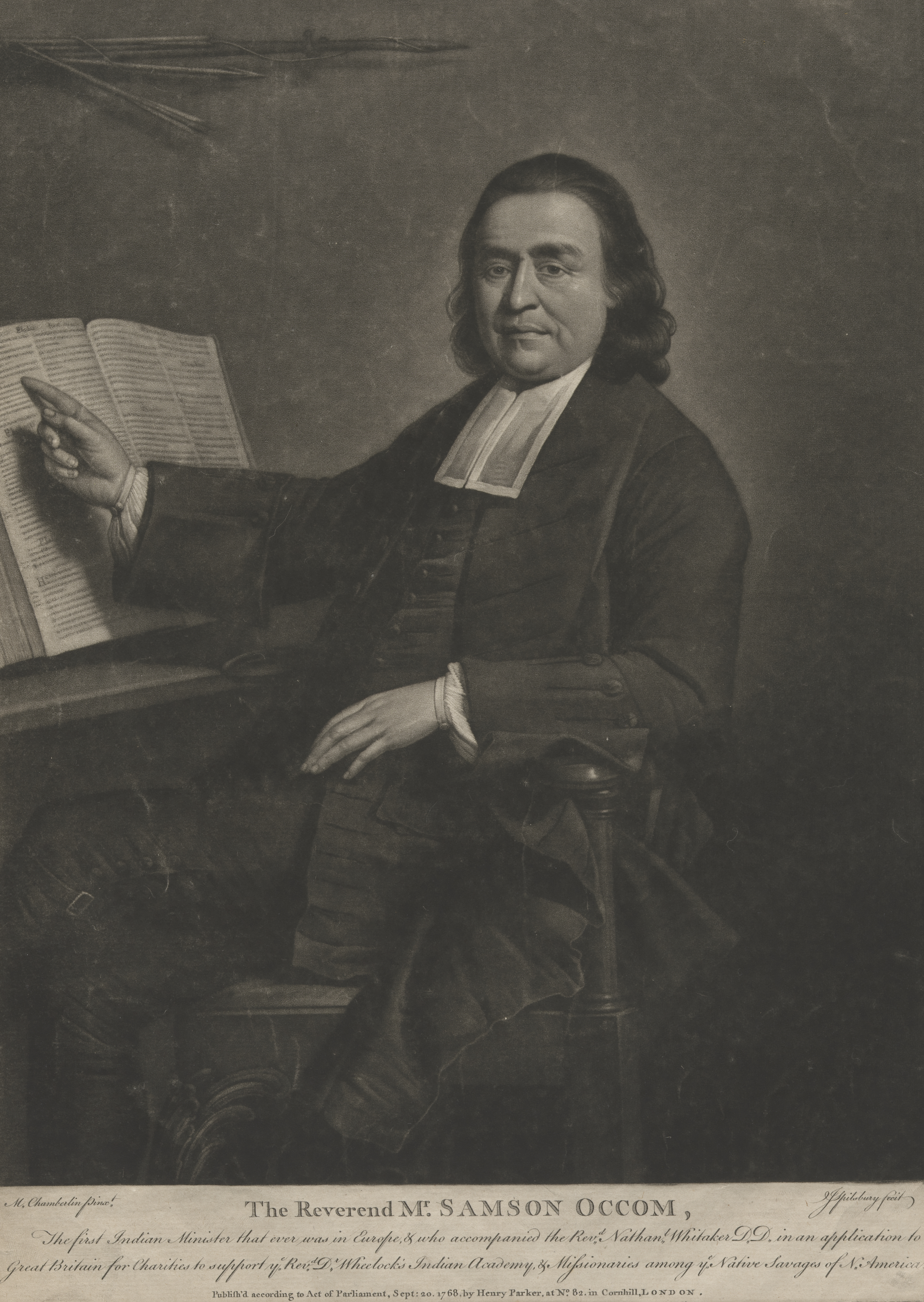 Source: https://en.wikipedia.org/wiki/Samson_Occom
- [MUStudStaff], the Indian Minister, while in England.
Source: https://en.wikipedia.org/wiki/Samson_Occom
- [MUStudStaff], the Indian Minister, while in England.
She has a great Inclination to learn the Latin Tongue, and has made some Progress in it. This Relation is given by her Master who bought her, and with whom she now lives.
JOHN WHEATLEY. Boston, Nov. 14, 1772. vii To the PUBLICK.AS it has been repeatedly suggested to the Publisher, by Persons, who have seen the Manuscript, that Numbers would be ready to suspect they were not really the Writings of PHILLIS, he has procured the following Attestation, from the most respectable Characters in Boston, that none might have the least Ground for disputing their Original.
WE whose Names are under-written, do assure the World, that the POEMS specified in the following Page, *auth1 were (as we verily believe) written by PHILLIS, a young Negro Girl, who was but a few Years since, brought an uncultivated Barbarian from Africa, and has ever since been, and now is, under the Disadvantage of serving as a Slave in a Family in this Town. She has been examined by some of the best Judges, and is thought qualified to write them.
His Excellency THOMAS HUTCHINSON, Governor, The Hon. ANDREW OLIVER, Lieutenant-Governor. The Hon. Thomas Hubbard, The Hon. John Erving, The Hon. James Pitts, The Hon. Harrison Gray, The Hon. James Bowdoin, John Hancock, Esq; Joseph Green, Esq; Richard Carey, Esq; The Rev. Charles Cheuney, D.D. The Rev. Mather Byles, D.D. The Rev. Ed. Pemberton, D.D. The Rev. Andrew Elliot, D.D. The Rev. Samuel Cooper, D.D. The Rev. Mr. Samuel Mather, The Rev. Mr. John Moorhead, Mr. John Wheatley, her Master.N. B. The original Attestation, signed by the above Gentlemen, may be seen by applying to Archibald Bell, Bookseller, No. 8, Aldgate-Street.
viii 9 POEMS ON VARIOUS SUBJECTS TO MAECENAS. 1MAECENASmaecenasmaecenas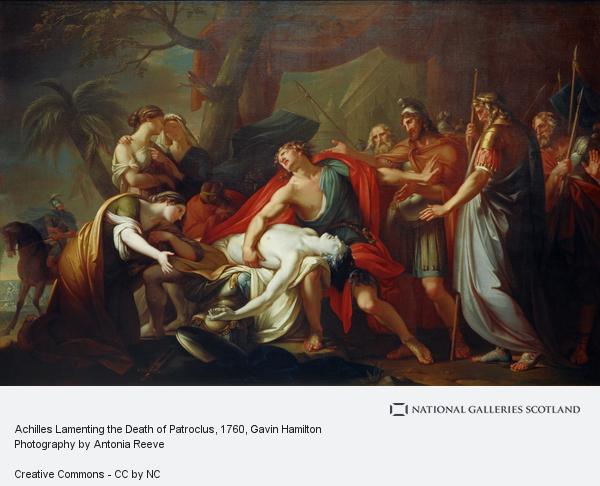 Source: Gavin Hamilton, 'Achilles Lamenting the Death of Patroclus' (1760-1763)Achilles is the main character of The Illiad, which tells the story of the Trojan War and,
specifically, Achilles' wrath. Achilles and Patroclus are lovers and friends;
angered by Agammemnon, Achilles refuses to fight, but allows Patroclus to wear
his armor and lead the Myrmidons against the Trojans. When Patroclus is killed
by Hector, Achilles is grief-stricken and, enraged, he returns to battle to
destroy the Trojans. The image included here, Gavin Hamilton's Achilles Lamenting the Death of Patroclus (1760-1763), is
housed in National Galleries, Scotland. - [TH],
18The grateful tribute of my tears is paid;
19Prone on the shore he feels the pangs of love,
20And stern PelidespelidespelidesPelides is Achilles' father; therefore, it is also
another way of referring to Achilles himself. Achilles is frequently described
as "stern" by Homer. - [TH] tend'rest passions move.
21Great Maro's strainmaromaroPublius Vergilius Maro, more commonly known as Virgil,
the Augustan Roman poet famed for his Eclogues and the epic poem The Aeneid. - [TH] in heav'nly numbers flows,
22The Nine
inspireninenineThe nine muses in Greco-Roman mythology are goddesses,
daughters of Zeus and Mnemosyne who inspire those in the arts and
sciences. - [TH], and all the bosom glows.
23O could I rival thine and Virgil's page,
24Or claim the Muses with the Mantuan SagemantuamantuaMantua
is a city in Italy, and the home of Virgil; the Mantuan sage is the poet
Virgil. - [TH];
25Soon the same beauties should my mind adorn,
26And the same ardors in my soul should burn:
27Then should my song in bolder notes arise,
28And all my numbers pleasingly surprize;
11
29But here I sit, and mourn a grov'ling mind,
30That fainfainfainMeaning "[g]ladly,
willingly, with pleasure," according to the OED (fain, adv.B). - [TH] would
mount, and ride upon the wind.
31Not you, my friend, these plaintive strains become,
32Not you, whose bosom is the Muses home;
33When they from tow'ring HeliconheliconheliconMount Helicon in Greece is a mountain
believed to be the home of the muses and hence a place sacred to poetry. - [TH]
retire,
34They fan in you the bright immortal fire,
35But I less happy, cannot raise the song,
36The fault'ringfalteringfalteringAn alternate spelling and contraction, for meter, of "faltering," meaning
unsteady or staggering. - [TH] music dies upon my tongue.
37The happier TerenceterenceterencePublius Terentius Afer, better known as
Terence, is a famous Roman comic playwright, born in northern Africa. As the
Encylopedia Britannicanotes, Terence was enslaved and later
freed by a Roman senator. Wheatley suggests a connection between herself and
Terence, both of African origin; yet, Terence is "happier"--both in his poetic
skill, and perhaps also in having been freed. - [TH]*auth2
all the choir
inspir'd,
38His soul replenish'd, and his bosom fir'd;
39But say, ye Muses, why this partial grace,
40To one alone of Afric's sable race;
41From age to age transmitting thus his name
42With the first glory in the rolls of fame?
43Thy virtues, great Maecenas! shall be
sung
44In praise of him, from whom those virtues sprung:
12
45While blooming wreaths around thy temples spread,
46I'll snatch a laurellaurellaurel
Source: Gavin Hamilton, 'Achilles Lamenting the Death of Patroclus' (1760-1763)Achilles is the main character of The Illiad, which tells the story of the Trojan War and,
specifically, Achilles' wrath. Achilles and Patroclus are lovers and friends;
angered by Agammemnon, Achilles refuses to fight, but allows Patroclus to wear
his armor and lead the Myrmidons against the Trojans. When Patroclus is killed
by Hector, Achilles is grief-stricken and, enraged, he returns to battle to
destroy the Trojans. The image included here, Gavin Hamilton's Achilles Lamenting the Death of Patroclus (1760-1763), is
housed in National Galleries, Scotland. - [TH],
18The grateful tribute of my tears is paid;
19Prone on the shore he feels the pangs of love,
20And stern PelidespelidespelidesPelides is Achilles' father; therefore, it is also
another way of referring to Achilles himself. Achilles is frequently described
as "stern" by Homer. - [TH] tend'rest passions move.
21Great Maro's strainmaromaroPublius Vergilius Maro, more commonly known as Virgil,
the Augustan Roman poet famed for his Eclogues and the epic poem The Aeneid. - [TH] in heav'nly numbers flows,
22The Nine
inspireninenineThe nine muses in Greco-Roman mythology are goddesses,
daughters of Zeus and Mnemosyne who inspire those in the arts and
sciences. - [TH], and all the bosom glows.
23O could I rival thine and Virgil's page,
24Or claim the Muses with the Mantuan SagemantuamantuaMantua
is a city in Italy, and the home of Virgil; the Mantuan sage is the poet
Virgil. - [TH];
25Soon the same beauties should my mind adorn,
26And the same ardors in my soul should burn:
27Then should my song in bolder notes arise,
28And all my numbers pleasingly surprize;
11
29But here I sit, and mourn a grov'ling mind,
30That fainfainfainMeaning "[g]ladly,
willingly, with pleasure," according to the OED (fain, adv.B). - [TH] would
mount, and ride upon the wind.
31Not you, my friend, these plaintive strains become,
32Not you, whose bosom is the Muses home;
33When they from tow'ring HeliconheliconheliconMount Helicon in Greece is a mountain
believed to be the home of the muses and hence a place sacred to poetry. - [TH]
retire,
34They fan in you the bright immortal fire,
35But I less happy, cannot raise the song,
36The fault'ringfalteringfalteringAn alternate spelling and contraction, for meter, of "faltering," meaning
unsteady or staggering. - [TH] music dies upon my tongue.
37The happier TerenceterenceterencePublius Terentius Afer, better known as
Terence, is a famous Roman comic playwright, born in northern Africa. As the
Encylopedia Britannicanotes, Terence was enslaved and later
freed by a Roman senator. Wheatley suggests a connection between herself and
Terence, both of African origin; yet, Terence is "happier"--both in his poetic
skill, and perhaps also in having been freed. - [TH]*auth2
all the choir
inspir'd,
38His soul replenish'd, and his bosom fir'd;
39But say, ye Muses, why this partial grace,
40To one alone of Afric's sable race;
41From age to age transmitting thus his name
42With the first glory in the rolls of fame?
43Thy virtues, great Maecenas! shall be
sung
44In praise of him, from whom those virtues sprung:
12
45While blooming wreaths around thy temples spread,
46I'll snatch a laurellaurellaurel Source: Jonathan Richardson, 'Portrait of Alexander Pope' (1737)The leaves of the bay laurel tree were a
conventional symbol of poetic fame and acheivement originating in the
mythological tale of Daphne and
Apollo. The image included here is a portrait of the 18th century poet
Alexander Pope, wearing a crown of laurel. The portrait (c.1737), by Jonathan
Richardson, is housed in the National
Portrait Gallery, London. - [TH] from thine honour'd head,
47While you indulgent smile upon the deed.
48As long as ThamesthamesthamesThe Thames is a major river flowing
through southern England and London. - [TH] in streams majestic flows,
49Or Naiadsnaiadsnaiads
Source: Jonathan Richardson, 'Portrait of Alexander Pope' (1737)The leaves of the bay laurel tree were a
conventional symbol of poetic fame and acheivement originating in the
mythological tale of Daphne and
Apollo. The image included here is a portrait of the 18th century poet
Alexander Pope, wearing a crown of laurel. The portrait (c.1737), by Jonathan
Richardson, is housed in the National
Portrait Gallery, London. - [TH] from thine honour'd head,
47While you indulgent smile upon the deed.
48As long as ThamesthamesthamesThe Thames is a major river flowing
through southern England and London. - [TH] in streams majestic flows,
49Or Naiadsnaiadsnaiads Source: Jean-Francois de Troy, 'Pan and Syrinx' (1722-1724)In Greco-Roman
mythology, naiads are female freshwater nymphs. The image included here, by
Jean-Francois de Troy, shows part of the Ovidian story of Pan and Syrinx
(1722-1724). De Troy's Pan and Syrinx is housed in the
Getty Museum. - [TH] in their oozy beds repose
50While PhoebusphoebusphoebusPhoebus Apollo is an important god in the Greco-Roman
tradition. He is associated with both the sun and with music and poetry. - [TH]
reigns above the starry train,
51While bright AuroraauroraauroraIn Greco-Roman mythology, Aurora (called Eos in the
Greek) personifies the dawn. - [TH] purples o'er the main,
52So long, great Sir, the muse thy praise shall sing,
53So long thy praise shall make ParnassusparnassusparnassusParnassus is a
mountain in Greece that was seen as the home of the gods, particularly Dionysus
and Apollo, as well as the Muses. The Muses are also associated with Mount
Helicon. - [TH] ring:
54Then grant, Maecenas, thy paternal rays,
55Hear me propitious, and defend my lays.
ON VIRTUE.
1O Thou bright jewel in my aim I strive
2To comprehend thee. Thine own words declare
3Wisdom is higher than a fool can reach.
4I cease to wonder, and no more attempt
5Thine height t' explore, or fathom thy profound.
6But, O my soul, sink not into despair,
7Virtue is near thee, and with gentle hand
8Would now embrace thee, hovers o'er thine head.
9Fain would the heav'n-born soul with her converse,
13
10Then seek, then court her for her promis'd bliss.
11Auspicious queen, thine heav'nly pinions spread,
12And lead celestial Chastity along;
13Lo! now her sacred retinue descends,
14Array'd in glory from the orbs above.
15Attend me, Virtue, thro' my youthful years!
16O leave me not to the false joys of time!
17But guide my steps to endless life and bliss.
14
18Greatness, or Goodness, say
what I shall call thee,
19To give an higher appellation still,
20Teach me a better strain, a nobler lay,
21O thou, enthron'd with Cherubs in the realms of day!
15
TO THE UNIVERSITY OF
CAMBRIDGE,cambridge
cambridge
Source: Jean-Francois de Troy, 'Pan and Syrinx' (1722-1724)In Greco-Roman
mythology, naiads are female freshwater nymphs. The image included here, by
Jean-Francois de Troy, shows part of the Ovidian story of Pan and Syrinx
(1722-1724). De Troy's Pan and Syrinx is housed in the
Getty Museum. - [TH] in their oozy beds repose
50While PhoebusphoebusphoebusPhoebus Apollo is an important god in the Greco-Roman
tradition. He is associated with both the sun and with music and poetry. - [TH]
reigns above the starry train,
51While bright AuroraauroraauroraIn Greco-Roman mythology, Aurora (called Eos in the
Greek) personifies the dawn. - [TH] purples o'er the main,
52So long, great Sir, the muse thy praise shall sing,
53So long thy praise shall make ParnassusparnassusparnassusParnassus is a
mountain in Greece that was seen as the home of the gods, particularly Dionysus
and Apollo, as well as the Muses. The Muses are also associated with Mount
Helicon. - [TH] ring:
54Then grant, Maecenas, thy paternal rays,
55Hear me propitious, and defend my lays.
ON VIRTUE.
1O Thou bright jewel in my aim I strive
2To comprehend thee. Thine own words declare
3Wisdom is higher than a fool can reach.
4I cease to wonder, and no more attempt
5Thine height t' explore, or fathom thy profound.
6But, O my soul, sink not into despair,
7Virtue is near thee, and with gentle hand
8Would now embrace thee, hovers o'er thine head.
9Fain would the heav'n-born soul with her converse,
13
10Then seek, then court her for her promis'd bliss.
11Auspicious queen, thine heav'nly pinions spread,
12And lead celestial Chastity along;
13Lo! now her sacred retinue descends,
14Array'd in glory from the orbs above.
15Attend me, Virtue, thro' my youthful years!
16O leave me not to the false joys of time!
17But guide my steps to endless life and bliss.
14
18Greatness, or Goodness, say
what I shall call thee,
19To give an higher appellation still,
20Teach me a better strain, a nobler lay,
21O thou, enthron'd with Cherubs in the realms of day!
15
TO THE UNIVERSITY OF
CAMBRIDGE,cambridge
cambridge
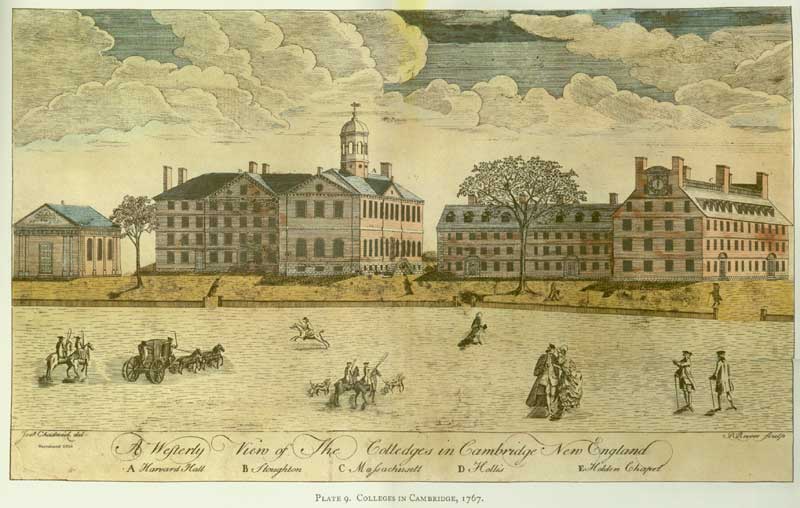 Source: Paul Revere, 'A Westerley View of the Colledges in Cambridge, New England' (1767)After describing her own educational journey, Wheatley
advises students at the University of Cambridge in New England to appreciate
and "[i]mprove" (21) the privilege of their education by "shunn[ing]" (25) the
"transient sweetness" (29) of sin using a variety of religious images. The
University of Cambridge in New England is now known as Harvard University. According to
Katherine Clay Bassard, Wheatley wrote this poem when she was about
fourteen years old (41). The engraving included here is by Paul Revere and
shows "A Westerly View of The Colledges in Cambridge New England" (1767), via
NYPL Digital Collections. - [JW] IN NEW-ENGLAND.
1WHILE an intrinsic ardorardorardorWheatley works from the premise, commonly used among early women writers
and the enslaved who were restricted from intellectual pursuits like
writing, that her desire to write is "intrinsic" (1) or God-given, and
therefore appropriate. The word "ardor" also connotes physical desire and
flame-like passion, according to the OED (n.3). - [JW] prompts to
write,
2The musesmusesmusesAccording to A Dictionary of Greek and Roman Biography and
Mythology, the Muses are “inspiring goddesses of song" who
“presid[e] over the different kinds of poetry, and over the arts and
sciences." The “invocation of the muse” to aid the poet's work is often used
by neoclassical authors like those whom Wheatley has clearly read and was
influenced by, including Milton and Pope.
However, Hilene Flanzbaum suggests that Wheatley’s notably frequent
invocation of the muse is more significant than formulaic or imitative--it
is “the very means by which she usurps power for herself and claims a berth
for her own thoughts, emotions and desires. And while some may claim that
these functions accompany any appearance of the muse, when the muses bestow
their power on a black female slave, they transport Wheatley to a domain
surprisingly free of restriction and previously forbidden” (“Unprecedented Liberties”
75). - [JW] promise to assist my
pen;
3'Twas not long since I left my native shore
4The land of errors, and Egyptian gloomegyptian:egyptianWheatley here
alludes to Exodus
10:21-22, wherein the ninth plague of darkness is visited upon
Egypt. This reference is also in line with contemporary Orientalist notions
about Egypt and Egyptian religiosity, which was believed to be full of
occult practices. Early nineteenth-century British historian and scholar
Thomas Maurice explores these ideas of idolatry and superstition in Observations on
the Remains of Ancient Egyptian Grandeur and Superstition. A
detailed focus on the Egyptian religious practices can be found in the
chapter "Strictures on the superstitious rites of the Egyptians,
particularly on the Nefarious Worship paid to Beasts, Esteemed Sacred, and
called in Scripture the Abominations of Egypt" (74-83). - [JW]
5Father of mercy, 'twas thy gracious hand
6Brought me in safety from those dark abodes.
Students, to you 'tis giv'n to scan the heights
7Above, to traverse the ethereal space,
8And mark the systems of revolving
worldssystems.systems
Source: Paul Revere, 'A Westerley View of the Colledges in Cambridge, New England' (1767)After describing her own educational journey, Wheatley
advises students at the University of Cambridge in New England to appreciate
and "[i]mprove" (21) the privilege of their education by "shunn[ing]" (25) the
"transient sweetness" (29) of sin using a variety of religious images. The
University of Cambridge in New England is now known as Harvard University. According to
Katherine Clay Bassard, Wheatley wrote this poem when she was about
fourteen years old (41). The engraving included here is by Paul Revere and
shows "A Westerly View of The Colledges in Cambridge New England" (1767), via
NYPL Digital Collections. - [JW] IN NEW-ENGLAND.
1WHILE an intrinsic ardorardorardorWheatley works from the premise, commonly used among early women writers
and the enslaved who were restricted from intellectual pursuits like
writing, that her desire to write is "intrinsic" (1) or God-given, and
therefore appropriate. The word "ardor" also connotes physical desire and
flame-like passion, according to the OED (n.3). - [JW] prompts to
write,
2The musesmusesmusesAccording to A Dictionary of Greek and Roman Biography and
Mythology, the Muses are “inspiring goddesses of song" who
“presid[e] over the different kinds of poetry, and over the arts and
sciences." The “invocation of the muse” to aid the poet's work is often used
by neoclassical authors like those whom Wheatley has clearly read and was
influenced by, including Milton and Pope.
However, Hilene Flanzbaum suggests that Wheatley’s notably frequent
invocation of the muse is more significant than formulaic or imitative--it
is “the very means by which she usurps power for herself and claims a berth
for her own thoughts, emotions and desires. And while some may claim that
these functions accompany any appearance of the muse, when the muses bestow
their power on a black female slave, they transport Wheatley to a domain
surprisingly free of restriction and previously forbidden” (“Unprecedented Liberties”
75). - [JW] promise to assist my
pen;
3'Twas not long since I left my native shore
4The land of errors, and Egyptian gloomegyptian:egyptianWheatley here
alludes to Exodus
10:21-22, wherein the ninth plague of darkness is visited upon
Egypt. This reference is also in line with contemporary Orientalist notions
about Egypt and Egyptian religiosity, which was believed to be full of
occult practices. Early nineteenth-century British historian and scholar
Thomas Maurice explores these ideas of idolatry and superstition in Observations on
the Remains of Ancient Egyptian Grandeur and Superstition. A
detailed focus on the Egyptian religious practices can be found in the
chapter "Strictures on the superstitious rites of the Egyptians,
particularly on the Nefarious Worship paid to Beasts, Esteemed Sacred, and
called in Scripture the Abominations of Egypt" (74-83). - [JW]
5Father of mercy, 'twas thy gracious hand
6Brought me in safety from those dark abodes.
Students, to you 'tis giv'n to scan the heights
7Above, to traverse the ethereal space,
8And mark the systems of revolving
worldssystems.systems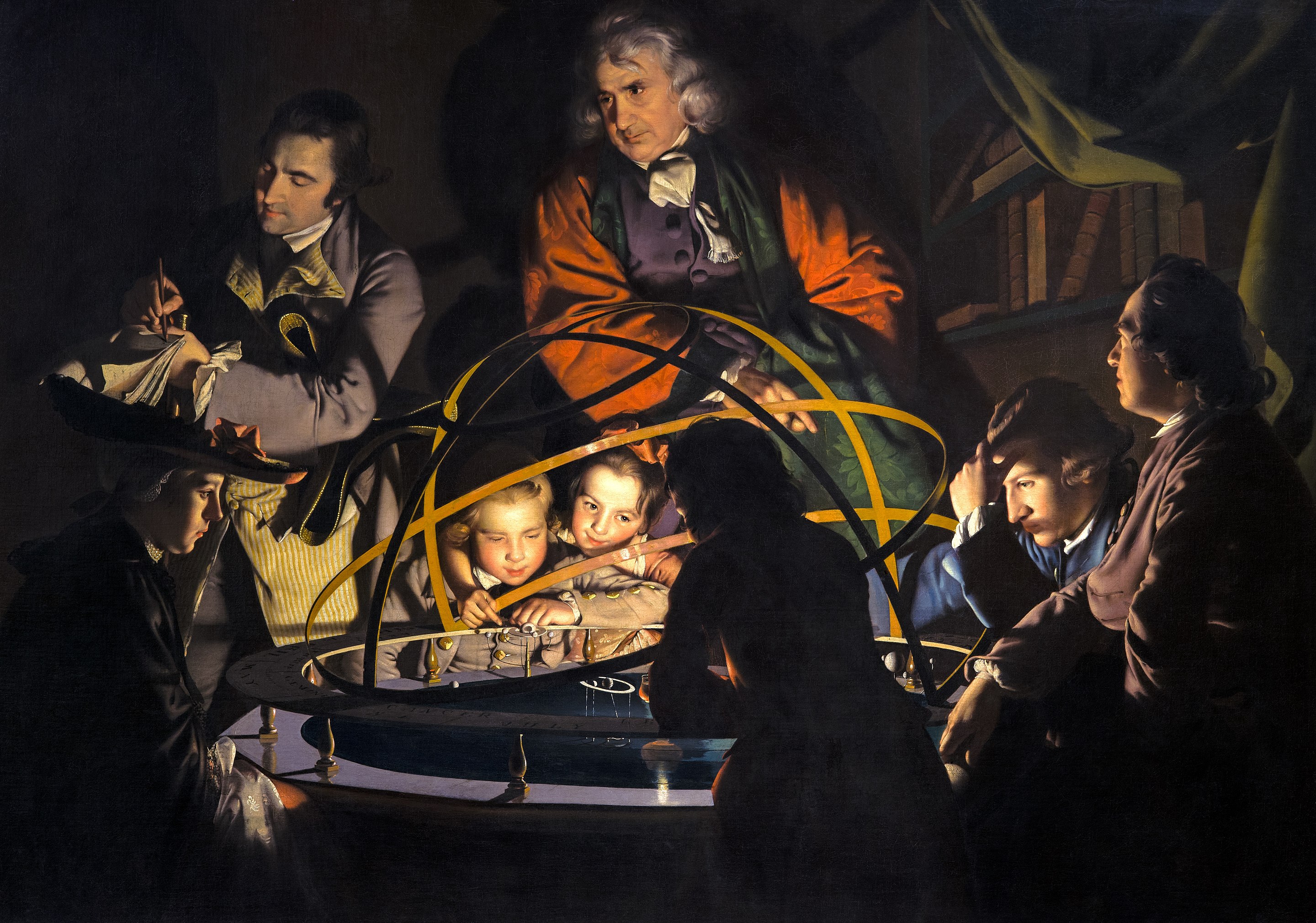 Source: Joseph Wright, 'Philosopher Lecturing on the Orrery' (1766)The sixteenth- and seventeenth-century
development of the microscope and the telescope had made great scientific
advancements possible, especially in astronomy; in the painting by Joseph
Wright here, you can see an eighteenth-century orrery--a scientific
clockwork instrument used to dramatize the motion of the planets in the
solar system (via Wikimedia Commons). Possibly an allusion to Alexander
Pope's 1733-34 Essay on Man (I.23-28), Wheatley here may
also be referencing contemporary scientific thought about the plurality of worlds. - [JW]
9Still more, ye sons of science ye receive
10The blissful news by messengers from heav'n,
11How Jesus' blood for your redemption flows.
12See him with hands out-stretcht upon the cross;
13Immese compassion in his bosom glows;
14He hears revilers, nor resents their scorn:
15What matchless mercy in the Son of God!
16When the whole human race by sin had fall'n,
16
17He deign'ddeigndeign According to the
Oxford English Dictionary deign means "to think it worthy of oneself" or "to think fit"
(n.1a). Today, it typically has a negative connotation, though it does not
here. - [JW] to die that they might rise
again,
18And share with him in the sublimest skies,
19Life without death, and glory without end.
20Improve your privileges while they stay,
21Ye pupils, and each hour redeem, that bears
22Or good or bad report of you to heav'n.
23Let sin, that baneful evil to the soul,
24By you be shunn'd, nor once remit your guard;
25Suppress the deadly serpent in its egg.
26Ye blooming plants of human race divine,
27An Ethiopethiopethiop
Source: Joseph Wright, 'Philosopher Lecturing on the Orrery' (1766)The sixteenth- and seventeenth-century
development of the microscope and the telescope had made great scientific
advancements possible, especially in astronomy; in the painting by Joseph
Wright here, you can see an eighteenth-century orrery--a scientific
clockwork instrument used to dramatize the motion of the planets in the
solar system (via Wikimedia Commons). Possibly an allusion to Alexander
Pope's 1733-34 Essay on Man (I.23-28), Wheatley here may
also be referencing contemporary scientific thought about the plurality of worlds. - [JW]
9Still more, ye sons of science ye receive
10The blissful news by messengers from heav'n,
11How Jesus' blood for your redemption flows.
12See him with hands out-stretcht upon the cross;
13Immese compassion in his bosom glows;
14He hears revilers, nor resents their scorn:
15What matchless mercy in the Son of God!
16When the whole human race by sin had fall'n,
16
17He deign'ddeigndeign According to the
Oxford English Dictionary deign means "to think it worthy of oneself" or "to think fit"
(n.1a). Today, it typically has a negative connotation, though it does not
here. - [JW] to die that they might rise
again,
18And share with him in the sublimest skies,
19Life without death, and glory without end.
20Improve your privileges while they stay,
21Ye pupils, and each hour redeem, that bears
22Or good or bad report of you to heav'n.
23Let sin, that baneful evil to the soul,
24By you be shunn'd, nor once remit your guard;
25Suppress the deadly serpent in its egg.
26Ye blooming plants of human race divine,
27An Ethiopethiopethiop
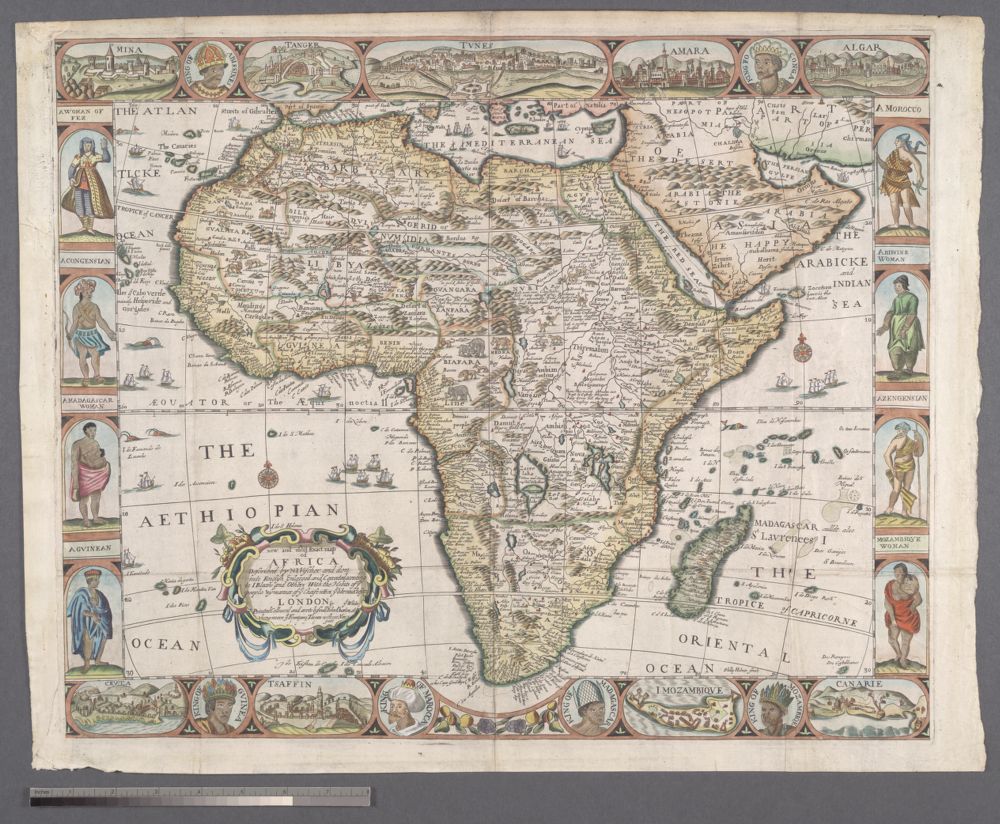 Source: John Overton, 'A new and most exact map of Africa' (1666)According
to the OED, the word Ethiop would
have been used during Wheatley's time most often to refer to "[a] black or
dark-skinned person; a black African," and only occasionally to the country
of Ethiopia, specifically (n.A). Included here, via the Norwich Collection at Stanford University, is a 1666 map
of Africa and the surrounding oceans, embellished with a variety of images.
- [JW] tells you 'tis your greatest foe;
28Its transient sweetness turns to endless pain,
29And in immense perditionperditionperditionIn theological discussion, the word perdition means "the
state of final spiritual ruin or damnation; the consignment of the
unredeemed or wicked and impenitent soul to hell; the fate of those in hell;
eternal death" (OED, "perdition" n.2a). In more general terms, it suggests
ruin or degradation (n.1a). - [JW] sinks the soul.
17
17
To the KING's Most Excellent Majesty.
1768.
1YOUR subjects hope, dread Sire --
2The crown upon your brows may flourish long,
3And that your arm may in your God be strong!
4O may your sceptre num'rous nations sway,
5And all with love and readiness obey!
6But how shall we the British king
reward!
7Rule thou in peace, our father, and our lord!
8Midst the remembrance of thy favours past,
9The meanest peasants most admire the last.*auth3
10May George, belov'd by all the nations round,
11Live with heav'ns choicest constant blessings crown'd!
12Great God, direct, and guard him from on high
13And from his head let ev'ry evil fly!
14And may each clime with equal gladness see
15A monarch's smile can set his subjects free!
18
On being brought from AFRICA to
AMERICA.broughtbrought
Source: John Overton, 'A new and most exact map of Africa' (1666)According
to the OED, the word Ethiop would
have been used during Wheatley's time most often to refer to "[a] black or
dark-skinned person; a black African," and only occasionally to the country
of Ethiopia, specifically (n.A). Included here, via the Norwich Collection at Stanford University, is a 1666 map
of Africa and the surrounding oceans, embellished with a variety of images.
- [JW] tells you 'tis your greatest foe;
28Its transient sweetness turns to endless pain,
29And in immense perditionperditionperditionIn theological discussion, the word perdition means "the
state of final spiritual ruin or damnation; the consignment of the
unredeemed or wicked and impenitent soul to hell; the fate of those in hell;
eternal death" (OED, "perdition" n.2a). In more general terms, it suggests
ruin or degradation (n.1a). - [JW] sinks the soul.
17
17
To the KING's Most Excellent Majesty.
1768.
1YOUR subjects hope, dread Sire --
2The crown upon your brows may flourish long,
3And that your arm may in your God be strong!
4O may your sceptre num'rous nations sway,
5And all with love and readiness obey!
6But how shall we the British king
reward!
7Rule thou in peace, our father, and our lord!
8Midst the remembrance of thy favours past,
9The meanest peasants most admire the last.*auth3
10May George, belov'd by all the nations round,
11Live with heav'ns choicest constant blessings crown'd!
12Great God, direct, and guard him from on high
13And from his head let ev'ry evil fly!
14And may each clime with equal gladness see
15A monarch's smile can set his subjects free!
18
On being brought from AFRICA to
AMERICA.broughtbrought The title of one Wheatley's most (in)famous poems, "On being brought from
AFRICA to AMERICA" alludes to the experiences of many Africans who became
subject to the transatlantic slave trade. Wheatley uses biblical references and
direct address to appeal to a Christian audience, while also defending the
ability of her "sable race" to become "refin'd" through Christian theology.
Henry Louis Gates, who in Figures in Black: Words, Signs, and the "Racial" Self (1989)
situates Wheatley as an important voice in the eighteenth-century debate about
natural human rights, summarizes the "recurrent suggestion that Wheatley has
remained aloof from matters that were in any sense racial, or more correctly,
'positively' racial," as a "misreading" (74-75). Notable for the complexity of
its brief discussion of blackness in the Christian slaveholding American
republic, this poem in particular is frequently criticized for its apparent
rejection of Africa and African-ness. However, Wheatley was working within a
non-free context, and her critique of slavery is mediated by Christianity
acquired as part of her enslavement. For a fuller exploration of Wheatley’s
poem, see Authority and Female Authorship in Colonial America,
by William Scheick (especially chapter 4). The image included here,
via the
British Library, shows a diagram of the Brookes' slave ship
(c.1801). - [JW]
1'TWAS mercy brought me from my Pagan land,
2Taught my benighted soul to understand
3That there's a God, that there's a Saviour too:
4Once I redemption neither sought nor knew.
5 Some viewviewviewWheatley's description
of those who "view our sable race with scornful eye" (5) is a clear
rejection of what Lena Hill
describes as "ignorant" interpretations of "visual blackness"
(37-38), as is her attribution of speech in direct discourse:
"'Their color is a diabolic die'" (6). Henry Louis Gates argues that
Wheatley's very presence as an author complicated assumptions of "natural"
inferiority. For more about this topic, see Gates' Figures in
Black and Walt Nott's discussion of Wheatley's public
persona in "From
'Uncultivated Barbarian' to 'Poetical Genius': The Public Presence of
Phillis Wheatley."
- [TH] our sable race with scornful eye,
6"Their colour is a diabolic die."
7Remember, Christians, Negros,
black as Caincain,cainThe phrase "black as Cain" is a distortion of the
biblical idea of the mark of Cain (Genesis
4:15) and was used as justification for the enslavement of people
of color. Many scholars point out that this was Wheatley's "most maligned
poem," (Hill
37) which is ultimately about the inclusion of Africans in the
"Christian family" and her critique of "ignorant" interpretations of "visual
blackness" (37-38). For an interesting contemporary read of the mark of Cain
in anti-abolitionist discourse, see Josiah Priest's Slavery as it Relates to the Negro (1843), where he
rejects the possibility that dark-skinned peoples could be related to Adam
by blood (134-136). For a larger reading of Wheatley's use of blackness and
the role of blackness in the early American imagination, see Lena Hill's
chapter "Witnessing Moral Authority in Pre-Abolition Literature," from Visualizing
Blackness and the Creation of the African American Literary
Tradition (2014)
- [JW]
8May be refin'd, and join th' angelic train.
19
On the Death of the Rev. DR. SEWELL.
1769.
1ERE yet the morn its lovely blushes spread,
2See Sewell number'd with the happy dead.
3Hail, holy man, arriv'd th' immortal shore,
4Though we shall hear thy warning voice no more.
5Come, let us all behold with wishful eyes
6The saint ascending to his native skies;
7From hence the prophet wing'd his rapt'rous way
8To the blest mansions in eternal day.
9Then begging for the Spirit of our God,
10And panting eager for the same abode,
11Come, let us all with the same vigour rise,
12And take a prospect of the blissful skies;
13While on our minds Christ's image is imprest,
14And the dear Saviour glows in ev'ry breast.
15Thrice happy saint! to find thy heav'n at last,
16What compensation for the evils past!
20
17Great God, incomprehensible, unknown
18By sense, we bow at thine exalted throne.
19O, while we beg thine excellence to feel,
20Thy sacred Spirit to our hearts reveal,
21And give us of that mercy to partake,
22Which thou hast promis'd for the Saviour's sake!
23"Sewell is dead." Swift-pinion'd Fame thus cry'd.
24"Is Sewell dead," my trembling tongue reply'd,
25O what a blessing in his flight deny'd!
26How oft for us the holy prophet pray'd!
27How oft to us the Word of Life convey'd!
28By duty urg'd my mournful verse to close,
29I for his tomb this epitaph compose.
30"Lo, here a man, redeem'd by Jesus'
blood,
31"A sinner once, but now a saint with God;
32"Behold ye rich, ye poor, ye fools, ye wise,
33"Nor let his monument your heart surprize;
34"'Twill tell you what this holy man has done,
35"Which gives him brighter lustre than the sun.
21
36"Listen, ye happy, from your seats above.
37"I speak sincerely, while I speak and love,
38"He sought the paths of piety and truth,
39"By these made happy from his early youth!
40"In blooming years that grace divine he felt,
41"Which rescues sinners from the chains of guilt.
42"Mourn him, ye indigent, whom he has fed,
43"And henceforth seek, like him, for living bread;
44"Ev'n Christ, the bread descending from above,
45"And ask an int'rest in his saving love.
46"Mourn him, ye youth, to whom he oft has told
47"God's gracious wonders from the times of old.
48"I, too have cause this mighty loss to mourn,
49"For he my monitor will not return.
50"O when shall we to his blest state arrive?
51"When the same graces in our bosoms thrive."
22
On the Death of the Rev.
MR. GEORGE WHITEFIELD.whitfieldwhitfield
The title of one Wheatley's most (in)famous poems, "On being brought from
AFRICA to AMERICA" alludes to the experiences of many Africans who became
subject to the transatlantic slave trade. Wheatley uses biblical references and
direct address to appeal to a Christian audience, while also defending the
ability of her "sable race" to become "refin'd" through Christian theology.
Henry Louis Gates, who in Figures in Black: Words, Signs, and the "Racial" Self (1989)
situates Wheatley as an important voice in the eighteenth-century debate about
natural human rights, summarizes the "recurrent suggestion that Wheatley has
remained aloof from matters that were in any sense racial, or more correctly,
'positively' racial," as a "misreading" (74-75). Notable for the complexity of
its brief discussion of blackness in the Christian slaveholding American
republic, this poem in particular is frequently criticized for its apparent
rejection of Africa and African-ness. However, Wheatley was working within a
non-free context, and her critique of slavery is mediated by Christianity
acquired as part of her enslavement. For a fuller exploration of Wheatley’s
poem, see Authority and Female Authorship in Colonial America,
by William Scheick (especially chapter 4). The image included here,
via the
British Library, shows a diagram of the Brookes' slave ship
(c.1801). - [JW]
1'TWAS mercy brought me from my Pagan land,
2Taught my benighted soul to understand
3That there's a God, that there's a Saviour too:
4Once I redemption neither sought nor knew.
5 Some viewviewviewWheatley's description
of those who "view our sable race with scornful eye" (5) is a clear
rejection of what Lena Hill
describes as "ignorant" interpretations of "visual blackness"
(37-38), as is her attribution of speech in direct discourse:
"'Their color is a diabolic die'" (6). Henry Louis Gates argues that
Wheatley's very presence as an author complicated assumptions of "natural"
inferiority. For more about this topic, see Gates' Figures in
Black and Walt Nott's discussion of Wheatley's public
persona in "From
'Uncultivated Barbarian' to 'Poetical Genius': The Public Presence of
Phillis Wheatley."
- [TH] our sable race with scornful eye,
6"Their colour is a diabolic die."
7Remember, Christians, Negros,
black as Caincain,cainThe phrase "black as Cain" is a distortion of the
biblical idea of the mark of Cain (Genesis
4:15) and was used as justification for the enslavement of people
of color. Many scholars point out that this was Wheatley's "most maligned
poem," (Hill
37) which is ultimately about the inclusion of Africans in the
"Christian family" and her critique of "ignorant" interpretations of "visual
blackness" (37-38). For an interesting contemporary read of the mark of Cain
in anti-abolitionist discourse, see Josiah Priest's Slavery as it Relates to the Negro (1843), where he
rejects the possibility that dark-skinned peoples could be related to Adam
by blood (134-136). For a larger reading of Wheatley's use of blackness and
the role of blackness in the early American imagination, see Lena Hill's
chapter "Witnessing Moral Authority in Pre-Abolition Literature," from Visualizing
Blackness and the Creation of the African American Literary
Tradition (2014)
- [JW]
8May be refin'd, and join th' angelic train.
19
On the Death of the Rev. DR. SEWELL.
1769.
1ERE yet the morn its lovely blushes spread,
2See Sewell number'd with the happy dead.
3Hail, holy man, arriv'd th' immortal shore,
4Though we shall hear thy warning voice no more.
5Come, let us all behold with wishful eyes
6The saint ascending to his native skies;
7From hence the prophet wing'd his rapt'rous way
8To the blest mansions in eternal day.
9Then begging for the Spirit of our God,
10And panting eager for the same abode,
11Come, let us all with the same vigour rise,
12And take a prospect of the blissful skies;
13While on our minds Christ's image is imprest,
14And the dear Saviour glows in ev'ry breast.
15Thrice happy saint! to find thy heav'n at last,
16What compensation for the evils past!
20
17Great God, incomprehensible, unknown
18By sense, we bow at thine exalted throne.
19O, while we beg thine excellence to feel,
20Thy sacred Spirit to our hearts reveal,
21And give us of that mercy to partake,
22Which thou hast promis'd for the Saviour's sake!
23"Sewell is dead." Swift-pinion'd Fame thus cry'd.
24"Is Sewell dead," my trembling tongue reply'd,
25O what a blessing in his flight deny'd!
26How oft for us the holy prophet pray'd!
27How oft to us the Word of Life convey'd!
28By duty urg'd my mournful verse to close,
29I for his tomb this epitaph compose.
30"Lo, here a man, redeem'd by Jesus'
blood,
31"A sinner once, but now a saint with God;
32"Behold ye rich, ye poor, ye fools, ye wise,
33"Nor let his monument your heart surprize;
34"'Twill tell you what this holy man has done,
35"Which gives him brighter lustre than the sun.
21
36"Listen, ye happy, from your seats above.
37"I speak sincerely, while I speak and love,
38"He sought the paths of piety and truth,
39"By these made happy from his early youth!
40"In blooming years that grace divine he felt,
41"Which rescues sinners from the chains of guilt.
42"Mourn him, ye indigent, whom he has fed,
43"And henceforth seek, like him, for living bread;
44"Ev'n Christ, the bread descending from above,
45"And ask an int'rest in his saving love.
46"Mourn him, ye youth, to whom he oft has told
47"God's gracious wonders from the times of old.
48"I, too have cause this mighty loss to mourn,
49"For he my monitor will not return.
50"O when shall we to his blest state arrive?
51"When the same graces in our bosoms thrive."
22
On the Death of the Rev.
MR. GEORGE WHITEFIELD.whitfieldwhitfield
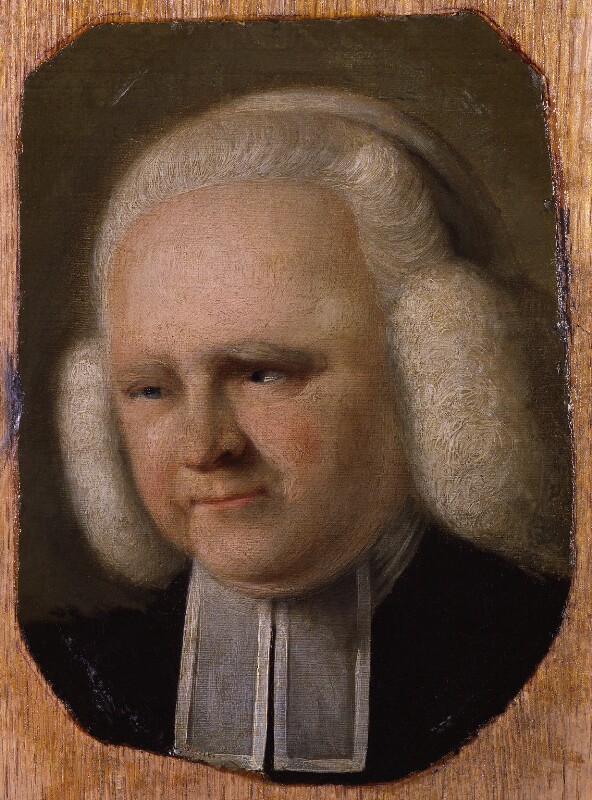 Source: John Russell, 'Portrait of George Whitefield' (c.1770)
George Whitefield (1714-1770; pronounced "wit-field") was one of the most
famous people of the eighteenth-century Anglophone world. As a student at
Oxford in the early 1730s, he got to know John and Charles Wesley, the founders
of the Methodist movement in the church of England. Whitefield joined them in
attempting to "methodize" the faith, returning it to the simple principles of
the early church. But more than the Wesley brothers, Whitefield made this
reformist movement into a public ministry. A famously charismatic public
speaker, Whitefield preached to crowds numbering in the thousands in England
and the American colonies, becoming a central figure in what was known as the
"Great Awakening," a revival of evangelical Protestantism that was influential
on both sides of the Atlantic. Benjamin Franklin and Olaudah Equiano were each
impressed (though in very different ways) when they saw Whitefield preach in
Philadelphia and Savannah, respectively. Whitefield made several visits to the
Boston area, and it seems likely that the Wheatleys saw him preach there.
Phillis might very well have joined them, but we cannot be sure. Whitefield
died unexpectedly in Newburyport, Massachusetts on September 30, 1770, a few
days after he left Boston on what turned out to be his last tour of the
colonies.
Phillis Wheatley's elegy for Whitefield changed her life, transforming her from
a young enslaved woman with a small readership among friends of the Wheatley
family to an author with an international readership. The poem was published as
a broadside on October 11, 1770, and was an immediate success. It was reprinted
several times in colonial cities, as well as London, and also appeared in
several newspapers. The poem brought Wheatley to the attention of Selina, the
Countess of Huntingdon, who is addressed in the poem itself. A fervent
Methodist herself, the Countess was Whitefield's patron, supporting him on his
evangelical missions. The Countess became Wheatley's patron as well, sponsoring
the publication of her only volume of poems, published in London in 1773. The image included here shows a portrait of Whitefield by John Russel, from the National Portrait Gallery, UK.
- [JOB]
1770.
1HAIL, happy saint, on thine immortal throne,
2Possest of glory, life, and bliss unknown;
3We hear no more the music of thy tongue,
4Thy wonted auditorieswonted cease to
throng.
5Thy sermons in unequall'd
accentsunequalled flow'd,
6And ev'ry bosom with devotion glow'd;
7Thou didst in strains of eloquence refin'd
8Inflame the heart, and captivate the mind.
9Unhappy we the setting sun deplore,
10So glorious once, but ah! it shines no more.
11Behold the prophet in his tow'ring flight!
12He leaves the earth for heav'n's unmeasur'd height,
13And worlds unknown receive him from our sight.
14There Whitefield wings with rapid course his
way,
15And sails to Zionzion through vast seas of day.
16Thy pray'rs, great saint, and thine incessant cries
17Have pierc'd the bosom of thy native skies.
23
18Thou moon hast seen, and all the stars of light,
19How he has wrestled with his God by night.
20He pray'd that grace in ev'ry heart might dwell,
21He long'd to see America excel;
22He charg'd its youth that ev'ry grace divine
23Should with full lustre in their conduct shine;
24That Saviour, which his soul did first receive,
25The greatest gift that ev'n a God can give,
26He freely offer'd to the num'rous throng,
27That on his lips with list'ning pleasure hung.
28"Take him, ye wretched, for your only good,
29"Take him ye starving sinners, for your food;
30"Ye thirsty, come to this life-giving stream,
31"Ye preachers, take him for your joyful theme;
32"Take him my dear Americans, he said,
33"Be your complaints on his kind bosom laid:
34"Take him, ye Africans, he longs for you,
35"Impartial Saviour is his title due:
36"Wash'd in the fountain of redeeming blood,
37"You shall be sons, and kings, and priests to God."
24
38Great Countesscountess, we Americans
revere
39Thy name, and mingle in thy grief sincere;
40New England deeply feels, the Orphansorphans mourn,
41Their more than father will no more return.
42But, though arrested by the hand of death,
43Whitefield no more exerts his lab'ring breath,
44Yet let us view him in th' eternal skies,
45Let ev'ry heart to this bright vision rise;
46While the tomb safe retains its sacred trust,
47Till life divine re-animates his dust.
wontedwonted:
"Accustomed, customary, usual." Oxford English Dictionary;
auditory: "An assembly of hearers, an audience." Oxford English
Dictionary, hence the meaning here is something like "usual audience." - [JOB]
unequalled"unequalled accents"; Whitefield was a famously eloquent and compelling public
speaker; the sense here is that no other speaker could match the "accent" or style of
his voice. - [JOB]
zionZion is a
name in the Hebrew bible for Jerusalem, and the term has often been extended to mean
the entirety of what believers think of as the holy land, or even the
afterlife. - [JOB]
countess
Source: John Russell, 'Portrait of George Whitefield' (c.1770)
George Whitefield (1714-1770; pronounced "wit-field") was one of the most
famous people of the eighteenth-century Anglophone world. As a student at
Oxford in the early 1730s, he got to know John and Charles Wesley, the founders
of the Methodist movement in the church of England. Whitefield joined them in
attempting to "methodize" the faith, returning it to the simple principles of
the early church. But more than the Wesley brothers, Whitefield made this
reformist movement into a public ministry. A famously charismatic public
speaker, Whitefield preached to crowds numbering in the thousands in England
and the American colonies, becoming a central figure in what was known as the
"Great Awakening," a revival of evangelical Protestantism that was influential
on both sides of the Atlantic. Benjamin Franklin and Olaudah Equiano were each
impressed (though in very different ways) when they saw Whitefield preach in
Philadelphia and Savannah, respectively. Whitefield made several visits to the
Boston area, and it seems likely that the Wheatleys saw him preach there.
Phillis might very well have joined them, but we cannot be sure. Whitefield
died unexpectedly in Newburyport, Massachusetts on September 30, 1770, a few
days after he left Boston on what turned out to be his last tour of the
colonies.
Phillis Wheatley's elegy for Whitefield changed her life, transforming her from
a young enslaved woman with a small readership among friends of the Wheatley
family to an author with an international readership. The poem was published as
a broadside on October 11, 1770, and was an immediate success. It was reprinted
several times in colonial cities, as well as London, and also appeared in
several newspapers. The poem brought Wheatley to the attention of Selina, the
Countess of Huntingdon, who is addressed in the poem itself. A fervent
Methodist herself, the Countess was Whitefield's patron, supporting him on his
evangelical missions. The Countess became Wheatley's patron as well, sponsoring
the publication of her only volume of poems, published in London in 1773. The image included here shows a portrait of Whitefield by John Russel, from the National Portrait Gallery, UK.
- [JOB]
1770.
1HAIL, happy saint, on thine immortal throne,
2Possest of glory, life, and bliss unknown;
3We hear no more the music of thy tongue,
4Thy wonted auditorieswonted cease to
throng.
5Thy sermons in unequall'd
accentsunequalled flow'd,
6And ev'ry bosom with devotion glow'd;
7Thou didst in strains of eloquence refin'd
8Inflame the heart, and captivate the mind.
9Unhappy we the setting sun deplore,
10So glorious once, but ah! it shines no more.
11Behold the prophet in his tow'ring flight!
12He leaves the earth for heav'n's unmeasur'd height,
13And worlds unknown receive him from our sight.
14There Whitefield wings with rapid course his
way,
15And sails to Zionzion through vast seas of day.
16Thy pray'rs, great saint, and thine incessant cries
17Have pierc'd the bosom of thy native skies.
23
18Thou moon hast seen, and all the stars of light,
19How he has wrestled with his God by night.
20He pray'd that grace in ev'ry heart might dwell,
21He long'd to see America excel;
22He charg'd its youth that ev'ry grace divine
23Should with full lustre in their conduct shine;
24That Saviour, which his soul did first receive,
25The greatest gift that ev'n a God can give,
26He freely offer'd to the num'rous throng,
27That on his lips with list'ning pleasure hung.
28"Take him, ye wretched, for your only good,
29"Take him ye starving sinners, for your food;
30"Ye thirsty, come to this life-giving stream,
31"Ye preachers, take him for your joyful theme;
32"Take him my dear Americans, he said,
33"Be your complaints on his kind bosom laid:
34"Take him, ye Africans, he longs for you,
35"Impartial Saviour is his title due:
36"Wash'd in the fountain of redeeming blood,
37"You shall be sons, and kings, and priests to God."
24
38Great Countesscountess, we Americans
revere
39Thy name, and mingle in thy grief sincere;
40New England deeply feels, the Orphansorphans mourn,
41Their more than father will no more return.
42But, though arrested by the hand of death,
43Whitefield no more exerts his lab'ring breath,
44Yet let us view him in th' eternal skies,
45Let ev'ry heart to this bright vision rise;
46While the tomb safe retains its sacred trust,
47Till life divine re-animates his dust.
wontedwonted:
"Accustomed, customary, usual." Oxford English Dictionary;
auditory: "An assembly of hearers, an audience." Oxford English
Dictionary, hence the meaning here is something like "usual audience." - [JOB]
unequalled"unequalled accents"; Whitefield was a famously eloquent and compelling public
speaker; the sense here is that no other speaker could match the "accent" or style of
his voice. - [JOB]
zionZion is a
name in the Hebrew bible for Jerusalem, and the term has often been extended to mean
the entirety of what believers think of as the holy land, or even the
afterlife. - [JOB]
countess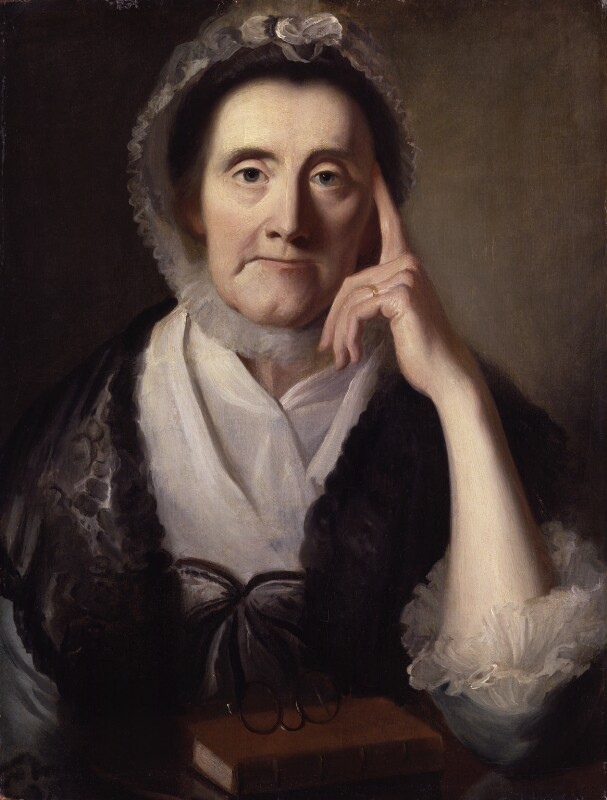 Source: Unknown Artist, 'Portrait of Selina Hastings' (c.1770)The Countess of Huntingdon, to whom Mr. Whitefield was Chaplain.
[Wheatley's note]. Selina Hastings, the countess
of Huntingdon (1707-1791), was a major figure in the Methodist movement,
using her wealth to support the founding of chapels and a training school for
ministers. Whitefield became her personal chaplain in the 1740s. Wheatley sought and
recieved her patronage as well, and Wheatley's 1773 volume of poems was published
with her support. The image here shows a portrait of Selina Hastings by an unknown artist, about 1770, from the National
Portrait Gallery, London. - [JOB]
orphansWhitefield first came to the American colonies in 1738, when he travelled to
Savannah, Georgia, where the colony's trustees had hired him to serve as minister. He
decided to make his main project in Savannah the establishment of an orphanage, and
he returned to England after only four months to raise money for the project. The
Bethesda Orphan House was founded in 1740, and Whitefield continued to raise money
and to return for visits to the institution throughout his lifetime. - [JOB]
25
On the Death of a young Lady of Five Years of Age.
1FROM dark abodes to fair etherial light
2Th' enraptur'd innocent has wing'd her flight;
3On the kind bosom of eternal love
4She finds unknown beatitude above.
5This know, ye parents, nor her loss deplore,
6She feels the iron hand of pain no more;
7The dispensations of unerring grace,
8Should turn your sorrows into grateful praise;
9Let then no tears for her henceforward flow,
10No more distress'd in our dark vale below.
11Her morning sun, which rose divinely bright,
12Was quickly mantled with the gloom of night;
13But hear in heav'n's blest bow'rs your Nancy
fair,
14And learn to imitate her language there.
15"Thou, Lord, whom I behold with glory crown'd,
16"By what sweet name, and in what tuneful sound
26
17"Wilt thou be prais'd? Seraphic pow'rs are faint
18"Infinite love and majesty to paint.
19"To thee let all their graceful voices raise,
20"And saints and angels join their songs of praise."
21Perfect in bliss she from her heav'nly home
22Looks down, and smiling beckons you to come;
23Why then, fond parents, why these fruitless groans?
24Restrain your tears, and cease your plaintive moans.
25Freed from a world of sin, and snares, and pain,
26Why would you wish your daughter back again?
27No -- bow resign'd. Let hope your grief control,
28And check the rising tumult of the soul.
29Calm in the prosperous, and adverse day,
30Adore the God who gives and takes away;
31Eye him in all, his holy name revere,
32Upright your actions, and your hearts sincere,
33Till having sail'd through life's tempestuous sea,
34And from its rocks, and boist'rous billows free,
35Yourselves, safe landed on the blissful shore,
36Shall join your happy babe to part no more.
27
On the Death of a young Gentleman.
1WHO taught thee conflict with the pow'rs of night,
2To vanquish Satan in the fields of fight?
3Who strung thy feeble arms with might unknown,
4How great thy conquest, and how bright thy crown!
5War with each princedom, throne, and pow'r is o'er,
6The scene is ended to return no more.
7O could my muse thy seat on high behold,
8How deckt with laurel, how enrich'd with gold!
9O could she hear what praise thine harp employs,
10How sweet thine anthems, how divine thy joys!
11What heav'nly grandeur should exalt her strain!
12What holy raptures in her numbers reign!
13To sooth the troubles of the mind to peace,
14To still the tumult of life's tossing seas,
28
15To ease the anguish of the parents heart,
16What shall my sympathizing verse impart?
17Where is the balm to heal so deep a wound?
18Where shall a sov'reign remedy be found?
19Look, gracious Spirit, from thine heav'nly bow'r,
20And thy full joys into their bosoms pour;
21The raging tempest of their grief control,
22And spread the dawn of glory through the soul,
23To eye the path the saint departed trod,
24And trace him to the bosom of his God.
29
To a Lady on the Death of her Husband.
1GRIM monarch! see, depriv'd of vital breath,
2A young physician in the dust of death:
3Dost thou go on incessant to destroy,
4Our griefs to double, and lay waste our joy?
5Enough thou never yet wast known to say,
6Though millions die, the vassals of thy sway:
7Nor youth, nor science, nor the ties of love,
8Nor aught on earth thy flinty heart can move.
9The friend, the spouse from his dire dart to save,
10In vain we ask the sovereign of the grave.
11Fair mourner, there see thy lov'd Leonard laid,
12And o'er him spread the deep impervious shade;
13Clos'd are his eyes, and heavy fetters keep
14His senses bound in never-waking sleep,
15Till time shall cease, till many a starry world
16Shall fall from heav'n, in dire confusion hurl'd,
17Till nature in her final wreck shall lie,
18And her last groan shall rend the azure sky:
30
19Not, not till then his active soul shall claim
20His body, a divine immortal frame.
21But see the softly-stealing tears apace
22Pursue each other down the mourner's face;
23But cease thy tears, bid ev'ry sigh depart,
24And cast the load of anguish from thine heart:
25From the cold shell of his great soul arise,
26And look beyond, thou native of the skies;
27There fix thy view, where fleeter than the wind
28Thy Leonard mounts, and leaves the earth behind.
29Thyself prepare to pass the vale of night
30To join for ever on the hills of light:
31To thine embrace this joyful spirit moves
32To thee, the partner of his earthly loves;
33He welcomes thee to pleasures more refin'd,
34And better suited to th' immortal mind.
31
GOLIATH OF GATH.
I SAM. Chap. xvii.
1YE martial pow'rs, and all ye tuneful nine,
2Inspire my song, and aid my high design.
3The dreadful scenes and toils of war I write,
4The ardent warriors, and the fields of fight:
5You best remember, and you best can sing
6The acts of heroes to the vocal string:
7Resume the lays with which your sacred lyre,
8Did then the poet and the sage inspire.
9Now front to front the armies were display'd,
10Here Israel rang'd, and there the foes array'd;
11The hosts on two opposing mountains stood,
12Thick as the foliage of the waving wood;
13Between them an extensive valley lay,
14O'er which the gleaming armour pour'd the day,
15When from the camp of the Philistine foes,
16Dreadful to view, a mighty warrior rose;
17In the dire deeds of bleeding battle skill'd,
18The monster stalks the terror of the field.
32 [copy 2]
19From Gath he sprung, Goliath
was his name,
20Of fierce deportment, and gigantic frame:
21A brazen helmet on his head was plac'd,
22A coat of mail his form terrific grac'd,
23The greaves his legs, the targe his shoulders prest:
24Dreadful in arms high-tow'ring o'er the rest
25A spear he proudly wav'd, whose iron head,
26Strange to relate, six hundred shekels weigh'd;
27He strode along, and shook the ample field,
28While Phoebus blaz'd refulgent on his shield:
29Through Jacob's race a chilling horror ran,
30When thus the huge, enormous chief began:
31"Say, what the cause that in this proud array
32"You set your battle in the face of day?
33"One hero find in all your vaunting train,
34"Then see who loses, and who wins the plain;
35"For he who wins, in triumph may demand
36"Perpetual service from the vanquish'd land:
37"Your armies I defy, your force despise,
38"By far inferior in Philistia's eyes:
33 [copy 2]
39"Produce a man, and let us try the fight,
40"Decide the contest, and the victor's right."
41Thus challeng'd he: all Israel stood
amaz'd,
42And ev'ry chief in consternation gaz'd;
43But Jesse's son in youthful bloom appears,
44And warlike courage far beyond his years:
45He left the folds, he left the flow'ry meads,
46And soft recesses of the sylvan shades.
47Now Israel's monarch, and his troops arise,
48With peals of shouts ascending to the skies;
49In Elah's vale the scene of combat lies.
50When the fair morning blush'd with orient red,
51What David's sire enjoin'd the son obey'd,
52And swift of foot towards the trench he came,
53Where glow'd each bosom with the martial flame.
54He leaves his carriage to another's care,
55And runs to greet his brethren of the war.
56While yet they spake the giant-chief arose,
57Repeats the challenge, and insults his foes:
34 [copy 2]
58Struck with the sound, and trembling at the view,
59Affrighted Israel from its post withdrew.
60"Observe ye this tremendous foe, they cry'd,
61"Who in proud vaunts our armies hath defy'd:
62"Whoever lays him prostrate on the plain,
63"Freedom in Israel for his house shall gain;
64"And on him wealth unknown the king will pour,
65"And give his royal daughter for his dow'r."
66Then Jesse's youngest hope: "My
brethren say,
67"What shall be done for him who takes away
68"Reproach from Jacob, who destroys the chief,
69"And puts a period to his country's grief.
70"He vaunts the honours of his arms abroad,
71"And scorns the armies of the living God."
72Thus spoke the youth, th' attentive people ey'd
73The wond'rous hero, and again reply'd:
74"Such the rewards our monarch will bestow,
75"On him who conquers, and destroys his foe."
35 [copy 2]
76Eliab heard, and kindled into ire
77To hear his shepherd-brother thus inquire,
78And thus begun? "What errand brought thee? say
79"Who keeps thy flock? or does it go astray?
80"I know the base ambition of thine heart,
81"But back in safety from the field depart."
82Eliab thus to Jesse's youngest heir,
83Express'd his wrath in accents most severe.
84When to his brother mildly he reply'd,
85"What have I done? or what the cause to chide?"
86The words were told before the king, who sent
87For the young hero to his royal tent:
88Before the monarch dauntless he began,
89"For this Philistine fail no heart of man:
90"I'll take the vale, and with the giant fight:
91"I dread not all his boasts, nor all his might."
36 [copy 2]
92When thus the king: "Dar'st thou a stripling go,
93"And venture combat with so great a foe?
94"Who all his days has been inur'd to fight,
95"And made its deeds his study and delight:
96"Battles and bloodshed brought the monster forth,
97"And clouds and whirlwinds usher'd in his birth."
98When David thus: "I kept the fleecy care,
99"And out there rush'd a lion and a bear;
100"A tender lamb the hungry lion took,
101"And with no other weapon than my crook
102"Bold I pursu'd, and chas'd him o'er the field,
103"The prey deliver'd, and the felon kill'd:
104"As thus the lion and the bear I slew,
105"So shall Goliath fall, and all his crew:
106"The God, who sav'd me from these beasts of prey,
107"By me this monster in the dust shall lay."
108So David spoke. The wond'ring king reply'd;
109"Go thou with heav'n and victory on thy side:
110"This coat of mail, this sword gird on," he said,
111And plac'd a mighty helmet on his head:
37 [copy 2]
112The coat, the sword, the helm he laid aside,
113Nor chose to venture with those arms untry'd,
114Then took his staff, and to the neighb'ring brook
115Instant he ran, and thence five pebbles took.
116Mean time descended to Philistia's son
117A radiant cherub, and he thus begun:
118"Goliath, well thou know'st thou hast defy'd
119"Yon Hebrew armies, and their God deny'd:
120"Rebellious wretch! audacious worm! forbear,
121"Nor tempt the vengeance of their God too far:
122"Them, who with his omnipotence contend,
123"No eye shall pity, and no arm defend:
124"Proud as thou art, in short liv'd glory great,
125"I come to tell thee thine approaching fate.
126"Regard my words. The judge of all the gods,
127"Beneath whose steps the tow'ring mountain nods,
128"Will give thine armies to the savage brood,
129"That cut the liquid air, or range the wood.
130"Thee too a well-aim'd pebble shall destroy,
131"And thou shalt perish by a beardless boy:
38 [copy 2]
132"Such is the mandate from the realms above,
133"And should I try the vengeance to remove,
134"Myself a rebel to my king would prove.
135"Goliath say, shall grace to him be shown,
136"Who dares heav'ns monarch, and insults his throne?"
137"Your words are lost on me," the giant cries,
138While fear and wrath contended in his eyes,
139When thus the messenger from heav'n replies:
140"Provoke no more Jehovah's awful hand
141"To hurl its vengeance on thy guilty land:
142"He grasps the thunder, and, he wings the storm,
143"Servants their sov'reign's orders to perform."
144The angel spoke, and turn'd his eyes away,
145Adding new radiance to the rising day.
146Now David comes: the fatal stones
demand
147His left, the staff engag'd his better hand
39 [copy 2]
148The giant mov'd, and from his tow'ring height
149Survey'd the stripling, and disdain'd the fight,
150And thus began: "Am I a dog with thee?
151"Bring'st thou no armour, but a staff to me?
152"The gods on thee their vollied curses pour,
153"And beasts and birds of prey thy flesh devour."
154David undaunted thus, "Thy spear and
shield
155"Shall no protection to thy body yield:
156"Jehovah's name -- no other arms I bear,
157"I ask no other in this glorious war.
158"To-day the Lord of Hosts to me will give
159"Vict'ry, to-day thy doom thou shalt receive;
160"The fate you threaten shall your own become,
161"And beasts shall be your animated tomb,
162"That all the earth's inhabitants may know
163"That there's a God, who governs all below
164"This great assembly too shall witness stand,
165"That needs nor sword, nor spear, th' Almighty's hand:
40 [copy 2]
166"The battle his, the conquest he bestows,
167"And to our pow'r consigns our hated foes."
168Thus David spoke; Goliath heard and came
169To meet the hero in the field of fame.
170Ah! fatal meeting to thy troops and thee,
171But thou wast deaf to the divine decree;
172Young David meets thee, meets thee not in vain;
173'Tis thine to perish on th' ensanguin'd plain.
174And now the youth the forceful pebble slung
175Philistia trembled as it whizz'd along:
176In his dread forehead, where the helmet ends,
177Just o'er the brows the well-aim'd stone descends,
178It pierc'd the skull, and shatter'd all the brain,
179Prone on his face he tumbled to the plain:
180Goliath's fall no smaller terror yields
181Than riving thunders in aerial fields:
182The soul still ling'red in its lov'd abode,
183Till conq'ring David o'er the giant strode:
184Goliath's sword then laid its master dead,
185And from the body hew'd the ghastly head;
41
186The blood in gushing torrents drench'd the plains,
187The soul found passage through the spouting veins.
188And now aloud th' illustrious victor said,
189"Where are your boastings now your champion's dead?"
190Scarce had he spoke, when the Philistines fled:
191But fled in vain; the conqu'ror swift pursu'd:
192What scenes of slaughter! and what seas of blood!
193There Saul thy thousands grasp'd th' impurpled
sand
194In pangs of death the conquest of thine hand;
195And David there were thy ten thousands laid:
196Thus Israel's damsels musically play'd.
197Near Gath and Ekron many an hero lay,
198Breath'd out their souls, and curs'd the light of day:
199Their fury, quench'd by death, no longer burns,
200And David with Goliath's
head returns,
201To Salem brought, but in his tent he plac'd
202The load of armour which the giant grac'd.
42
203His monarch saw him coming from the war,
204And thus demanded of the son of Ner.
205"Say, who is this amazing youth?" he cry'd,
206When thus the leader of the host reply'd;
207"As lives thy soul I know not whence he sprung,
208"So great in prowess though in years so young:"
209"Inquire whose son is he," the sov'reign said,
210"Before whose conq'ring arm Philistia fled."
211Before the king behold the stripling stand,
212Goliath's head depending from his hand:
213To him the king: "Say of what martial line
214"Art thou, young hero, and what sire was thine?"
215He humbly thus; "the son of Jesse I:
216"I came the glories of the field to try.
217"Small is my tribe, but valiant in the fight;
218"Small is my city, but thy royal right."
219"Then take the promis'd gifts," the monarch cry'd,
220Conferring riches and the royal bride:
221"Knit to my soul for ever thou remain
222"With me, nor quit my regal roof again."
43
Thoughts on the WORKS of PROVIDENCE.
1ARISE, my soul, on wings enraptur'd, rise
2To praise the monarch of the earth and skies,
3Whose goodness and beneficence appear
4As round its centre moves the rolling year,
5Or when the morning glows with rosy charms,
6Or the sun slumbers in the ocean's arms:
7Of light divine be a rich portion lent
8To guide my soul, and favour my intent.
9Celestial muse, my arduous flight sustain,
10And raise my mind to a seraphic strain!
11Ador'd for ever be the God unseen,
12Which round the sun revolves this vast machine,
13Though to his eye its mass a point appears:
14Ador'd the God that whirls surrounding spheres,
15Which first ordain'd that mighty Sol should
reign
16The peerless monarch of th' ethereal train:
44
17Of miles twice forty millions is his height,
18And yet his radiance dazzles mortal sight
19So far beneath -- from him th' extended earth
20Vigour derives, and ev'ry flow'ry birth:
21Vast through her orb she moves with easy grace
22Around her Phoebus in unbounded space;
23True to her course th' impetuous storm derides,
24Triumphant o'er the winds, and surging tides.
25Almighty, in these wond'rous works of thine,
26What Pow'r, what Wisdom, and
what Goodnes shine?
27And are thy wonders, Lord, by men explor'd,
28And yet creating glory unador'd!
29Creation smiles in various beauty gay,
30While day to night, and night succeeds to day:
31That Wisdom, which attends Jehovah's ways,
32Shines most conspicuous in the solar rays:
33Without them, destitute of heat and light,
34This world would be the reign of endless night:
45
35In their excess how would our race complain,
36Abhorring life! how hate its length'ned chain!
37From air adust what num'rous ills would rise?
38What dire contagion taint the burning skies?
39What pestilential vapours, fraught with death,
40Would rise, and overspread the lands beneath?
41Hail, smiling morn, that from the orient main
42Ascending dost adorn the heav'nly plain!
43So rich, so various are thy beauteous dies,
44That spread through all the circuit of the skies,
45That, full of thee, my soul in rapture soars,
46And thy great God, the cause of all adores.
47O'er beings infinite his love extends,
48His Wisdom rules them, and his Pow'r defends.
49When tasks diurnal tire the human frame,
50The spirits faint, and dim the vital flame,
51Then too that ever active bounty shines,
52Which not infinity of space confines.
53The sable veil, that Night in silence draws,
54Conceals effects, but shews th' Almighty Cause;
46
55Night seals in sleep the wide creation fair,
56And all is peaceful but the brow of care.
57Again, gay Phoebus, as the day before,
58Wakes ev'ry eye, but what shall wake no more;
59Again the face of nature is renew'd,
60Which still appears harmonious, fair, and good.
61May grateful strains salute the smiling morn,
62Before its beams the eastern hills adorn!
63Shall day to day and night to night conspire
64To show the goodness of the Almighty Sire?
65This mental voice shall man regardless hear,
66And never, never raise the filial pray'r?
67To-day, O hearken, nor your folly mourn
68For time mispent, that never will return.
69But see the sons of vegetation rise,
70And spread their leafy banners to the skies.
71All-wise Almighty Providence we trace
72In trees, and plants, and all the flow'ry race;
73As clear as in the nobler frame of man,
74All lovely copies of the Maker's plan.
47
75The pow'r the same that forms a ray of light,
76That call'd creation from eternal night.
77"Let there be light," he said: from his profound
78Old Chaos heard, and trembled at the sound:
79Swift as the word, inspir'd by pow'r divine,
80Behold the light around its maker shine,
81The first fair product of th' omnific God,
82And now through all his works diffus'd abroad.
83As reason's pow'rs by day our God disclose,
84So we may trace him in the night's repose:
85Say what is sleep? and dreams how passing strange!
86When action ceases, and ideas range
87Licentious and unbounded o'er the plains,
88Where Fancy's queen in giddy triumph reigns.
89Hear in soft strains the dreaming lover sigh
90To a kind fair, or rave in jealousy;
91On pleasure now, and now on vengeance bent,
92The lab'ring passions struggle for a vent.
93What pow'r, O man! thy reason then restores,
94So long suspended in nocturnal hours?
48
95What secret hand returns the mental train,
96And gives improv'd thine active pow'rs again?
97From thee, O man, what gratitude should rise!
98And, when from balmy sleep thou op'st thine eyes,
99Let thy first thoughts be praises to the skies.
100How merciful our God who thus imparts
101O'erflowing tides of joy to human hearts,
102When wants and woes might be our righteous lot,
103Our God forgetting, by our God forgot!
104Among the mental pow'rs a question rose,
105"What most the image of th' Eternal shows?"
106When thus to Reason (so let Fancy rove)
107Her great companion spoke immortal Love.
108"Say, mighty pow'r, how long shall strife prevail,
109"And with its murmurs load the whisp'ring gale?
110"Refer the cause to Recollection's shrine,
111"Who loud proclaims my origin divine,
49
112"The cause whence heav'n and earth began to be,
113"And is not man immortaliz'd by me?
114"Reason let this most causeless strife
subside."
115Thus Love pronounc'd, and Reason thus reply'd.
116"Thy birth, celestial queen! 'tis mine to own,
117"In thee resplendent is the Godhead shown;
118"Thy words persuade, my soul enraptur'd feels
119"Resistless beauty which thy smile reveals."
120Ardent she spoke, and, kindling at her charms,
121She clasp'd the blooming goddess in her arms.
122Infinite Love where'er we turn our
eyes
123Appears: this ev'ry creature's wants supplies;
124This most is heard in Nature's constant voice,
125This makes the morn, and this the eve rejoice;
126This bids the fost'ring rains and dews descend
127To nourish all, to serve one gen'ral end,
50
128The good of man: yet man ungrateful pays
129But little homage, and but little praise.
130To him, whose works array'd with mercy shine
131What songs should rise, how constant, how divine!
51
To a Lady on the Death of Three Relations.
1WE trace the pow'r of Death from tomb to tomb,
2And his are all the ages yet to come.
3'Tis his to call the planets from on high,
4To blacken Phoebus, and dissolve the sky;
5His too, when all in his dark realms are hurl'd,
6From its firm base to shake the solid world;
7His fatal sceptre rules the spacious whole,
8And trembling nature rocks from pole to pole.
9Awful he moves, and wide his wings are spread:
10Behold thy brother number'd with the dead!
11From bondage freed, the exulting spirit flies
12Beyond Olympus, and these starry skies.
13Lost in our woe for thee, blest shade, we mourn
14In vain; to earth thou never must return.
15Thy sisters too, fair mourner, feel the dart
16Of Death, and with fresh torture rend thine heart.
52
17Weep not for them, who wish thine happy mind
18To rise with them, and leave the world behind.
19As a young plant by hurricanes up torn,
20So near its parent lies the newly born --
21But 'midst the bright ethereal train behold
22It shines superior on a throne of gold:
23Then, mourner, cease; let hope thy tears restrain,
24Smile on the tomb, and sooth the raging pain.
25On yon blest regions fix thy longing view,
26Mindless of sublunary scenes below;
27Ascend the sacred mount, in thought arise,
28And seek substantial, and immortal joys;
29Where hope receives, where faith to vision springs,
30And raptur'd seraphs tune th' immortal strings
31To strains extatic. Thou the chorus join,
32And to thy father tune the praise divine.
53
To a Clergyman on the Death of his Lady.
1WHERE contemplation finds her sacred spring,
2Where heav'nly music makes the arches ring,
3Where virtue reigns unsully'd and divine,
4Where wisdom thron'd, and all the graces shine,
5There sits thy spouse amidst the radiant throng,
6While praise eternal warbles from her tongue;
7There choirs angelic shout her welcome round,
8With perfect bliss, and peerless glory crown'd.
9While thy dear mate, to flesh no more confin'd,
10Exults a blest, an heav'n-ascended mind,
11Say in thy breast shall floods of sorrow rise?
12Say shall its torrents overwhelm thine eyes?
13Amid the seats of heav'n a place is free,
14And angels ope their bright ranks for thee;
15For thee they wait, and with expectant eye
16Thy spouse leans downward from th' empyreal sky:
54
17"O come away," her longing spirit cries,
18"And share with me the raptures of the skies.
19"Our bliss divine to mortals is unknown;
20"Immortal life and glory are our own.
21"There too may the dear pledges of our love
22"Arrive, and taste with us the joys above;
23"Attune the harp to more than mortal lays,
24"And join with us the tribute of their praise
25"To him, who dy'd stern justice to atone,
27"And make eternal glory all our own.
28"He in his death slew ours, and, as he rose,
29"He crush'd the dire dominion of our foes;
30"Vain were their hopes to put the God to flight,
31"Chain us to hell, and bar the gates of light."
32She spoke, and turn'd from mortal scenes her eyes,
33Which beam'd celestial radiance o'er the skies.
34Then thou dear man, no more with grief retire,
35Let grief no longer damp devotion's fire,
36But rise sublime, to equal bliss aspire.
55
37Thy sighs no more be wafted by the wind,
38No more complain, but be to heav'n resign'd.
39'Twas thine t' unfold the oracles divine,
40To sooth our woes the task was also thine;
41Now sorrow is incumbent on thy heart,
42Permit the muse a cordial to impart;
43Who can to thee their tend'rest aid refuse?
44To dry thy tears how longs the heav'nly muse!
56
An HYMN to the MORNING.
1ATTEND my lays, ye ever honour'd nine,
2Assist my labours, and my strains refine;
3In smoothest numbers pour the notes along,
4For bright Aurora now demands my song.
5Aurora hail, and all the thousands
dies,
6Which deck thy progress through the vaulted skies:
7The morn awakes, and wide extends her rays,
8On ev'ry leaf the gentle zephyr plays;
9Harmonious lays the feather'd race resume,
10Dart the bright eye, and shake the painted plume.
11Ye shady groves, your verdant gloom display
12To shield your poet from the burning day:
13Calliope awake the sacred lyre,
14While thy fair sisters fan the pleasing fire:
57
15The bow'rs, the gales, the variegated skies
16In all their pleasures in my bosom rise.
17See in the east th' illustrious king of day!
18His rising radiance drives the shades away --
19But Oh! I feel his fervid beams too strong,
20And scarce begun, concludes th' abortive song.
58
An HYMN to the EVENING.
1SOON as the sun forsook the eastern main
2The pealing thunder shook the heav'nly plain;
3Majestic grandeur! From the zephyr's wing,
4Exhales the incense of the blooming spring.
5Soft purl the streams, the birds renew their notes,
6And through the air their mingled music floats.
7Through all the heav'ns what beauteous dies are spread!
8But the west glories in the deepest red:
9So may our breasts with ev'ry virtue glow,
10The living temples of our God below!
11Fill'd with the praise of him who gives the light,
12And draws the sable curtains of the night,
59
13Let placid slumbers sooth each weary mind,
14At morn to wake more heav'nly, more refin'd,
15So shall the labours of the day begin
16More pure, more guarded from the snares of sin.
17Night's leaden sceptre seals my drowsy eyes,
18Then cease, my song, till fair Aurora rise.
60
ISAIAH lxiii. I-8.
1SAY, heav'nly muse, what king or mighty God,
2That moves sublime from Idumea's road?
3In Bozrah's dies, with martial glories join'd,
4His purple vesture waves upon the wind.
5Why thus enrob'd delights he to appear
6In the dread image of the Pow'r of war?
7Compress'd in wrath the swelling wine-press groan'd,
8It bled, and pour'd the gushing purple round.
9"Mine was the act," th' Almighty Saviour said,
10And shook the dazzling glories of his head,
11"When all forsook I trod the press alone,
12"And conquer'd by omnipotence my own;
13"For man's release sustain'd the pond'rous load,
14"For man the wrath of an immortal God:
61
15"To execute th' Eternal's dread command
16"My soul I sacrific'd with willing hand;
17"Sinless I stood before the avenging frown,
18"Atoning thus for vices not my own."
19His eye the ample field of battle round
20Survey'd, but no created succours found;
21His own omnipotence sustain'd the fight,
22His vengeance sunk the haughty foes in night;
23Beneath his feet the prostrate troops were spread,
24And round him lay the dying, and the dead.
25Great God, what light'ning flashes from thine eyes?
26What pow'r withstands if thou indignant rise?
27Against thy Zion though her foes may
rage,
28And all their cunning, all their strength engage,
29Yet she serenely on thy bosom lies,
30Smiles at their arts, and all their force defies.
62
On RECOLLECTION.
1MNEME begin. Inspire, ye sacred nine,
2Your vent'rous Afric in her great design.
3Mneme, immortal pow'r, I trace thy spring:
4Assist my strains, while I thy glories sing:
5The acts of long departed years, by thee
6Recover'd, in due order rang'd we see:
7Thy pow'r the long-forgotten calls from night,
8That sweetly plays before the fancy's sight.
9Mneme in our nocturnal visions
pours
10The ample treasure of her secret stores;
11Swift from above she wings her silent flight
12Through Phoebe's realms, fair regent of the
night;
13And, in her pomp of images display'd,
14To the high-raptur'd poet gives her aid,
15Through the unbounded regions of the mind,
16Diffusing light celestial and refin'd.
63
17The heav'nly phantom paints the actions done
18By ev'ry tribe beneath the rolling sun.
19Mneme, enthron'd within the human
breast,
20Has vice condemn'd, and ev'ry virtue blest.
21How sweet the sound when we her plaudit hear?
22Sweeter than music to the ravish'd ear,
23Sweeter than Maro's entertaining strains
24Resounding through the groves, and hills, and plains.
25But how is Mneme dreaded by the race,
26Who scorn her warnings, and despise her grace?
27By her unveil'd each horrid crime appears,
28Her awful hand a cup of wormwood bears.
29Days, years mispent, O what a hell of woe!
30Hers the worst tortures that our souls can know.
31Now eighteen years their destin'd course have run,
32In fast succession round the central sun.
33How did the follies of that period pass
34Unnotic'd, but behold them writ in brass!
64
35In Recollection see them fresh return,
36And sure 'tis mine to be asham'd, and mourn.
37O Virtue, smiling in immortal
green,
38Do thou exert thy pow'r, and change the scene;
39Be thine employ to guide my future days,
40And mine to pay the tribute of my praise.
41Of Recollection such the pow'r
enthron'd
42In ev'ry breast, and thus her pow'r is own'd.
43The wretch, who dar'd the vengeance of the skies,
44At last awakes in horror and surprise,
45By her alarm'd, he sees impending fate,
46He howls in anguish, and repents too late.
47But O! what peace, what joys are hers t' impart
48To ev'ry holy, ev'ry upright heart!
49Thrice blest the man, who, in her sacred shrine,
50Feels himself shelter'd from the wrath divine!
65
On IMAGINATION.
1THY various works, imperial queen, we see,
2How bright their forms! how deck'd with pomp by thee!
3Thy wond'rous acts in beauteous order stand,
4And all attest how potent is thine hand.
5From Helicon's refulgent heights
attend,
6Ye sacred choir, and my attempts befriend:
7To tell her glories with a faithful tongue,
8Ye blooming graces, triumph in my song.
9Now here, now there, the roving Fancy
flies,
10Till some lov'd object strikes her wand'ring eyes,
11Whose silken fetters all the senses bind,
12And soft captivity involves the mind.
66
13Imagination! who can sing thy
force?
14Or who describe the swiftness of thy course?
15Soaring through air to find the bright abode,
16Th' empyreal palace of the thund'ring God,
17We on thy pinions can surpass the wind,
18And leave the rolling universe behind:
19From star to star the mental optics rove,
20Measure the skies, and range the realms above.
21There in one view we grasp the mighty whole,
22Or with new worlds amaze th' unbounded soul.
23Though Winter frowns to Fancy's raptur'd eyes
24The fields may flourish, and gay scenes arise;
25The frozen deeps may break their iron bands,
26And bid their waters murmur o'er the sands.
27Fair Flora may resume her fragrant reign,
28And with her flow'ry riches deck the plain;
29Sylvanus may diffuse his honours round,
30And all the forest may with leaves be crown'd:
67
31Show'rs may descend, and dews their gems disclose,
32And nectar sparkle on the blooming rose.
33Such is thy pow'r, nor are thine orders vain,
34O thou the leader of the mental train:
35In full perfection all thy works are wrought,
36And thine the sceptre o'er the realms of thought.
37Before thy throne the subject-passions bow,
38Of subject-passions sov'reign ruler Thou;
39At thy command joy rushes on the heart,
40And through the glowing veins the spirits dart.
41Fancy might now her silken pinions
try
42To rise from earth, and sweep th' expanse on high;
43From Tithon's bed now might Aurora rise,
44Her cheeks all glowing with celestial dies,
45While a pure stream of light o'erflows the skies.
46The monarch of the day I might behold,
47And all the mountains tipt with radiant gold,
68
48But I reluctant leave the pleasing views,
49Which Fancy dresses to delight the Muse;
50Winter austere forbids me to aspire,
51And northern tempests damp the rising fire;
52They chill the tides of Fancy's flowing sea,
53Cease then, my song, cease the unequal lay.
69
A Funeral POEM on the Death of C. E. an Infant of Twelve
Months.
1THROUGH airy roads he wings his instant flight
2To purer regions of celestial light;
3Enlarg'd he sees unnumber'd systems roll,
4Beneath him sees the universal whole,
5Planets on planets run their destin'd round,
6And circling wonders fill the vast profound.
7Th' ethereal now, and now th' empyreal skies
8With growing splendors strike his wond'ring eyes:
9The angels view him with delight unknown,
10Press his soft hand, and seat him on his throne;
11Then smiling thus. "To this divine abode,
12"The seat of saints, of seraphs, and of God,
13"Thrice welcome thou." The raptur'd babe replies,
14"Thanks to my God, who snatch'd me to the skies,
70
15"E'er vice triumphant had possess'd my heart,
16"E'er yet the tempter had beguil'd my heart,
17"E'er yet on sin's base actions I was bent,
18"E'er yet I knew temptation's dire intent;
19"E'er yet the lash for horrid crimes I felt,
20"E'er vanity had led my way to guilt,
21"But, soon arriv'd at my celestial goal,
22"Full glories rush on my expanding soul."
23Joyful he spoke: exulting cherubs round
24Clapt their glad wings, the heav'nly vaults resound.
25Say, parents, why this unavailing moan?
26Why heave your pensive bosoms with the groan?
27To Charles, the happy subject of my song,
28A brighter world, and nobler strains belong.
29Say would you tear him from the realms above
30By thoughtless wishes, and prepost'rous love?
31Doth his felicity increase your pain?
32Or could you welcome to this world again
33The heir of bliss? with a superior air
34Methinks he answers with a smile severe,
35"Thrones and dominions cannot tempt me there."
71
36But still you cry, "Can we the sigh forbear,
37"And still and still must we not pour the tear?
38"Our only hope, more dear than vital breath,
39"Twelve moons revolv'd, becomes the prey of death;
40"Delightful infant, nightly visions give
41"Thee to our arms, and we with joy receive,
42"We fain would clasp the Phantom to our breast,
43"The Phantom flies, and leaves the soul
unblest."
44To yon bright regions let your faith ascend,
45Prepare to join your dearest infant friend
46In pleasures without measure, without end.
72
To Captain H----D, of the 65th Regiment.
1SAY, muse divine, can hostile scenes delight
2The warrior's bosom in the fields of fight?
3Lo! here the christian and the hero join
4With mutual grace to form the man divine.
5In H----D see with pleasure and surprize,
6Where valour kindles, and where virtue lies:
7Go, hero brave, still grace the post of fame,
8And add new glories to thine honour'd name,
9Still to the field, and still to virtue true:
10Britannia glories in no son like you.
73
To the Right Honourable WILLLAM, Earl of DARTMOUTH, His Majesty's
Principal Secretary of State for North America, &c.
1HAIL, happy day, when, smiling like the morn,
2Fair Freedom rose New-England
to adorn:
3The northern clime beneath her genial ray,
4Dartmouth, congratulates thy blissful sway:
5Elate with hope her race no longer mourns,
6Each soul expands, each grateful bosom burns,
7While in thine hand with pleasure we behold
8The silken reins, and Freedom's charms unfold.
9Long lost to realms beneath the northern skies
10She shines supreme, while hated faction dies:
11Soon as appear'd the Goddess long desir'd,
12Sick at the view, she languish'd and expir'd;
13Thus from the splendors of the morning light
14The owl in sadness seeks the caves of night.
74
No more, America, in mournful strain
15Of wrongs, and grievance unredress'd complain,
16No longer shall thou dread the iron chain,
17Which wanton Tyranny with lawless hand
18Had made, and with it meant t' enslave the land.
Should you, my lord, while you peruse my song,
19Wonder from whence my love of Freedom sprung,
20Whence flow these wishes for the common good,
21By feeling hearts alone best understood,
22I, young in life, by seeming cruel fate
23Was snatch'd from Afric's fancy'd happy seat:
24What pangs excruciating must molest,
25What sorrows labour in my parent's breast?
26Steel'd was that soul and by no misery mov'd
27That from a father seiz'd his babe belov'd:
28Such, such my case. And can I then but pray
29Others may never feel tyrannic sway?
75
For favours past, great Sir, our thanks are due,
30And thee we ask thy favours to renew,
31Since in thy pow'r, as in thy will before,
32To sooth the griefs, which thou did'st once deplore.
33May heav'nly grace the sacred sanction give
34To all thy works, and thou for ever live
35Not only on the wings of fleeting Fame,
36Though praise immortal crowns the patriot's name,
37But to conduct to heav'ns refulgent fane,
38May fiery coursers sweep th' ethereal plain,
39And bear thee upwards to that blest abode,
40Where, like the prophet, thou shalt find thy God.
76
ODE TO NEPTUNE.
On Mrs. W--'s Voyage to England.
I.
1WHILE raging tempests shake the shore,
2While AE'lus' thunders round us roar,
3And sweep impetuous o'er the plain
4Be still, O tyrant of the main;
5Nor let thy brow contracted frowns betray,
6While my Susannah skims the wat'ry way.
II.
7The Pow'r propitious hears the lay,
8The blue-ey'd daughters of the sea
9With sweeter cadence glide along,
10And Thames responsive joins the song.
11Pleas'd with their notes Sol sheds benign his
ray,
12And double radiance decks the face of day.
77
III.
13To court thee to Britannia's arms
14Serene the climes and mild the sky,
15Her region boasts unnumber'd charms,
16Thy welcome smiles in ev'ry eye.
17Thy promise, Neptune keep, record my pray'r,
18Nor give my wishes to the empty air.
Boston, October 10, 1772.
78
To a LADY on her coming to North-America with her Son, for the
Recovery of her Health.
1INdulgent muse! my grov'ling mind inspire,
2And fill my bosom with celestial fire.
3See from Jamaica's fervid shore she
moves,
4Like the fair mother of the blooming loves,
5When from above the Goddess with her hand
6Fans the soft breeze, and lights upon the land;
7Thus she on Neptune's wat'ry realm reclin'd
8Appear'd, and thus invites the ling'ring wind.
9"Arise, ye winds, America explore,
10"Waft me, ye gales, from this malignant shore;
11"The Northern milder climes I long to greet,
12"There hope that health will my arrival meet."
13Soon as she spoke in my ideal view
14The winds assented, and the vessel flew.
79
15Madam, your spouse bereft of wife and son,
16In the grove's dark recesses pours his moan;
17Each branch, wide-spreading to the ambient sky,
18Forgets its verdure, and submits to die.
19From thence I turn, and leave the sultry plain,
20And swift pursue thy passage o'er the main:
21The ship arrives before the fav'ring wind,
22And makes the Philadelphian port assign'd,
23Thence I attend you to Bostonia's arms,
24Where gen'rous friendship ev'ry bosom warms:
25Thrice welcome here! may health revive again,
26Bloom on thy cheek, and bound in ev'ry vein!
27Then back return to gladden ev'ry heart,
28And give your spouse his soul's far dearer part,
29Receiv'd again with what a sweet surprize,
30The tear in transport starting from his eyes!
31While his attendant son with blooming grace
32Springs to his father's ever dear embrace.
33With shouts of joy Jamaica's rocks resound,
34With shouts of joy the country rings around.
80
To a LADY on her remarkable Preservation in an Hurricane in North-Carolina.
1THOUGH thou did'st hear the tempest from afar,
2And felt'st the horrors of the wat'ry war,
3To me unknown, yet on this peaceful shore
4Methinks I hear the storm tumultuous roar,
5And how stern Boreas with impetuous hand
6Compell'd the Nereids to usurp the land.
7Reluctant rose the daughters of the main,
8And slow ascending glided o'er the plain,
9Till AEolus in his rapid chariot drove
10In gloomy grandeur from the vault above:
11Furious he comes. His winged sons obey
12Their frantic sire, and madden all the sea.
13The billows rave, the wind's fierce tyrant roars,
14And with his thund'ring terrors shakes the shores:
15Broken by waves the vessel's frame is rent,
16And strows with planks the wat'ry element.
81
17But thee, Maria, a kind Nereid's shield
18Preserv'd from sinking, and thy form upheld:
19And sure some heav'nly oracle design'd
20At that dread crisis to instruct thy mind
21Things of eternal consequence to weigh,
22And to thine heart just feelings to convey
23Of things above, and of the future doom,
24And what the births of the dread world to come.
25From tossing seas I welcome thee to land.
26"Resign her, Nereid," 'twas thy God's command.
27Thy spouse late buried, as thy fears conceiv'd,
28Again returns, thy fears are all reliev'd:
29Thy daughter blooming with superior grace
30Again thou see'st, again thine arms embrace;
31O come, and joyful show thy spouse his heir,
32And what the blessings of maternal care!
82
To a LADY and her Children, on the Death of her Son and their
Brother.
1O'Erwhelming sorrow now demands my song:
2From death the overwhelming sorrow sprung.
3What flowing tears? What hearts with grief opprest?
4What sighs on sighs heave the fond parent's breast?
5The brother weeps, the hapless sisters join
6Th' increasing woe, and swell the crystal brine;
7The poor, who once his gen'rous bounty fed,
8Droop, and bewail their benefactor dead.
9In death the friend, the kind companion lies,
10And in one death what various comfort dies!
11Th' unhappy mother sees the sanguine rill
12Forget to flow, and nature's wheels stand still,
13But see from earth his spirit far remov'd,
14And know no grief recals your best-belov'd:
83
15He, upon pinions swifter than the wind,
16Has left mortality's sad scenes behind
17For joys to this terrestrial state unknown,
18And glories richer than the monarch's crown.
19Of virtue's steady course the prize behold!
20What blissful wonders to his mind unfold!
21But of celestial joys I sing in vain:
22Attempt not, muse, the too advent'rous strain.
23No more in briny show'rs, ye friends around,
24Or bathe his clay, or waste them on the ground:
25Still do you weep, still wish for his return?
26How cruel thus to wish, and thus to mourn?
27No more for him the streams of sorrow pour,
28But haste to join him on the heav'nly shore,
29On harps of gold to tune immortal lays,
30And to your God immortal anthems raise.
84
To a GENTLEMAN and LADY on the Death of the Lady's Brother and
Sister, and a Child of the Name Avis, aged one Year.
1ON Death's domain intent I fix my eyes,
2Where human nature in vast ruin lies,
3With pensive mind I search the drear abode,
4Where the great conqu'ror has his spoils bestow'd;
5There there the offspring of six thousand years
6In endless numbers to my view appears:
7Whole kingdoms in his gloomy den are thrust,
8And nations mix with their primeval dust:
9Insatiate still he gluts the ample tomb;
10His is the present, his the age to come
11See here a brother, here a sister spread,
12And a sweet daughter mingled with the dead.
13But, Madam, let your grief be laid
aside,
14And let the fountain of your tears be dry'd,
15In vain they flow to wet the dusty plain,
16Your sighs are wafted to the skies in vain,
85
17Your pains they witness, but they can no more,
18While Death reigns tyrant o'er this mortal
shore.
The glowing stars and silver queen of light
19At last must perish in the gloom of night:
20Resign thy friends to that Almighty hand,
21Which gave them life, and bow to his command;
22Thine Avis give without a murm'ring heart,
23Though half thy soul be fated to depart.
24To shining guards consign thine infant care
25To waft triumphant through the seas of air:
26Her soul enlarg'd to heav'nly pleasure springs,
27She feeds on truth and uncreated things.
28Methinks I hear her in the realms above,
29And leaning forward with a filial love,
30Invite you there to share immortal bliss
31Unknown, untasted in a state like this.
32With tow'ring hopes, and growing grace arise,
33And seek beatitude beyond the skies.
86
On the Death of Dr. SAMUEL MARSHALL.
1771.
1THROUGH thickest glooms look back, immortal shade,
2On that confusion which thy death has made;
3Or from Olympus' height look down, and see
4A Town involv'd in grief bereft of thee.
5Thy Lucy sees thee mingle with the dead,
6And rends the graceful tresses from her head,
7Wild in her woe, with grief unknown opprest
8Sigh follows sigh deep heaving from her breast.
9Too quickly fled, ah! whither art thou gone?
10Ah! lost for ever to thy wife and son!
11The hapless child, thine only hope and heir,
12Clings round his mother's neck, and weeps his sorrows there.
13The loss of thee on Tyler's soul returns,
14And Boston for her dear physician mourns.
87
15When sickness call'd for Marshall's
healing hand,
16With what compassion did his soul expand?
17In him we found the father and the friend:
18In life how lov'd! how honour'd in his end!
19And must not then our AEsculapius
stay
20To bring his ling'ring infant into day?
21The babe unborn in the dark womb is tost,
22And seems in anguish for its father lost.
23Gone is Apollo from his house of
earth,
24But leaves the sweet memorials of his worth:
25The common parent, whom we all deplore,
26From yonder world unseen must come no more,
27Yet 'midst our woes immortal hopes attend
28The spouse, the sire, the universal friend.
88
To a GENTLEMAN on his Voyage to Great-Britain
for the Recovery of his Health.
1WHILE others chant of gay Elysian scenes,
2Of balmy zephyrs, and of flow'ry plains,
3My song more happy speaks a greater name,
4Feels higher motives and a nobler flame.
5For thee, OR --, the muse attunes her strings,
6And mounts sublime above inferior things.
7I sing not now of green embow'ring woods,
8I sing not now the daughters of the floods,
9I sing not of the storms o'er ocean driv'n,
10And how they howl'd along the waste of heav'n.
11But I to R -- would paint the British shore,
12And vast Atlantic, not untry'd before:
13Thy life impair'd commands thee to arise,
14Leave these bleak regions and inclement skies,
15Where chilling winds return the winter past,
16And nature shudders at the furious blast.
89
17O thou stupendous, earth-enclosing main
18Exert thy wonders to the world again!
19If ere thy pow'r prolong'd the fleeting breath,
20Turn'd back the shafts, and mock'd the gates of death,
21If ere thine air dispens'd an healing pow'r,
22Or snatch'd the victim from the fatal hour,
23This equal case demands thine equal care,
24And equal wonders may this patient share.
25But unavailing, frantic is the dream
26To hope thine aid without the aid of him
27Who gave thee birth, and taught thee where to flow,
28And in thy waves his various blessings show.
29May R-- return to view his native shore
30Replete with vigour not his own before,
31Then shall we see with pleasure and surprize,
32And own thy work, great Ruler of the skies!
90
To the Rev. DR. THOMAS AMORY on reading his Sermons on DAILY
DEVOTION, in which that Duty is recommended and assisted.
1TO cultivate in ev'ry noble mind
2Habitual grace, and sentiments refin'd,
2Thus while you strive to mend the human heart,
2Thus while the heav'nly precepts you impart,
2O may each bosom catch the sacred fire,
2And youthful minds to Virtue's throne aspire!
2When God's eternal ways you set in sight,
2And Virtue shines in all her native light,
2In vain would Vice her works in night conceal,
2For Wisdom's eye pervades the sable veil.
2Artists may paint the sun's effulgent rays,
2But Amory's pen the brighter God displays:
2While his great works in Amory's pages shine,
2And while he proves his essence all divine,
91
2The Atheist sure no more can boast aloud
2Of chance, or nature, and exclude the God;
2As if the clay without the potter's aid
2Should rise in various forms, and shapes self-made,
2Or worlds above with orb o'er orb profound
2Self-mov'd could run the everlasting round.
2It cannot be unerring Wisdom guides
2With eye propitious, and o'er all presides.
2Still prosper, Amory! still may'st thou receive
2The warmest blessings which a muse can give,
2And when this transitory state is o'er,
2When kingdoms fall, and fleeting Fame's no more,
2May Amory triumph in immortal fame,
2A nobler title, and superior name!
92
On the Death of J. C. an Infant.
1NO more the flow'ry scenes of pleasure rise,
2Nor charming prospects greet the mental eyes,
3No more with joy we view that lovely face
4Smiling, disportive, flush'd with ev'ry grace.
5The tear of sorrow flows from ev'ry eye,
6Groans answer groans, and sighs to sighs reply;
7What sudden pangs shot thro' each aching heart,
8When, Death, thy messenger dispatch'd his dart?
9Thy dread attendants, all-destroying Pow'r,
10Hurried the infant to his mortal hour.
11Could'st thou unpitying close those radiant eyes?
12Or fail'd his artless beauties to surprize?
13Could not his innocence thy stroke controul,
14Thy purpose shake, and soften all thy soul?
93
15The blooming babe, with shades of Death o'erspread,
16No more shall smile, no more shall raise its head,
17But, like a branch that from the tree is torn,
18Falls prostrate, wither'd, languid, and forlorn.
19"Where flies my James?" 'tis thus I seem to hear
20The parent ask, "Some angel tell me where
21"He wings his passage thro' the yielding air?"
22Methinks a cherub bending from the skies
23Observes the question, and serene replies,
24"In heav'ns high palaces your babe appears:
25"Prepare to meet him, and dismiss your tears."
26Shall not th' intelligence your grief restrain,
27And turn the mournful to the chearful strain?
28Cease your complaints, suspend each rising sigh,
29Cease to accuse the Ruler of the sky.
30Parents, no more indulge the falling tear:
31Let Faith to heav'n's refulgent domes repair,
32There see your infant, like a seraph glow:
33What charms celestial in his numbers flow
94
34Melodious, while the soul-enchanting strain
35Dwells on his tongue, and fills th' ethereal plain?
36Enough -- for ever cease your murm'ring breath;
37Not as a foe, but friend converse with Death,
38Since to the port of happiness unknown
39He brought that treasure which you call your own.
40The gift of heav'n intrusted to your hand
41Chearful resign at the divine command:
42Not at your bar must sov'reign Wisdom stand.
An HYMN to HUMANITY.
To S. P. G. Esq;
I.
1LO! for this dark terrestrial ball
2Forsakes his azure-paved hall
3A prince of heav'nly birth!
4Divine Humanity behold.
5What wonders rise, what charms unfold
6At his descent to earth!
II.
7The bosoms of the great and good
8With wonder and delight he view'd,
9And fix'd his empire there:
10Him, close compressing to his breast,
11The sire of gods and men address'd,
12"My son, my heav'nly fair!
96
III.
13"Descend to earth, there place thy throne;
14"To succour man's afflicted son
15"Each human heart inspire:
16"To act in bounties unconfin'd
17"Enlarge the close contracted mind,
18"And fill it with thy fire."
IV.
19Quick as the word, with swift career
20He wings his course from star to star,
21And leaves the bright abode.
22The Virtue did his charms impart;
23Their G--y! then thy raptur'd heart
24Perceiv'd the rushing God:
V.
25For when thy pitying eye did see
26The languid muse in low degree,
27Then, then at thy desire
28Descended the celestial nine;
29O'er me methought they deign'd to shine,
30And deign'd to string my lyre.
97
VI.
31Can Afric's muse forgetful prove?
32Or can such friendship fail to move
33A tender human heart?
34Immortal Friendship laurel-crown'd
35The smiling Graces all surround
36With ev'ry heav'nly Art.
98
To the Honourable T. H. Esq; on the Deathof his Daughter.
1WHILE deep you mourn beneath the cypress-shade
2The hand of Death, and your dear daughter laid
3In dust, whose absence gives your tears to flow,
4And racks your bosom with incessant woe,
5Let Recollection take a tender part,
6Assuage the raging tortures of your heart,
7Still the wild tempest of tumultuous grief,
8And pour the heav'nly nectar of relief:
9Suspend the sigh, dear Sir, and check the groan,
10Divinely bright your daughter's Virtues shone:
11How free from scornful pride her gentle mind,
12Which ne'er its aid to indigence declin'd!
13Expanding free, it sought the means to prove
14Unfailing charity, unbounded love!
15She unreluctant flies to see no more
16Her dear-lov'd parents on earth's dusky shore:
99
17Impatient heav'n's resplendent goal to gain,
18She with swift progress cuts the azure plain,
19Where grief subsides, where changes are no more,
20And life's tumultuous billows cease to roar;
21She leaves her earthly mansion for the skies,
22Where new creations feast her wond'ring eyes.
23To heav'n's high mandate chearfully resign'd
24She mounts, and leaves the rolling globe behind;
25She, who late wish'd that Leonard might return,
26Has ceas'd to languish, and forgot to mourn;
27To the same high empyreal mansions come,
28She joins her spouse, and smiles upon the tomb:
29And thus I hear her from the realms above:
30"Lo! this the kingdom of celestial love!
31"Could ye, fond parents, see our present bliss,
32"How soon would you each sigh, each fear dismiss?
33"Amidst unutter'd pleasures whilst I play
34"In the fair sunshine of celestial day,
35"As far as grief affects an happy soul
36"So far doth grief my better mind controul,
100
37"To see on earth my aged parents mourn,
38"And secret wish for T--l to return:
39"Let brighter scenes your ev'ning-hours employ:
40"Converse with heav'n, and taste the promis'd joy."
101
NIOBE in Distress for her Children slain by APOLLO, from Ovid's Metamorphoses, Book VI. and from a view of the Painting
of Mr. Richard Wilson.
1APOLLO's wrath to man the dreadful spring
2Of ills innum'rous, tuneful goddess, sing!
3Thou who did'st first th' ideal pencil give,
4And taught'st the painter in his works to live,
5Inspire with glowing energy of thought,
6What Wilson painted, and what Ovid wrote.
7Muse! lend thy aid, nor let me sue in vain,
8Tho' last and meanest of the rhyming train!
9O guide my pen in lofty strains to show
10The Phrygian queen, all beautiful in woe.
11'Twas where Maeonia spreads her wide
domain
12Niobe dwelt, and held her potent reign:
13See in her hand the regal sceptre shine,
14The wealthy heir of Tantalus divine,
102
15He most distinguish'd by Dodonean Jove,
16To approach the tables of the gods above:
17Her grandsire Atlas, who with mighty pains
18Th' ethereal axis on his neck sustains:
19Her other gran sire on the throne on high
20Rolls the loud-pealing thunder thro' the sky.
21Her spouse, Amphion, who from Jove too springs,
22Divinely taught to sweep the sounding strings.
23Seven sprightly sons the royal bed adorn,
24Seven daughters beauteous as the op'ning morn,
25As when Aurora fills the ravish'd sight,
26And decks the orient realms with rosy light
27From their bright eyes the living splendors play,
28Nor can beholders bear the flashing ray.
29Wherever, Niobe, thou turn'st thine
eyes,
30New beauties kindle, and new joys arise!
31But thou had'st far the happier mother prov'd,
32If this fair offspring had been less belov'd:
103
33What if their charms exceed Aurora's teint,
34No words could tell them, and no pencil paint,
35Thy love too vehement hastens to destroy
36Each blooming maid, and each celestial boy.
37Now Manto comes, endu'd with mighty
skill,
38The past to explore, the future to reveal.
39Thro' Thebes' wide streets Tiresia's daughter came,
40Divine Latona's mandate to proclaim:
41The Theban maids to hear the orders ran,
42When thus Maeonia's prophetess began:
43"Go, Thebans! great Latona's will obey,
44"And pious tribute at her altars pay:
45"With rights divine, the goddess be implor'd,
46"Nor be her sacred offspring unador'd."
47Thus Manto spoke. The Theban
maids obey,
48And pious tribute to the goddess pay.
49The rich perfumes ascend in waving spires,
50And altars blaze with consecrated fires;
51The fair assembly moves with graceful air,
52And leaves of laurel bind the flowing hair.
104
53Niobe comes with all her royal
race,
54With charms unnumber'd, and superior grace:
55Her Phrygian garments of delightful hue,
56Inwove with gold, refulgent to the view,
57Beyond description beautiful she moves
58Like heav'nly Venus, 'midst her smiles and loves:
59She views around the supplicating train,
60And shakes her graceful head with stern disdain,
61Proudly she turns around her lofty eyes,
62And thus reviles celestial deities:
63"What madness drives the Theban ladies fair
64"To give their incense to surrounding air?
65"Say why this new sprung deity preferr'd?
66"Why vainly fancy your petitions heard?
67"Or say why Coeus' offspring is obey'd,
68"While to my goddesship no tribute's paid?
69"For me no altars blaze with living fires,
70"No bullock bleeds, no frankincense transpires,
71"Tho' Cadmus' palace, not unknown to fame,
72"And Phrygian nations all revere my name.
105
73"Where'er I turn my eyes vast wealth I find.
74"Lo! here an empress with a goddess join'd.
75"What, shall a Titaness be deify'd,
76"To whom the spacious earth a couch deny'd?
77"Nor heav'n, nor earth, nor sea receiv'd your queen,
78"Till pitying Delos took the wand'rer in.
79"Round me what a large progeny is spread!
80"No frowns of fortune has my soul to dread.
81"What if indignant she decrease my train
82"More than Latona's number will remain?
83"Then hence, ye Theban dames, hence haste away,
84"Nor longer off'rings to Latona pay?
85"Regard the orders of Amphion's spouse,
86"And take the leaves of laurel from your brows."
87Niobe spoke. The Theban maids
obey'd,
88Their brows unbound, and left the rights unpaid.
89The angry goddess heard, then silence broke
90On Cynthus' summit, and indignant spoke;
106
91"Phoebus! behold, thy mother in disgrace,
92"Who to no goddess yields the prior place
93"Except to Juno's self, who reigns above,
94"The spouse and sister of the thund'ring Jove.
95"Niobe, sprung from Tantalus,
inspires
96"Each Theban bosom with rebellious fires;
97"No reason her imperious temper quells,
98"But all her father in her tongue rebels;
99"Wrap her own sons for her blaspheming breath,
100"Apollo! wrap them in the shades of death."
101Latona ceas'd, and ardent thus replies
102The God, whose glory decks th' expanded skies.
103"Cease thy complaints, mine be the task assign'd
104"To punish pride, and scourge the rebel mind."
105This Phoebe join'd. -- They wing their instant
flight;
106Thebes trembled as th' immortal pow'rs alight.
107With clouds incompass'd glorious Phoebus stands;
108The feather'd vengeance quiv'ring in his hands.
109
110Near Cadmus' walls a plain extended
lay,
111Where Thebes' young princes pass'd in sport the
day:
112There the bold coursers bounded o'er the plains,
113While their great masters held the golden reins.
114Ismenus first the racing pastime led,
115And rul'd the fury of his flying steed.
116"Ah me," he sudden cries, with shrieking breath,
117While in his breast he feels the shaft of death;
118He drops the bridle on his courser's mane,
119Before his eyes in shadows swims the plain,
120He, the first-born of great Amphion's bed,
121Was struck the first, first mingled with the dead.
122Then didst thou, Sipylus, the
language hear
123Of fate portentous whistling in the air:
124As when th' impending storm the sailor sees
125He spreads his canvas to the fav'ring breeze,
108
126So to thine horse thou gav'st the golden reins,
127Gav'st him to rush impetuous o'er the plains:
128But ah! a fatal shaft from Phoebus' hand
129Smites through thy neck, and sinks thee on the sand.
130Two other brothers were at wrestling
found,
131And in their pastime claspt each other round:
132A shaft that instant from Apollo's hand
133Transfixt them both, and stretcht them on the sand:
134Together they their cruel fate bemoan'd,
135Together languish'd, and together groan'd:
136Together too th' unbodied spirits fled,
137And sought the gloomy mansions of the dead.
138Alphenor saw, and trembling at the
view,
139Beat his torn breast, that chang'd its snowy hue.
140He flies to raise them in a kind embrace;
141A brother's fondness triumphs in his face:
142Alphenor fails in this fraternal deed,
143A dart dispatch'd him (so the fates decreed:)
109
144Soon as the arrow left the deadly wound,
145His issuing entrails smoak'd upon the ground.
146What woes on blooming Damasichon
wait!
147His sighs portend his near impending fate.
148Just where the well-made leg begins to be,
149And the soft sinews form the supple knee,
150The youth sore wounded by the Delian god
151Attempts t' extract the crime-avenging rod,
152But, whilst he strives the will of fate t' avert,
153Divine Apollo sends a second dart;
154Swift thro' his throat the feather'd mischief flies,
155Bereft of sense, he drops his head, and dies.
156Young Ilioneus, the last, directs his
pray'r,
157And cries, "My life, ye gods celestial! spare."
158Apollo heard, and pity touch'd his heart,
159But ah! too late, for he had sent the dart:
160Thou too, O Ilioneus, art doom'd to fall,
161The fates refuse that arrow to recal.
110
162On the swift wings of ever-flying Fame
163To Cadmus' palace soon the tidings came:
164Niobe heard, and with indignant eyes
165She thus express'd her anger and surprize:
166"Why is such privilege to them allow'd?
167"Why thus insulted by the Delian god?
168"Dwells there such mischief in the pow'rs above?
169"Why sleeps the vengeance of immortal Jove?"
170For now Amphion too, with grief oppress'd,
171Had plung'd the deadly dagger in his breast.
172Niobe now, less haughty than before,
173With lofty head directs her steps no more.
174She, who late told her pedigree divine,
175And drove the Thebans from Latona's shrine,
176How strangely chang'd! -- yet beautiful in woe,
177She weeps, nor weeps unpity'd by the foe.
178On each pale corse the wretched mother spread
179Lay overwhelm'd with grief, and kiss'd her dead,
180Then rais'd her arms, and thus, in accents slow,
181"Be sated cruel Goddess! with my woe;
111
182"If I've offended, let these streaming eyes,
183"And let this sev'nfold funeral suffice:
184"Ah! take this wretched life you deign'd to save,
185"With them I too am carried to the grave.
186"Rejoice triumphant, my victorious foe,
187"But show the cause from whence your triumphs flow?
188"Tho' I unhappy mourn these children slain,
189"Yet greater numbers to my lot remain."
190She ceas'd, the bow-string twang'd with awful sound,
200Which struck with terror all th' assembly round,
201Except the queen, who stood unmov'd alone,
202By her distresses more presumptuous grown.
203Near the pale corses stood their sisters fair
204In sable vestures and dishevell'd hair;
205One, while she draws the fatal shaft away,
206Faints, falls, and sickens at the light of day.
207To sooth her mother, lo! another flies,
208And blames the fury of inclement skies,
209And, while her words a filial pity show,
210Struck dumb -- indignant seeks the shades below.
112
211Now from the fatal place another flies,
212Falls in her flight, and languishes, and dies.
213Another on her sister drops in death;
214A fifth in trembling terrors yields her breath;
215While the sixth seeks some gloomy cave in vain,
216Struck with the rest, and mingl'd with the slain.
217One only daughter lives, and she the least;
218The queen close clasp'd the daughter to her breast:
219"Ye heav'nly pow'rs, ah spare me one," she cry'd,
220"Ah! spare me one," the vocal hills reply'd:
221In vain she begs, the Fates her suit deny,
222In her embrace she sees her daughter die.
223*auth4
"The queen of all
her family bereft,
224"Without or husband, son, or daughter left,
225"Grew stupid at the shock. The passing air
226"Made no impression on her stiff'ning hair.
113
227"The blood forsook her face: amidst the flood
228"Pour'd from her cheeks, quite fix'd her eye-balls stood.
229"Her tongue, her palate both obdurate grew,
230"Her curdled veins no longer motion knew;
231"The use of neck, and arms, and feet was gone,
232"And ev'n her bowels hard'ned into stone:
233"A marble statue now the queen appears,
234"But from the marble steal the silent tears."
114
To S. M.smsmAccording to Africana: The Encyclopedia of the African and African American
Experience, Scipio Moorhead was an enslaved artist, principally known
for his painting of Phillis Wheatley, which became the basis for the
frontispiece to her 1773 collection of poems. The frontispiece is included in
this database. While no signed paintings by Moorhead survive, this poem by
Wheatley may describe two of his works. Moorhead was owned by the Presbyterian
minister John Moorhead of Boston and was likely tutored by Sarah Moorhead (Appiah and Gates
62). - [TH] a young African Painter, on
seeing his Works.
1TO show the lab'ring bosom's deep intent,
2And thought in living characters to paint,
3When first thy pencil did those beauties give,
4And breathing figures learnt from thee to live,
5How did those prospects give my soul delight,
6A new creation rushing on my sight?
7Still, wond'rous youth! each noble path pursue,
8On deathless glories fix thine ardent view:
9Still may the painter's and the poet's fire
10To aid thy pencil, and thy verse conspire!
11And may the charms of each seraphic theme
12Conduct thy footsteps to immortal fame!
13High to the blissful wonders of the skies
14Elate thy soul, and raise thy wishful eyes.
15Thrice happy, when exalted to survey
16That splendid citycitycityWheatley
refers to the heavenly city of "New Jerusalem," described in Revelation 21. As
many scholars have noted, Christianity offered a not uncomplicated narrative of
salvation and hope that was particularly resonant for the enslaved. She
continues this metaphor of future bliss crowning current woe throughout this
and other poems; see, for instance, lines 23-28, below. - [TH], crown'd with
endless day,
17Whose twice six gates on radiant hinges ring:
18Celestial Salem blooms in endless spring.
115
19Calm and serene thy moments glide along,
20And may the muse inspire each future song!
21Still, with the sweets of contemplation bless'd,
22May peace with balmy wings your soul invest!
23But when these shades of time are chas'd away,
24And darkness ends in everlasting day,
25On what seraphic pinions shall we move,
26And view the landscapes in the realms above?
27There shall thy tongue in heav'nly murmurs flow,
28And there my muse with heav'nly transport glow:
29No more to tell of Damon's tender sighsdamondamonDamon is a typical name for a male lover
in pastoral poetry, poetry that imagines romantic conflicts in bucolic or
country settings. Wheatley frequently both references and draws on classical
pastoral poetry throughout her Poems. For a deeper
reading of Wheatley's use of the pastoral, see John C. Shield's scholarly
essay, "Phillis Wheatley's Subversive Pastoral." - [TH],
30Or rising radiance of Aurora's eyesAuroraAuroraIn Greco-Roman mythology, Aurora (called
Eos in the Greek) personifies the dawn. - [TH],
31For nobler themes demand a nobler strain,
32And purer language on th' ethereal plain.
33Cease, gentle muse! the solemn gloom of night
34Now seals the fair creation from my sight.
116
To His Honour the Lieutenant-Governor, on the Death of his
Lady.
March 24, 1773.
1ALL-conquering Death! by thy resistless pow'r,
2Hope's tow'ring plumage falls to rise no more!
3Of scenes terrestrial how the glories fly,
4Forget their splendors, and submit to die!
5Who ere escap'd thee, but the saint *auth5
of old
6Beyond the flood in sacred annals told,
7And the great sage, +auth6
whom fiery courses drew
8To heav'n's bright portals from Elisha's view;
9Wond'ring he gaz'd at the refulgent car,
10Then snatch'd the mantle floating on the air.
11From Death these only could exemption boast,
12And without dying gain'd th' immortal coast.
13Not falling millions sate the tyrant's mind,
14Nor can the victor's progress be confin'd.
15But cease thy strife with Death, fond Nature, cease:
16He leads the virtuous to the realms of peace;
117
17His to conduct to the immortal plains,
18Where heav'n's Supreme in bliss and glory reigns.
19There sits, illustrious Sir, thy beauteous spouse;
20A gem-blaz'd circle beaming on her brows.
21Hail'd with acclaim among the heav'nly choirs,
22Her soul new-kindling with seraphic fires,
23To notes divine she tunes the vocal strings,
24While heav'n's high concave with the music rings.
25Virtue's rewards can mortal pencil paint?
26No -- all descriptive arts, and eloquence are faint;
27Nor canst thou, Oliver, assent refuse
28To heav'nly tidings from the Afric muse.
29As soon may change thy laws, eternal fate,
30As the saint miss the glories I relate;
31Or her Benevolence forgotten lie,
32Which wip'd the trick'ling tear from Mis'ry's
eye.
33Whene'er the adverse winds were known to blow,
34When loss to loss *auth7Three amiable Daughters who
died when just arrived to Womens Estate. [Wheatley's note.] ensu'd, and
woe to woe,
118
35Calm and serene beneath her father's hand
36She sat resign'd to the divine command.
37No longer then, great Sir, her death deplore,
38And let us hear the mournful sigh no more,
39Restrain the sorrow streaming from thine eye,
40Be all thy future moments crown'd with joy!
41Nor let thy wishes be to earth confin'd,
42But soaring high pursue th' unbodied mind.
43Forgive the muse, forgive th' advent'rous lays,
44That fain thy soul to heav'nly scenes would raise.
119
A Farewel to AMERICA.
To Mrs. S. W.
I.
1ADIEU, New-England's smiling meads,
2Adieu, the flow'ry plain:
3I leave thine op'ning charms, O spring,
4And tempt the roaring main.
II.
5In vain for me the flow'rets rise,
6And boast their gaudy pride,
7While here beneath the northern skies
8I mourn for health deny'd.
III.
9Celestial maid of rosy hue,
10O let me feel thy reign!
11I languish till thy face I view,
12Thy vanish'd joys regain.
120
IV.
13Susannah mourns, nor can I bear
14To see the crystal show'r,
15Or mark the tender falling tear
16At sad departure's hour;
V.
17Not unregarding can I see
18Her soul with grief opprest:
19But let no sighs, no groans for me,
20Steal from her pensive breast.
VI.
21In vain the feather'd warblers sing,
22In vain the garden blooms,
23And on the bosom of the spring
24Breathes out her sweet perfumes
VII.
25While for Britannia's distant shore
26We sweep the liquid plain,
27And with astonish'd eyes explore
28The wide-extended main.
121
VIII.
29Lo! Health appears! celestial dame!
30Complacent and serene,
31With Hebe's mantle o'er her Frame,
32With soul-delighting mein.
IX.
33To mark the vale where London lies
34With misty vapours crown'd,
35Which cloud Aurora's thousand dyes,
36And veil her charms around,
X.
37Why, Phoebus, moves thy car so slow?
38So slow thy rising ray?
39Give us the famous town to view,
40Thou glorious king of day!
XI.
41For thee, Britannia, I resign
42New-England's smiling fields;
43To view again her charms divine,
44What joy the prospect yields!
122
XII.
45But thou! Temptation hence away,
46With all thy fatal train
47Nor once seduce my soul away,
48By thine enchanting strain.
XIII.
49Thrice happy they, whose heav'nly shield
50Secures their souls from harms,
51And fell Temptation on the field
52Of all its pow'r disarms!
Boston, May 7, 1773.
123
A REBUS, by I.
B.jb
jbEditors of the Penguin edition of
Wheatley's poems reference research that identifies J. B. as James Bowdoin,
the future Governor of Massachusetts (185), depicted in this portrait from the Massachusetts
Historical Society. Bowdoin was one of the authenticators of Wheatley's
collection, his name inscribed in the front matter, as you can see in the image here,
taken from the same edition in the Library of Congress.
Source: Unknown Artist, 'Portrait of Selina Hastings' (c.1770)The Countess of Huntingdon, to whom Mr. Whitefield was Chaplain.
[Wheatley's note]. Selina Hastings, the countess
of Huntingdon (1707-1791), was a major figure in the Methodist movement,
using her wealth to support the founding of chapels and a training school for
ministers. Whitefield became her personal chaplain in the 1740s. Wheatley sought and
recieved her patronage as well, and Wheatley's 1773 volume of poems was published
with her support. The image here shows a portrait of Selina Hastings by an unknown artist, about 1770, from the National
Portrait Gallery, London. - [JOB]
orphansWhitefield first came to the American colonies in 1738, when he travelled to
Savannah, Georgia, where the colony's trustees had hired him to serve as minister. He
decided to make his main project in Savannah the establishment of an orphanage, and
he returned to England after only four months to raise money for the project. The
Bethesda Orphan House was founded in 1740, and Whitefield continued to raise money
and to return for visits to the institution throughout his lifetime. - [JOB]
25
On the Death of a young Lady of Five Years of Age.
1FROM dark abodes to fair etherial light
2Th' enraptur'd innocent has wing'd her flight;
3On the kind bosom of eternal love
4She finds unknown beatitude above.
5This know, ye parents, nor her loss deplore,
6She feels the iron hand of pain no more;
7The dispensations of unerring grace,
8Should turn your sorrows into grateful praise;
9Let then no tears for her henceforward flow,
10No more distress'd in our dark vale below.
11Her morning sun, which rose divinely bright,
12Was quickly mantled with the gloom of night;
13But hear in heav'n's blest bow'rs your Nancy
fair,
14And learn to imitate her language there.
15"Thou, Lord, whom I behold with glory crown'd,
16"By what sweet name, and in what tuneful sound
26
17"Wilt thou be prais'd? Seraphic pow'rs are faint
18"Infinite love and majesty to paint.
19"To thee let all their graceful voices raise,
20"And saints and angels join their songs of praise."
21Perfect in bliss she from her heav'nly home
22Looks down, and smiling beckons you to come;
23Why then, fond parents, why these fruitless groans?
24Restrain your tears, and cease your plaintive moans.
25Freed from a world of sin, and snares, and pain,
26Why would you wish your daughter back again?
27No -- bow resign'd. Let hope your grief control,
28And check the rising tumult of the soul.
29Calm in the prosperous, and adverse day,
30Adore the God who gives and takes away;
31Eye him in all, his holy name revere,
32Upright your actions, and your hearts sincere,
33Till having sail'd through life's tempestuous sea,
34And from its rocks, and boist'rous billows free,
35Yourselves, safe landed on the blissful shore,
36Shall join your happy babe to part no more.
27
On the Death of a young Gentleman.
1WHO taught thee conflict with the pow'rs of night,
2To vanquish Satan in the fields of fight?
3Who strung thy feeble arms with might unknown,
4How great thy conquest, and how bright thy crown!
5War with each princedom, throne, and pow'r is o'er,
6The scene is ended to return no more.
7O could my muse thy seat on high behold,
8How deckt with laurel, how enrich'd with gold!
9O could she hear what praise thine harp employs,
10How sweet thine anthems, how divine thy joys!
11What heav'nly grandeur should exalt her strain!
12What holy raptures in her numbers reign!
13To sooth the troubles of the mind to peace,
14To still the tumult of life's tossing seas,
28
15To ease the anguish of the parents heart,
16What shall my sympathizing verse impart?
17Where is the balm to heal so deep a wound?
18Where shall a sov'reign remedy be found?
19Look, gracious Spirit, from thine heav'nly bow'r,
20And thy full joys into their bosoms pour;
21The raging tempest of their grief control,
22And spread the dawn of glory through the soul,
23To eye the path the saint departed trod,
24And trace him to the bosom of his God.
29
To a Lady on the Death of her Husband.
1GRIM monarch! see, depriv'd of vital breath,
2A young physician in the dust of death:
3Dost thou go on incessant to destroy,
4Our griefs to double, and lay waste our joy?
5Enough thou never yet wast known to say,
6Though millions die, the vassals of thy sway:
7Nor youth, nor science, nor the ties of love,
8Nor aught on earth thy flinty heart can move.
9The friend, the spouse from his dire dart to save,
10In vain we ask the sovereign of the grave.
11Fair mourner, there see thy lov'd Leonard laid,
12And o'er him spread the deep impervious shade;
13Clos'd are his eyes, and heavy fetters keep
14His senses bound in never-waking sleep,
15Till time shall cease, till many a starry world
16Shall fall from heav'n, in dire confusion hurl'd,
17Till nature in her final wreck shall lie,
18And her last groan shall rend the azure sky:
30
19Not, not till then his active soul shall claim
20His body, a divine immortal frame.
21But see the softly-stealing tears apace
22Pursue each other down the mourner's face;
23But cease thy tears, bid ev'ry sigh depart,
24And cast the load of anguish from thine heart:
25From the cold shell of his great soul arise,
26And look beyond, thou native of the skies;
27There fix thy view, where fleeter than the wind
28Thy Leonard mounts, and leaves the earth behind.
29Thyself prepare to pass the vale of night
30To join for ever on the hills of light:
31To thine embrace this joyful spirit moves
32To thee, the partner of his earthly loves;
33He welcomes thee to pleasures more refin'd,
34And better suited to th' immortal mind.
31
GOLIATH OF GATH.
I SAM. Chap. xvii.
1YE martial pow'rs, and all ye tuneful nine,
2Inspire my song, and aid my high design.
3The dreadful scenes and toils of war I write,
4The ardent warriors, and the fields of fight:
5You best remember, and you best can sing
6The acts of heroes to the vocal string:
7Resume the lays with which your sacred lyre,
8Did then the poet and the sage inspire.
9Now front to front the armies were display'd,
10Here Israel rang'd, and there the foes array'd;
11The hosts on two opposing mountains stood,
12Thick as the foliage of the waving wood;
13Between them an extensive valley lay,
14O'er which the gleaming armour pour'd the day,
15When from the camp of the Philistine foes,
16Dreadful to view, a mighty warrior rose;
17In the dire deeds of bleeding battle skill'd,
18The monster stalks the terror of the field.
32 [copy 2]
19From Gath he sprung, Goliath
was his name,
20Of fierce deportment, and gigantic frame:
21A brazen helmet on his head was plac'd,
22A coat of mail his form terrific grac'd,
23The greaves his legs, the targe his shoulders prest:
24Dreadful in arms high-tow'ring o'er the rest
25A spear he proudly wav'd, whose iron head,
26Strange to relate, six hundred shekels weigh'd;
27He strode along, and shook the ample field,
28While Phoebus blaz'd refulgent on his shield:
29Through Jacob's race a chilling horror ran,
30When thus the huge, enormous chief began:
31"Say, what the cause that in this proud array
32"You set your battle in the face of day?
33"One hero find in all your vaunting train,
34"Then see who loses, and who wins the plain;
35"For he who wins, in triumph may demand
36"Perpetual service from the vanquish'd land:
37"Your armies I defy, your force despise,
38"By far inferior in Philistia's eyes:
33 [copy 2]
39"Produce a man, and let us try the fight,
40"Decide the contest, and the victor's right."
41Thus challeng'd he: all Israel stood
amaz'd,
42And ev'ry chief in consternation gaz'd;
43But Jesse's son in youthful bloom appears,
44And warlike courage far beyond his years:
45He left the folds, he left the flow'ry meads,
46And soft recesses of the sylvan shades.
47Now Israel's monarch, and his troops arise,
48With peals of shouts ascending to the skies;
49In Elah's vale the scene of combat lies.
50When the fair morning blush'd with orient red,
51What David's sire enjoin'd the son obey'd,
52And swift of foot towards the trench he came,
53Where glow'd each bosom with the martial flame.
54He leaves his carriage to another's care,
55And runs to greet his brethren of the war.
56While yet they spake the giant-chief arose,
57Repeats the challenge, and insults his foes:
34 [copy 2]
58Struck with the sound, and trembling at the view,
59Affrighted Israel from its post withdrew.
60"Observe ye this tremendous foe, they cry'd,
61"Who in proud vaunts our armies hath defy'd:
62"Whoever lays him prostrate on the plain,
63"Freedom in Israel for his house shall gain;
64"And on him wealth unknown the king will pour,
65"And give his royal daughter for his dow'r."
66Then Jesse's youngest hope: "My
brethren say,
67"What shall be done for him who takes away
68"Reproach from Jacob, who destroys the chief,
69"And puts a period to his country's grief.
70"He vaunts the honours of his arms abroad,
71"And scorns the armies of the living God."
72Thus spoke the youth, th' attentive people ey'd
73The wond'rous hero, and again reply'd:
74"Such the rewards our monarch will bestow,
75"On him who conquers, and destroys his foe."
35 [copy 2]
76Eliab heard, and kindled into ire
77To hear his shepherd-brother thus inquire,
78And thus begun? "What errand brought thee? say
79"Who keeps thy flock? or does it go astray?
80"I know the base ambition of thine heart,
81"But back in safety from the field depart."
82Eliab thus to Jesse's youngest heir,
83Express'd his wrath in accents most severe.
84When to his brother mildly he reply'd,
85"What have I done? or what the cause to chide?"
86The words were told before the king, who sent
87For the young hero to his royal tent:
88Before the monarch dauntless he began,
89"For this Philistine fail no heart of man:
90"I'll take the vale, and with the giant fight:
91"I dread not all his boasts, nor all his might."
36 [copy 2]
92When thus the king: "Dar'st thou a stripling go,
93"And venture combat with so great a foe?
94"Who all his days has been inur'd to fight,
95"And made its deeds his study and delight:
96"Battles and bloodshed brought the monster forth,
97"And clouds and whirlwinds usher'd in his birth."
98When David thus: "I kept the fleecy care,
99"And out there rush'd a lion and a bear;
100"A tender lamb the hungry lion took,
101"And with no other weapon than my crook
102"Bold I pursu'd, and chas'd him o'er the field,
103"The prey deliver'd, and the felon kill'd:
104"As thus the lion and the bear I slew,
105"So shall Goliath fall, and all his crew:
106"The God, who sav'd me from these beasts of prey,
107"By me this monster in the dust shall lay."
108So David spoke. The wond'ring king reply'd;
109"Go thou with heav'n and victory on thy side:
110"This coat of mail, this sword gird on," he said,
111And plac'd a mighty helmet on his head:
37 [copy 2]
112The coat, the sword, the helm he laid aside,
113Nor chose to venture with those arms untry'd,
114Then took his staff, and to the neighb'ring brook
115Instant he ran, and thence five pebbles took.
116Mean time descended to Philistia's son
117A radiant cherub, and he thus begun:
118"Goliath, well thou know'st thou hast defy'd
119"Yon Hebrew armies, and their God deny'd:
120"Rebellious wretch! audacious worm! forbear,
121"Nor tempt the vengeance of their God too far:
122"Them, who with his omnipotence contend,
123"No eye shall pity, and no arm defend:
124"Proud as thou art, in short liv'd glory great,
125"I come to tell thee thine approaching fate.
126"Regard my words. The judge of all the gods,
127"Beneath whose steps the tow'ring mountain nods,
128"Will give thine armies to the savage brood,
129"That cut the liquid air, or range the wood.
130"Thee too a well-aim'd pebble shall destroy,
131"And thou shalt perish by a beardless boy:
38 [copy 2]
132"Such is the mandate from the realms above,
133"And should I try the vengeance to remove,
134"Myself a rebel to my king would prove.
135"Goliath say, shall grace to him be shown,
136"Who dares heav'ns monarch, and insults his throne?"
137"Your words are lost on me," the giant cries,
138While fear and wrath contended in his eyes,
139When thus the messenger from heav'n replies:
140"Provoke no more Jehovah's awful hand
141"To hurl its vengeance on thy guilty land:
142"He grasps the thunder, and, he wings the storm,
143"Servants their sov'reign's orders to perform."
144The angel spoke, and turn'd his eyes away,
145Adding new radiance to the rising day.
146Now David comes: the fatal stones
demand
147His left, the staff engag'd his better hand
39 [copy 2]
148The giant mov'd, and from his tow'ring height
149Survey'd the stripling, and disdain'd the fight,
150And thus began: "Am I a dog with thee?
151"Bring'st thou no armour, but a staff to me?
152"The gods on thee their vollied curses pour,
153"And beasts and birds of prey thy flesh devour."
154David undaunted thus, "Thy spear and
shield
155"Shall no protection to thy body yield:
156"Jehovah's name -- no other arms I bear,
157"I ask no other in this glorious war.
158"To-day the Lord of Hosts to me will give
159"Vict'ry, to-day thy doom thou shalt receive;
160"The fate you threaten shall your own become,
161"And beasts shall be your animated tomb,
162"That all the earth's inhabitants may know
163"That there's a God, who governs all below
164"This great assembly too shall witness stand,
165"That needs nor sword, nor spear, th' Almighty's hand:
40 [copy 2]
166"The battle his, the conquest he bestows,
167"And to our pow'r consigns our hated foes."
168Thus David spoke; Goliath heard and came
169To meet the hero in the field of fame.
170Ah! fatal meeting to thy troops and thee,
171But thou wast deaf to the divine decree;
172Young David meets thee, meets thee not in vain;
173'Tis thine to perish on th' ensanguin'd plain.
174And now the youth the forceful pebble slung
175Philistia trembled as it whizz'd along:
176In his dread forehead, where the helmet ends,
177Just o'er the brows the well-aim'd stone descends,
178It pierc'd the skull, and shatter'd all the brain,
179Prone on his face he tumbled to the plain:
180Goliath's fall no smaller terror yields
181Than riving thunders in aerial fields:
182The soul still ling'red in its lov'd abode,
183Till conq'ring David o'er the giant strode:
184Goliath's sword then laid its master dead,
185And from the body hew'd the ghastly head;
41
186The blood in gushing torrents drench'd the plains,
187The soul found passage through the spouting veins.
188And now aloud th' illustrious victor said,
189"Where are your boastings now your champion's dead?"
190Scarce had he spoke, when the Philistines fled:
191But fled in vain; the conqu'ror swift pursu'd:
192What scenes of slaughter! and what seas of blood!
193There Saul thy thousands grasp'd th' impurpled
sand
194In pangs of death the conquest of thine hand;
195And David there were thy ten thousands laid:
196Thus Israel's damsels musically play'd.
197Near Gath and Ekron many an hero lay,
198Breath'd out their souls, and curs'd the light of day:
199Their fury, quench'd by death, no longer burns,
200And David with Goliath's
head returns,
201To Salem brought, but in his tent he plac'd
202The load of armour which the giant grac'd.
42
203His monarch saw him coming from the war,
204And thus demanded of the son of Ner.
205"Say, who is this amazing youth?" he cry'd,
206When thus the leader of the host reply'd;
207"As lives thy soul I know not whence he sprung,
208"So great in prowess though in years so young:"
209"Inquire whose son is he," the sov'reign said,
210"Before whose conq'ring arm Philistia fled."
211Before the king behold the stripling stand,
212Goliath's head depending from his hand:
213To him the king: "Say of what martial line
214"Art thou, young hero, and what sire was thine?"
215He humbly thus; "the son of Jesse I:
216"I came the glories of the field to try.
217"Small is my tribe, but valiant in the fight;
218"Small is my city, but thy royal right."
219"Then take the promis'd gifts," the monarch cry'd,
220Conferring riches and the royal bride:
221"Knit to my soul for ever thou remain
222"With me, nor quit my regal roof again."
43
Thoughts on the WORKS of PROVIDENCE.
1ARISE, my soul, on wings enraptur'd, rise
2To praise the monarch of the earth and skies,
3Whose goodness and beneficence appear
4As round its centre moves the rolling year,
5Or when the morning glows with rosy charms,
6Or the sun slumbers in the ocean's arms:
7Of light divine be a rich portion lent
8To guide my soul, and favour my intent.
9Celestial muse, my arduous flight sustain,
10And raise my mind to a seraphic strain!
11Ador'd for ever be the God unseen,
12Which round the sun revolves this vast machine,
13Though to his eye its mass a point appears:
14Ador'd the God that whirls surrounding spheres,
15Which first ordain'd that mighty Sol should
reign
16The peerless monarch of th' ethereal train:
44
17Of miles twice forty millions is his height,
18And yet his radiance dazzles mortal sight
19So far beneath -- from him th' extended earth
20Vigour derives, and ev'ry flow'ry birth:
21Vast through her orb she moves with easy grace
22Around her Phoebus in unbounded space;
23True to her course th' impetuous storm derides,
24Triumphant o'er the winds, and surging tides.
25Almighty, in these wond'rous works of thine,
26What Pow'r, what Wisdom, and
what Goodnes shine?
27And are thy wonders, Lord, by men explor'd,
28And yet creating glory unador'd!
29Creation smiles in various beauty gay,
30While day to night, and night succeeds to day:
31That Wisdom, which attends Jehovah's ways,
32Shines most conspicuous in the solar rays:
33Without them, destitute of heat and light,
34This world would be the reign of endless night:
45
35In their excess how would our race complain,
36Abhorring life! how hate its length'ned chain!
37From air adust what num'rous ills would rise?
38What dire contagion taint the burning skies?
39What pestilential vapours, fraught with death,
40Would rise, and overspread the lands beneath?
41Hail, smiling morn, that from the orient main
42Ascending dost adorn the heav'nly plain!
43So rich, so various are thy beauteous dies,
44That spread through all the circuit of the skies,
45That, full of thee, my soul in rapture soars,
46And thy great God, the cause of all adores.
47O'er beings infinite his love extends,
48His Wisdom rules them, and his Pow'r defends.
49When tasks diurnal tire the human frame,
50The spirits faint, and dim the vital flame,
51Then too that ever active bounty shines,
52Which not infinity of space confines.
53The sable veil, that Night in silence draws,
54Conceals effects, but shews th' Almighty Cause;
46
55Night seals in sleep the wide creation fair,
56And all is peaceful but the brow of care.
57Again, gay Phoebus, as the day before,
58Wakes ev'ry eye, but what shall wake no more;
59Again the face of nature is renew'd,
60Which still appears harmonious, fair, and good.
61May grateful strains salute the smiling morn,
62Before its beams the eastern hills adorn!
63Shall day to day and night to night conspire
64To show the goodness of the Almighty Sire?
65This mental voice shall man regardless hear,
66And never, never raise the filial pray'r?
67To-day, O hearken, nor your folly mourn
68For time mispent, that never will return.
69But see the sons of vegetation rise,
70And spread their leafy banners to the skies.
71All-wise Almighty Providence we trace
72In trees, and plants, and all the flow'ry race;
73As clear as in the nobler frame of man,
74All lovely copies of the Maker's plan.
47
75The pow'r the same that forms a ray of light,
76That call'd creation from eternal night.
77"Let there be light," he said: from his profound
78Old Chaos heard, and trembled at the sound:
79Swift as the word, inspir'd by pow'r divine,
80Behold the light around its maker shine,
81The first fair product of th' omnific God,
82And now through all his works diffus'd abroad.
83As reason's pow'rs by day our God disclose,
84So we may trace him in the night's repose:
85Say what is sleep? and dreams how passing strange!
86When action ceases, and ideas range
87Licentious and unbounded o'er the plains,
88Where Fancy's queen in giddy triumph reigns.
89Hear in soft strains the dreaming lover sigh
90To a kind fair, or rave in jealousy;
91On pleasure now, and now on vengeance bent,
92The lab'ring passions struggle for a vent.
93What pow'r, O man! thy reason then restores,
94So long suspended in nocturnal hours?
48
95What secret hand returns the mental train,
96And gives improv'd thine active pow'rs again?
97From thee, O man, what gratitude should rise!
98And, when from balmy sleep thou op'st thine eyes,
99Let thy first thoughts be praises to the skies.
100How merciful our God who thus imparts
101O'erflowing tides of joy to human hearts,
102When wants and woes might be our righteous lot,
103Our God forgetting, by our God forgot!
104Among the mental pow'rs a question rose,
105"What most the image of th' Eternal shows?"
106When thus to Reason (so let Fancy rove)
107Her great companion spoke immortal Love.
108"Say, mighty pow'r, how long shall strife prevail,
109"And with its murmurs load the whisp'ring gale?
110"Refer the cause to Recollection's shrine,
111"Who loud proclaims my origin divine,
49
112"The cause whence heav'n and earth began to be,
113"And is not man immortaliz'd by me?
114"Reason let this most causeless strife
subside."
115Thus Love pronounc'd, and Reason thus reply'd.
116"Thy birth, celestial queen! 'tis mine to own,
117"In thee resplendent is the Godhead shown;
118"Thy words persuade, my soul enraptur'd feels
119"Resistless beauty which thy smile reveals."
120Ardent she spoke, and, kindling at her charms,
121She clasp'd the blooming goddess in her arms.
122Infinite Love where'er we turn our
eyes
123Appears: this ev'ry creature's wants supplies;
124This most is heard in Nature's constant voice,
125This makes the morn, and this the eve rejoice;
126This bids the fost'ring rains and dews descend
127To nourish all, to serve one gen'ral end,
50
128The good of man: yet man ungrateful pays
129But little homage, and but little praise.
130To him, whose works array'd with mercy shine
131What songs should rise, how constant, how divine!
51
To a Lady on the Death of Three Relations.
1WE trace the pow'r of Death from tomb to tomb,
2And his are all the ages yet to come.
3'Tis his to call the planets from on high,
4To blacken Phoebus, and dissolve the sky;
5His too, when all in his dark realms are hurl'd,
6From its firm base to shake the solid world;
7His fatal sceptre rules the spacious whole,
8And trembling nature rocks from pole to pole.
9Awful he moves, and wide his wings are spread:
10Behold thy brother number'd with the dead!
11From bondage freed, the exulting spirit flies
12Beyond Olympus, and these starry skies.
13Lost in our woe for thee, blest shade, we mourn
14In vain; to earth thou never must return.
15Thy sisters too, fair mourner, feel the dart
16Of Death, and with fresh torture rend thine heart.
52
17Weep not for them, who wish thine happy mind
18To rise with them, and leave the world behind.
19As a young plant by hurricanes up torn,
20So near its parent lies the newly born --
21But 'midst the bright ethereal train behold
22It shines superior on a throne of gold:
23Then, mourner, cease; let hope thy tears restrain,
24Smile on the tomb, and sooth the raging pain.
25On yon blest regions fix thy longing view,
26Mindless of sublunary scenes below;
27Ascend the sacred mount, in thought arise,
28And seek substantial, and immortal joys;
29Where hope receives, where faith to vision springs,
30And raptur'd seraphs tune th' immortal strings
31To strains extatic. Thou the chorus join,
32And to thy father tune the praise divine.
53
To a Clergyman on the Death of his Lady.
1WHERE contemplation finds her sacred spring,
2Where heav'nly music makes the arches ring,
3Where virtue reigns unsully'd and divine,
4Where wisdom thron'd, and all the graces shine,
5There sits thy spouse amidst the radiant throng,
6While praise eternal warbles from her tongue;
7There choirs angelic shout her welcome round,
8With perfect bliss, and peerless glory crown'd.
9While thy dear mate, to flesh no more confin'd,
10Exults a blest, an heav'n-ascended mind,
11Say in thy breast shall floods of sorrow rise?
12Say shall its torrents overwhelm thine eyes?
13Amid the seats of heav'n a place is free,
14And angels ope their bright ranks for thee;
15For thee they wait, and with expectant eye
16Thy spouse leans downward from th' empyreal sky:
54
17"O come away," her longing spirit cries,
18"And share with me the raptures of the skies.
19"Our bliss divine to mortals is unknown;
20"Immortal life and glory are our own.
21"There too may the dear pledges of our love
22"Arrive, and taste with us the joys above;
23"Attune the harp to more than mortal lays,
24"And join with us the tribute of their praise
25"To him, who dy'd stern justice to atone,
27"And make eternal glory all our own.
28"He in his death slew ours, and, as he rose,
29"He crush'd the dire dominion of our foes;
30"Vain were their hopes to put the God to flight,
31"Chain us to hell, and bar the gates of light."
32She spoke, and turn'd from mortal scenes her eyes,
33Which beam'd celestial radiance o'er the skies.
34Then thou dear man, no more with grief retire,
35Let grief no longer damp devotion's fire,
36But rise sublime, to equal bliss aspire.
55
37Thy sighs no more be wafted by the wind,
38No more complain, but be to heav'n resign'd.
39'Twas thine t' unfold the oracles divine,
40To sooth our woes the task was also thine;
41Now sorrow is incumbent on thy heart,
42Permit the muse a cordial to impart;
43Who can to thee their tend'rest aid refuse?
44To dry thy tears how longs the heav'nly muse!
56
An HYMN to the MORNING.
1ATTEND my lays, ye ever honour'd nine,
2Assist my labours, and my strains refine;
3In smoothest numbers pour the notes along,
4For bright Aurora now demands my song.
5Aurora hail, and all the thousands
dies,
6Which deck thy progress through the vaulted skies:
7The morn awakes, and wide extends her rays,
8On ev'ry leaf the gentle zephyr plays;
9Harmonious lays the feather'd race resume,
10Dart the bright eye, and shake the painted plume.
11Ye shady groves, your verdant gloom display
12To shield your poet from the burning day:
13Calliope awake the sacred lyre,
14While thy fair sisters fan the pleasing fire:
57
15The bow'rs, the gales, the variegated skies
16In all their pleasures in my bosom rise.
17See in the east th' illustrious king of day!
18His rising radiance drives the shades away --
19But Oh! I feel his fervid beams too strong,
20And scarce begun, concludes th' abortive song.
58
An HYMN to the EVENING.
1SOON as the sun forsook the eastern main
2The pealing thunder shook the heav'nly plain;
3Majestic grandeur! From the zephyr's wing,
4Exhales the incense of the blooming spring.
5Soft purl the streams, the birds renew their notes,
6And through the air their mingled music floats.
7Through all the heav'ns what beauteous dies are spread!
8But the west glories in the deepest red:
9So may our breasts with ev'ry virtue glow,
10The living temples of our God below!
11Fill'd with the praise of him who gives the light,
12And draws the sable curtains of the night,
59
13Let placid slumbers sooth each weary mind,
14At morn to wake more heav'nly, more refin'd,
15So shall the labours of the day begin
16More pure, more guarded from the snares of sin.
17Night's leaden sceptre seals my drowsy eyes,
18Then cease, my song, till fair Aurora rise.
60
ISAIAH lxiii. I-8.
1SAY, heav'nly muse, what king or mighty God,
2That moves sublime from Idumea's road?
3In Bozrah's dies, with martial glories join'd,
4His purple vesture waves upon the wind.
5Why thus enrob'd delights he to appear
6In the dread image of the Pow'r of war?
7Compress'd in wrath the swelling wine-press groan'd,
8It bled, and pour'd the gushing purple round.
9"Mine was the act," th' Almighty Saviour said,
10And shook the dazzling glories of his head,
11"When all forsook I trod the press alone,
12"And conquer'd by omnipotence my own;
13"For man's release sustain'd the pond'rous load,
14"For man the wrath of an immortal God:
61
15"To execute th' Eternal's dread command
16"My soul I sacrific'd with willing hand;
17"Sinless I stood before the avenging frown,
18"Atoning thus for vices not my own."
19His eye the ample field of battle round
20Survey'd, but no created succours found;
21His own omnipotence sustain'd the fight,
22His vengeance sunk the haughty foes in night;
23Beneath his feet the prostrate troops were spread,
24And round him lay the dying, and the dead.
25Great God, what light'ning flashes from thine eyes?
26What pow'r withstands if thou indignant rise?
27Against thy Zion though her foes may
rage,
28And all their cunning, all their strength engage,
29Yet she serenely on thy bosom lies,
30Smiles at their arts, and all their force defies.
62
On RECOLLECTION.
1MNEME begin. Inspire, ye sacred nine,
2Your vent'rous Afric in her great design.
3Mneme, immortal pow'r, I trace thy spring:
4Assist my strains, while I thy glories sing:
5The acts of long departed years, by thee
6Recover'd, in due order rang'd we see:
7Thy pow'r the long-forgotten calls from night,
8That sweetly plays before the fancy's sight.
9Mneme in our nocturnal visions
pours
10The ample treasure of her secret stores;
11Swift from above she wings her silent flight
12Through Phoebe's realms, fair regent of the
night;
13And, in her pomp of images display'd,
14To the high-raptur'd poet gives her aid,
15Through the unbounded regions of the mind,
16Diffusing light celestial and refin'd.
63
17The heav'nly phantom paints the actions done
18By ev'ry tribe beneath the rolling sun.
19Mneme, enthron'd within the human
breast,
20Has vice condemn'd, and ev'ry virtue blest.
21How sweet the sound when we her plaudit hear?
22Sweeter than music to the ravish'd ear,
23Sweeter than Maro's entertaining strains
24Resounding through the groves, and hills, and plains.
25But how is Mneme dreaded by the race,
26Who scorn her warnings, and despise her grace?
27By her unveil'd each horrid crime appears,
28Her awful hand a cup of wormwood bears.
29Days, years mispent, O what a hell of woe!
30Hers the worst tortures that our souls can know.
31Now eighteen years their destin'd course have run,
32In fast succession round the central sun.
33How did the follies of that period pass
34Unnotic'd, but behold them writ in brass!
64
35In Recollection see them fresh return,
36And sure 'tis mine to be asham'd, and mourn.
37O Virtue, smiling in immortal
green,
38Do thou exert thy pow'r, and change the scene;
39Be thine employ to guide my future days,
40And mine to pay the tribute of my praise.
41Of Recollection such the pow'r
enthron'd
42In ev'ry breast, and thus her pow'r is own'd.
43The wretch, who dar'd the vengeance of the skies,
44At last awakes in horror and surprise,
45By her alarm'd, he sees impending fate,
46He howls in anguish, and repents too late.
47But O! what peace, what joys are hers t' impart
48To ev'ry holy, ev'ry upright heart!
49Thrice blest the man, who, in her sacred shrine,
50Feels himself shelter'd from the wrath divine!
65
On IMAGINATION.
1THY various works, imperial queen, we see,
2How bright their forms! how deck'd with pomp by thee!
3Thy wond'rous acts in beauteous order stand,
4And all attest how potent is thine hand.
5From Helicon's refulgent heights
attend,
6Ye sacred choir, and my attempts befriend:
7To tell her glories with a faithful tongue,
8Ye blooming graces, triumph in my song.
9Now here, now there, the roving Fancy
flies,
10Till some lov'd object strikes her wand'ring eyes,
11Whose silken fetters all the senses bind,
12And soft captivity involves the mind.
66
13Imagination! who can sing thy
force?
14Or who describe the swiftness of thy course?
15Soaring through air to find the bright abode,
16Th' empyreal palace of the thund'ring God,
17We on thy pinions can surpass the wind,
18And leave the rolling universe behind:
19From star to star the mental optics rove,
20Measure the skies, and range the realms above.
21There in one view we grasp the mighty whole,
22Or with new worlds amaze th' unbounded soul.
23Though Winter frowns to Fancy's raptur'd eyes
24The fields may flourish, and gay scenes arise;
25The frozen deeps may break their iron bands,
26And bid their waters murmur o'er the sands.
27Fair Flora may resume her fragrant reign,
28And with her flow'ry riches deck the plain;
29Sylvanus may diffuse his honours round,
30And all the forest may with leaves be crown'd:
67
31Show'rs may descend, and dews their gems disclose,
32And nectar sparkle on the blooming rose.
33Such is thy pow'r, nor are thine orders vain,
34O thou the leader of the mental train:
35In full perfection all thy works are wrought,
36And thine the sceptre o'er the realms of thought.
37Before thy throne the subject-passions bow,
38Of subject-passions sov'reign ruler Thou;
39At thy command joy rushes on the heart,
40And through the glowing veins the spirits dart.
41Fancy might now her silken pinions
try
42To rise from earth, and sweep th' expanse on high;
43From Tithon's bed now might Aurora rise,
44Her cheeks all glowing with celestial dies,
45While a pure stream of light o'erflows the skies.
46The monarch of the day I might behold,
47And all the mountains tipt with radiant gold,
68
48But I reluctant leave the pleasing views,
49Which Fancy dresses to delight the Muse;
50Winter austere forbids me to aspire,
51And northern tempests damp the rising fire;
52They chill the tides of Fancy's flowing sea,
53Cease then, my song, cease the unequal lay.
69
A Funeral POEM on the Death of C. E. an Infant of Twelve
Months.
1THROUGH airy roads he wings his instant flight
2To purer regions of celestial light;
3Enlarg'd he sees unnumber'd systems roll,
4Beneath him sees the universal whole,
5Planets on planets run their destin'd round,
6And circling wonders fill the vast profound.
7Th' ethereal now, and now th' empyreal skies
8With growing splendors strike his wond'ring eyes:
9The angels view him with delight unknown,
10Press his soft hand, and seat him on his throne;
11Then smiling thus. "To this divine abode,
12"The seat of saints, of seraphs, and of God,
13"Thrice welcome thou." The raptur'd babe replies,
14"Thanks to my God, who snatch'd me to the skies,
70
15"E'er vice triumphant had possess'd my heart,
16"E'er yet the tempter had beguil'd my heart,
17"E'er yet on sin's base actions I was bent,
18"E'er yet I knew temptation's dire intent;
19"E'er yet the lash for horrid crimes I felt,
20"E'er vanity had led my way to guilt,
21"But, soon arriv'd at my celestial goal,
22"Full glories rush on my expanding soul."
23Joyful he spoke: exulting cherubs round
24Clapt their glad wings, the heav'nly vaults resound.
25Say, parents, why this unavailing moan?
26Why heave your pensive bosoms with the groan?
27To Charles, the happy subject of my song,
28A brighter world, and nobler strains belong.
29Say would you tear him from the realms above
30By thoughtless wishes, and prepost'rous love?
31Doth his felicity increase your pain?
32Or could you welcome to this world again
33The heir of bliss? with a superior air
34Methinks he answers with a smile severe,
35"Thrones and dominions cannot tempt me there."
71
36But still you cry, "Can we the sigh forbear,
37"And still and still must we not pour the tear?
38"Our only hope, more dear than vital breath,
39"Twelve moons revolv'd, becomes the prey of death;
40"Delightful infant, nightly visions give
41"Thee to our arms, and we with joy receive,
42"We fain would clasp the Phantom to our breast,
43"The Phantom flies, and leaves the soul
unblest."
44To yon bright regions let your faith ascend,
45Prepare to join your dearest infant friend
46In pleasures without measure, without end.
72
To Captain H----D, of the 65th Regiment.
1SAY, muse divine, can hostile scenes delight
2The warrior's bosom in the fields of fight?
3Lo! here the christian and the hero join
4With mutual grace to form the man divine.
5In H----D see with pleasure and surprize,
6Where valour kindles, and where virtue lies:
7Go, hero brave, still grace the post of fame,
8And add new glories to thine honour'd name,
9Still to the field, and still to virtue true:
10Britannia glories in no son like you.
73
To the Right Honourable WILLLAM, Earl of DARTMOUTH, His Majesty's
Principal Secretary of State for North America, &c.
1HAIL, happy day, when, smiling like the morn,
2Fair Freedom rose New-England
to adorn:
3The northern clime beneath her genial ray,
4Dartmouth, congratulates thy blissful sway:
5Elate with hope her race no longer mourns,
6Each soul expands, each grateful bosom burns,
7While in thine hand with pleasure we behold
8The silken reins, and Freedom's charms unfold.
9Long lost to realms beneath the northern skies
10She shines supreme, while hated faction dies:
11Soon as appear'd the Goddess long desir'd,
12Sick at the view, she languish'd and expir'd;
13Thus from the splendors of the morning light
14The owl in sadness seeks the caves of night.
74
No more, America, in mournful strain
15Of wrongs, and grievance unredress'd complain,
16No longer shall thou dread the iron chain,
17Which wanton Tyranny with lawless hand
18Had made, and with it meant t' enslave the land.
Should you, my lord, while you peruse my song,
19Wonder from whence my love of Freedom sprung,
20Whence flow these wishes for the common good,
21By feeling hearts alone best understood,
22I, young in life, by seeming cruel fate
23Was snatch'd from Afric's fancy'd happy seat:
24What pangs excruciating must molest,
25What sorrows labour in my parent's breast?
26Steel'd was that soul and by no misery mov'd
27That from a father seiz'd his babe belov'd:
28Such, such my case. And can I then but pray
29Others may never feel tyrannic sway?
75
For favours past, great Sir, our thanks are due,
30And thee we ask thy favours to renew,
31Since in thy pow'r, as in thy will before,
32To sooth the griefs, which thou did'st once deplore.
33May heav'nly grace the sacred sanction give
34To all thy works, and thou for ever live
35Not only on the wings of fleeting Fame,
36Though praise immortal crowns the patriot's name,
37But to conduct to heav'ns refulgent fane,
38May fiery coursers sweep th' ethereal plain,
39And bear thee upwards to that blest abode,
40Where, like the prophet, thou shalt find thy God.
76
ODE TO NEPTUNE.
On Mrs. W--'s Voyage to England.
I.
1WHILE raging tempests shake the shore,
2While AE'lus' thunders round us roar,
3And sweep impetuous o'er the plain
4Be still, O tyrant of the main;
5Nor let thy brow contracted frowns betray,
6While my Susannah skims the wat'ry way.
II.
7The Pow'r propitious hears the lay,
8The blue-ey'd daughters of the sea
9With sweeter cadence glide along,
10And Thames responsive joins the song.
11Pleas'd with their notes Sol sheds benign his
ray,
12And double radiance decks the face of day.
77
III.
13To court thee to Britannia's arms
14Serene the climes and mild the sky,
15Her region boasts unnumber'd charms,
16Thy welcome smiles in ev'ry eye.
17Thy promise, Neptune keep, record my pray'r,
18Nor give my wishes to the empty air.
Boston, October 10, 1772.
78
To a LADY on her coming to North-America with her Son, for the
Recovery of her Health.
1INdulgent muse! my grov'ling mind inspire,
2And fill my bosom with celestial fire.
3See from Jamaica's fervid shore she
moves,
4Like the fair mother of the blooming loves,
5When from above the Goddess with her hand
6Fans the soft breeze, and lights upon the land;
7Thus she on Neptune's wat'ry realm reclin'd
8Appear'd, and thus invites the ling'ring wind.
9"Arise, ye winds, America explore,
10"Waft me, ye gales, from this malignant shore;
11"The Northern milder climes I long to greet,
12"There hope that health will my arrival meet."
13Soon as she spoke in my ideal view
14The winds assented, and the vessel flew.
79
15Madam, your spouse bereft of wife and son,
16In the grove's dark recesses pours his moan;
17Each branch, wide-spreading to the ambient sky,
18Forgets its verdure, and submits to die.
19From thence I turn, and leave the sultry plain,
20And swift pursue thy passage o'er the main:
21The ship arrives before the fav'ring wind,
22And makes the Philadelphian port assign'd,
23Thence I attend you to Bostonia's arms,
24Where gen'rous friendship ev'ry bosom warms:
25Thrice welcome here! may health revive again,
26Bloom on thy cheek, and bound in ev'ry vein!
27Then back return to gladden ev'ry heart,
28And give your spouse his soul's far dearer part,
29Receiv'd again with what a sweet surprize,
30The tear in transport starting from his eyes!
31While his attendant son with blooming grace
32Springs to his father's ever dear embrace.
33With shouts of joy Jamaica's rocks resound,
34With shouts of joy the country rings around.
80
To a LADY on her remarkable Preservation in an Hurricane in North-Carolina.
1THOUGH thou did'st hear the tempest from afar,
2And felt'st the horrors of the wat'ry war,
3To me unknown, yet on this peaceful shore
4Methinks I hear the storm tumultuous roar,
5And how stern Boreas with impetuous hand
6Compell'd the Nereids to usurp the land.
7Reluctant rose the daughters of the main,
8And slow ascending glided o'er the plain,
9Till AEolus in his rapid chariot drove
10In gloomy grandeur from the vault above:
11Furious he comes. His winged sons obey
12Their frantic sire, and madden all the sea.
13The billows rave, the wind's fierce tyrant roars,
14And with his thund'ring terrors shakes the shores:
15Broken by waves the vessel's frame is rent,
16And strows with planks the wat'ry element.
81
17But thee, Maria, a kind Nereid's shield
18Preserv'd from sinking, and thy form upheld:
19And sure some heav'nly oracle design'd
20At that dread crisis to instruct thy mind
21Things of eternal consequence to weigh,
22And to thine heart just feelings to convey
23Of things above, and of the future doom,
24And what the births of the dread world to come.
25From tossing seas I welcome thee to land.
26"Resign her, Nereid," 'twas thy God's command.
27Thy spouse late buried, as thy fears conceiv'd,
28Again returns, thy fears are all reliev'd:
29Thy daughter blooming with superior grace
30Again thou see'st, again thine arms embrace;
31O come, and joyful show thy spouse his heir,
32And what the blessings of maternal care!
82
To a LADY and her Children, on the Death of her Son and their
Brother.
1O'Erwhelming sorrow now demands my song:
2From death the overwhelming sorrow sprung.
3What flowing tears? What hearts with grief opprest?
4What sighs on sighs heave the fond parent's breast?
5The brother weeps, the hapless sisters join
6Th' increasing woe, and swell the crystal brine;
7The poor, who once his gen'rous bounty fed,
8Droop, and bewail their benefactor dead.
9In death the friend, the kind companion lies,
10And in one death what various comfort dies!
11Th' unhappy mother sees the sanguine rill
12Forget to flow, and nature's wheels stand still,
13But see from earth his spirit far remov'd,
14And know no grief recals your best-belov'd:
83
15He, upon pinions swifter than the wind,
16Has left mortality's sad scenes behind
17For joys to this terrestrial state unknown,
18And glories richer than the monarch's crown.
19Of virtue's steady course the prize behold!
20What blissful wonders to his mind unfold!
21But of celestial joys I sing in vain:
22Attempt not, muse, the too advent'rous strain.
23No more in briny show'rs, ye friends around,
24Or bathe his clay, or waste them on the ground:
25Still do you weep, still wish for his return?
26How cruel thus to wish, and thus to mourn?
27No more for him the streams of sorrow pour,
28But haste to join him on the heav'nly shore,
29On harps of gold to tune immortal lays,
30And to your God immortal anthems raise.
84
To a GENTLEMAN and LADY on the Death of the Lady's Brother and
Sister, and a Child of the Name Avis, aged one Year.
1ON Death's domain intent I fix my eyes,
2Where human nature in vast ruin lies,
3With pensive mind I search the drear abode,
4Where the great conqu'ror has his spoils bestow'd;
5There there the offspring of six thousand years
6In endless numbers to my view appears:
7Whole kingdoms in his gloomy den are thrust,
8And nations mix with their primeval dust:
9Insatiate still he gluts the ample tomb;
10His is the present, his the age to come
11See here a brother, here a sister spread,
12And a sweet daughter mingled with the dead.
13But, Madam, let your grief be laid
aside,
14And let the fountain of your tears be dry'd,
15In vain they flow to wet the dusty plain,
16Your sighs are wafted to the skies in vain,
85
17Your pains they witness, but they can no more,
18While Death reigns tyrant o'er this mortal
shore.
The glowing stars and silver queen of light
19At last must perish in the gloom of night:
20Resign thy friends to that Almighty hand,
21Which gave them life, and bow to his command;
22Thine Avis give without a murm'ring heart,
23Though half thy soul be fated to depart.
24To shining guards consign thine infant care
25To waft triumphant through the seas of air:
26Her soul enlarg'd to heav'nly pleasure springs,
27She feeds on truth and uncreated things.
28Methinks I hear her in the realms above,
29And leaning forward with a filial love,
30Invite you there to share immortal bliss
31Unknown, untasted in a state like this.
32With tow'ring hopes, and growing grace arise,
33And seek beatitude beyond the skies.
86
On the Death of Dr. SAMUEL MARSHALL.
1771.
1THROUGH thickest glooms look back, immortal shade,
2On that confusion which thy death has made;
3Or from Olympus' height look down, and see
4A Town involv'd in grief bereft of thee.
5Thy Lucy sees thee mingle with the dead,
6And rends the graceful tresses from her head,
7Wild in her woe, with grief unknown opprest
8Sigh follows sigh deep heaving from her breast.
9Too quickly fled, ah! whither art thou gone?
10Ah! lost for ever to thy wife and son!
11The hapless child, thine only hope and heir,
12Clings round his mother's neck, and weeps his sorrows there.
13The loss of thee on Tyler's soul returns,
14And Boston for her dear physician mourns.
87
15When sickness call'd for Marshall's
healing hand,
16With what compassion did his soul expand?
17In him we found the father and the friend:
18In life how lov'd! how honour'd in his end!
19And must not then our AEsculapius
stay
20To bring his ling'ring infant into day?
21The babe unborn in the dark womb is tost,
22And seems in anguish for its father lost.
23Gone is Apollo from his house of
earth,
24But leaves the sweet memorials of his worth:
25The common parent, whom we all deplore,
26From yonder world unseen must come no more,
27Yet 'midst our woes immortal hopes attend
28The spouse, the sire, the universal friend.
88
To a GENTLEMAN on his Voyage to Great-Britain
for the Recovery of his Health.
1WHILE others chant of gay Elysian scenes,
2Of balmy zephyrs, and of flow'ry plains,
3My song more happy speaks a greater name,
4Feels higher motives and a nobler flame.
5For thee, OR --, the muse attunes her strings,
6And mounts sublime above inferior things.
7I sing not now of green embow'ring woods,
8I sing not now the daughters of the floods,
9I sing not of the storms o'er ocean driv'n,
10And how they howl'd along the waste of heav'n.
11But I to R -- would paint the British shore,
12And vast Atlantic, not untry'd before:
13Thy life impair'd commands thee to arise,
14Leave these bleak regions and inclement skies,
15Where chilling winds return the winter past,
16And nature shudders at the furious blast.
89
17O thou stupendous, earth-enclosing main
18Exert thy wonders to the world again!
19If ere thy pow'r prolong'd the fleeting breath,
20Turn'd back the shafts, and mock'd the gates of death,
21If ere thine air dispens'd an healing pow'r,
22Or snatch'd the victim from the fatal hour,
23This equal case demands thine equal care,
24And equal wonders may this patient share.
25But unavailing, frantic is the dream
26To hope thine aid without the aid of him
27Who gave thee birth, and taught thee where to flow,
28And in thy waves his various blessings show.
29May R-- return to view his native shore
30Replete with vigour not his own before,
31Then shall we see with pleasure and surprize,
32And own thy work, great Ruler of the skies!
90
To the Rev. DR. THOMAS AMORY on reading his Sermons on DAILY
DEVOTION, in which that Duty is recommended and assisted.
1TO cultivate in ev'ry noble mind
2Habitual grace, and sentiments refin'd,
2Thus while you strive to mend the human heart,
2Thus while the heav'nly precepts you impart,
2O may each bosom catch the sacred fire,
2And youthful minds to Virtue's throne aspire!
2When God's eternal ways you set in sight,
2And Virtue shines in all her native light,
2In vain would Vice her works in night conceal,
2For Wisdom's eye pervades the sable veil.
2Artists may paint the sun's effulgent rays,
2But Amory's pen the brighter God displays:
2While his great works in Amory's pages shine,
2And while he proves his essence all divine,
91
2The Atheist sure no more can boast aloud
2Of chance, or nature, and exclude the God;
2As if the clay without the potter's aid
2Should rise in various forms, and shapes self-made,
2Or worlds above with orb o'er orb profound
2Self-mov'd could run the everlasting round.
2It cannot be unerring Wisdom guides
2With eye propitious, and o'er all presides.
2Still prosper, Amory! still may'st thou receive
2The warmest blessings which a muse can give,
2And when this transitory state is o'er,
2When kingdoms fall, and fleeting Fame's no more,
2May Amory triumph in immortal fame,
2A nobler title, and superior name!
92
On the Death of J. C. an Infant.
1NO more the flow'ry scenes of pleasure rise,
2Nor charming prospects greet the mental eyes,
3No more with joy we view that lovely face
4Smiling, disportive, flush'd with ev'ry grace.
5The tear of sorrow flows from ev'ry eye,
6Groans answer groans, and sighs to sighs reply;
7What sudden pangs shot thro' each aching heart,
8When, Death, thy messenger dispatch'd his dart?
9Thy dread attendants, all-destroying Pow'r,
10Hurried the infant to his mortal hour.
11Could'st thou unpitying close those radiant eyes?
12Or fail'd his artless beauties to surprize?
13Could not his innocence thy stroke controul,
14Thy purpose shake, and soften all thy soul?
93
15The blooming babe, with shades of Death o'erspread,
16No more shall smile, no more shall raise its head,
17But, like a branch that from the tree is torn,
18Falls prostrate, wither'd, languid, and forlorn.
19"Where flies my James?" 'tis thus I seem to hear
20The parent ask, "Some angel tell me where
21"He wings his passage thro' the yielding air?"
22Methinks a cherub bending from the skies
23Observes the question, and serene replies,
24"In heav'ns high palaces your babe appears:
25"Prepare to meet him, and dismiss your tears."
26Shall not th' intelligence your grief restrain,
27And turn the mournful to the chearful strain?
28Cease your complaints, suspend each rising sigh,
29Cease to accuse the Ruler of the sky.
30Parents, no more indulge the falling tear:
31Let Faith to heav'n's refulgent domes repair,
32There see your infant, like a seraph glow:
33What charms celestial in his numbers flow
94
34Melodious, while the soul-enchanting strain
35Dwells on his tongue, and fills th' ethereal plain?
36Enough -- for ever cease your murm'ring breath;
37Not as a foe, but friend converse with Death,
38Since to the port of happiness unknown
39He brought that treasure which you call your own.
40The gift of heav'n intrusted to your hand
41Chearful resign at the divine command:
42Not at your bar must sov'reign Wisdom stand.
An HYMN to HUMANITY.
To S. P. G. Esq;
I.
1LO! for this dark terrestrial ball
2Forsakes his azure-paved hall
3A prince of heav'nly birth!
4Divine Humanity behold.
5What wonders rise, what charms unfold
6At his descent to earth!
II.
7The bosoms of the great and good
8With wonder and delight he view'd,
9And fix'd his empire there:
10Him, close compressing to his breast,
11The sire of gods and men address'd,
12"My son, my heav'nly fair!
96
III.
13"Descend to earth, there place thy throne;
14"To succour man's afflicted son
15"Each human heart inspire:
16"To act in bounties unconfin'd
17"Enlarge the close contracted mind,
18"And fill it with thy fire."
IV.
19Quick as the word, with swift career
20He wings his course from star to star,
21And leaves the bright abode.
22The Virtue did his charms impart;
23Their G--y! then thy raptur'd heart
24Perceiv'd the rushing God:
V.
25For when thy pitying eye did see
26The languid muse in low degree,
27Then, then at thy desire
28Descended the celestial nine;
29O'er me methought they deign'd to shine,
30And deign'd to string my lyre.
97
VI.
31Can Afric's muse forgetful prove?
32Or can such friendship fail to move
33A tender human heart?
34Immortal Friendship laurel-crown'd
35The smiling Graces all surround
36With ev'ry heav'nly Art.
98
To the Honourable T. H. Esq; on the Deathof his Daughter.
1WHILE deep you mourn beneath the cypress-shade
2The hand of Death, and your dear daughter laid
3In dust, whose absence gives your tears to flow,
4And racks your bosom with incessant woe,
5Let Recollection take a tender part,
6Assuage the raging tortures of your heart,
7Still the wild tempest of tumultuous grief,
8And pour the heav'nly nectar of relief:
9Suspend the sigh, dear Sir, and check the groan,
10Divinely bright your daughter's Virtues shone:
11How free from scornful pride her gentle mind,
12Which ne'er its aid to indigence declin'd!
13Expanding free, it sought the means to prove
14Unfailing charity, unbounded love!
15She unreluctant flies to see no more
16Her dear-lov'd parents on earth's dusky shore:
99
17Impatient heav'n's resplendent goal to gain,
18She with swift progress cuts the azure plain,
19Where grief subsides, where changes are no more,
20And life's tumultuous billows cease to roar;
21She leaves her earthly mansion for the skies,
22Where new creations feast her wond'ring eyes.
23To heav'n's high mandate chearfully resign'd
24She mounts, and leaves the rolling globe behind;
25She, who late wish'd that Leonard might return,
26Has ceas'd to languish, and forgot to mourn;
27To the same high empyreal mansions come,
28She joins her spouse, and smiles upon the tomb:
29And thus I hear her from the realms above:
30"Lo! this the kingdom of celestial love!
31"Could ye, fond parents, see our present bliss,
32"How soon would you each sigh, each fear dismiss?
33"Amidst unutter'd pleasures whilst I play
34"In the fair sunshine of celestial day,
35"As far as grief affects an happy soul
36"So far doth grief my better mind controul,
100
37"To see on earth my aged parents mourn,
38"And secret wish for T--l to return:
39"Let brighter scenes your ev'ning-hours employ:
40"Converse with heav'n, and taste the promis'd joy."
101
NIOBE in Distress for her Children slain by APOLLO, from Ovid's Metamorphoses, Book VI. and from a view of the Painting
of Mr. Richard Wilson.
1APOLLO's wrath to man the dreadful spring
2Of ills innum'rous, tuneful goddess, sing!
3Thou who did'st first th' ideal pencil give,
4And taught'st the painter in his works to live,
5Inspire with glowing energy of thought,
6What Wilson painted, and what Ovid wrote.
7Muse! lend thy aid, nor let me sue in vain,
8Tho' last and meanest of the rhyming train!
9O guide my pen in lofty strains to show
10The Phrygian queen, all beautiful in woe.
11'Twas where Maeonia spreads her wide
domain
12Niobe dwelt, and held her potent reign:
13See in her hand the regal sceptre shine,
14The wealthy heir of Tantalus divine,
102
15He most distinguish'd by Dodonean Jove,
16To approach the tables of the gods above:
17Her grandsire Atlas, who with mighty pains
18Th' ethereal axis on his neck sustains:
19Her other gran sire on the throne on high
20Rolls the loud-pealing thunder thro' the sky.
21Her spouse, Amphion, who from Jove too springs,
22Divinely taught to sweep the sounding strings.
23Seven sprightly sons the royal bed adorn,
24Seven daughters beauteous as the op'ning morn,
25As when Aurora fills the ravish'd sight,
26And decks the orient realms with rosy light
27From their bright eyes the living splendors play,
28Nor can beholders bear the flashing ray.
29Wherever, Niobe, thou turn'st thine
eyes,
30New beauties kindle, and new joys arise!
31But thou had'st far the happier mother prov'd,
32If this fair offspring had been less belov'd:
103
33What if their charms exceed Aurora's teint,
34No words could tell them, and no pencil paint,
35Thy love too vehement hastens to destroy
36Each blooming maid, and each celestial boy.
37Now Manto comes, endu'd with mighty
skill,
38The past to explore, the future to reveal.
39Thro' Thebes' wide streets Tiresia's daughter came,
40Divine Latona's mandate to proclaim:
41The Theban maids to hear the orders ran,
42When thus Maeonia's prophetess began:
43"Go, Thebans! great Latona's will obey,
44"And pious tribute at her altars pay:
45"With rights divine, the goddess be implor'd,
46"Nor be her sacred offspring unador'd."
47Thus Manto spoke. The Theban
maids obey,
48And pious tribute to the goddess pay.
49The rich perfumes ascend in waving spires,
50And altars blaze with consecrated fires;
51The fair assembly moves with graceful air,
52And leaves of laurel bind the flowing hair.
104
53Niobe comes with all her royal
race,
54With charms unnumber'd, and superior grace:
55Her Phrygian garments of delightful hue,
56Inwove with gold, refulgent to the view,
57Beyond description beautiful she moves
58Like heav'nly Venus, 'midst her smiles and loves:
59She views around the supplicating train,
60And shakes her graceful head with stern disdain,
61Proudly she turns around her lofty eyes,
62And thus reviles celestial deities:
63"What madness drives the Theban ladies fair
64"To give their incense to surrounding air?
65"Say why this new sprung deity preferr'd?
66"Why vainly fancy your petitions heard?
67"Or say why Coeus' offspring is obey'd,
68"While to my goddesship no tribute's paid?
69"For me no altars blaze with living fires,
70"No bullock bleeds, no frankincense transpires,
71"Tho' Cadmus' palace, not unknown to fame,
72"And Phrygian nations all revere my name.
105
73"Where'er I turn my eyes vast wealth I find.
74"Lo! here an empress with a goddess join'd.
75"What, shall a Titaness be deify'd,
76"To whom the spacious earth a couch deny'd?
77"Nor heav'n, nor earth, nor sea receiv'd your queen,
78"Till pitying Delos took the wand'rer in.
79"Round me what a large progeny is spread!
80"No frowns of fortune has my soul to dread.
81"What if indignant she decrease my train
82"More than Latona's number will remain?
83"Then hence, ye Theban dames, hence haste away,
84"Nor longer off'rings to Latona pay?
85"Regard the orders of Amphion's spouse,
86"And take the leaves of laurel from your brows."
87Niobe spoke. The Theban maids
obey'd,
88Their brows unbound, and left the rights unpaid.
89The angry goddess heard, then silence broke
90On Cynthus' summit, and indignant spoke;
106
91"Phoebus! behold, thy mother in disgrace,
92"Who to no goddess yields the prior place
93"Except to Juno's self, who reigns above,
94"The spouse and sister of the thund'ring Jove.
95"Niobe, sprung from Tantalus,
inspires
96"Each Theban bosom with rebellious fires;
97"No reason her imperious temper quells,
98"But all her father in her tongue rebels;
99"Wrap her own sons for her blaspheming breath,
100"Apollo! wrap them in the shades of death."
101Latona ceas'd, and ardent thus replies
102The God, whose glory decks th' expanded skies.
103"Cease thy complaints, mine be the task assign'd
104"To punish pride, and scourge the rebel mind."
105This Phoebe join'd. -- They wing their instant
flight;
106Thebes trembled as th' immortal pow'rs alight.
107With clouds incompass'd glorious Phoebus stands;
108The feather'd vengeance quiv'ring in his hands.
109
110Near Cadmus' walls a plain extended
lay,
111Where Thebes' young princes pass'd in sport the
day:
112There the bold coursers bounded o'er the plains,
113While their great masters held the golden reins.
114Ismenus first the racing pastime led,
115And rul'd the fury of his flying steed.
116"Ah me," he sudden cries, with shrieking breath,
117While in his breast he feels the shaft of death;
118He drops the bridle on his courser's mane,
119Before his eyes in shadows swims the plain,
120He, the first-born of great Amphion's bed,
121Was struck the first, first mingled with the dead.
122Then didst thou, Sipylus, the
language hear
123Of fate portentous whistling in the air:
124As when th' impending storm the sailor sees
125He spreads his canvas to the fav'ring breeze,
108
126So to thine horse thou gav'st the golden reins,
127Gav'st him to rush impetuous o'er the plains:
128But ah! a fatal shaft from Phoebus' hand
129Smites through thy neck, and sinks thee on the sand.
130Two other brothers were at wrestling
found,
131And in their pastime claspt each other round:
132A shaft that instant from Apollo's hand
133Transfixt them both, and stretcht them on the sand:
134Together they their cruel fate bemoan'd,
135Together languish'd, and together groan'd:
136Together too th' unbodied spirits fled,
137And sought the gloomy mansions of the dead.
138Alphenor saw, and trembling at the
view,
139Beat his torn breast, that chang'd its snowy hue.
140He flies to raise them in a kind embrace;
141A brother's fondness triumphs in his face:
142Alphenor fails in this fraternal deed,
143A dart dispatch'd him (so the fates decreed:)
109
144Soon as the arrow left the deadly wound,
145His issuing entrails smoak'd upon the ground.
146What woes on blooming Damasichon
wait!
147His sighs portend his near impending fate.
148Just where the well-made leg begins to be,
149And the soft sinews form the supple knee,
150The youth sore wounded by the Delian god
151Attempts t' extract the crime-avenging rod,
152But, whilst he strives the will of fate t' avert,
153Divine Apollo sends a second dart;
154Swift thro' his throat the feather'd mischief flies,
155Bereft of sense, he drops his head, and dies.
156Young Ilioneus, the last, directs his
pray'r,
157And cries, "My life, ye gods celestial! spare."
158Apollo heard, and pity touch'd his heart,
159But ah! too late, for he had sent the dart:
160Thou too, O Ilioneus, art doom'd to fall,
161The fates refuse that arrow to recal.
110
162On the swift wings of ever-flying Fame
163To Cadmus' palace soon the tidings came:
164Niobe heard, and with indignant eyes
165She thus express'd her anger and surprize:
166"Why is such privilege to them allow'd?
167"Why thus insulted by the Delian god?
168"Dwells there such mischief in the pow'rs above?
169"Why sleeps the vengeance of immortal Jove?"
170For now Amphion too, with grief oppress'd,
171Had plung'd the deadly dagger in his breast.
172Niobe now, less haughty than before,
173With lofty head directs her steps no more.
174She, who late told her pedigree divine,
175And drove the Thebans from Latona's shrine,
176How strangely chang'd! -- yet beautiful in woe,
177She weeps, nor weeps unpity'd by the foe.
178On each pale corse the wretched mother spread
179Lay overwhelm'd with grief, and kiss'd her dead,
180Then rais'd her arms, and thus, in accents slow,
181"Be sated cruel Goddess! with my woe;
111
182"If I've offended, let these streaming eyes,
183"And let this sev'nfold funeral suffice:
184"Ah! take this wretched life you deign'd to save,
185"With them I too am carried to the grave.
186"Rejoice triumphant, my victorious foe,
187"But show the cause from whence your triumphs flow?
188"Tho' I unhappy mourn these children slain,
189"Yet greater numbers to my lot remain."
190She ceas'd, the bow-string twang'd with awful sound,
200Which struck with terror all th' assembly round,
201Except the queen, who stood unmov'd alone,
202By her distresses more presumptuous grown.
203Near the pale corses stood their sisters fair
204In sable vestures and dishevell'd hair;
205One, while she draws the fatal shaft away,
206Faints, falls, and sickens at the light of day.
207To sooth her mother, lo! another flies,
208And blames the fury of inclement skies,
209And, while her words a filial pity show,
210Struck dumb -- indignant seeks the shades below.
112
211Now from the fatal place another flies,
212Falls in her flight, and languishes, and dies.
213Another on her sister drops in death;
214A fifth in trembling terrors yields her breath;
215While the sixth seeks some gloomy cave in vain,
216Struck with the rest, and mingl'd with the slain.
217One only daughter lives, and she the least;
218The queen close clasp'd the daughter to her breast:
219"Ye heav'nly pow'rs, ah spare me one," she cry'd,
220"Ah! spare me one," the vocal hills reply'd:
221In vain she begs, the Fates her suit deny,
222In her embrace she sees her daughter die.
223*auth4
"The queen of all
her family bereft,
224"Without or husband, son, or daughter left,
225"Grew stupid at the shock. The passing air
226"Made no impression on her stiff'ning hair.
113
227"The blood forsook her face: amidst the flood
228"Pour'd from her cheeks, quite fix'd her eye-balls stood.
229"Her tongue, her palate both obdurate grew,
230"Her curdled veins no longer motion knew;
231"The use of neck, and arms, and feet was gone,
232"And ev'n her bowels hard'ned into stone:
233"A marble statue now the queen appears,
234"But from the marble steal the silent tears."
114
To S. M.smsmAccording to Africana: The Encyclopedia of the African and African American
Experience, Scipio Moorhead was an enslaved artist, principally known
for his painting of Phillis Wheatley, which became the basis for the
frontispiece to her 1773 collection of poems. The frontispiece is included in
this database. While no signed paintings by Moorhead survive, this poem by
Wheatley may describe two of his works. Moorhead was owned by the Presbyterian
minister John Moorhead of Boston and was likely tutored by Sarah Moorhead (Appiah and Gates
62). - [TH] a young African Painter, on
seeing his Works.
1TO show the lab'ring bosom's deep intent,
2And thought in living characters to paint,
3When first thy pencil did those beauties give,
4And breathing figures learnt from thee to live,
5How did those prospects give my soul delight,
6A new creation rushing on my sight?
7Still, wond'rous youth! each noble path pursue,
8On deathless glories fix thine ardent view:
9Still may the painter's and the poet's fire
10To aid thy pencil, and thy verse conspire!
11And may the charms of each seraphic theme
12Conduct thy footsteps to immortal fame!
13High to the blissful wonders of the skies
14Elate thy soul, and raise thy wishful eyes.
15Thrice happy, when exalted to survey
16That splendid citycitycityWheatley
refers to the heavenly city of "New Jerusalem," described in Revelation 21. As
many scholars have noted, Christianity offered a not uncomplicated narrative of
salvation and hope that was particularly resonant for the enslaved. She
continues this metaphor of future bliss crowning current woe throughout this
and other poems; see, for instance, lines 23-28, below. - [TH], crown'd with
endless day,
17Whose twice six gates on radiant hinges ring:
18Celestial Salem blooms in endless spring.
115
19Calm and serene thy moments glide along,
20And may the muse inspire each future song!
21Still, with the sweets of contemplation bless'd,
22May peace with balmy wings your soul invest!
23But when these shades of time are chas'd away,
24And darkness ends in everlasting day,
25On what seraphic pinions shall we move,
26And view the landscapes in the realms above?
27There shall thy tongue in heav'nly murmurs flow,
28And there my muse with heav'nly transport glow:
29No more to tell of Damon's tender sighsdamondamonDamon is a typical name for a male lover
in pastoral poetry, poetry that imagines romantic conflicts in bucolic or
country settings. Wheatley frequently both references and draws on classical
pastoral poetry throughout her Poems. For a deeper
reading of Wheatley's use of the pastoral, see John C. Shield's scholarly
essay, "Phillis Wheatley's Subversive Pastoral." - [TH],
30Or rising radiance of Aurora's eyesAuroraAuroraIn Greco-Roman mythology, Aurora (called
Eos in the Greek) personifies the dawn. - [TH],
31For nobler themes demand a nobler strain,
32And purer language on th' ethereal plain.
33Cease, gentle muse! the solemn gloom of night
34Now seals the fair creation from my sight.
116
To His Honour the Lieutenant-Governor, on the Death of his
Lady.
March 24, 1773.
1ALL-conquering Death! by thy resistless pow'r,
2Hope's tow'ring plumage falls to rise no more!
3Of scenes terrestrial how the glories fly,
4Forget their splendors, and submit to die!
5Who ere escap'd thee, but the saint *auth5
of old
6Beyond the flood in sacred annals told,
7And the great sage, +auth6
whom fiery courses drew
8To heav'n's bright portals from Elisha's view;
9Wond'ring he gaz'd at the refulgent car,
10Then snatch'd the mantle floating on the air.
11From Death these only could exemption boast,
12And without dying gain'd th' immortal coast.
13Not falling millions sate the tyrant's mind,
14Nor can the victor's progress be confin'd.
15But cease thy strife with Death, fond Nature, cease:
16He leads the virtuous to the realms of peace;
117
17His to conduct to the immortal plains,
18Where heav'n's Supreme in bliss and glory reigns.
19There sits, illustrious Sir, thy beauteous spouse;
20A gem-blaz'd circle beaming on her brows.
21Hail'd with acclaim among the heav'nly choirs,
22Her soul new-kindling with seraphic fires,
23To notes divine she tunes the vocal strings,
24While heav'n's high concave with the music rings.
25Virtue's rewards can mortal pencil paint?
26No -- all descriptive arts, and eloquence are faint;
27Nor canst thou, Oliver, assent refuse
28To heav'nly tidings from the Afric muse.
29As soon may change thy laws, eternal fate,
30As the saint miss the glories I relate;
31Or her Benevolence forgotten lie,
32Which wip'd the trick'ling tear from Mis'ry's
eye.
33Whene'er the adverse winds were known to blow,
34When loss to loss *auth7Three amiable Daughters who
died when just arrived to Womens Estate. [Wheatley's note.] ensu'd, and
woe to woe,
118
35Calm and serene beneath her father's hand
36She sat resign'd to the divine command.
37No longer then, great Sir, her death deplore,
38And let us hear the mournful sigh no more,
39Restrain the sorrow streaming from thine eye,
40Be all thy future moments crown'd with joy!
41Nor let thy wishes be to earth confin'd,
42But soaring high pursue th' unbodied mind.
43Forgive the muse, forgive th' advent'rous lays,
44That fain thy soul to heav'nly scenes would raise.
119
A Farewel to AMERICA.
To Mrs. S. W.
I.
1ADIEU, New-England's smiling meads,
2Adieu, the flow'ry plain:
3I leave thine op'ning charms, O spring,
4And tempt the roaring main.
II.
5In vain for me the flow'rets rise,
6And boast their gaudy pride,
7While here beneath the northern skies
8I mourn for health deny'd.
III.
9Celestial maid of rosy hue,
10O let me feel thy reign!
11I languish till thy face I view,
12Thy vanish'd joys regain.
120
IV.
13Susannah mourns, nor can I bear
14To see the crystal show'r,
15Or mark the tender falling tear
16At sad departure's hour;
V.
17Not unregarding can I see
18Her soul with grief opprest:
19But let no sighs, no groans for me,
20Steal from her pensive breast.
VI.
21In vain the feather'd warblers sing,
22In vain the garden blooms,
23And on the bosom of the spring
24Breathes out her sweet perfumes
VII.
25While for Britannia's distant shore
26We sweep the liquid plain,
27And with astonish'd eyes explore
28The wide-extended main.
121
VIII.
29Lo! Health appears! celestial dame!
30Complacent and serene,
31With Hebe's mantle o'er her Frame,
32With soul-delighting mein.
IX.
33To mark the vale where London lies
34With misty vapours crown'd,
35Which cloud Aurora's thousand dyes,
36And veil her charms around,
X.
37Why, Phoebus, moves thy car so slow?
38So slow thy rising ray?
39Give us the famous town to view,
40Thou glorious king of day!
XI.
41For thee, Britannia, I resign
42New-England's smiling fields;
43To view again her charms divine,
44What joy the prospect yields!
122
XII.
45But thou! Temptation hence away,
46With all thy fatal train
47Nor once seduce my soul away,
48By thine enchanting strain.
XIII.
49Thrice happy they, whose heav'nly shield
50Secures their souls from harms,
51And fell Temptation on the field
52Of all its pow'r disarms!
Boston, May 7, 1773.
123
A REBUS, by I.
B.jb
jbEditors of the Penguin edition of
Wheatley's poems reference research that identifies J. B. as James Bowdoin,
the future Governor of Massachusetts (185), depicted in this portrait from the Massachusetts
Historical Society. Bowdoin was one of the authenticators of Wheatley's
collection, his name inscribed in the front matter, as you can see in the image here,
taken from the same edition in the Library of Congress.  Source: Oil portrait of James Bowdoin, after John Singleton Copley (19th century) - [TH]
I.
1A BIRD delicious to the taste,
2On which an army once did feast,
3Sent by an hand unseen;
4A creature of the horned race,
5Which Britain's royal standards grace;
6A gem of vivid green;
II.
7A town of gaiety and sport,
8Where beaux and beauteous nymphs resort,
9And gallantry doth reign;
10A Dardan hero fam'd of old
11For youth and beauty, as we're told,
12And by a monarch slain;
III.
13A peer of popular applause,
14Who doth our violated laws,
15And grievances proclaim.
16Th' initials show a vanquish'd town,
17That adds fresh glory and renown
18To old Britannia's fame.
124
AN ANSWER to the Rebus, by the Author of these
POEMS,
1THE poet asks, and Phillis can't refuse
2To shew th'obedience of the Infant muse.
3She knows the Quail of most inviting taste
4Fed Israel's army in the dreary waste;
5And what's on Britain's royal standard borne,
6But the tall, graceful, rampant Unicorn?
7The Emerald with a vivid verdure glows
8Among the gems which regal crowns compose;
9Boston's a town, polite and debonair,
10To which the beaux and beauteous nymphs repair,
11Each Helen strikes the mind with sweet surprise,
12While living lightning flashes from her eyes,
13See young Euphorbus of the Dardan line
14By Menelaus' hand to death resign:
15The well known peer of popular applause
16Is C--m zealous to support our laws.
17Quebec now vanquish'd must obey,
18She too must annual tribute pay
19To Britain of immortal fame,
20And add new glory to her name.
[125]
CONTENTS.
To Maecenas 9
On Virtue 13
To the University of Cambridge, in New-England 15
To the King's Most Excellent Majesty. 1768. 17
On Being Brought from Africa18
On the Death of the Rev. Dr. Sewell. 1769.19
On the Rev. Mr. George Whitefield 22
On the Death of a young Lady of five Years of Age 25
On the Death of a young Gentleman 27
To a Lady on the Death of her Husband 29
Goliath of Gath 31
Thoughts on the Works of Providence 43
To a Lady on the Death of three Relations 51
To a Clergyman on the Death of his Lady 53
An Hymn to the Morning 56
An Hymn to the Evening 58
[126]
On Isaiah LXIII. 1-8 60
On Recollection 62
On Imagination 65
A Funeral Poem on the Death of an Infant aged twelve Months
69
To Captain H.D., of the 65th Regiment 72
To the Rt. Hon. William, Earl of Dartmouth73
Ode to Neptune76
To a Lady on her coming to North America with her Son, for the Recovery of her
Health 78
To a Lady on her remarkable Preservation in a Hurricane in North Carolina
80
To a Lady and her Children on the Death of her Son, and their Brother
82
To a Gentleman and Lady on the Death of the Lady's Brother and Sister, and a
Child of the Name of Avis, aged one Year
84
On the Death of Dr. Samuel Marshall 86
To a Gentleman on his Voyage to Great-Britain, for the Recovery of his Health
88
To the Rev. Dr. Thomas Amory on reading his Sermons on Daily Devotion, in which
that Duty is recommended and assisted 90
[127]
On the Death of J. C. an Infant 92
An Hymn to Humanity 95
To the Hon. T. H. Esq; on the Death of his Daughter 98
Niobe in Distress for her Children slain by Apollo, from Ovid's Metamorphoses, Book VI. and from a View of the Painting of Mr. Richard Wilson
101
To S. M. a young African Painter, on seeing his Works 114
To his Honour the Lieutenant-Governor, on the Death of his Lady
116
A Farewel to America 119
A Rebus by I. B. 123
An Answer to ditto, by Phillis Wheatley
124
Source: Oil portrait of James Bowdoin, after John Singleton Copley (19th century) - [TH]
I.
1A BIRD delicious to the taste,
2On which an army once did feast,
3Sent by an hand unseen;
4A creature of the horned race,
5Which Britain's royal standards grace;
6A gem of vivid green;
II.
7A town of gaiety and sport,
8Where beaux and beauteous nymphs resort,
9And gallantry doth reign;
10A Dardan hero fam'd of old
11For youth and beauty, as we're told,
12And by a monarch slain;
III.
13A peer of popular applause,
14Who doth our violated laws,
15And grievances proclaim.
16Th' initials show a vanquish'd town,
17That adds fresh glory and renown
18To old Britannia's fame.
124
AN ANSWER to the Rebus, by the Author of these
POEMS,
1THE poet asks, and Phillis can't refuse
2To shew th'obedience of the Infant muse.
3She knows the Quail of most inviting taste
4Fed Israel's army in the dreary waste;
5And what's on Britain's royal standard borne,
6But the tall, graceful, rampant Unicorn?
7The Emerald with a vivid verdure glows
8Among the gems which regal crowns compose;
9Boston's a town, polite and debonair,
10To which the beaux and beauteous nymphs repair,
11Each Helen strikes the mind with sweet surprise,
12While living lightning flashes from her eyes,
13See young Euphorbus of the Dardan line
14By Menelaus' hand to death resign:
15The well known peer of popular applause
16Is C--m zealous to support our laws.
17Quebec now vanquish'd must obey,
18She too must annual tribute pay
19To Britain of immortal fame,
20And add new glory to her name.
[125]
CONTENTS.
To Maecenas 9
On Virtue 13
To the University of Cambridge, in New-England 15
To the King's Most Excellent Majesty. 1768. 17
On Being Brought from Africa18
On the Death of the Rev. Dr. Sewell. 1769.19
On the Rev. Mr. George Whitefield 22
On the Death of a young Lady of five Years of Age 25
On the Death of a young Gentleman 27
To a Lady on the Death of her Husband 29
Goliath of Gath 31
Thoughts on the Works of Providence 43
To a Lady on the Death of three Relations 51
To a Clergyman on the Death of his Lady 53
An Hymn to the Morning 56
An Hymn to the Evening 58
[126]
On Isaiah LXIII. 1-8 60
On Recollection 62
On Imagination 65
A Funeral Poem on the Death of an Infant aged twelve Months
69
To Captain H.D., of the 65th Regiment 72
To the Rt. Hon. William, Earl of Dartmouth73
Ode to Neptune76
To a Lady on her coming to North America with her Son, for the Recovery of her
Health 78
To a Lady on her remarkable Preservation in a Hurricane in North Carolina
80
To a Lady and her Children on the Death of her Son, and their Brother
82
To a Gentleman and Lady on the Death of the Lady's Brother and Sister, and a
Child of the Name of Avis, aged one Year
84
On the Death of Dr. Samuel Marshall 86
To a Gentleman on his Voyage to Great-Britain, for the Recovery of his Health
88
To the Rev. Dr. Thomas Amory on reading his Sermons on Daily Devotion, in which
that Duty is recommended and assisted 90
[127]
On the Death of J. C. an Infant 92
An Hymn to Humanity 95
To the Hon. T. H. Esq; on the Death of his Daughter 98
Niobe in Distress for her Children slain by Apollo, from Ovid's Metamorphoses, Book VI. and from a View of the Painting of Mr. Richard Wilson
101
To S. M. a young African Painter, on seeing his Works 114
To his Honour the Lieutenant-Governor, on the Death of his Lady
116
A Farewel to America 119
A Rebus by I. B. 123
An Answer to ditto, by Phillis Wheatley
124
Footnotes
 Source: https://en.wikipedia.org/wiki/Samson_Occom
Source: https://en.wikipedia.org/wiki/Samson_Occom
 Source: Gavin Hamilton, 'Achilles Lamenting the Death of Patroclus' (1760-1763)Achilles is the main character of The Illiad, which tells the story of the Trojan War and,
specifically, Achilles' wrath. Achilles and Patroclus are lovers and friends;
angered by Agammemnon, Achilles refuses to fight, but allows Patroclus to wear
his armor and lead the Myrmidons against the Trojans. When Patroclus is killed
by Hector, Achilles is grief-stricken and, enraged, he returns to battle to
destroy the Trojans. The image included here, Gavin Hamilton's Achilles Lamenting the Death of Patroclus (1760-1763), is
housed in National Galleries, Scotland.
Source: Gavin Hamilton, 'Achilles Lamenting the Death of Patroclus' (1760-1763)Achilles is the main character of The Illiad, which tells the story of the Trojan War and,
specifically, Achilles' wrath. Achilles and Patroclus are lovers and friends;
angered by Agammemnon, Achilles refuses to fight, but allows Patroclus to wear
his armor and lead the Myrmidons against the Trojans. When Patroclus is killed
by Hector, Achilles is grief-stricken and, enraged, he returns to battle to
destroy the Trojans. The image included here, Gavin Hamilton's Achilles Lamenting the Death of Patroclus (1760-1763), is
housed in National Galleries, Scotland. Source: Jonathan Richardson, 'Portrait of Alexander Pope' (1737)The leaves of the bay laurel tree were a
conventional symbol of poetic fame and acheivement originating in the
mythological tale of Daphne and
Apollo. The image included here is a portrait of the 18th century poet
Alexander Pope, wearing a crown of laurel. The portrait (c.1737), by Jonathan
Richardson, is housed in the National
Portrait Gallery, London.
Source: Jonathan Richardson, 'Portrait of Alexander Pope' (1737)The leaves of the bay laurel tree were a
conventional symbol of poetic fame and acheivement originating in the
mythological tale of Daphne and
Apollo. The image included here is a portrait of the 18th century poet
Alexander Pope, wearing a crown of laurel. The portrait (c.1737), by Jonathan
Richardson, is housed in the National
Portrait Gallery, London. Source: Jean-Francois de Troy, 'Pan and Syrinx' (1722-1724)In Greco-Roman
mythology, naiads are female freshwater nymphs. The image included here, by
Jean-Francois de Troy, shows part of the Ovidian story of Pan and Syrinx
(1722-1724). De Troy's Pan and Syrinx is housed in the
Getty Museum.
Source: Jean-Francois de Troy, 'Pan and Syrinx' (1722-1724)In Greco-Roman
mythology, naiads are female freshwater nymphs. The image included here, by
Jean-Francois de Troy, shows part of the Ovidian story of Pan and Syrinx
(1722-1724). De Troy's Pan and Syrinx is housed in the
Getty Museum.  Source: Paul Revere, 'A Westerley View of the Colledges in Cambridge, New England' (1767)After describing her own educational journey, Wheatley
advises students at the University of Cambridge in New England to appreciate
and "[i]mprove" (21) the privilege of their education by "shunn[ing]" (25) the
"transient sweetness" (29) of sin using a variety of religious images. The
University of Cambridge in New England is now known as Harvard University. According to
Katherine Clay Bassard, Wheatley wrote this poem when she was about
fourteen years old (41). The engraving included here is by Paul Revere and
shows "A Westerly View of The Colledges in Cambridge New England" (1767), via
NYPL Digital Collections.
Source: Paul Revere, 'A Westerley View of the Colledges in Cambridge, New England' (1767)After describing her own educational journey, Wheatley
advises students at the University of Cambridge in New England to appreciate
and "[i]mprove" (21) the privilege of their education by "shunn[ing]" (25) the
"transient sweetness" (29) of sin using a variety of religious images. The
University of Cambridge in New England is now known as Harvard University. According to
Katherine Clay Bassard, Wheatley wrote this poem when she was about
fourteen years old (41). The engraving included here is by Paul Revere and
shows "A Westerly View of The Colledges in Cambridge New England" (1767), via
NYPL Digital Collections. Source: Joseph Wright, 'Philosopher Lecturing on the Orrery' (1766)The sixteenth- and seventeenth-century
development of the microscope and the telescope had made great scientific
advancements possible, especially in astronomy; in the painting by Joseph
Wright here, you can see an eighteenth-century orrery--a scientific
clockwork instrument used to dramatize the motion of the planets in the
solar system (via Wikimedia Commons). Possibly an allusion to Alexander
Pope's 1733-34 Essay on Man (I.23-28), Wheatley here may
also be referencing contemporary scientific thought about the plurality of worlds.
Source: Joseph Wright, 'Philosopher Lecturing on the Orrery' (1766)The sixteenth- and seventeenth-century
development of the microscope and the telescope had made great scientific
advancements possible, especially in astronomy; in the painting by Joseph
Wright here, you can see an eighteenth-century orrery--a scientific
clockwork instrument used to dramatize the motion of the planets in the
solar system (via Wikimedia Commons). Possibly an allusion to Alexander
Pope's 1733-34 Essay on Man (I.23-28), Wheatley here may
also be referencing contemporary scientific thought about the plurality of worlds. Source: John Overton, 'A new and most exact map of Africa' (1666)According
to the OED, the word Ethiop would
have been used during Wheatley's time most often to refer to "[a] black or
dark-skinned person; a black African," and only occasionally to the country
of Ethiopia, specifically (n.A). Included here, via the Norwich Collection at Stanford University, is a 1666 map
of Africa and the surrounding oceans, embellished with a variety of images.
Source: John Overton, 'A new and most exact map of Africa' (1666)According
to the OED, the word Ethiop would
have been used during Wheatley's time most often to refer to "[a] black or
dark-skinned person; a black African," and only occasionally to the country
of Ethiopia, specifically (n.A). Included here, via the Norwich Collection at Stanford University, is a 1666 map
of Africa and the surrounding oceans, embellished with a variety of images.
 The title of one Wheatley's most (in)famous poems, "On being brought from
AFRICA to AMERICA" alludes to the experiences of many Africans who became
subject to the transatlantic slave trade. Wheatley uses biblical references and
direct address to appeal to a Christian audience, while also defending the
ability of her "sable race" to become "refin'd" through Christian theology.
Henry Louis Gates, who in Figures in Black: Words, Signs, and the "Racial" Self (1989)
situates Wheatley as an important voice in the eighteenth-century debate about
natural human rights, summarizes the "recurrent suggestion that Wheatley has
remained aloof from matters that were in any sense racial, or more correctly,
'positively' racial," as a "misreading" (74-75). Notable for the complexity of
its brief discussion of blackness in the Christian slaveholding American
republic, this poem in particular is frequently criticized for its apparent
rejection of Africa and African-ness. However, Wheatley was working within a
non-free context, and her critique of slavery is mediated by Christianity
acquired as part of her enslavement. For a fuller exploration of Wheatley’s
poem, see Authority and Female Authorship in Colonial America,
by William Scheick (especially chapter 4). The image included here,
via the
British Library, shows a diagram of the Brookes' slave ship
(c.1801).
The title of one Wheatley's most (in)famous poems, "On being brought from
AFRICA to AMERICA" alludes to the experiences of many Africans who became
subject to the transatlantic slave trade. Wheatley uses biblical references and
direct address to appeal to a Christian audience, while also defending the
ability of her "sable race" to become "refin'd" through Christian theology.
Henry Louis Gates, who in Figures in Black: Words, Signs, and the "Racial" Self (1989)
situates Wheatley as an important voice in the eighteenth-century debate about
natural human rights, summarizes the "recurrent suggestion that Wheatley has
remained aloof from matters that were in any sense racial, or more correctly,
'positively' racial," as a "misreading" (74-75). Notable for the complexity of
its brief discussion of blackness in the Christian slaveholding American
republic, this poem in particular is frequently criticized for its apparent
rejection of Africa and African-ness. However, Wheatley was working within a
non-free context, and her critique of slavery is mediated by Christianity
acquired as part of her enslavement. For a fuller exploration of Wheatley’s
poem, see Authority and Female Authorship in Colonial America,
by William Scheick (especially chapter 4). The image included here,
via the
British Library, shows a diagram of the Brookes' slave ship
(c.1801). Source: John Russell, 'Portrait of George Whitefield' (c.1770)
George Whitefield (1714-1770; pronounced "wit-field") was one of the most
famous people of the eighteenth-century Anglophone world. As a student at
Oxford in the early 1730s, he got to know John and Charles Wesley, the founders
of the Methodist movement in the church of England. Whitefield joined them in
attempting to "methodize" the faith, returning it to the simple principles of
the early church. But more than the Wesley brothers, Whitefield made this
reformist movement into a public ministry. A famously charismatic public
speaker, Whitefield preached to crowds numbering in the thousands in England
and the American colonies, becoming a central figure in what was known as the
"Great Awakening," a revival of evangelical Protestantism that was influential
on both sides of the Atlantic. Benjamin Franklin and Olaudah Equiano were each
impressed (though in very different ways) when they saw Whitefield preach in
Philadelphia and Savannah, respectively. Whitefield made several visits to the
Boston area, and it seems likely that the Wheatleys saw him preach there.
Phillis might very well have joined them, but we cannot be sure. Whitefield
died unexpectedly in Newburyport, Massachusetts on September 30, 1770, a few
days after he left Boston on what turned out to be his last tour of the
colonies.
Phillis Wheatley's elegy for Whitefield changed her life, transforming her from
a young enslaved woman with a small readership among friends of the Wheatley
family to an author with an international readership. The poem was published as
a broadside on October 11, 1770, and was an immediate success. It was reprinted
several times in colonial cities, as well as London, and also appeared in
several newspapers. The poem brought Wheatley to the attention of Selina, the
Countess of Huntingdon, who is addressed in the poem itself. A fervent
Methodist herself, the Countess was Whitefield's patron, supporting him on his
evangelical missions. The Countess became Wheatley's patron as well, sponsoring
the publication of her only volume of poems, published in London in 1773. The image included here shows a portrait of Whitefield by John Russel, from the National Portrait Gallery, UK.
Source: John Russell, 'Portrait of George Whitefield' (c.1770)
George Whitefield (1714-1770; pronounced "wit-field") was one of the most
famous people of the eighteenth-century Anglophone world. As a student at
Oxford in the early 1730s, he got to know John and Charles Wesley, the founders
of the Methodist movement in the church of England. Whitefield joined them in
attempting to "methodize" the faith, returning it to the simple principles of
the early church. But more than the Wesley brothers, Whitefield made this
reformist movement into a public ministry. A famously charismatic public
speaker, Whitefield preached to crowds numbering in the thousands in England
and the American colonies, becoming a central figure in what was known as the
"Great Awakening," a revival of evangelical Protestantism that was influential
on both sides of the Atlantic. Benjamin Franklin and Olaudah Equiano were each
impressed (though in very different ways) when they saw Whitefield preach in
Philadelphia and Savannah, respectively. Whitefield made several visits to the
Boston area, and it seems likely that the Wheatleys saw him preach there.
Phillis might very well have joined them, but we cannot be sure. Whitefield
died unexpectedly in Newburyport, Massachusetts on September 30, 1770, a few
days after he left Boston on what turned out to be his last tour of the
colonies.
Phillis Wheatley's elegy for Whitefield changed her life, transforming her from
a young enslaved woman with a small readership among friends of the Wheatley
family to an author with an international readership. The poem was published as
a broadside on October 11, 1770, and was an immediate success. It was reprinted
several times in colonial cities, as well as London, and also appeared in
several newspapers. The poem brought Wheatley to the attention of Selina, the
Countess of Huntingdon, who is addressed in the poem itself. A fervent
Methodist herself, the Countess was Whitefield's patron, supporting him on his
evangelical missions. The Countess became Wheatley's patron as well, sponsoring
the publication of her only volume of poems, published in London in 1773. The image included here shows a portrait of Whitefield by John Russel, from the National Portrait Gallery, UK.
 Source: Unknown Artist, 'Portrait of Selina Hastings' (c.1770)The Countess of Huntingdon, to whom Mr. Whitefield was Chaplain.
[Wheatley's note]. Selina Hastings, the countess
of Huntingdon (1707-1791), was a major figure in the Methodist movement,
using her wealth to support the founding of chapels and a training school for
ministers. Whitefield became her personal chaplain in the 1740s. Wheatley sought and
recieved her patronage as well, and Wheatley's 1773 volume of poems was published
with her support. The image here shows a portrait of Selina Hastings by an unknown artist, about 1770, from the National
Portrait Gallery, London.
Source: Unknown Artist, 'Portrait of Selina Hastings' (c.1770)The Countess of Huntingdon, to whom Mr. Whitefield was Chaplain.
[Wheatley's note]. Selina Hastings, the countess
of Huntingdon (1707-1791), was a major figure in the Methodist movement,
using her wealth to support the founding of chapels and a training school for
ministers. Whitefield became her personal chaplain in the 1740s. Wheatley sought and
recieved her patronage as well, and Wheatley's 1773 volume of poems was published
with her support. The image here shows a portrait of Selina Hastings by an unknown artist, about 1770, from the National
Portrait Gallery, London. Source: Oil portrait of James Bowdoin, after John Singleton Copley (19th century)
Source: Oil portrait of James Bowdoin, after John Singleton Copley (19th century)![Page [frontispiece]](https://anthologyassetsdev.lib.virginia.edu/wheatley-poems/pageImages/WP-FP.jpg)
![Page [titlepage]](https://anthologyassetsdev.lib.virginia.edu/wheatley-poems/pageImages/WP-TP.jpg)




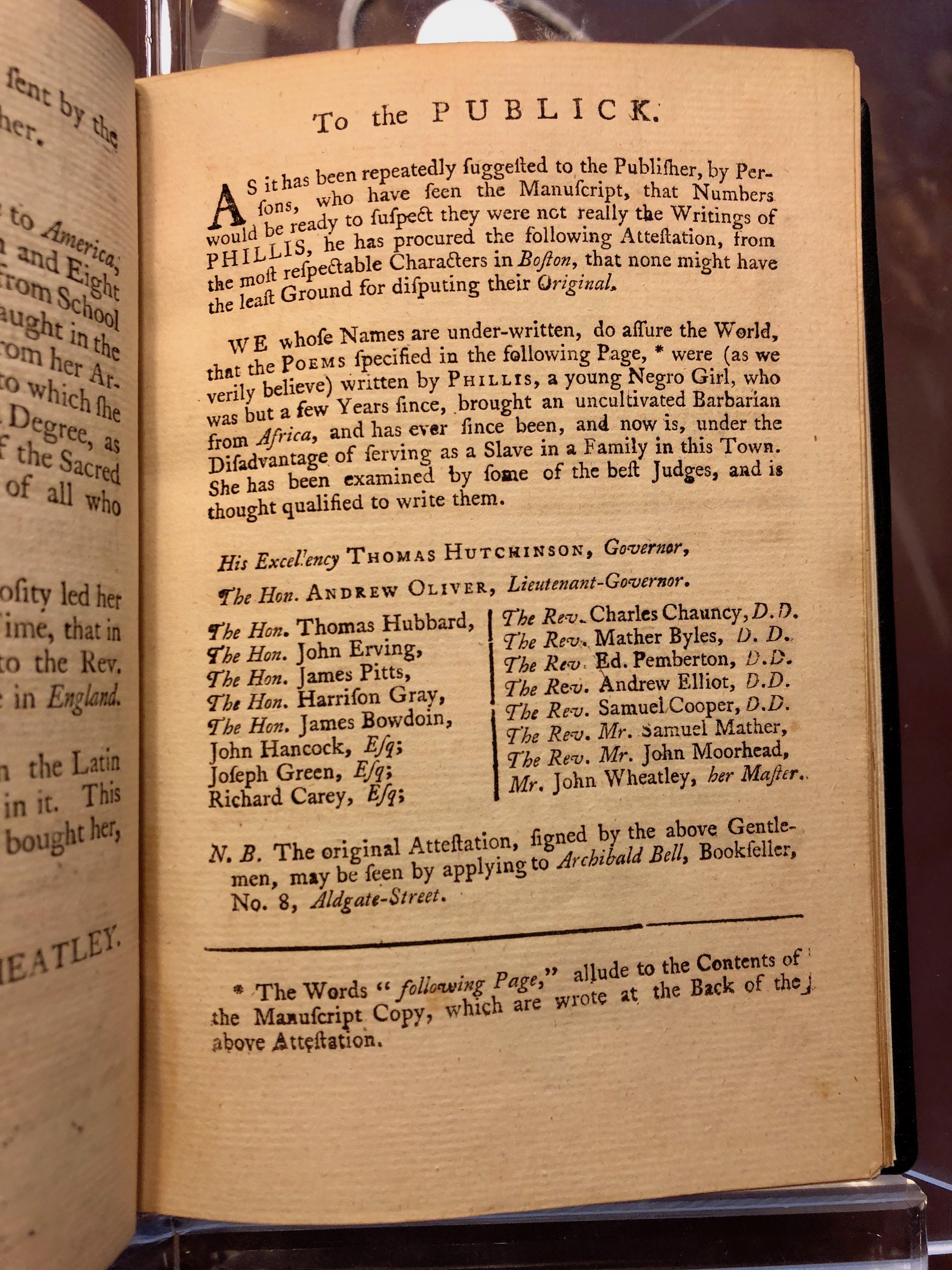

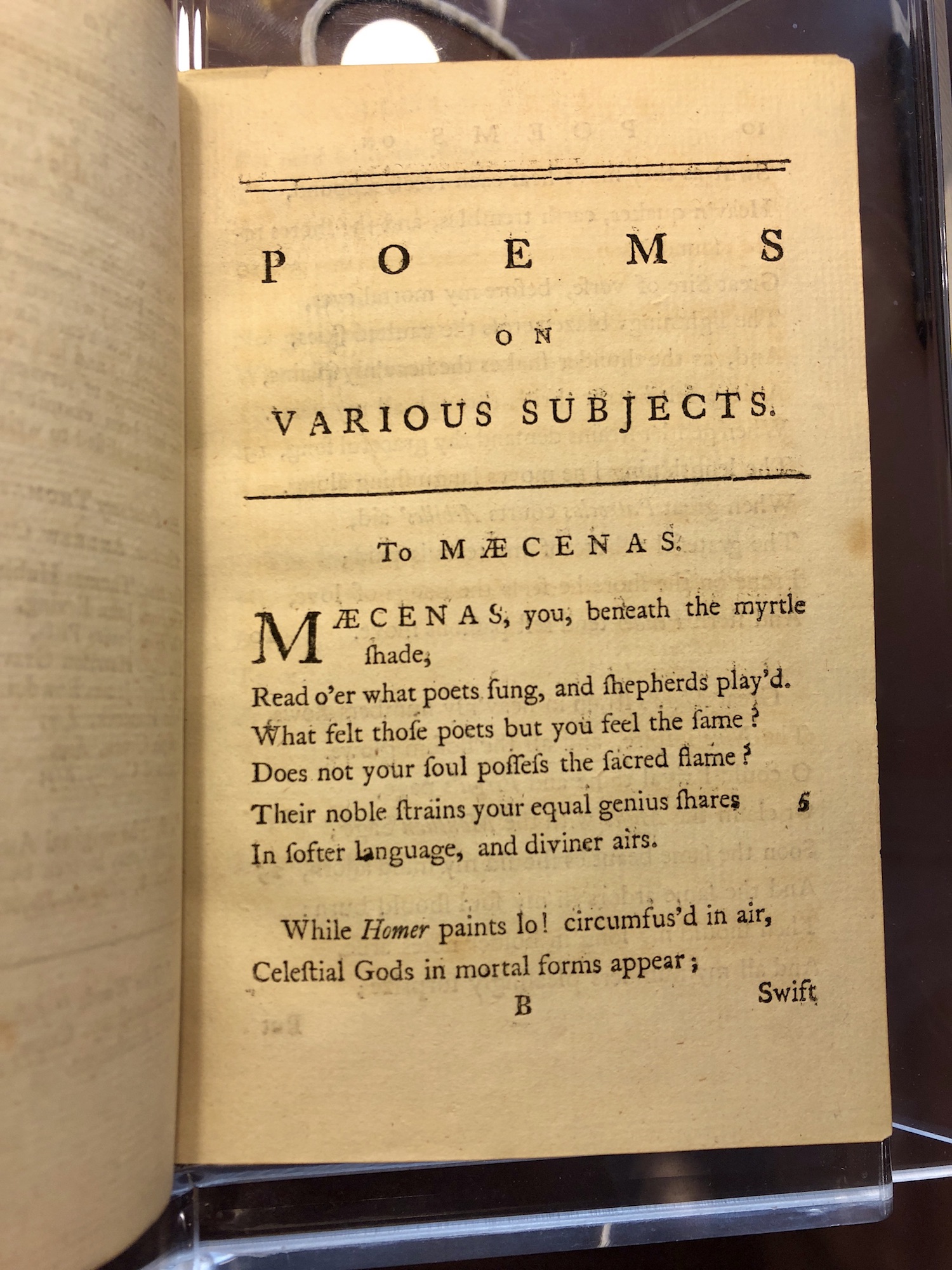
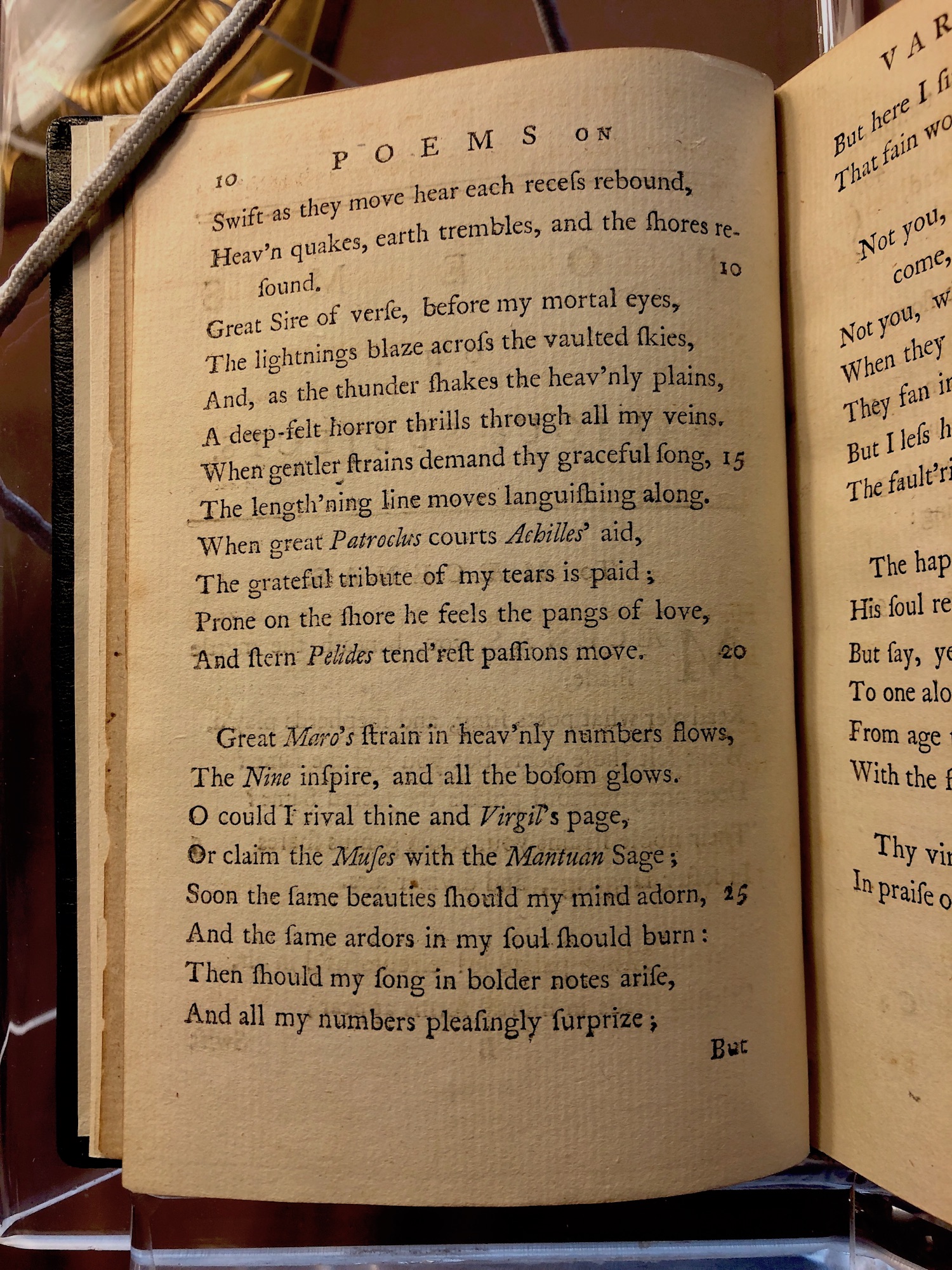
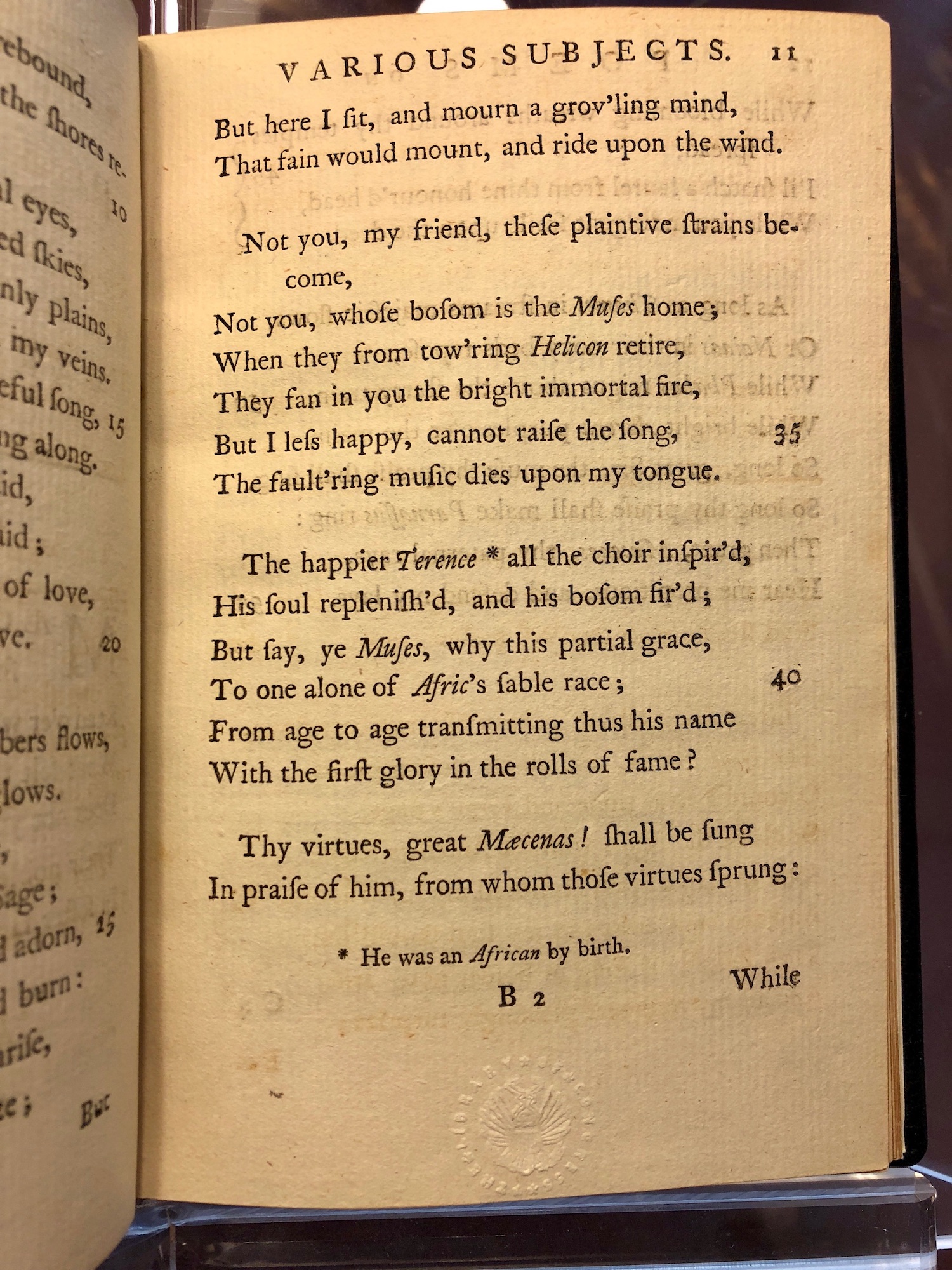
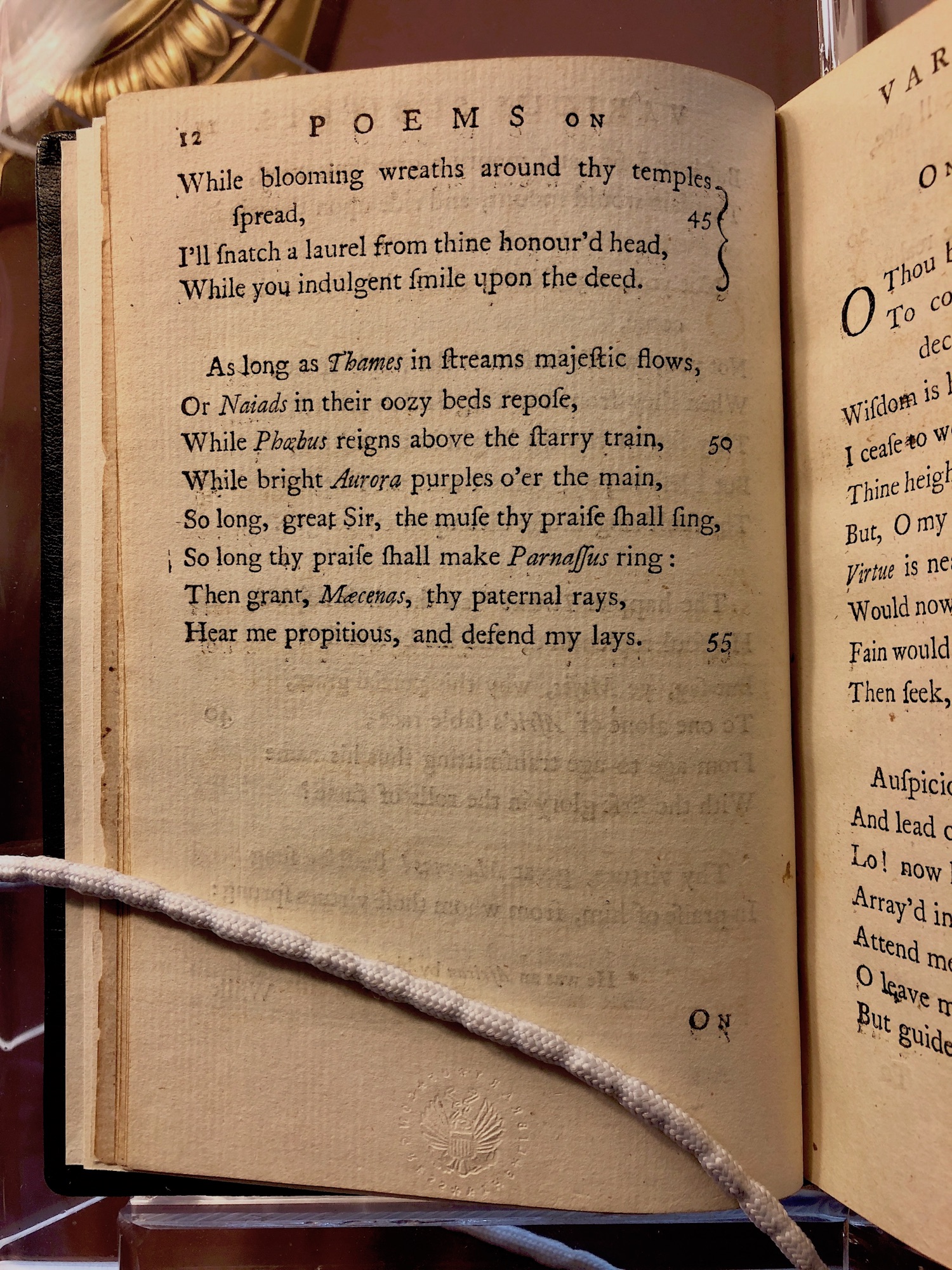
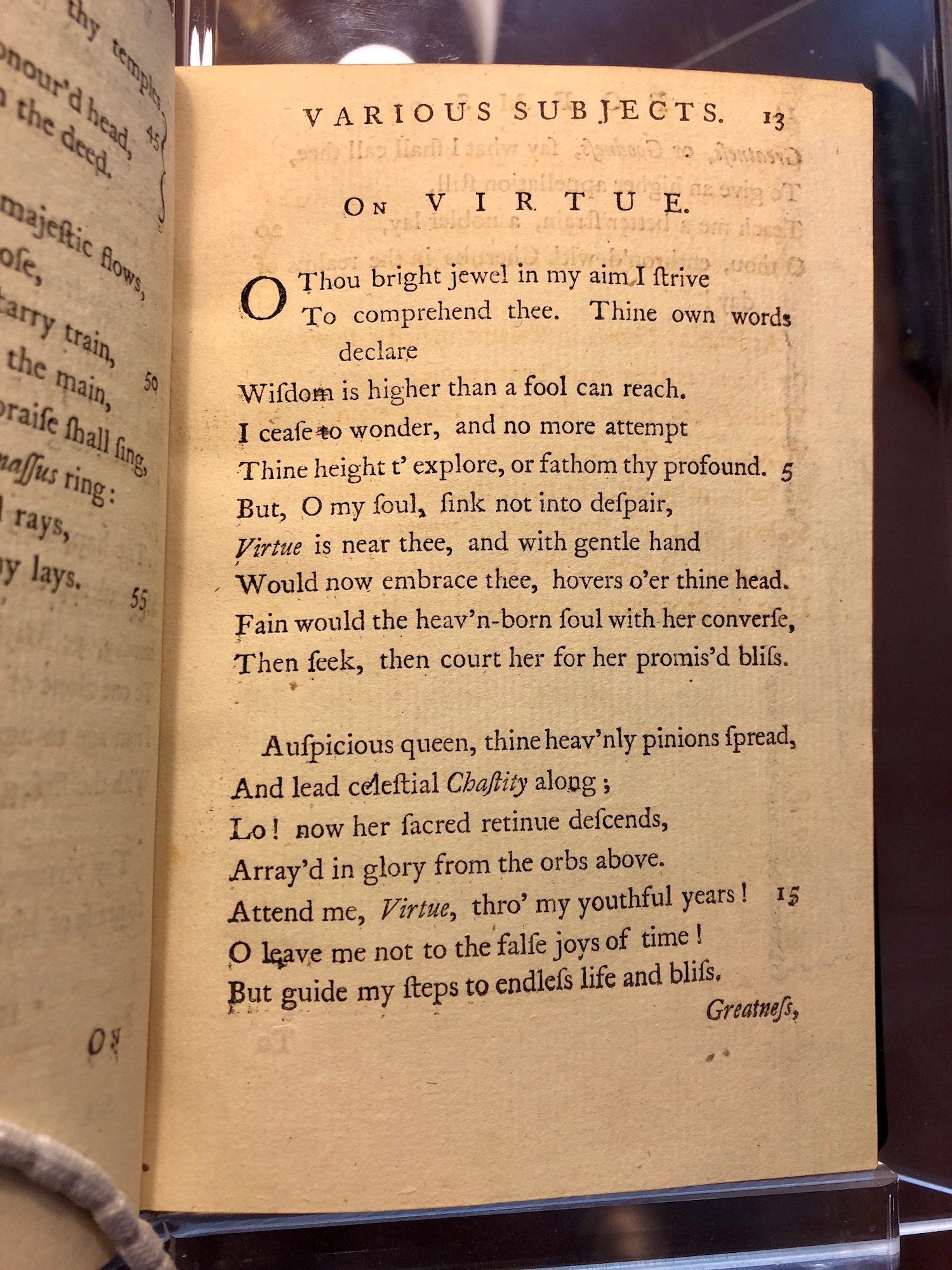
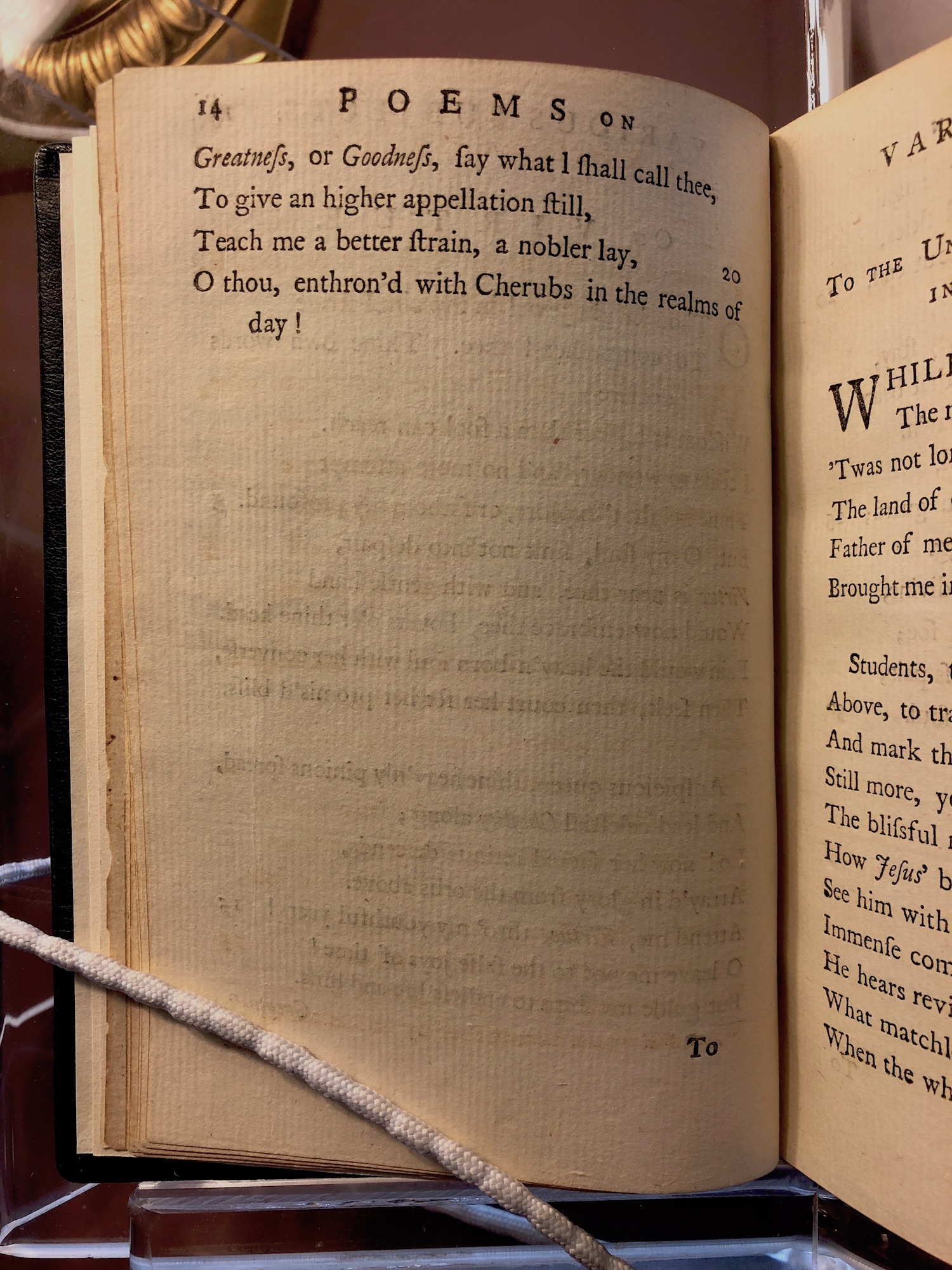


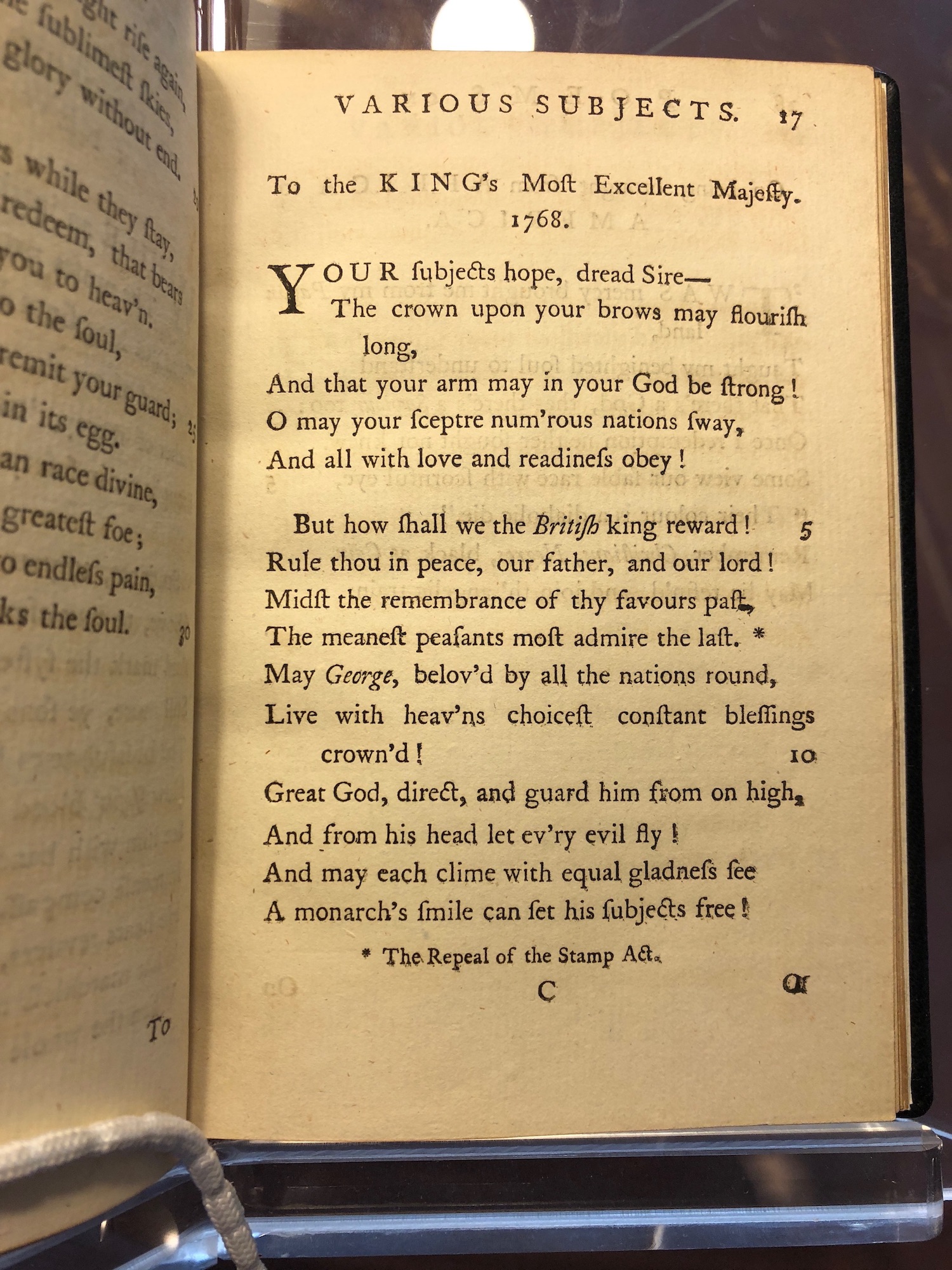

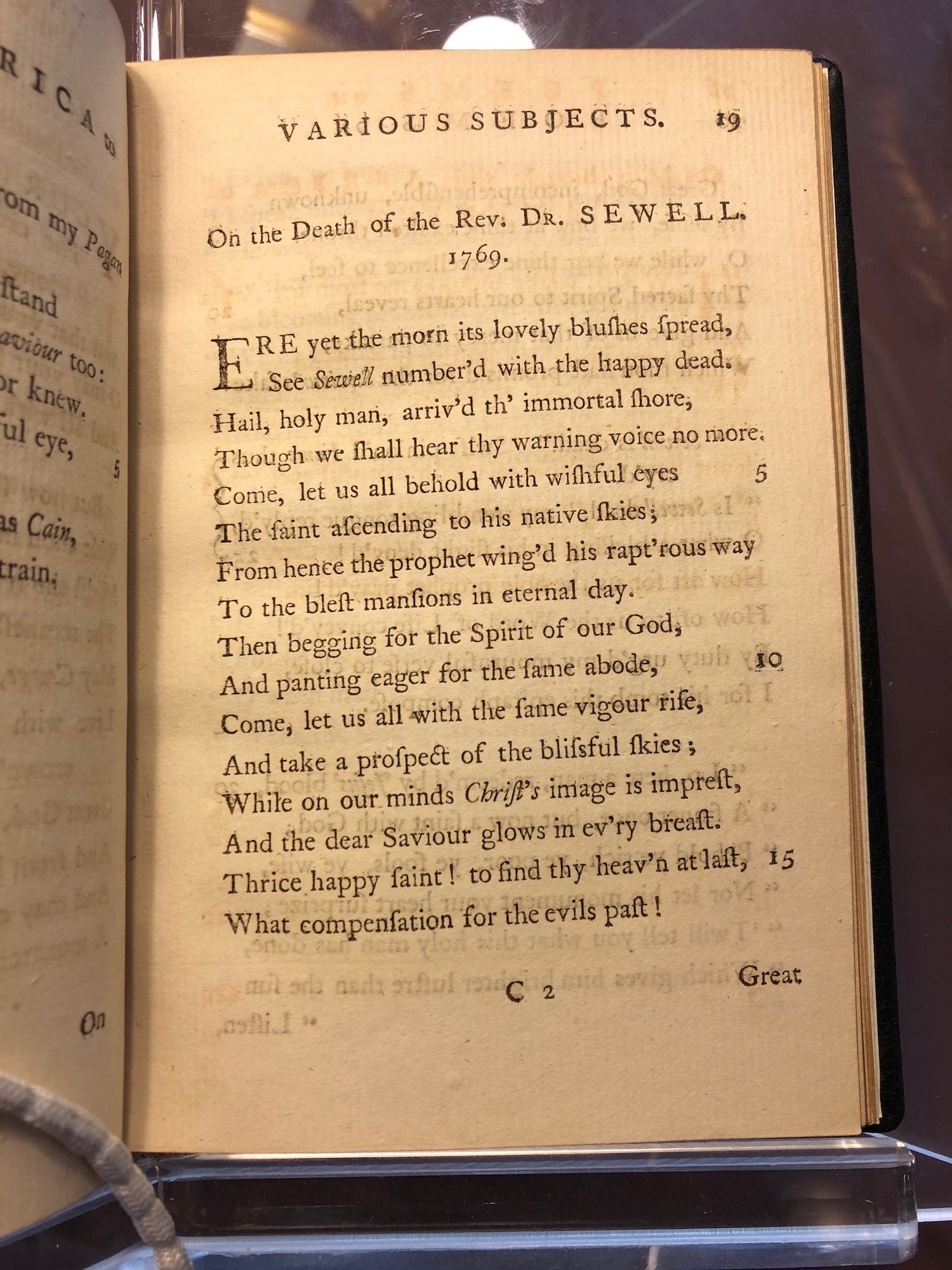
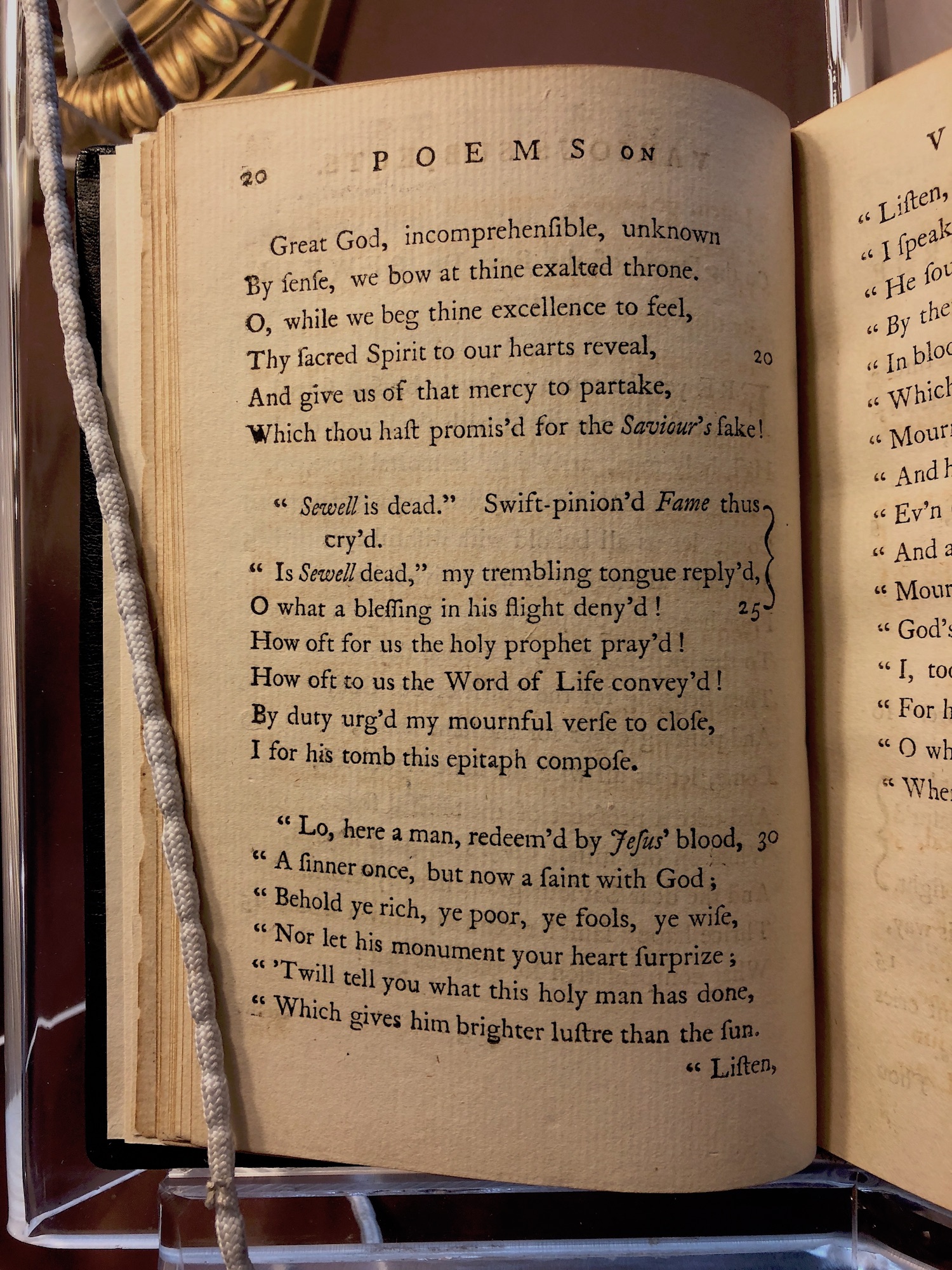
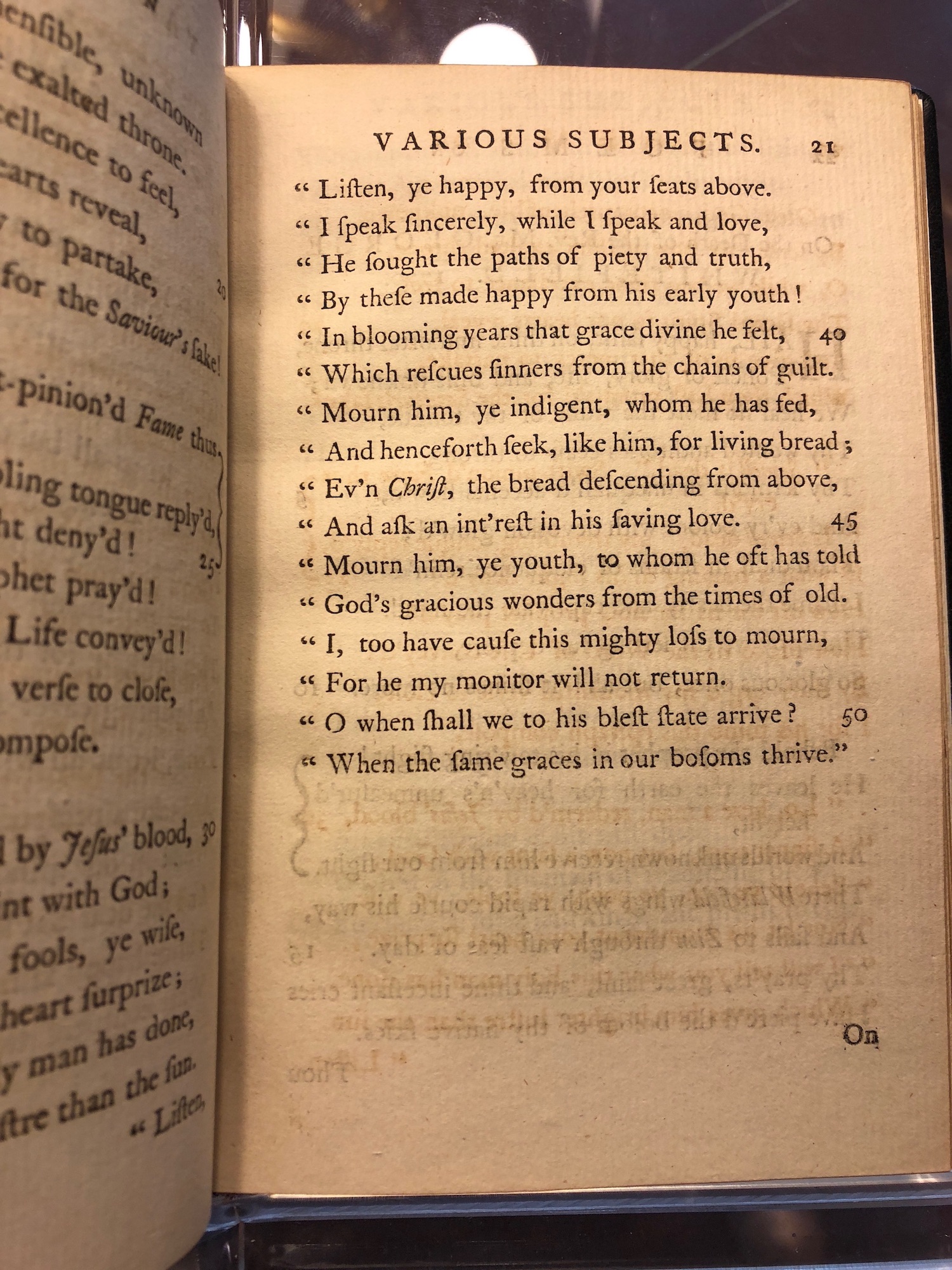

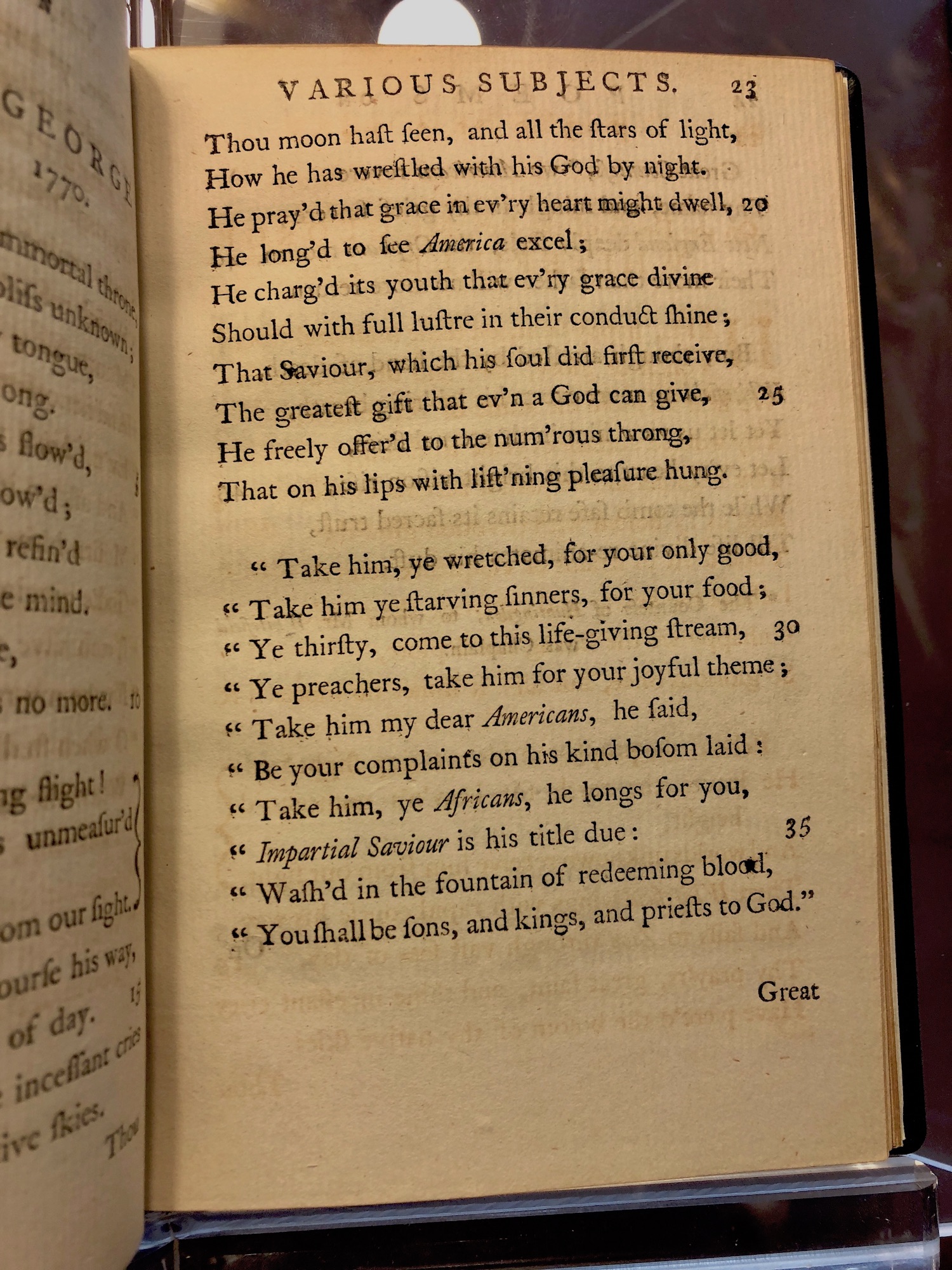
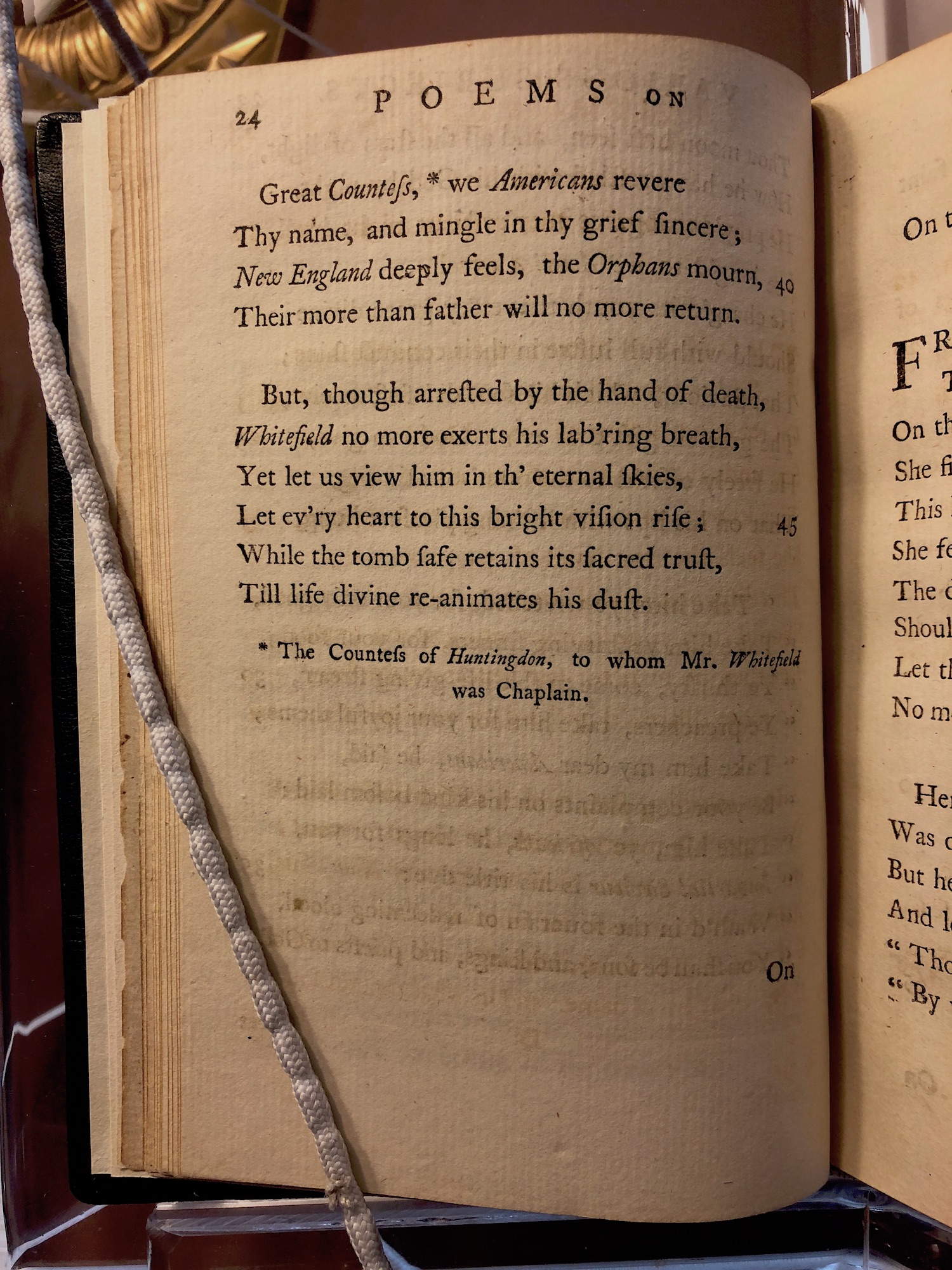
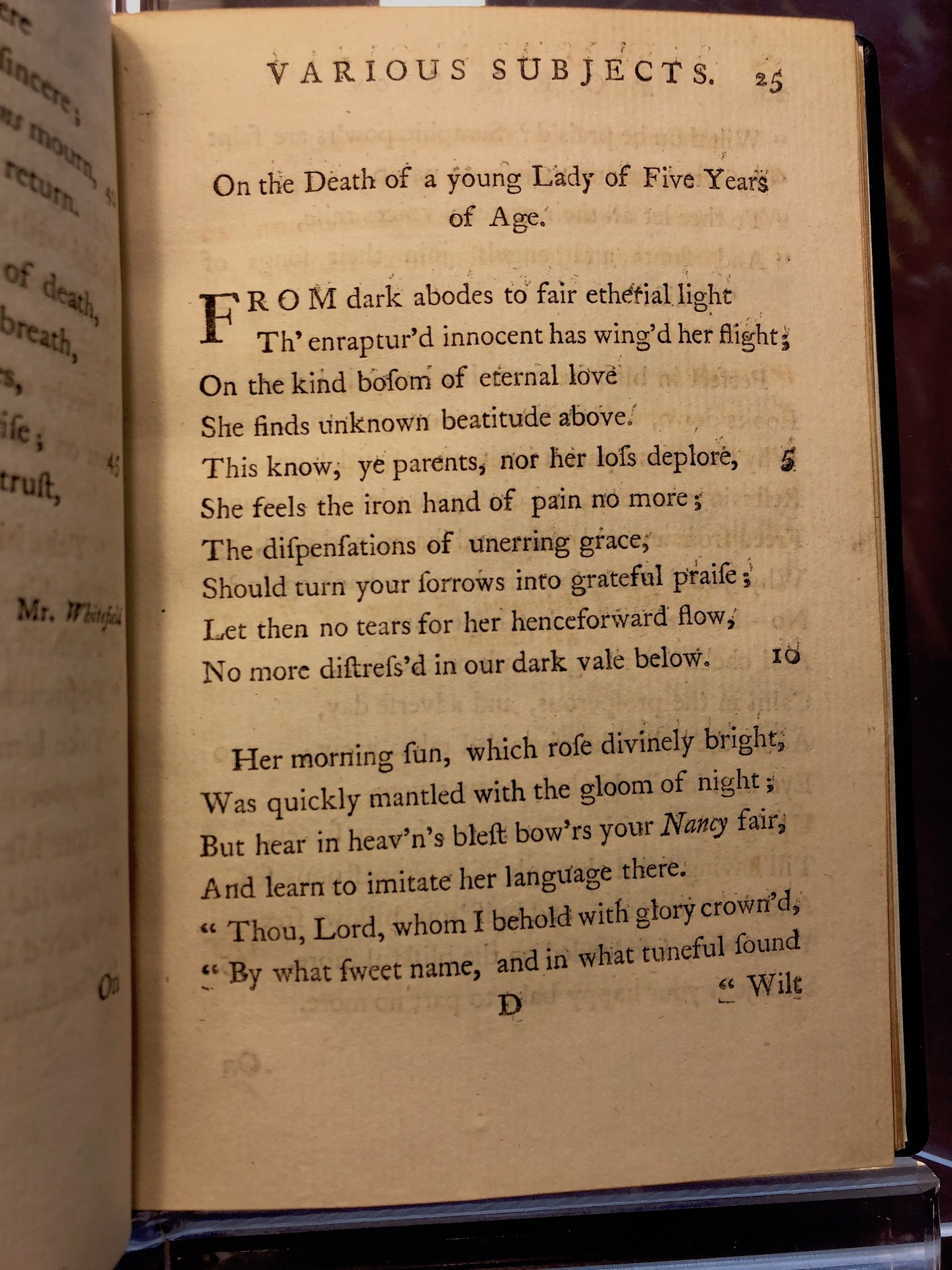
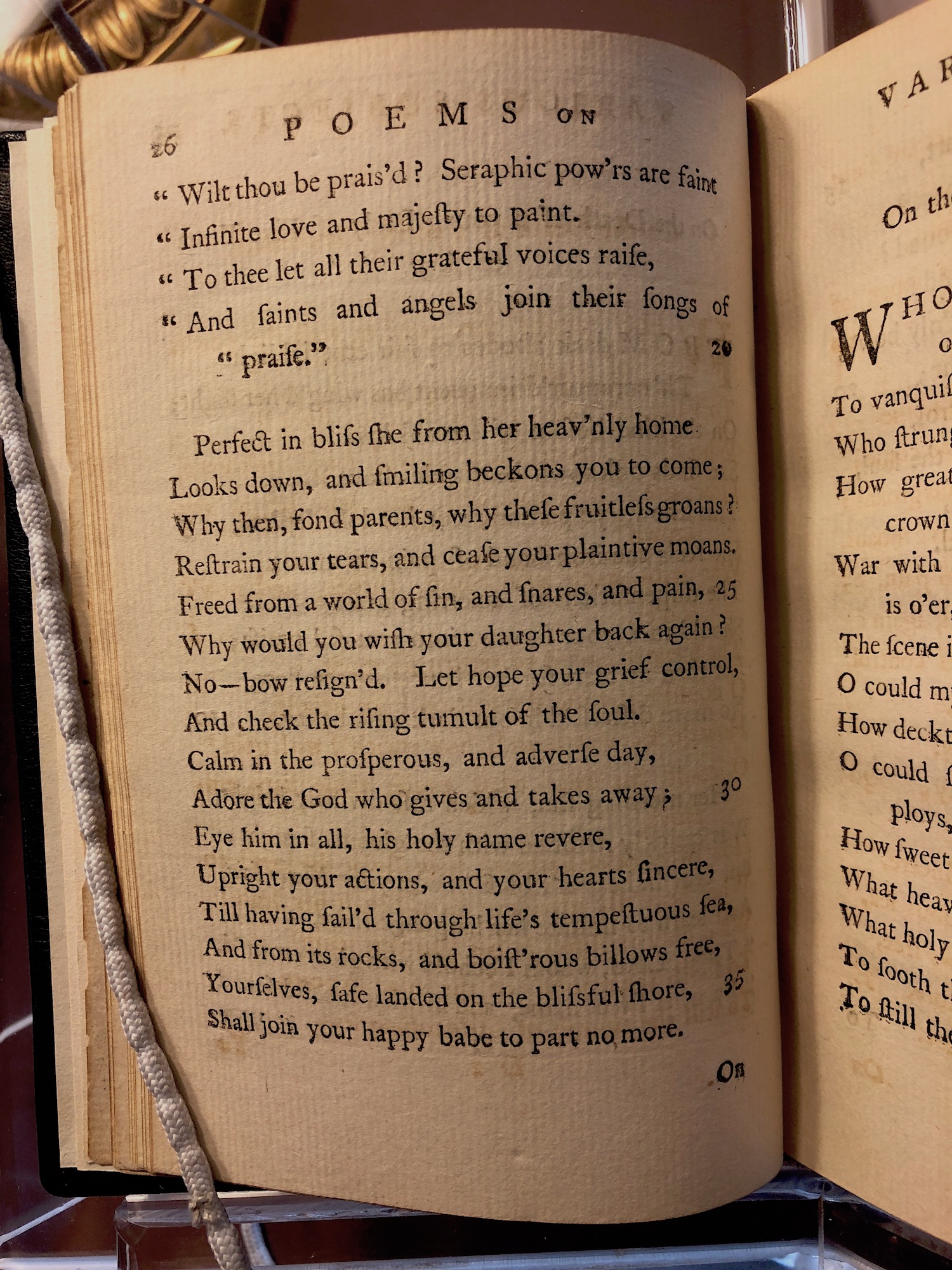
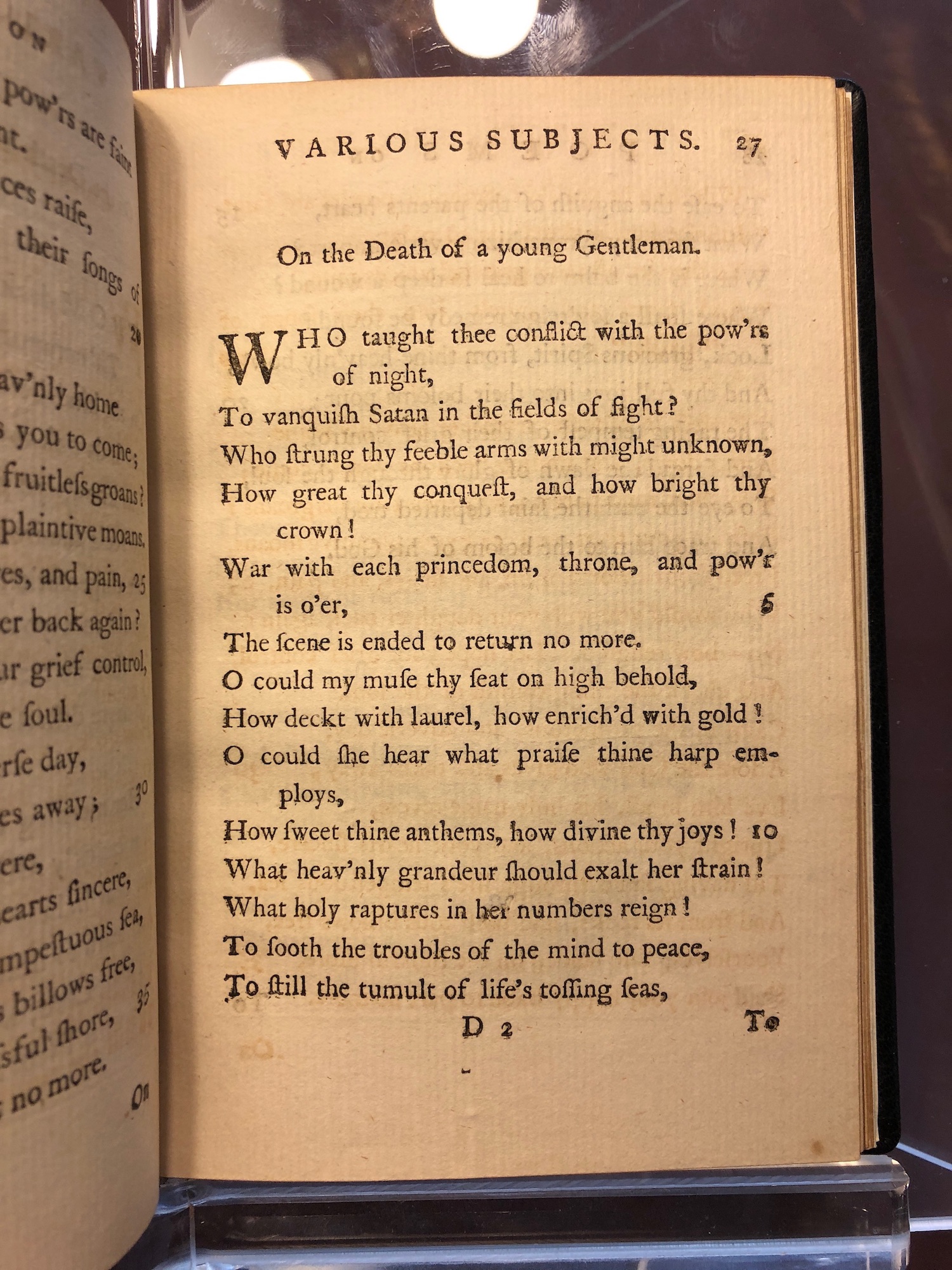
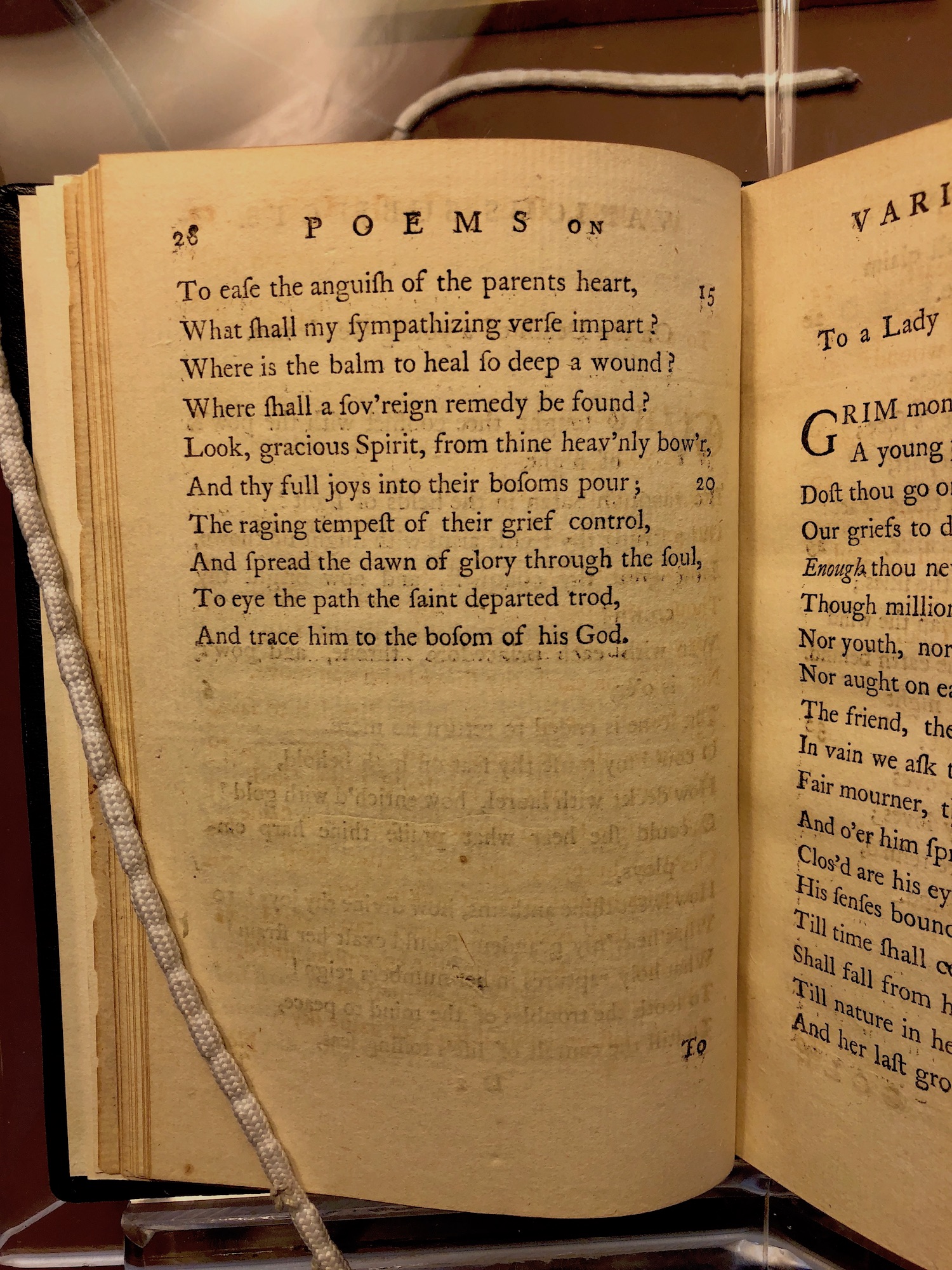
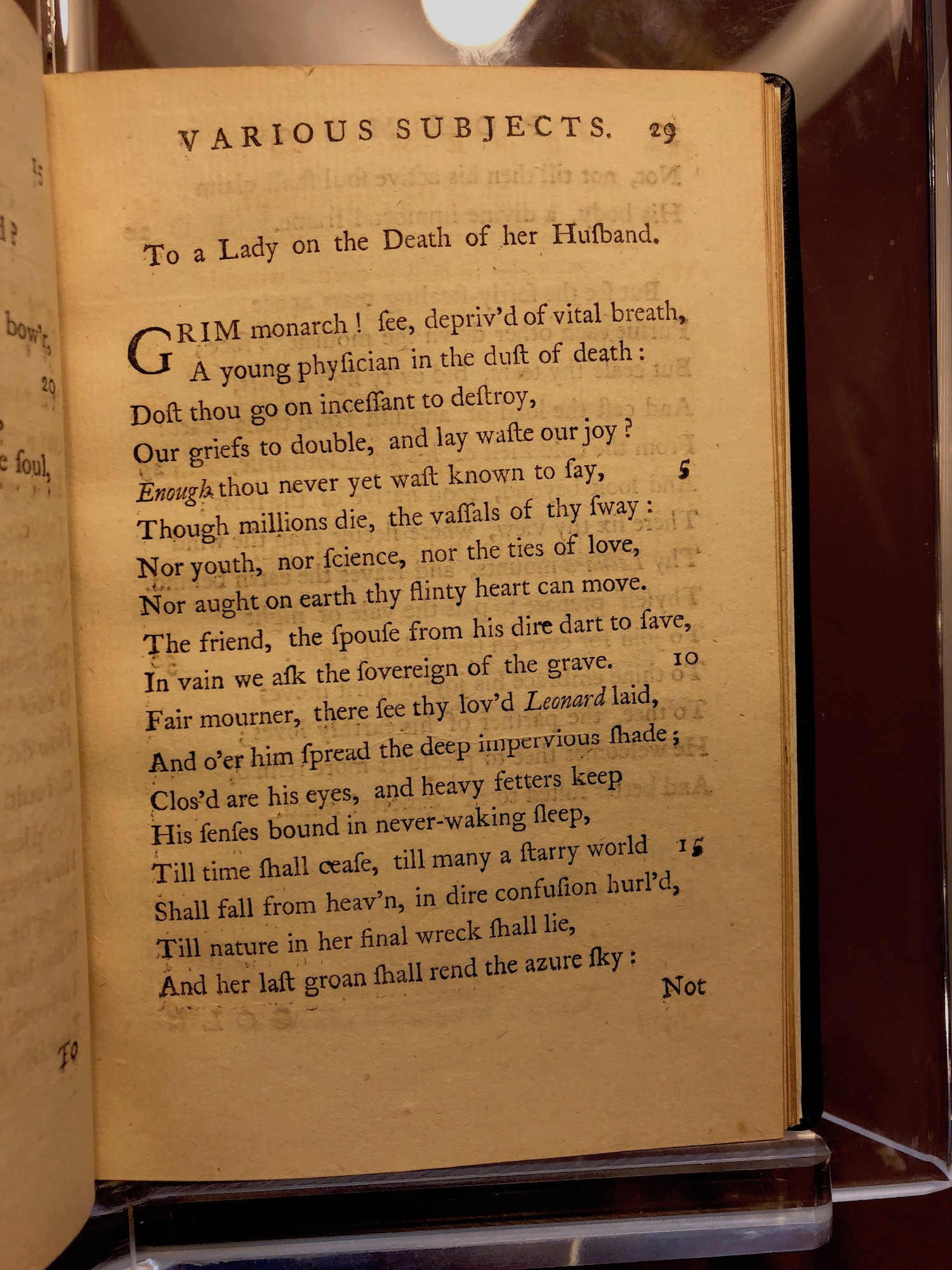
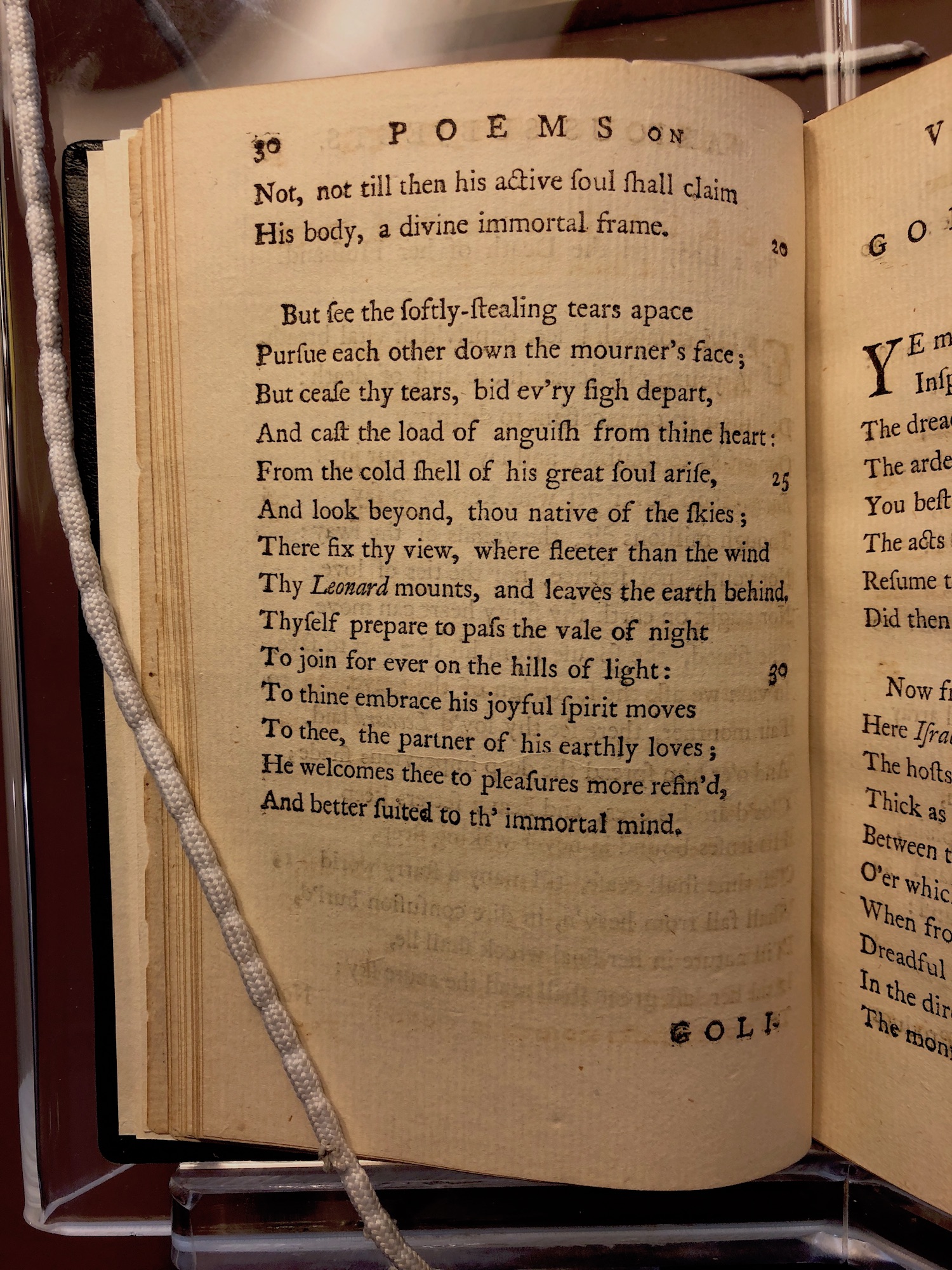
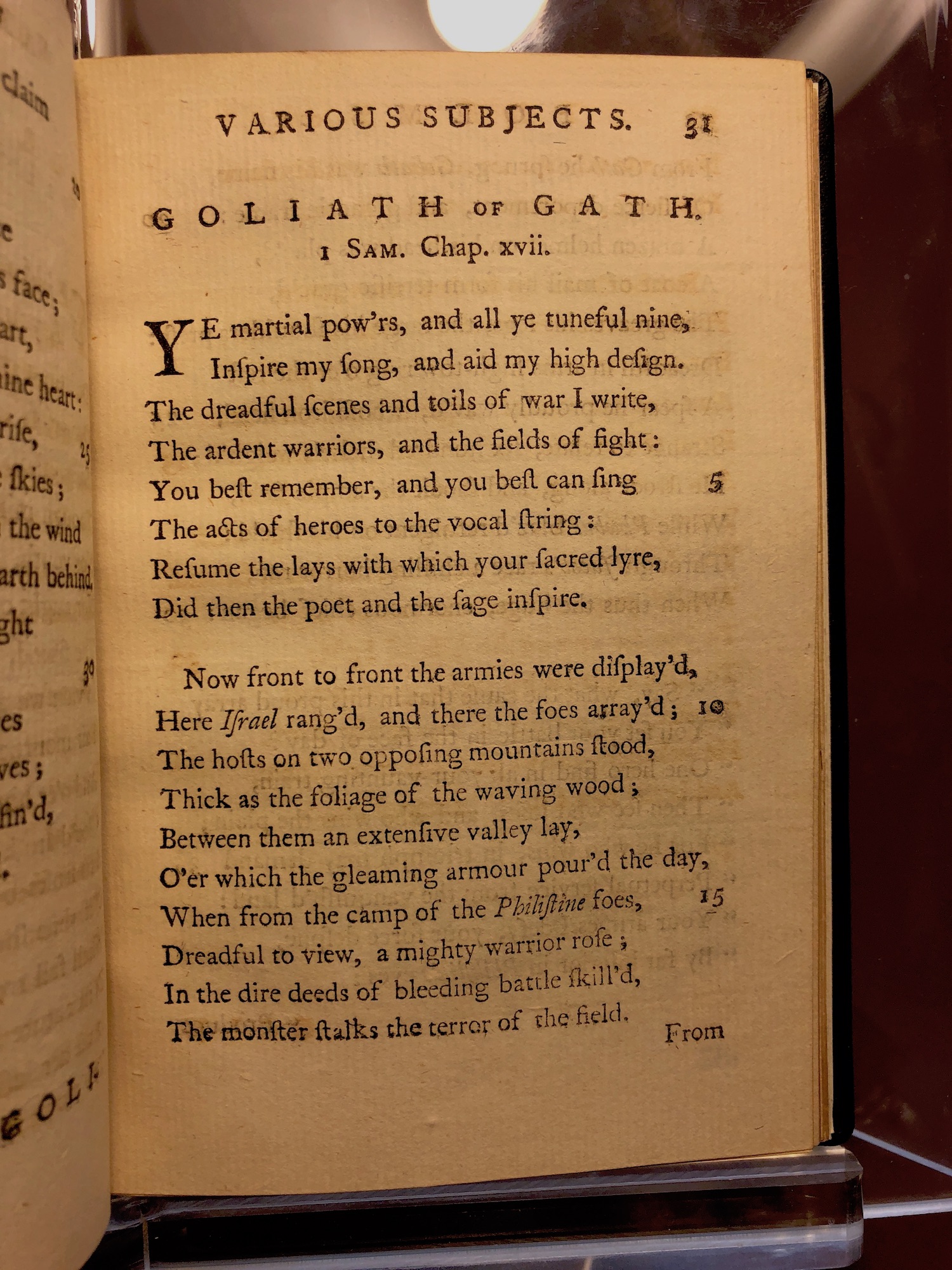
![Page 32 [copy 2]](https://anthologyassetsdev.lib.virginia.edu/wheatley-poems/pageImages/WP-0032c3.jpg)
![Page 33 [copy 2]](https://anthologyassetsdev.lib.virginia.edu/wheatley-poems/pageImages/WP-0033c3.jpg)
![Page 34 [copy 2]](https://anthologyassetsdev.lib.virginia.edu/wheatley-poems/pageImages/WP-0034c3.jpg)
![Page 35 [copy 2]](https://anthologyassetsdev.lib.virginia.edu/wheatley-poems/pageImages/WP-0035c3.jpg)
![Page 36 [copy 2]](https://anthologyassetsdev.lib.virginia.edu/wheatley-poems/pageImages/WP-0036c3.jpg)
![Page 37 [copy 2]](https://anthologyassetsdev.lib.virginia.edu/wheatley-poems/pageImages/WP-0037c3.jpg)
![Page 38 [copy 2]](https://anthologyassetsdev.lib.virginia.edu/wheatley-poems/pageImages/WP-0038c3.jpg)
![Page 39 [copy 2]](https://anthologyassetsdev.lib.virginia.edu/wheatley-poems/pageImages/WP-0039c3.jpg)
![Page 40 [copy 2]](https://anthologyassetsdev.lib.virginia.edu/wheatley-poems/pageImages/WP-0040c3.jpg)
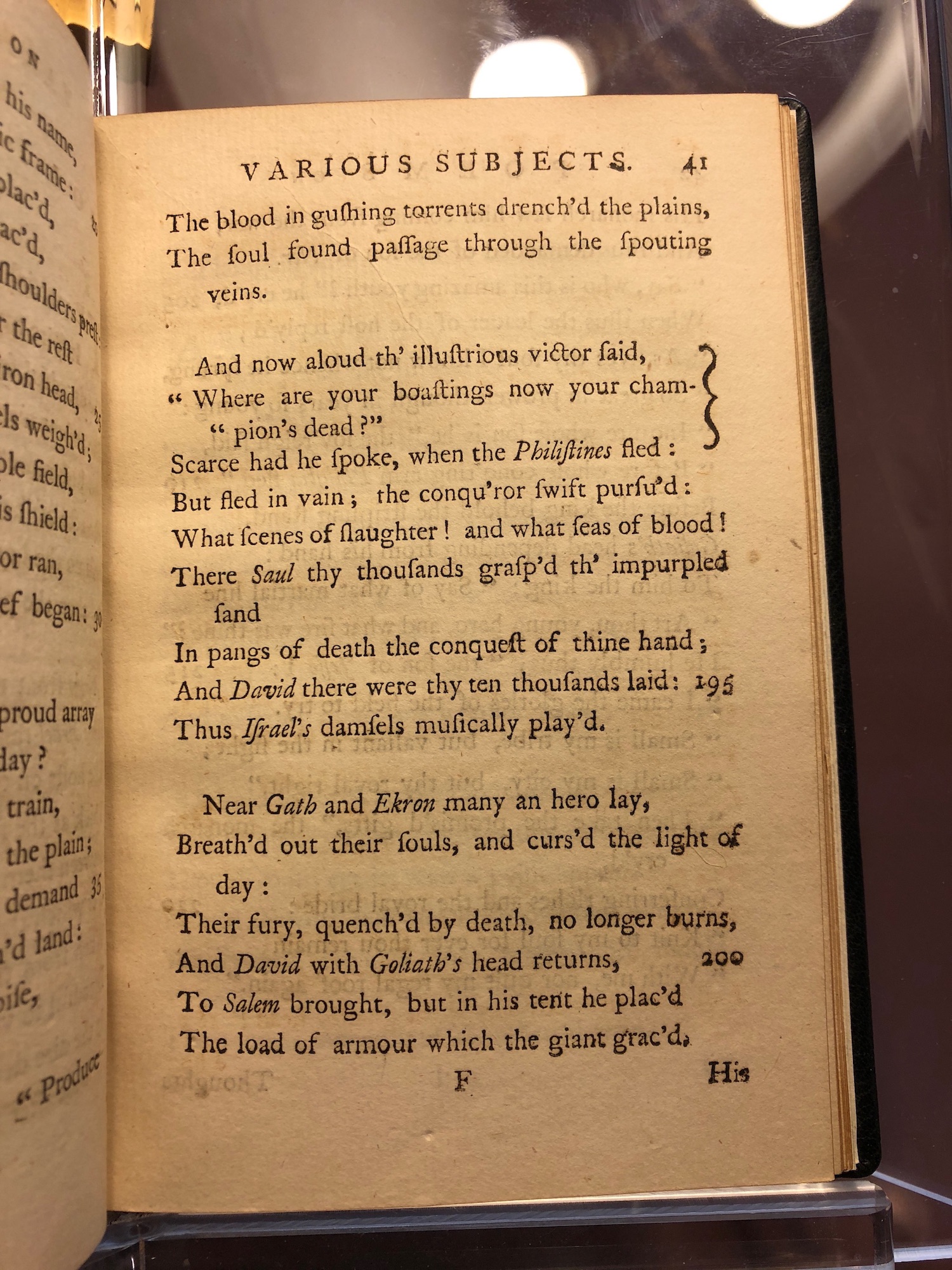
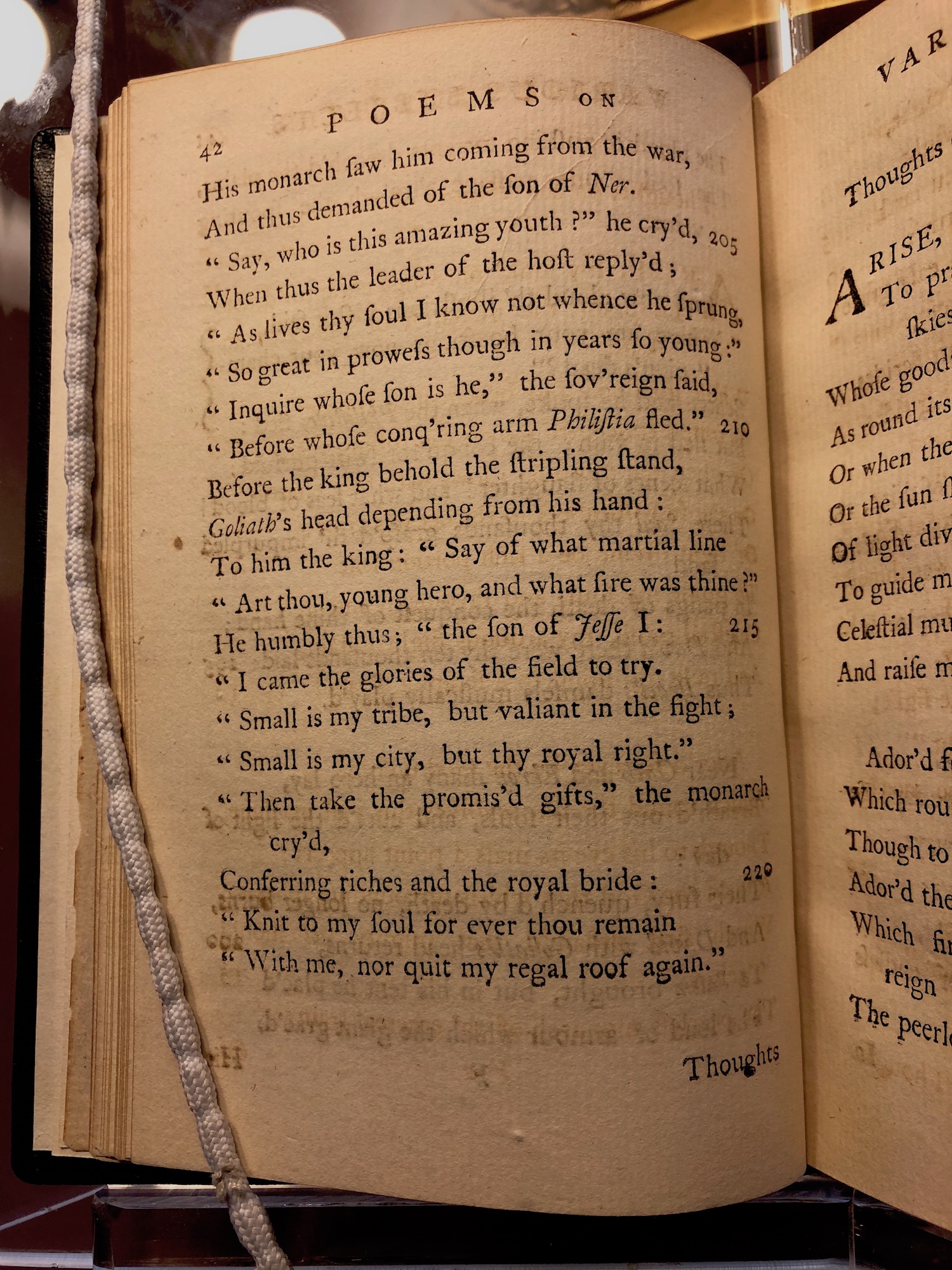
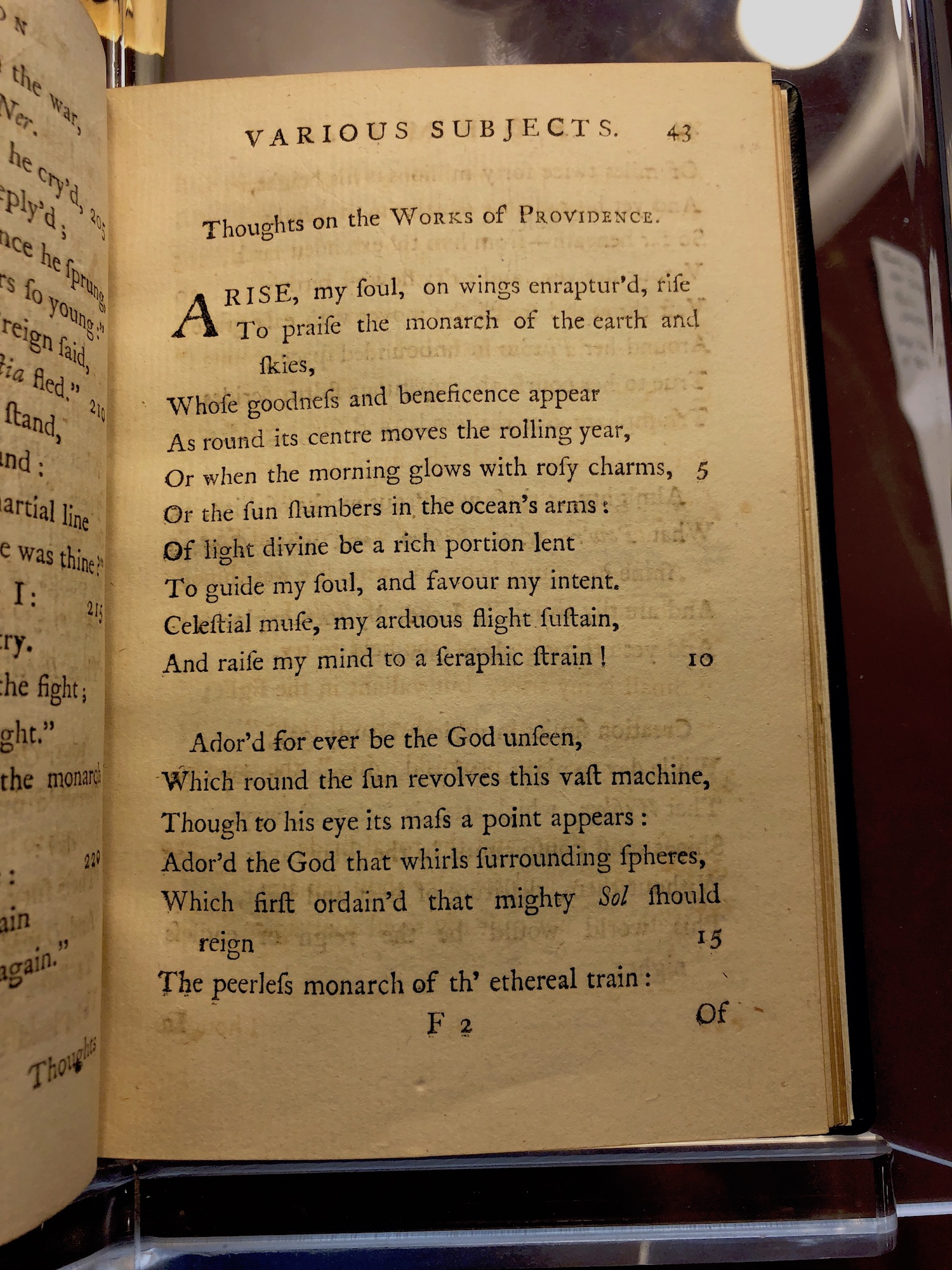
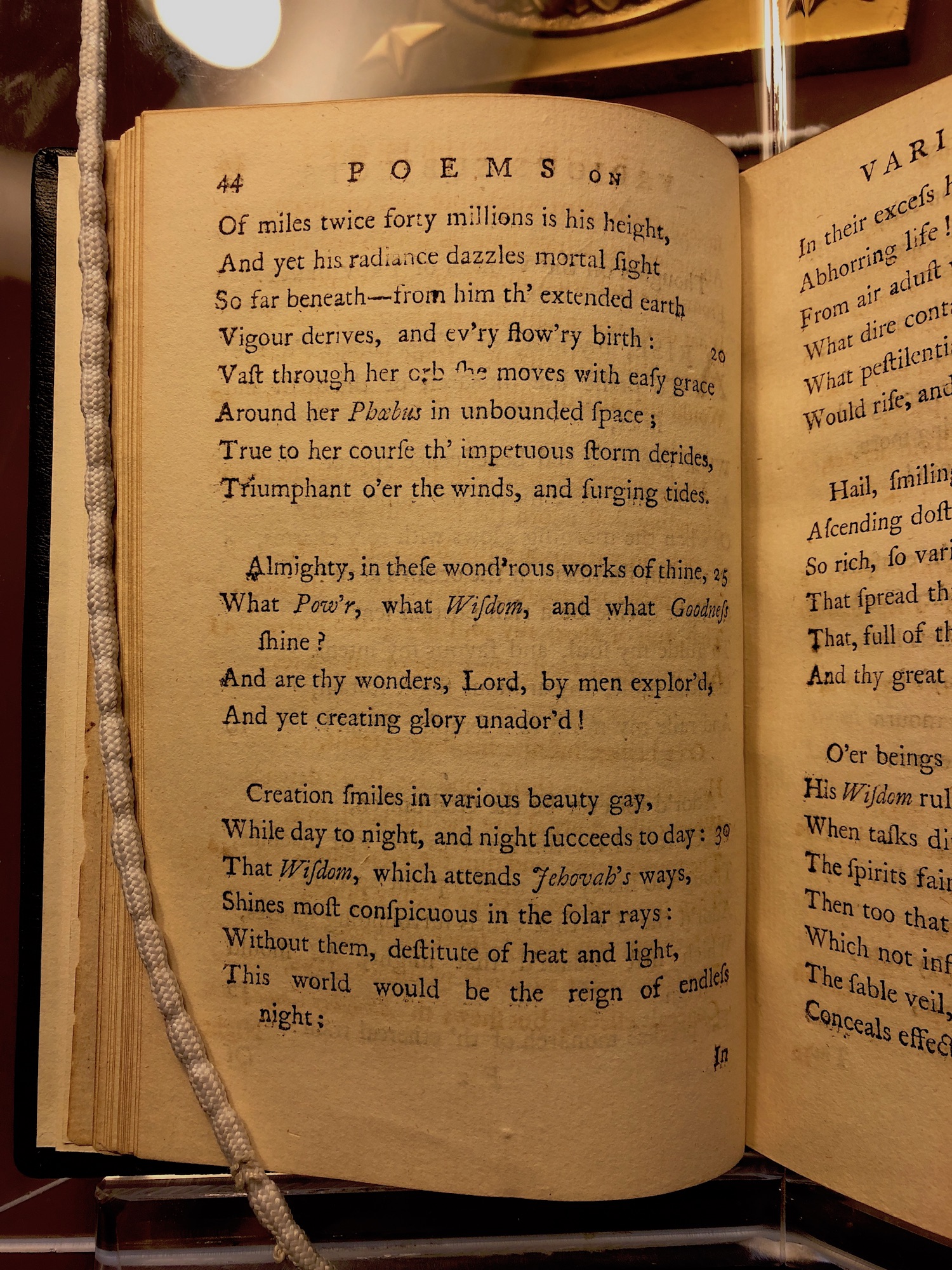
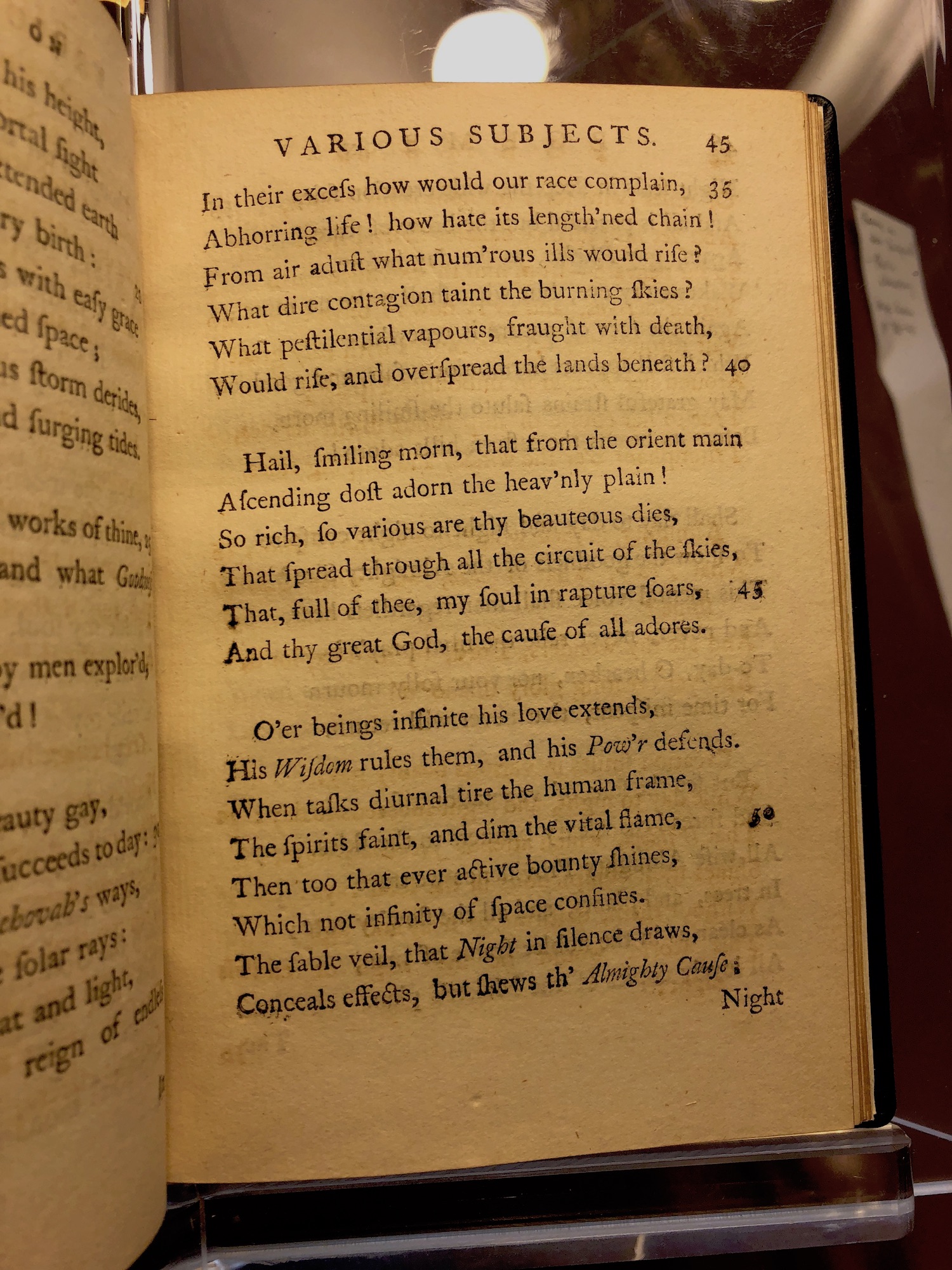

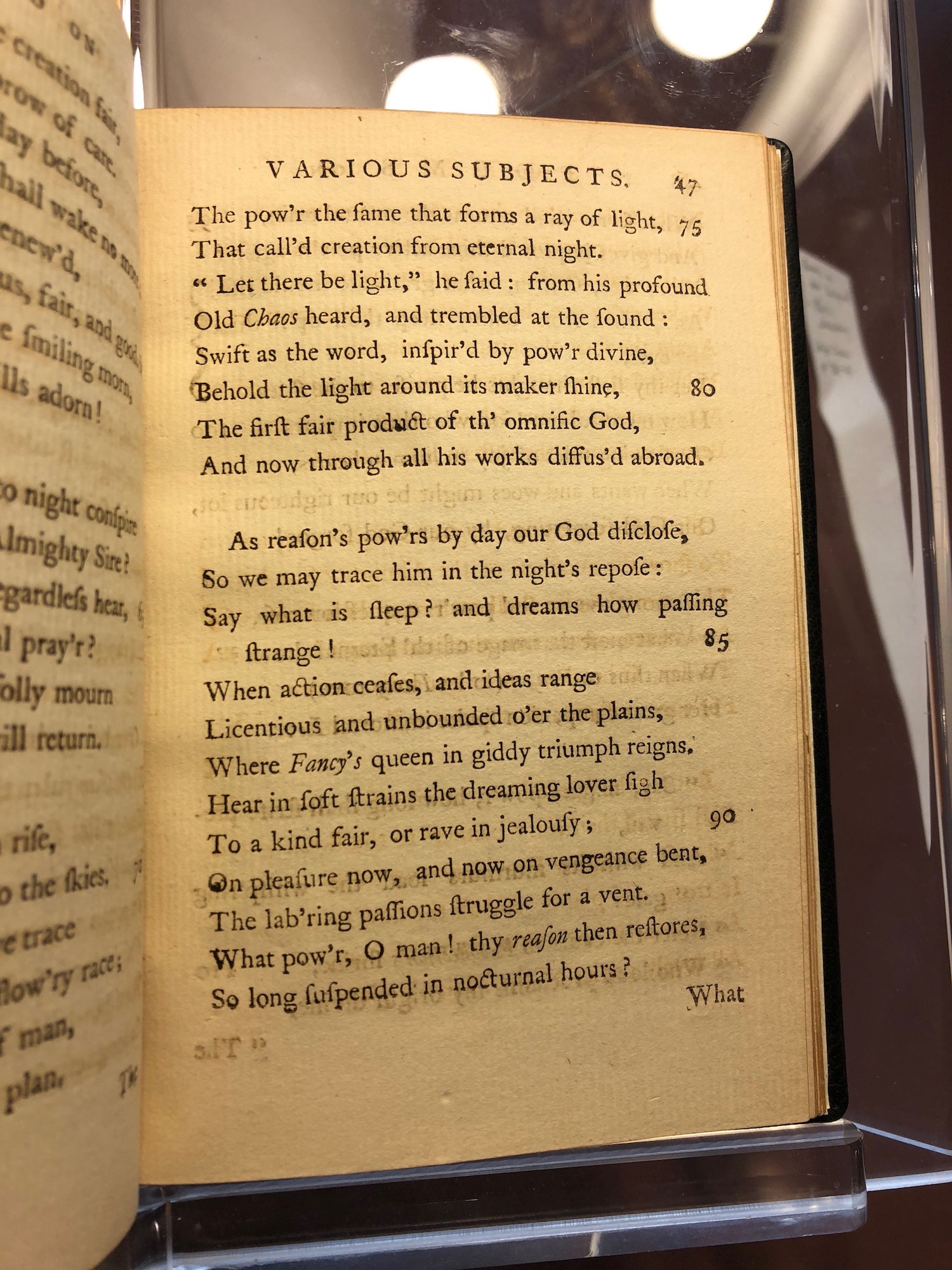
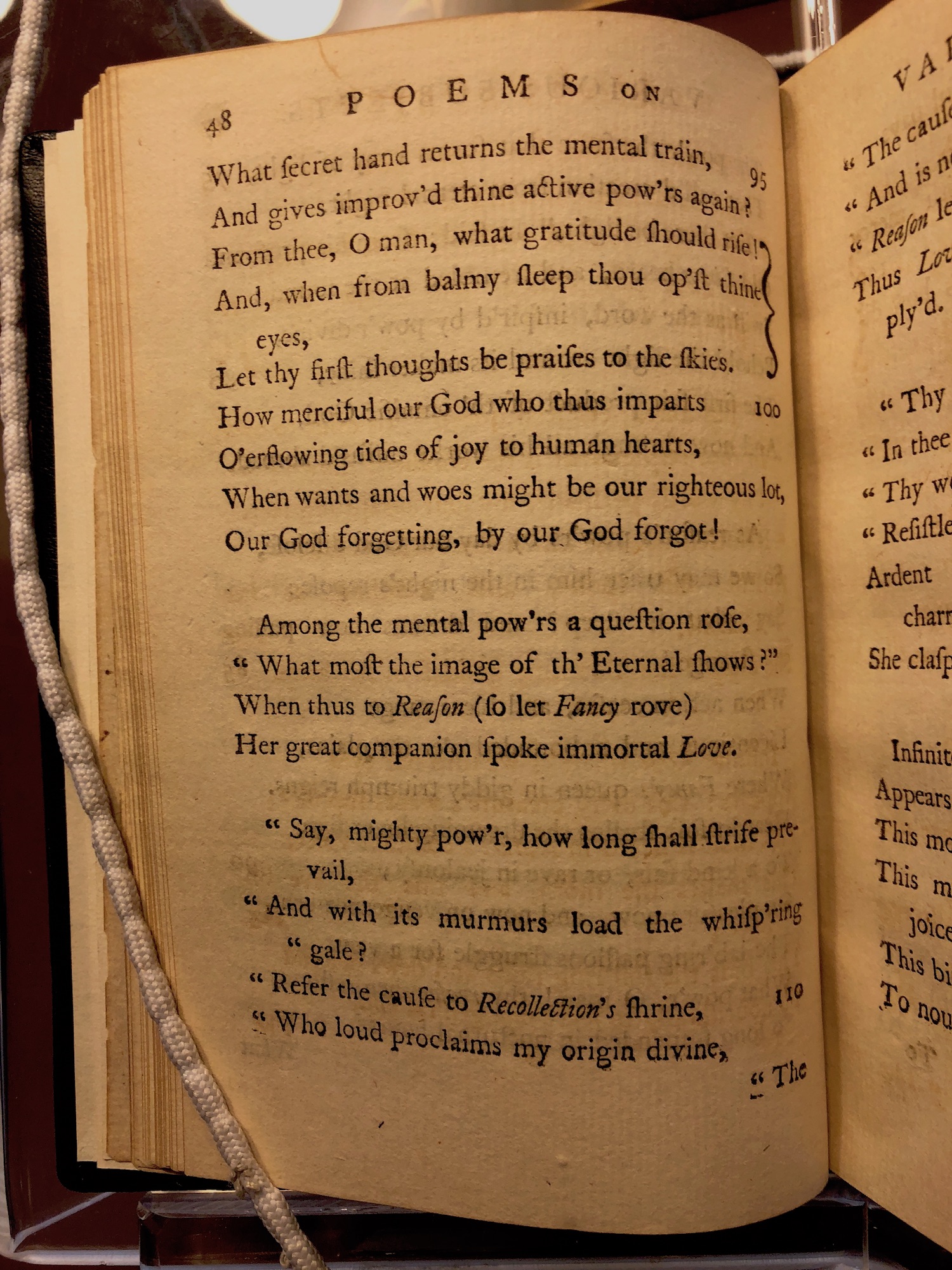

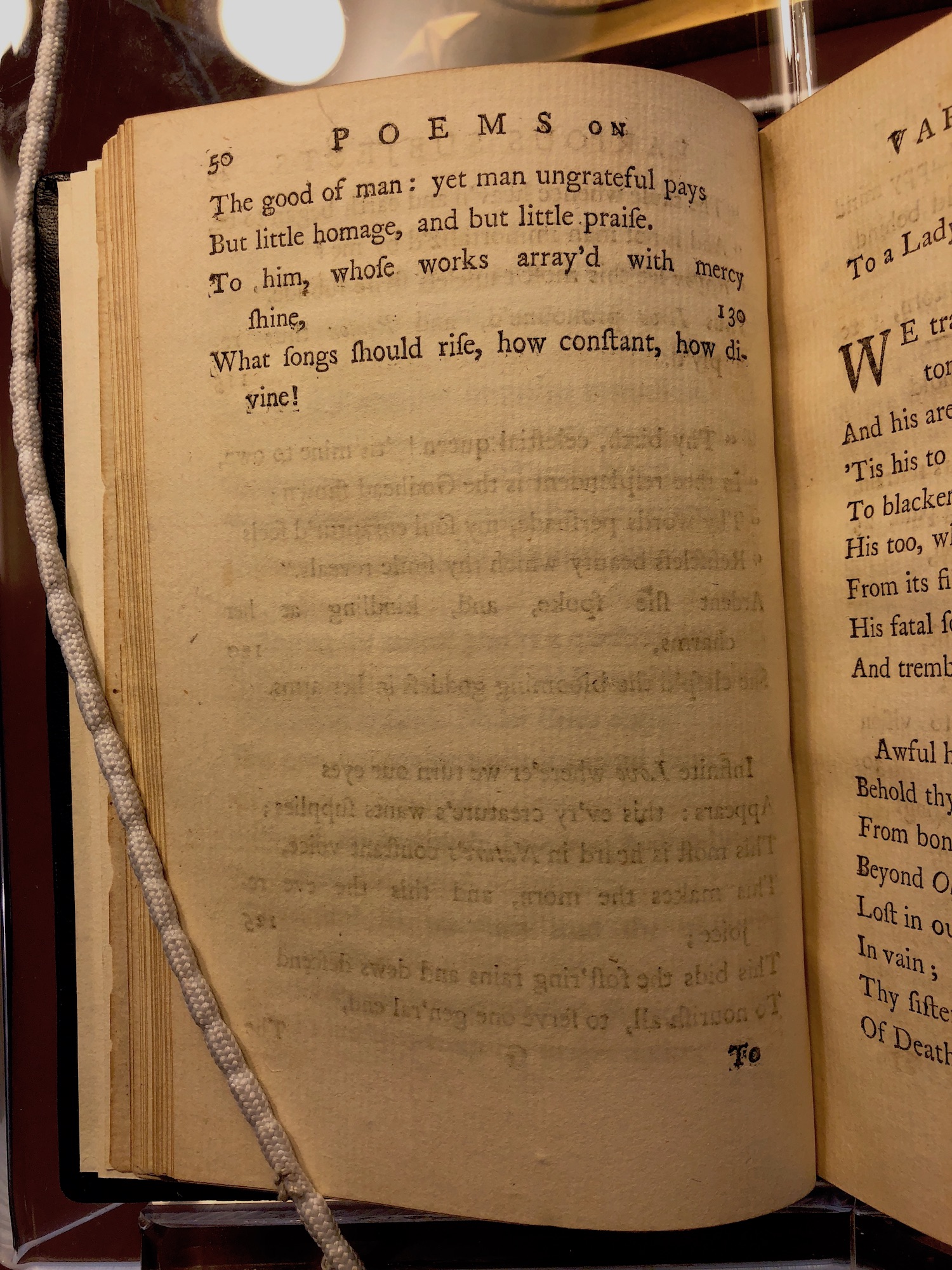
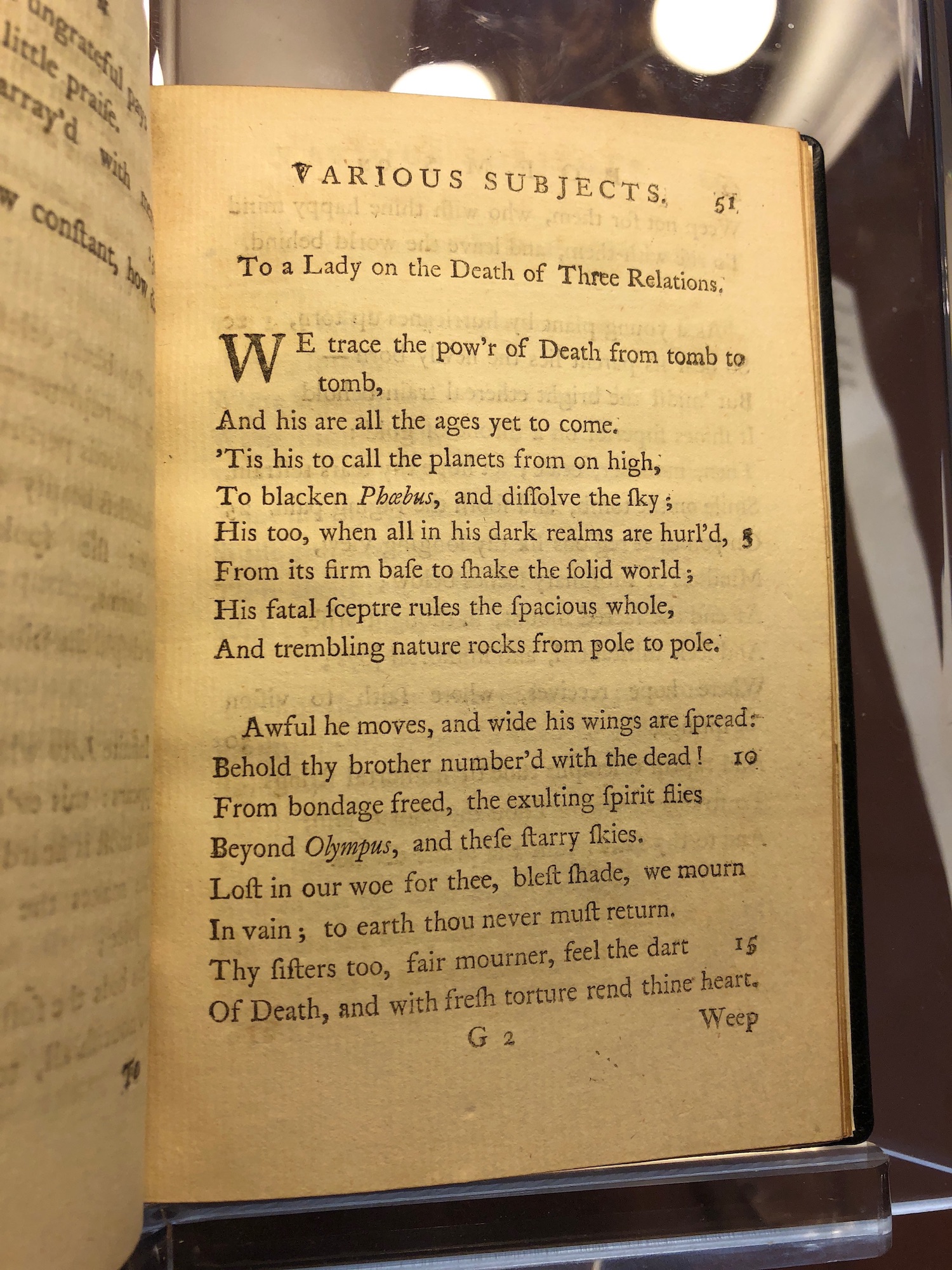
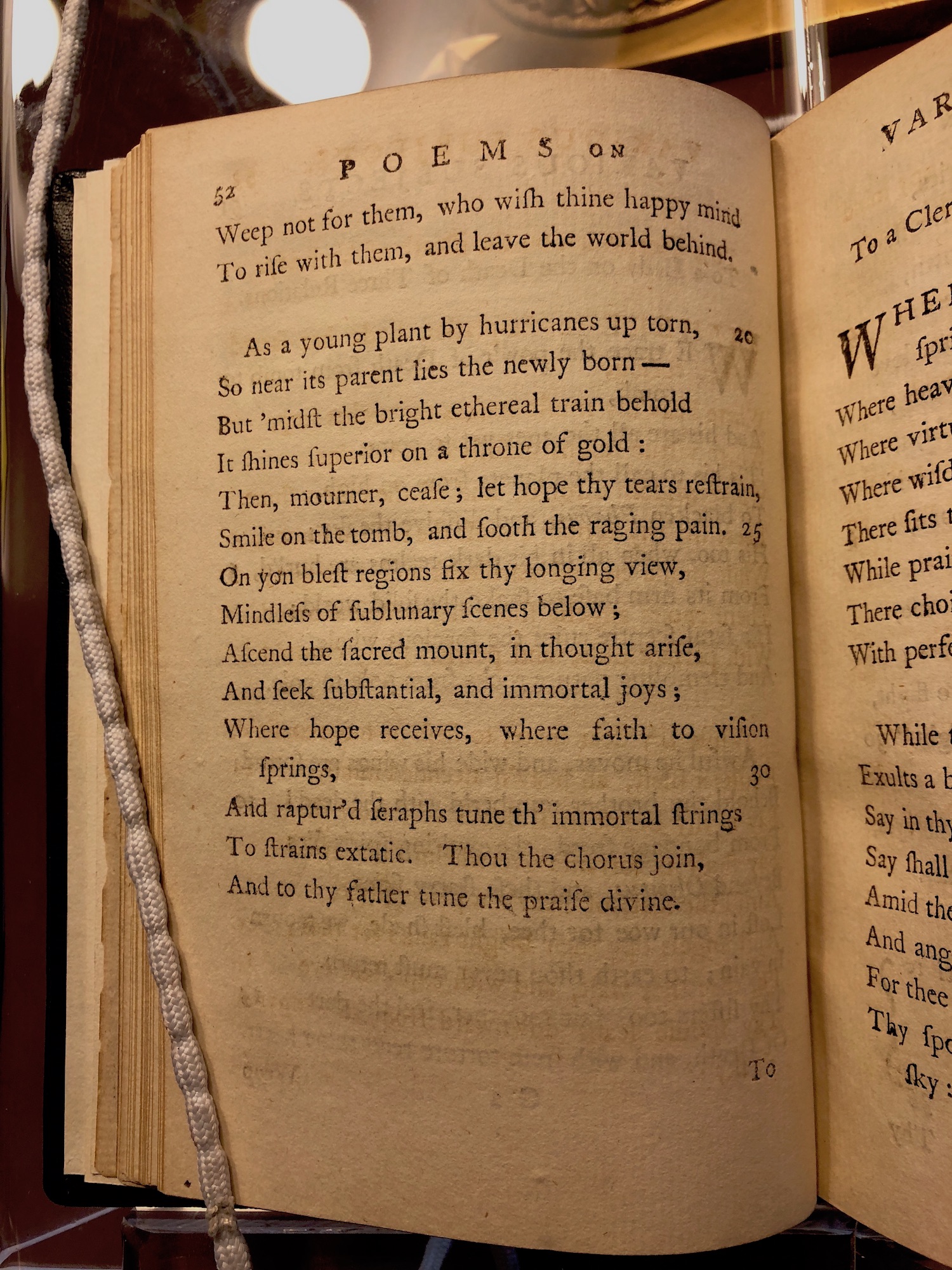
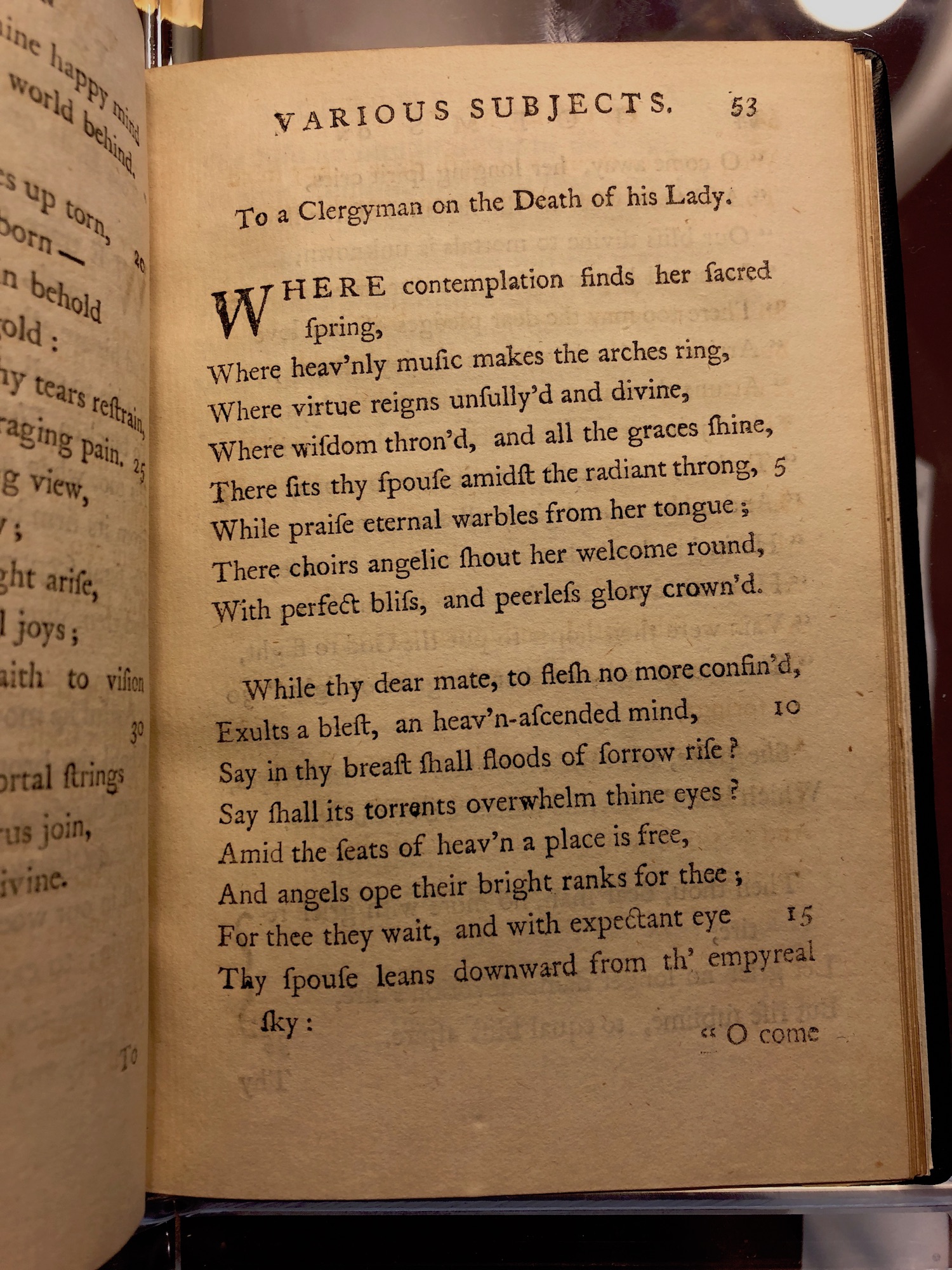

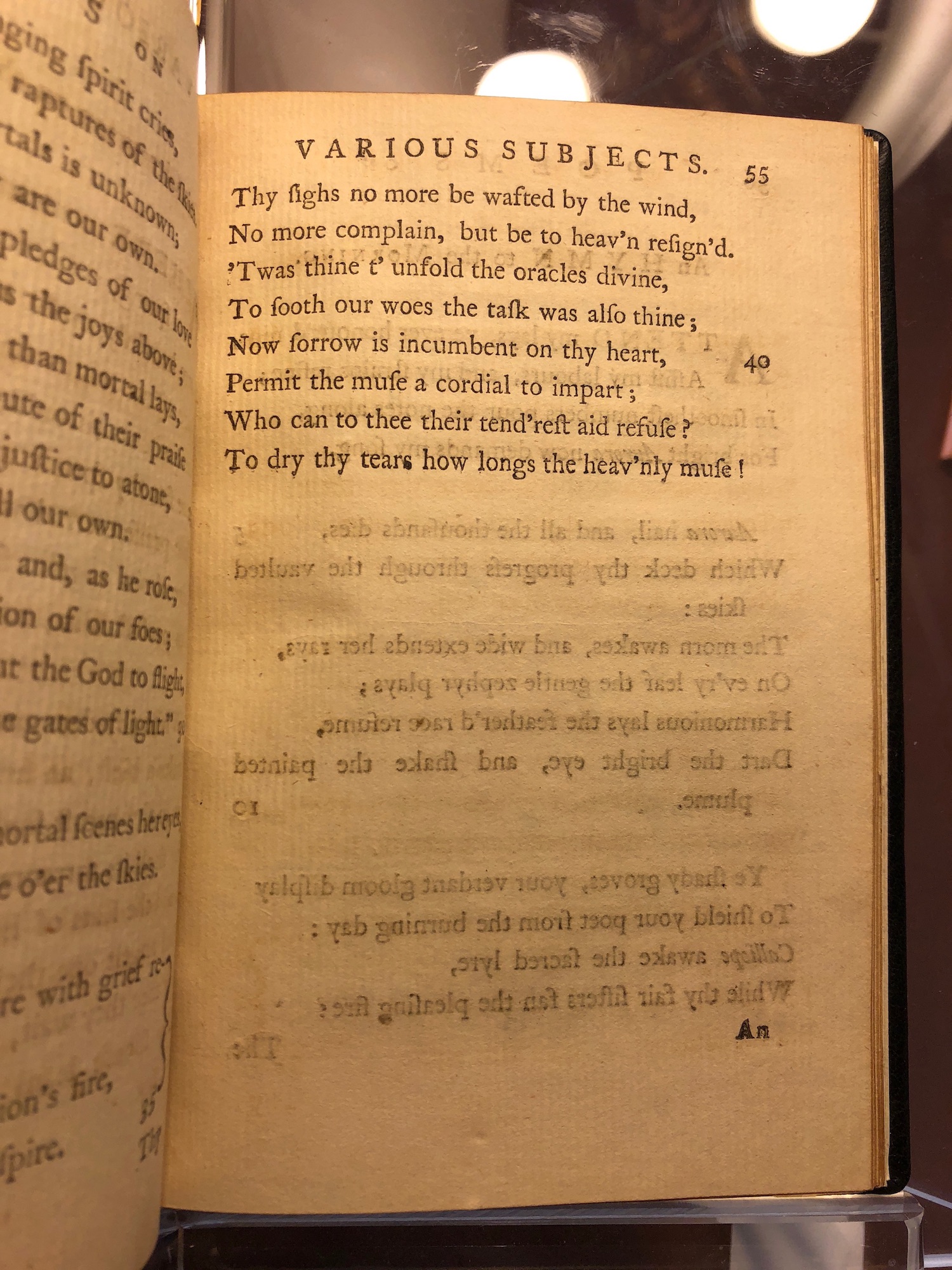
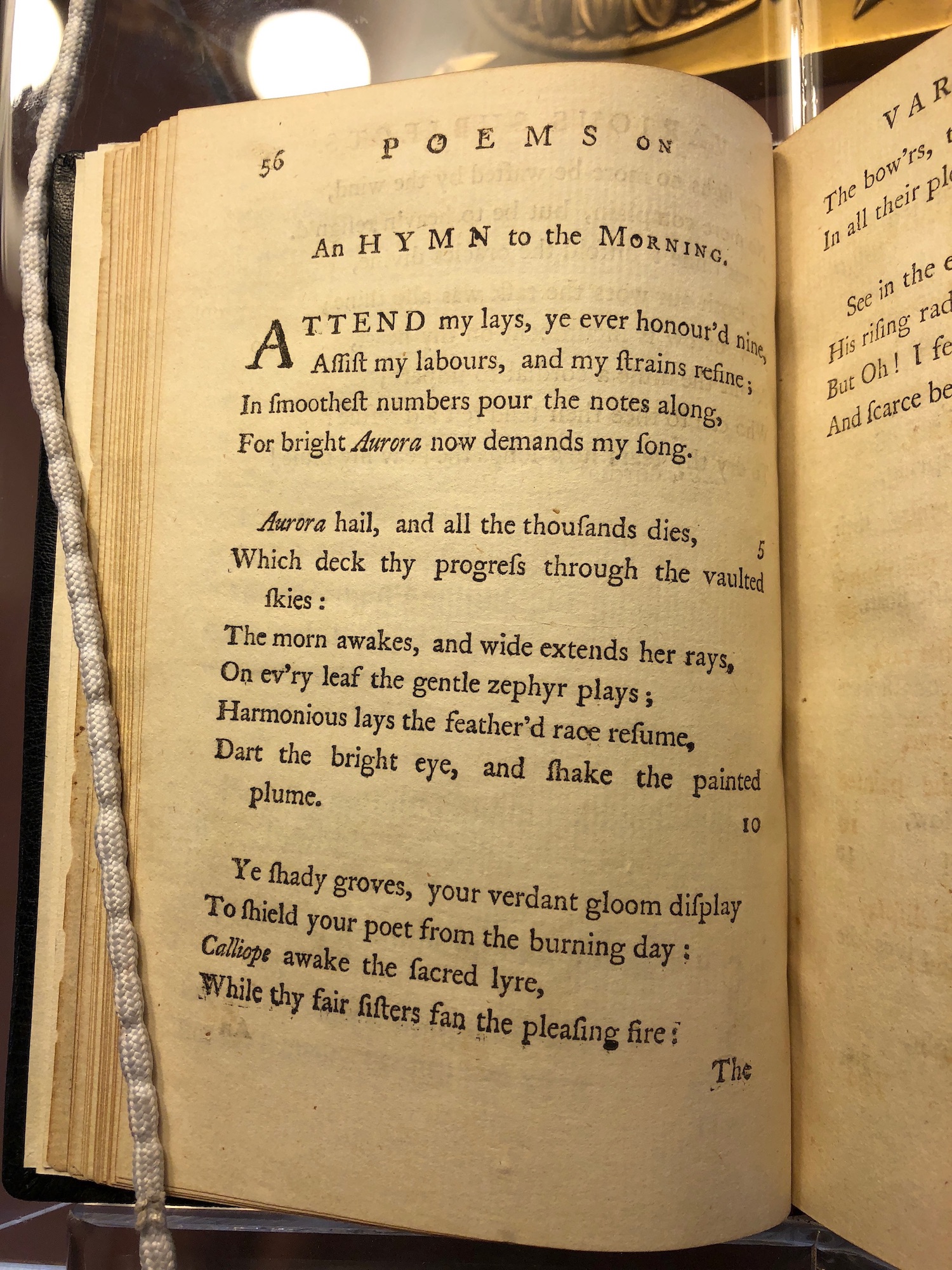
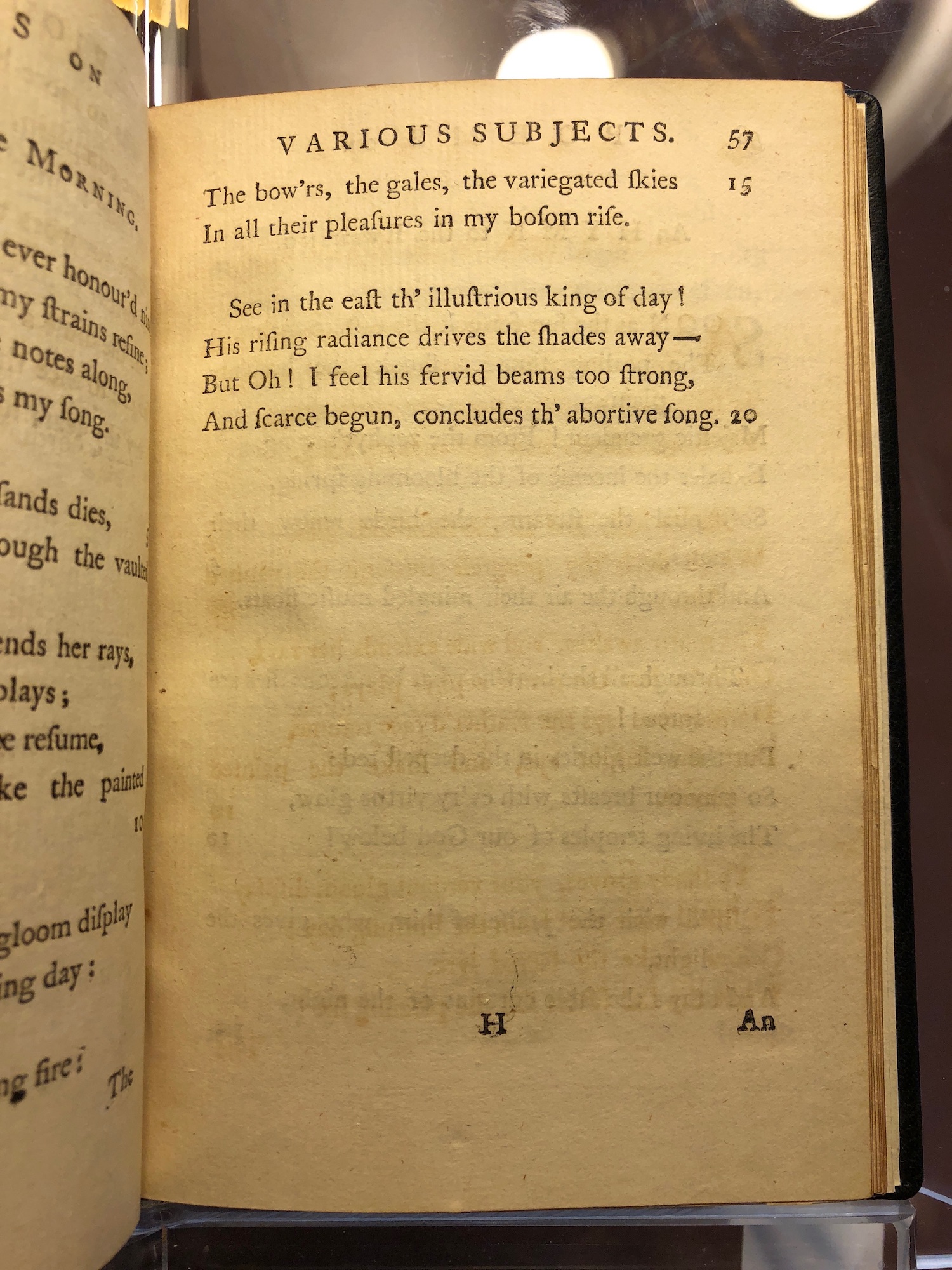
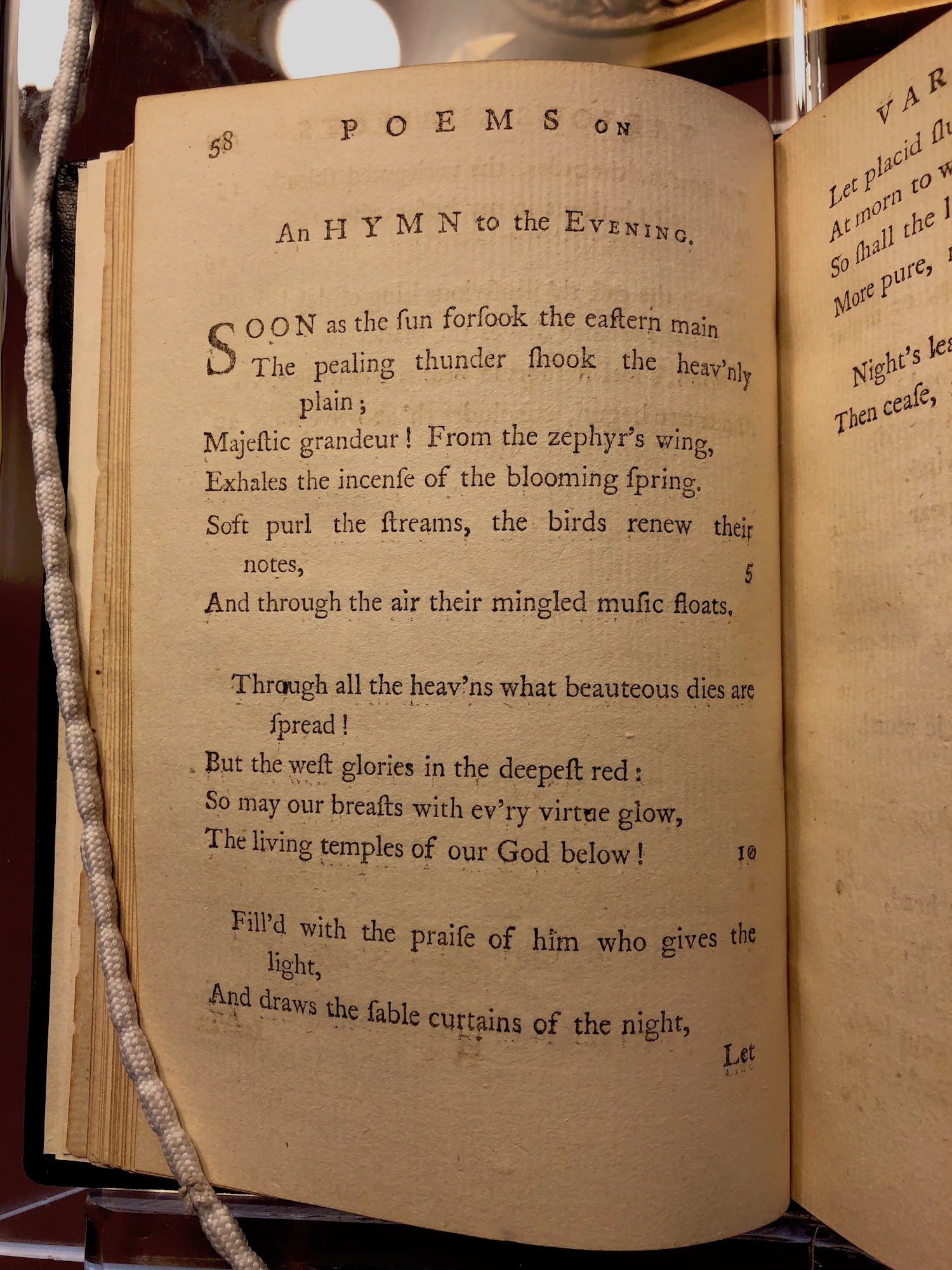
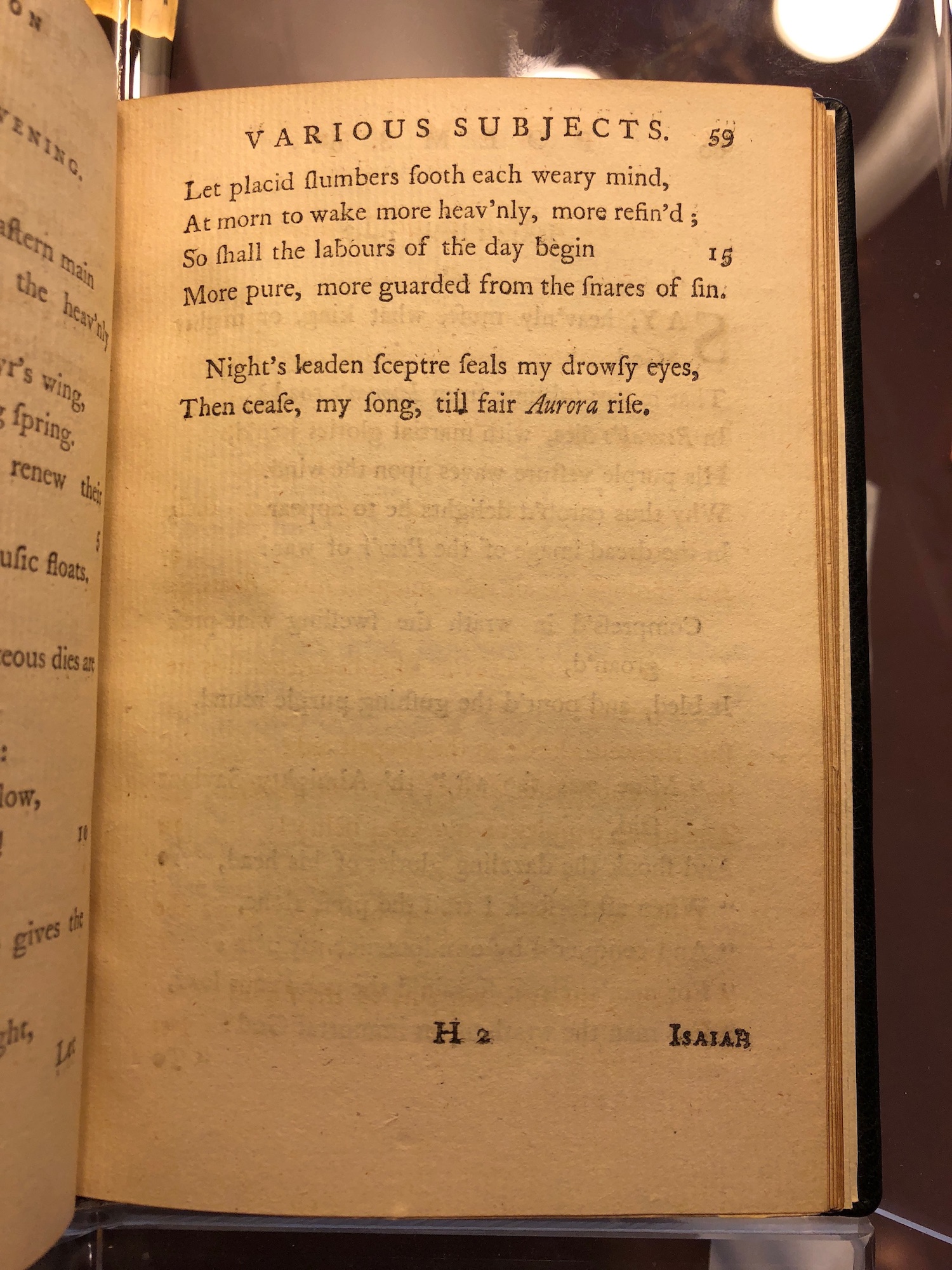
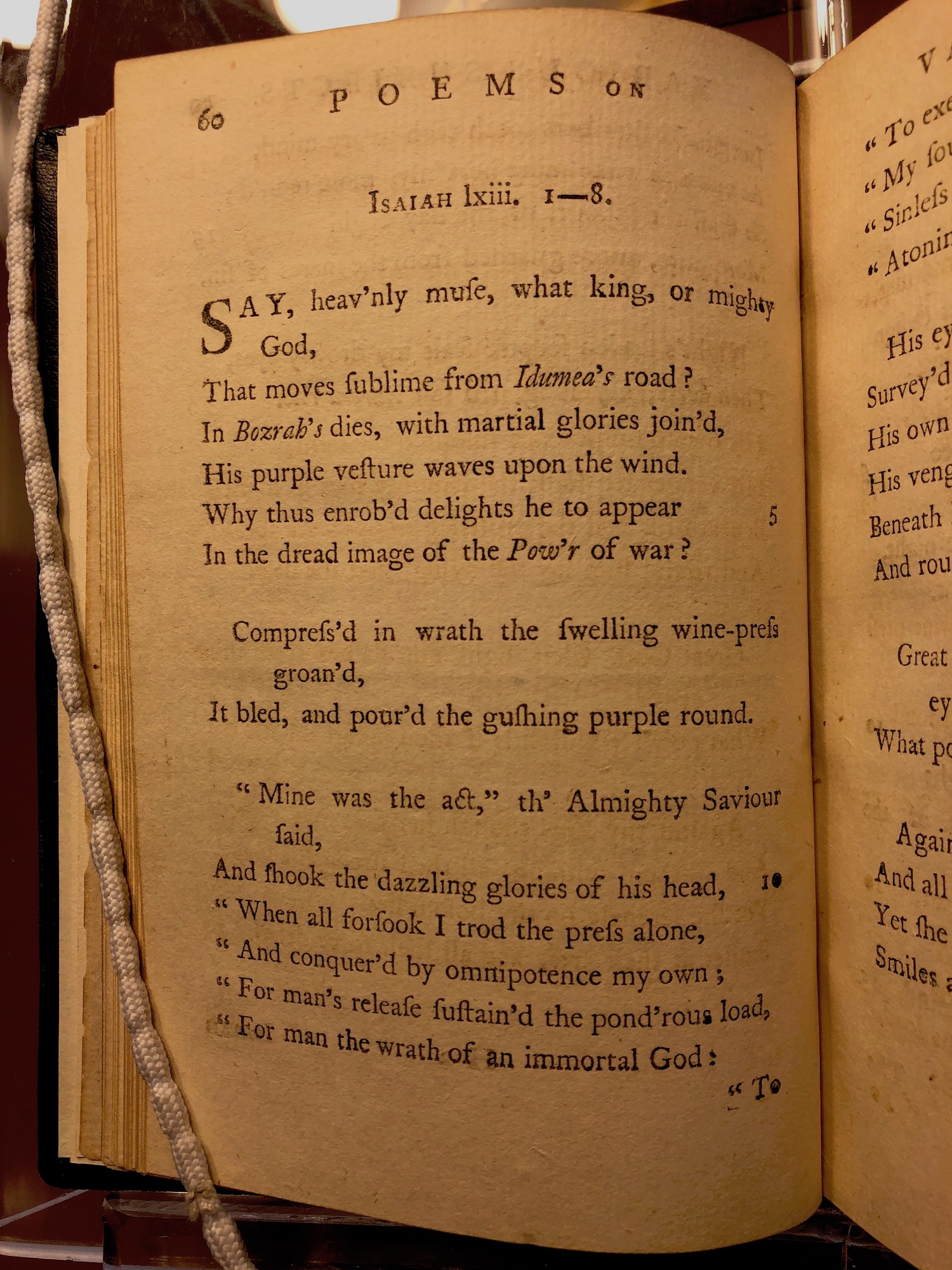

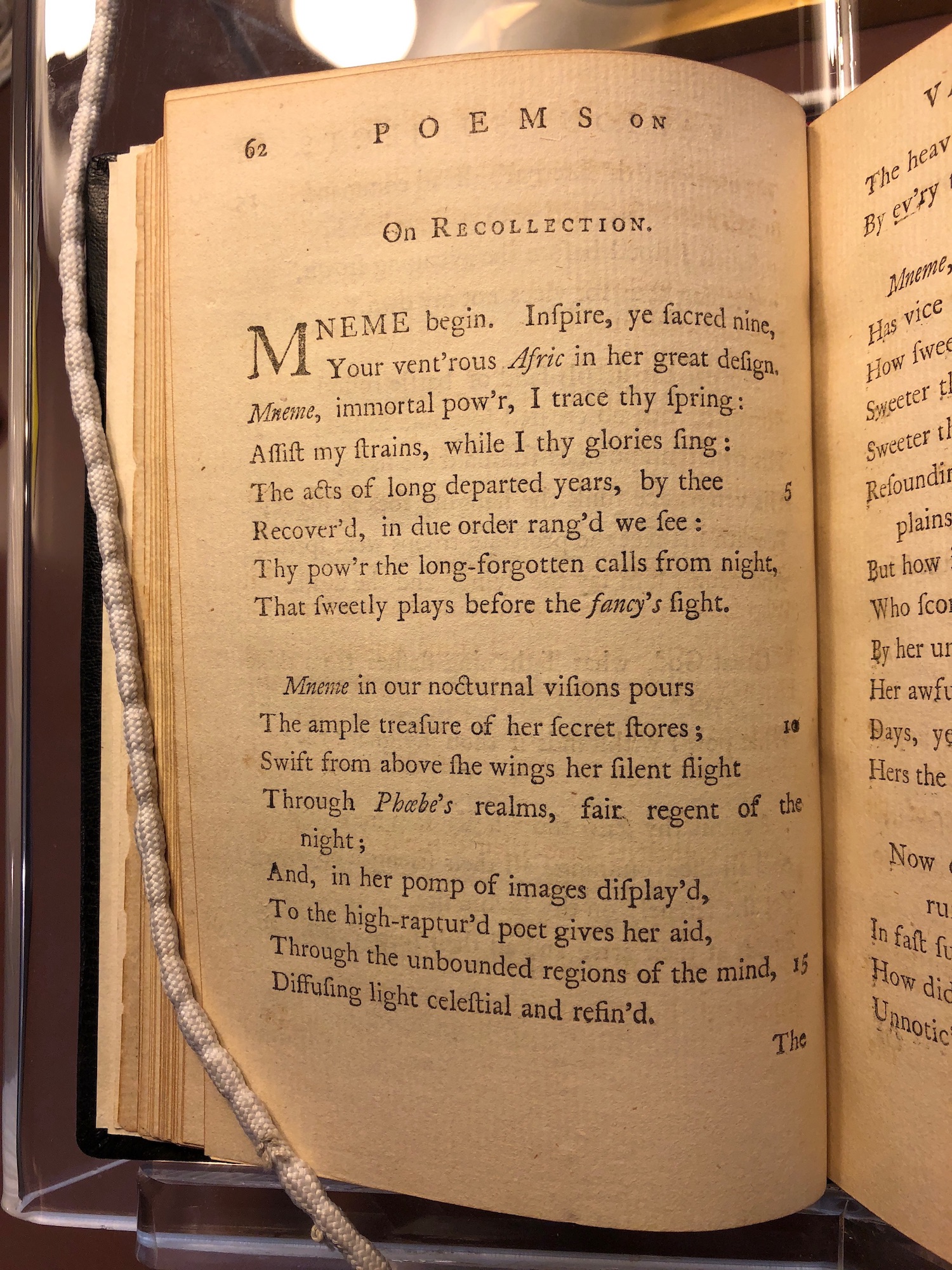
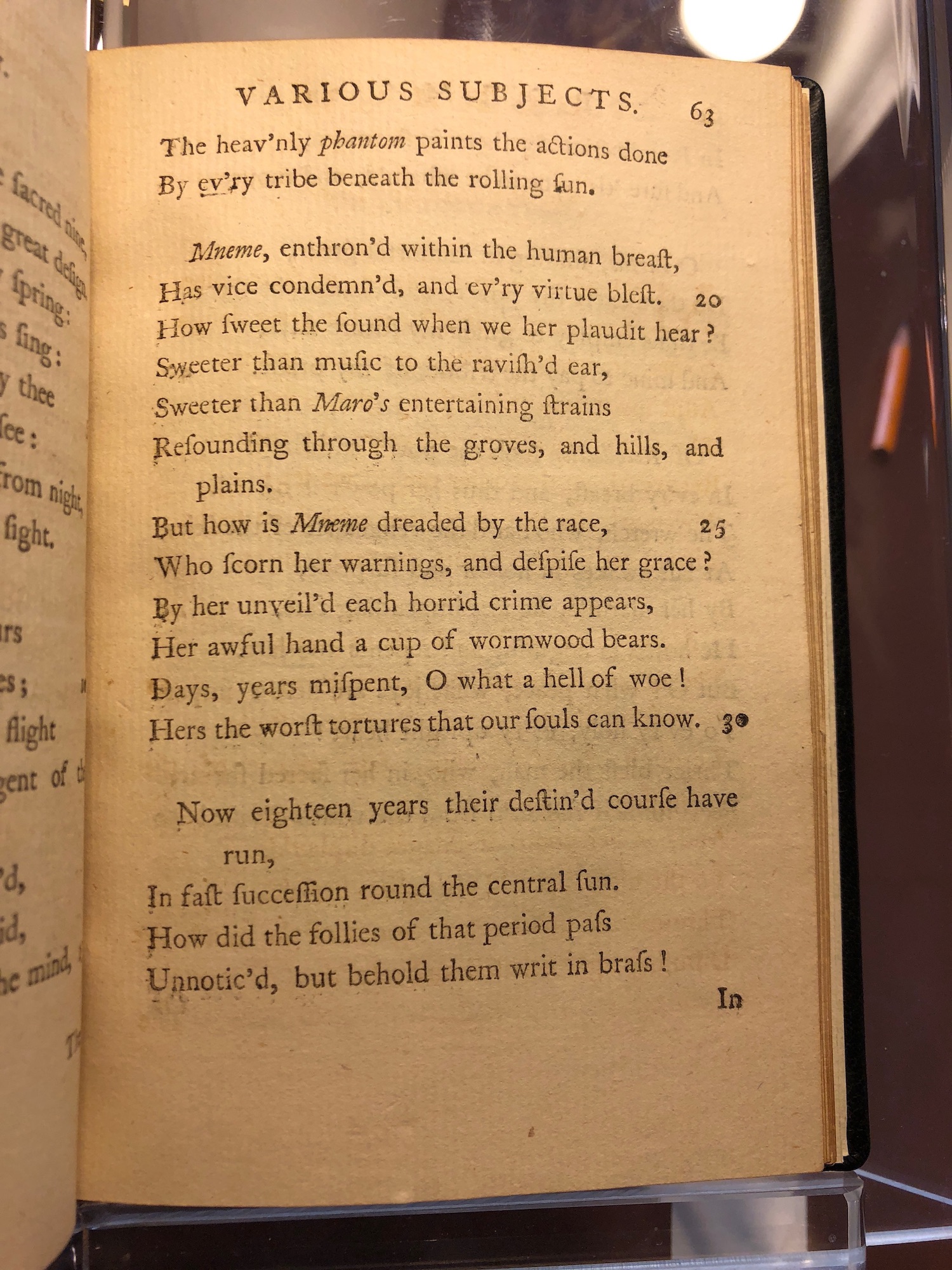
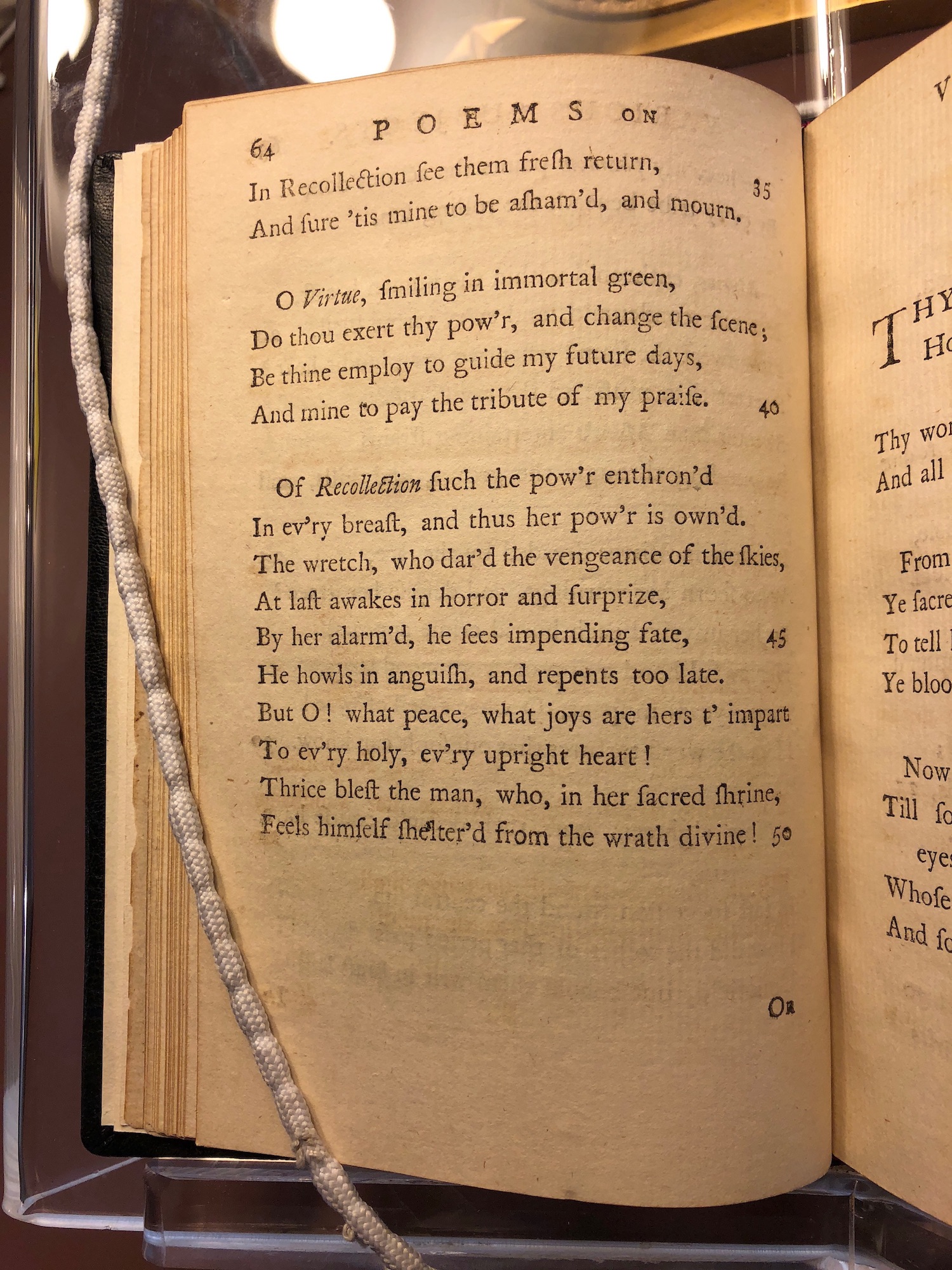

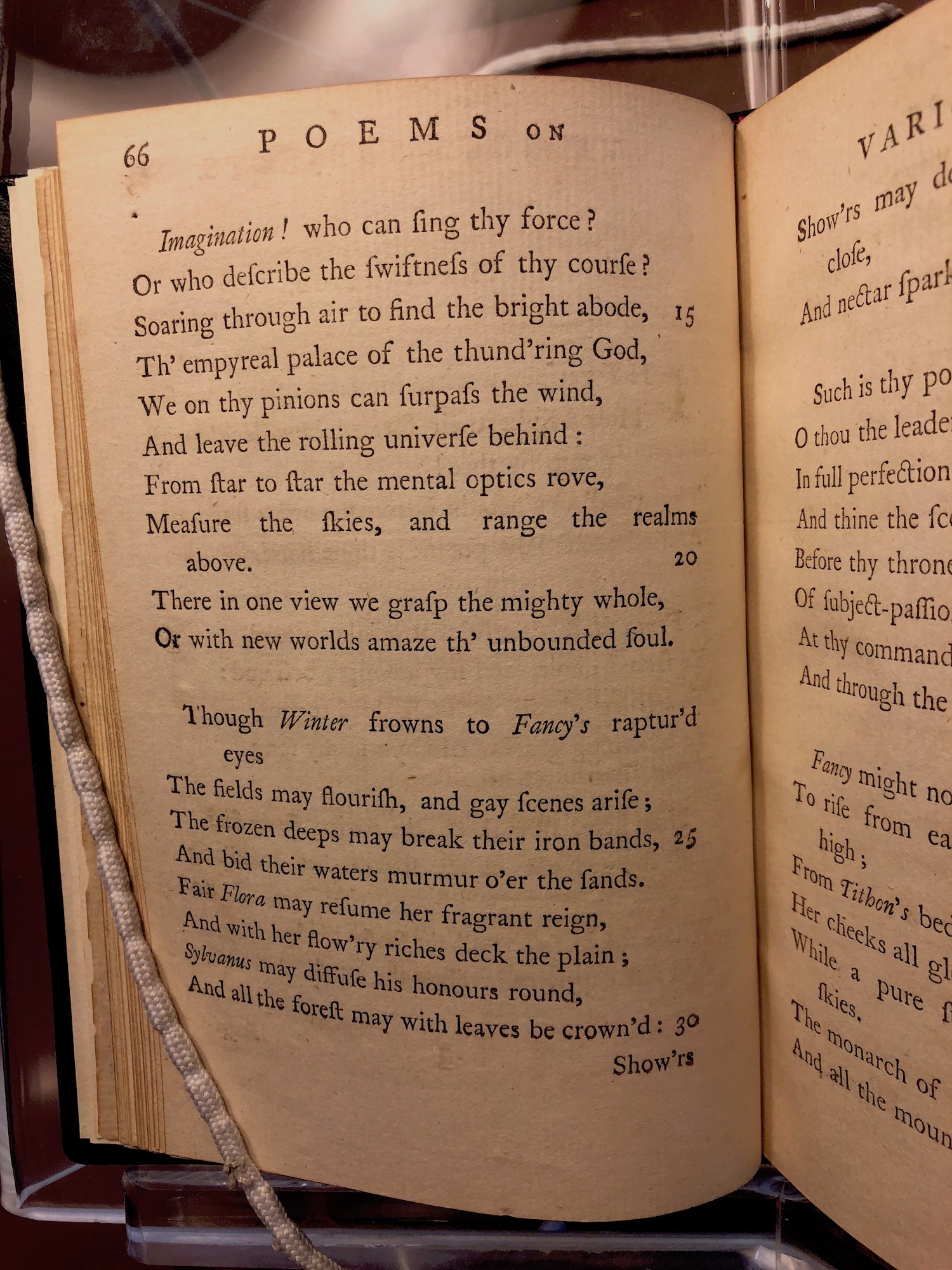
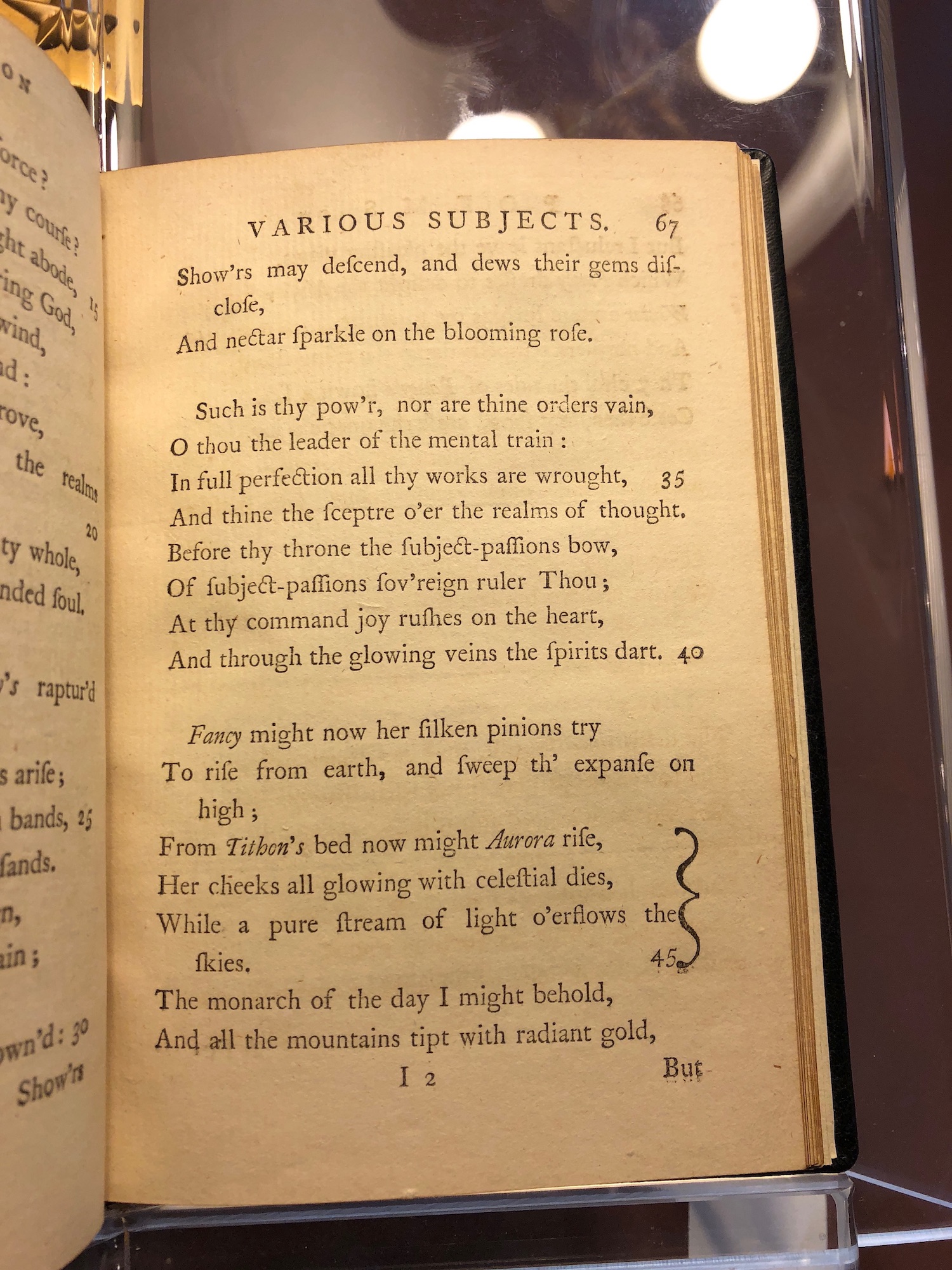
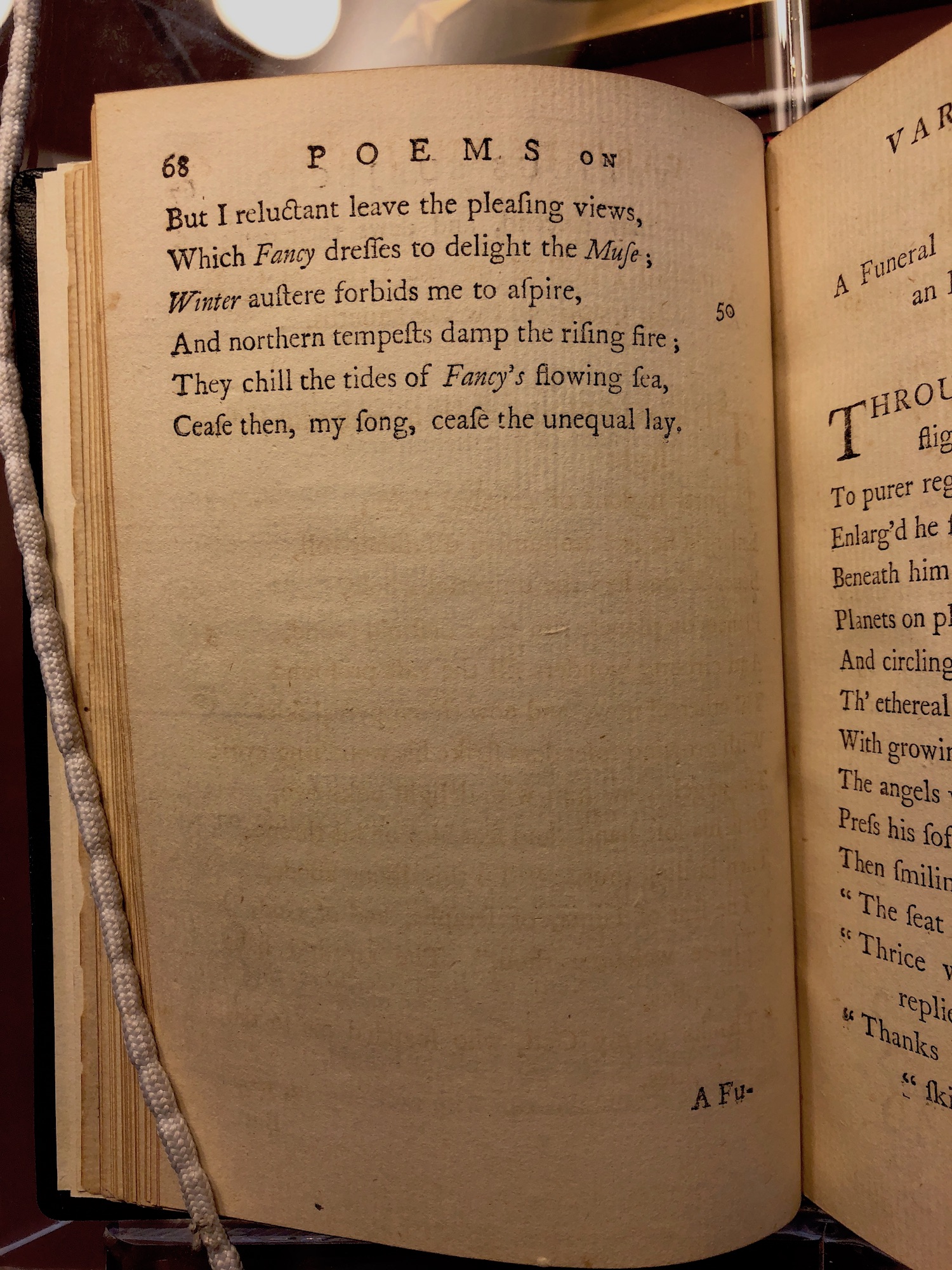

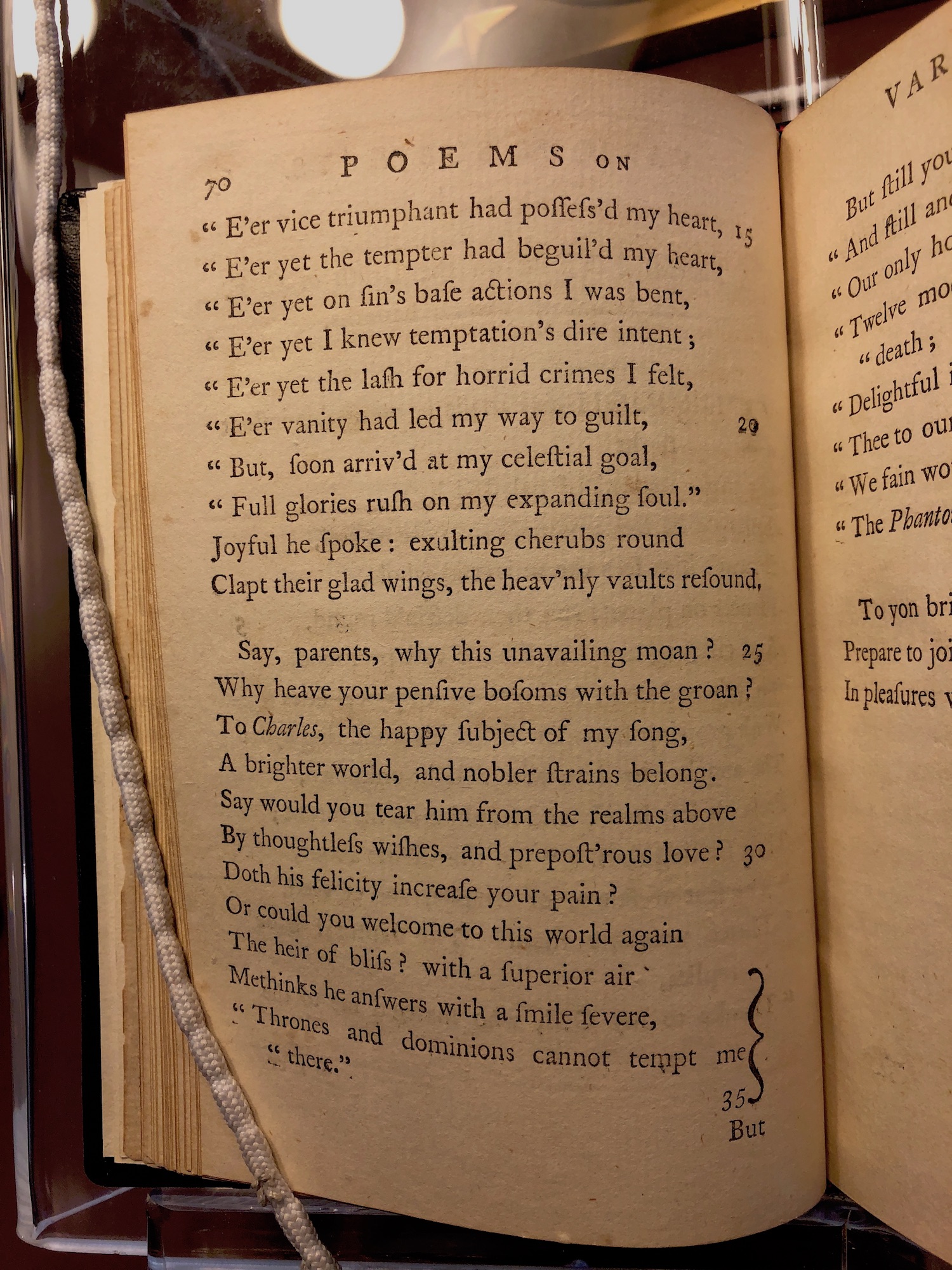
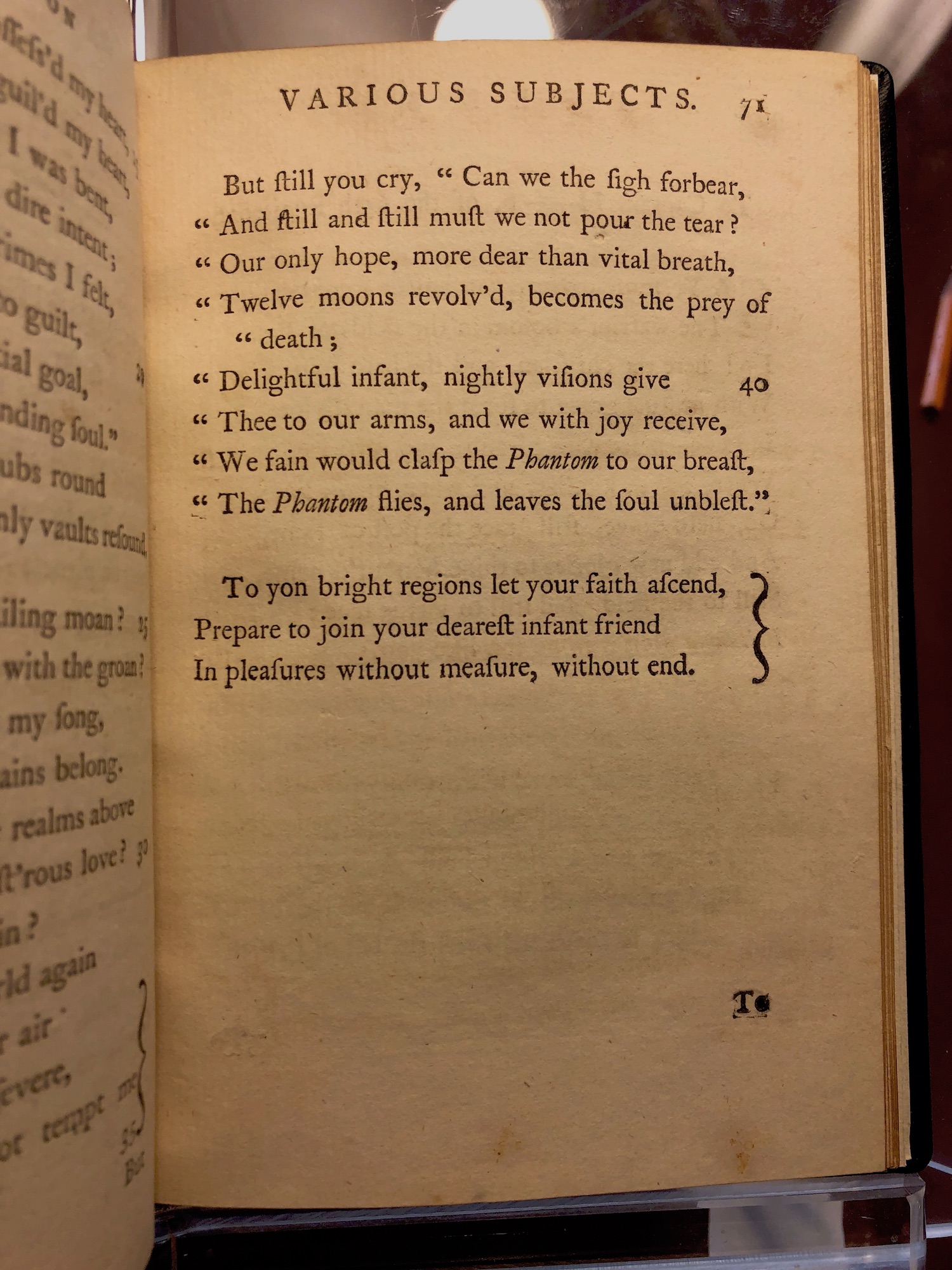

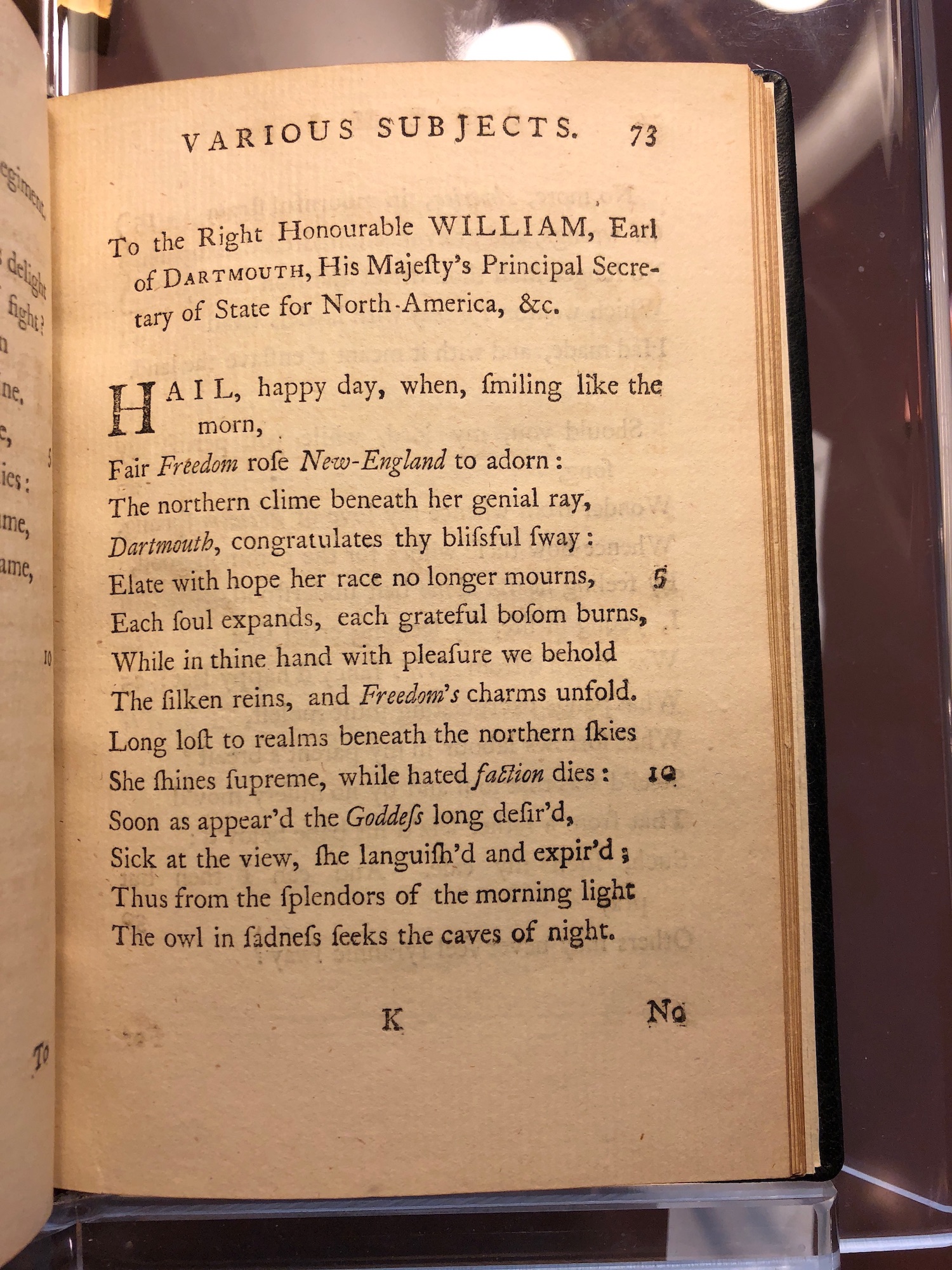
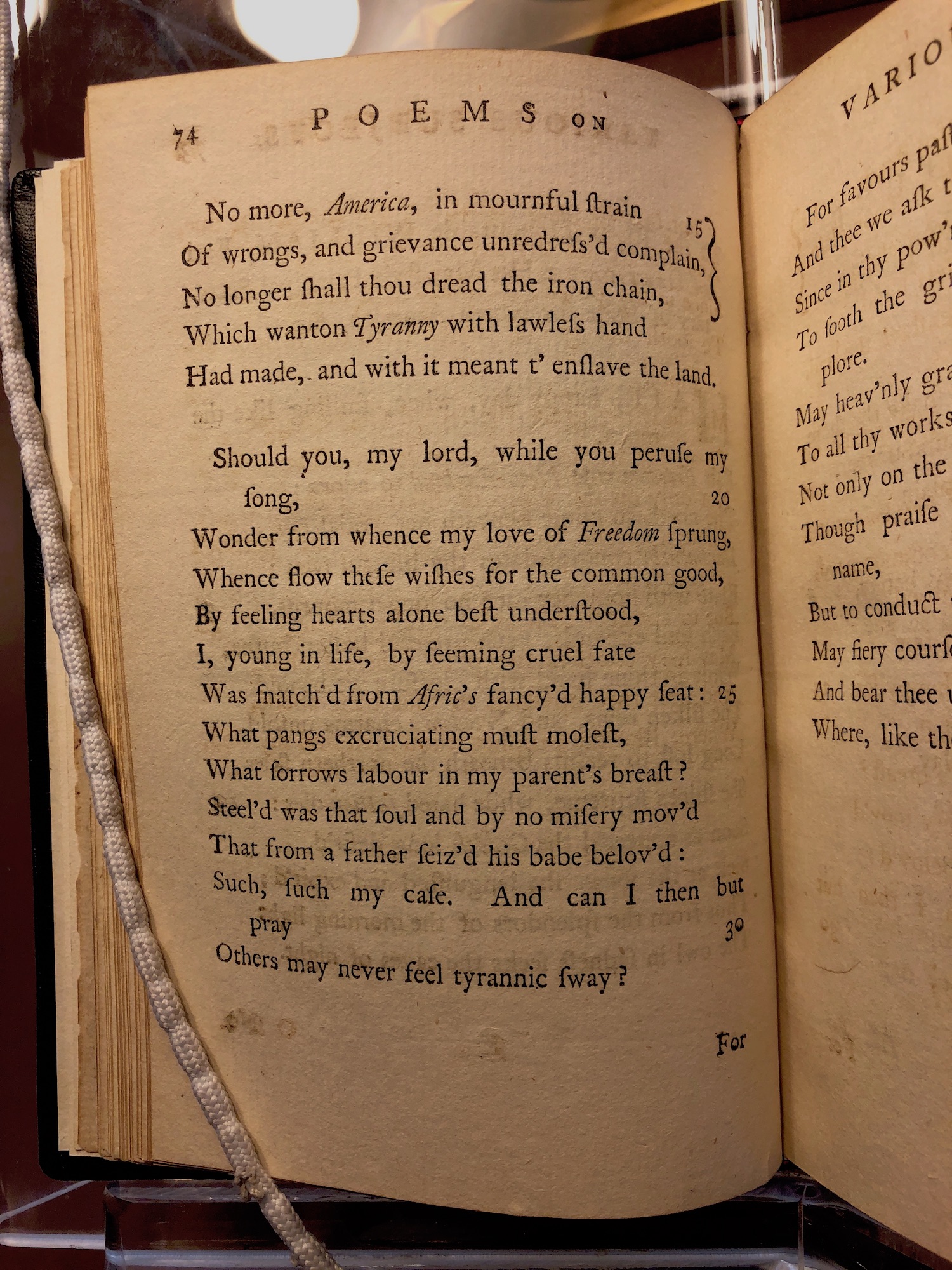
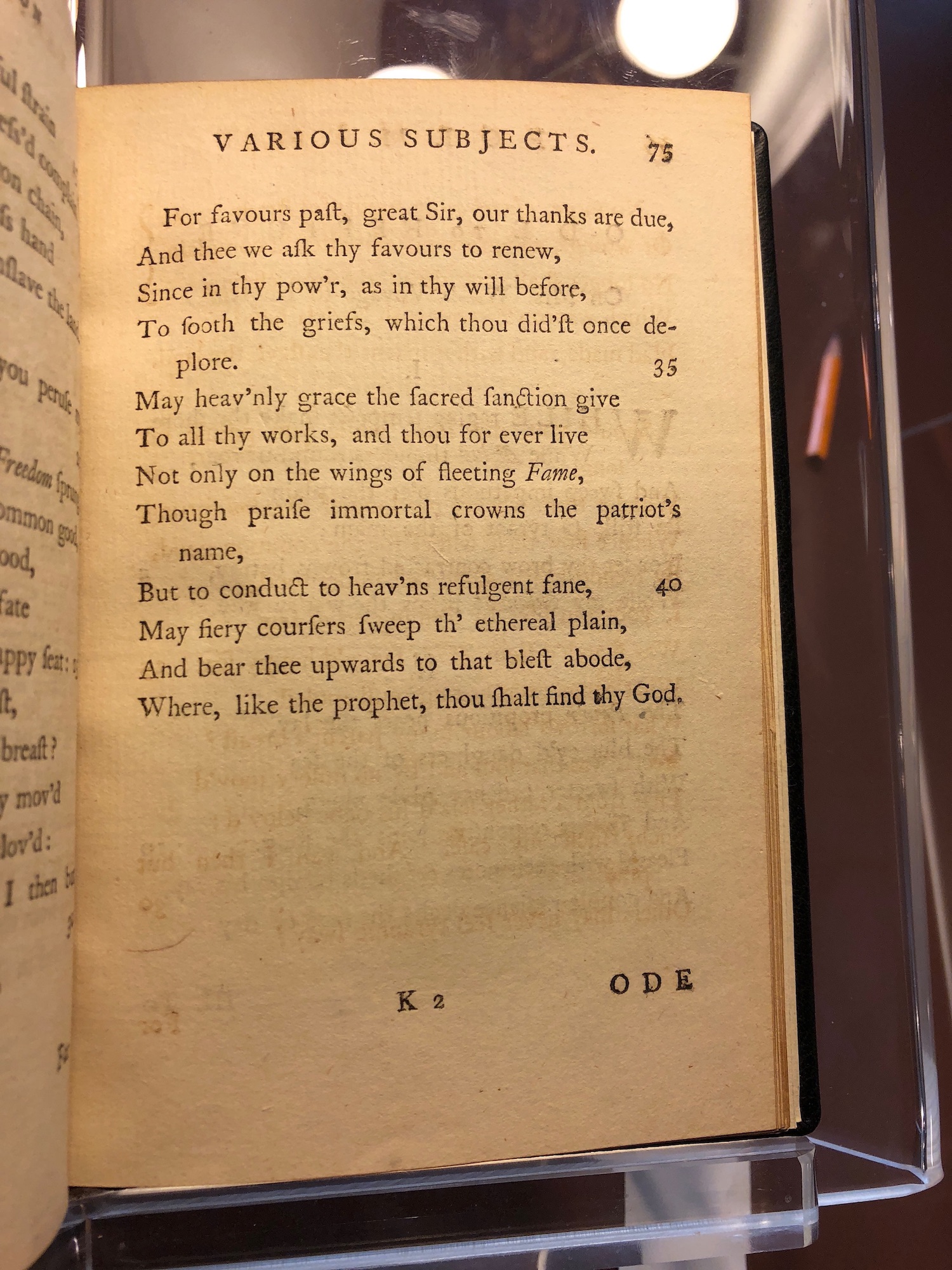
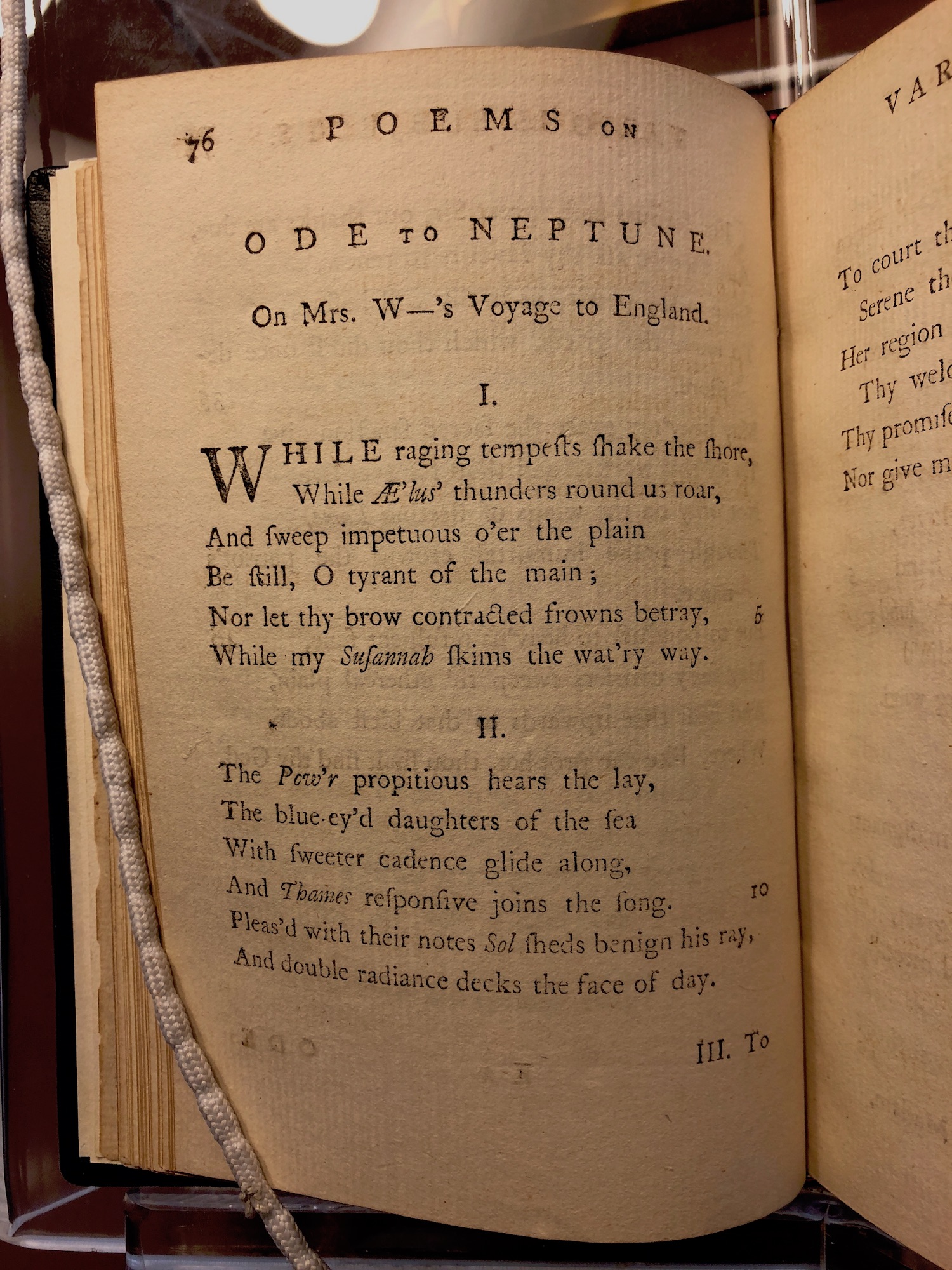
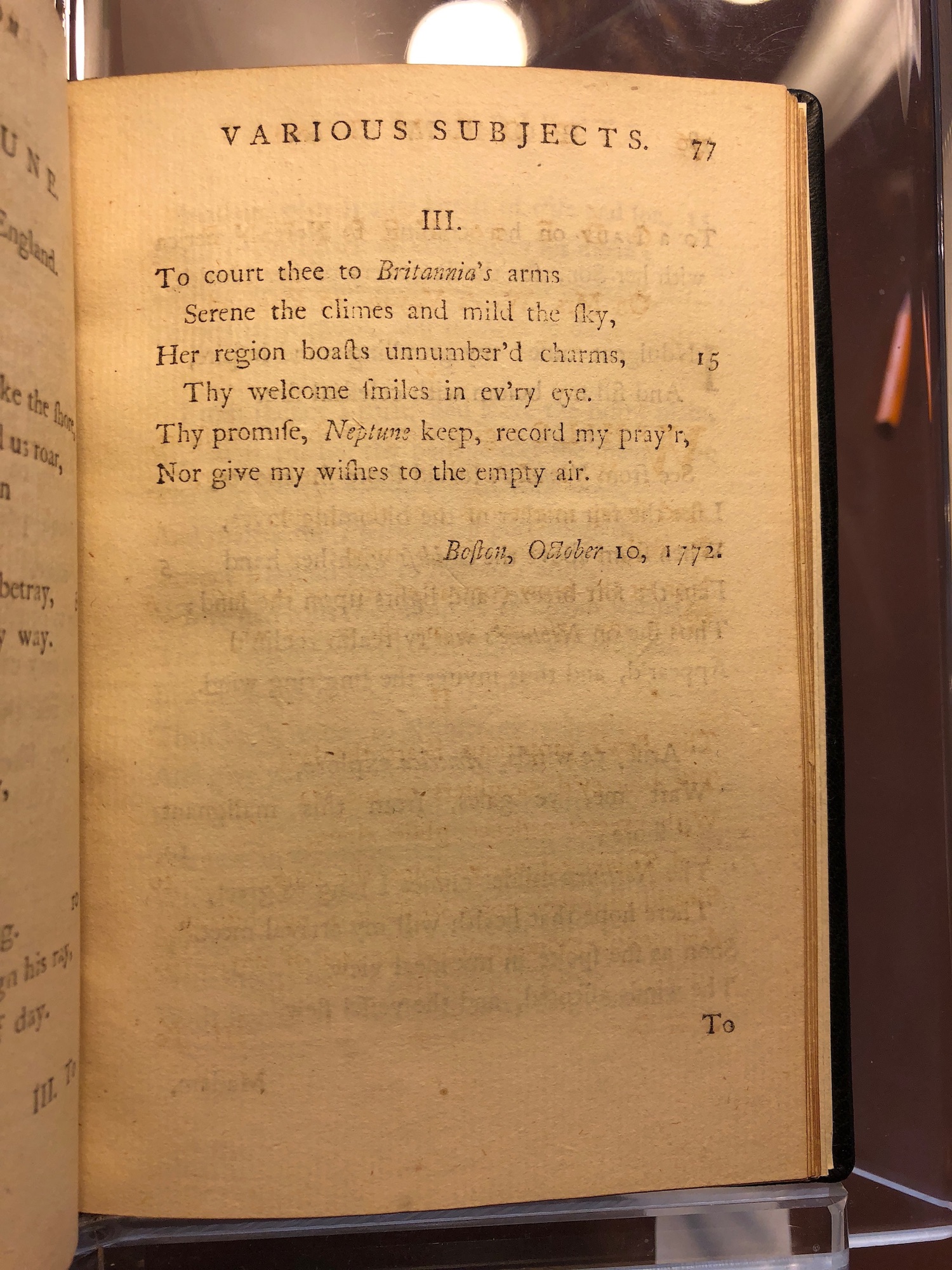
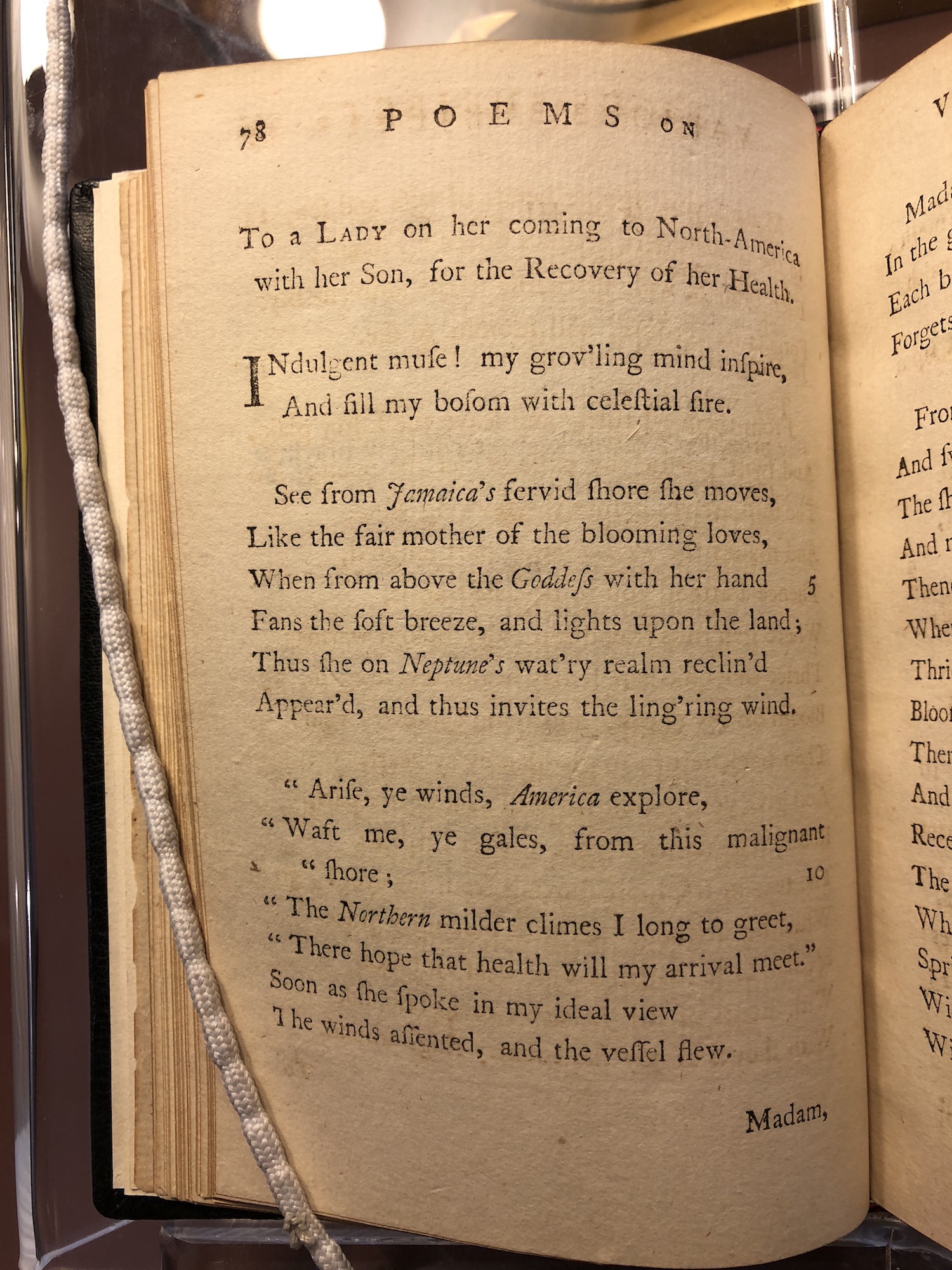
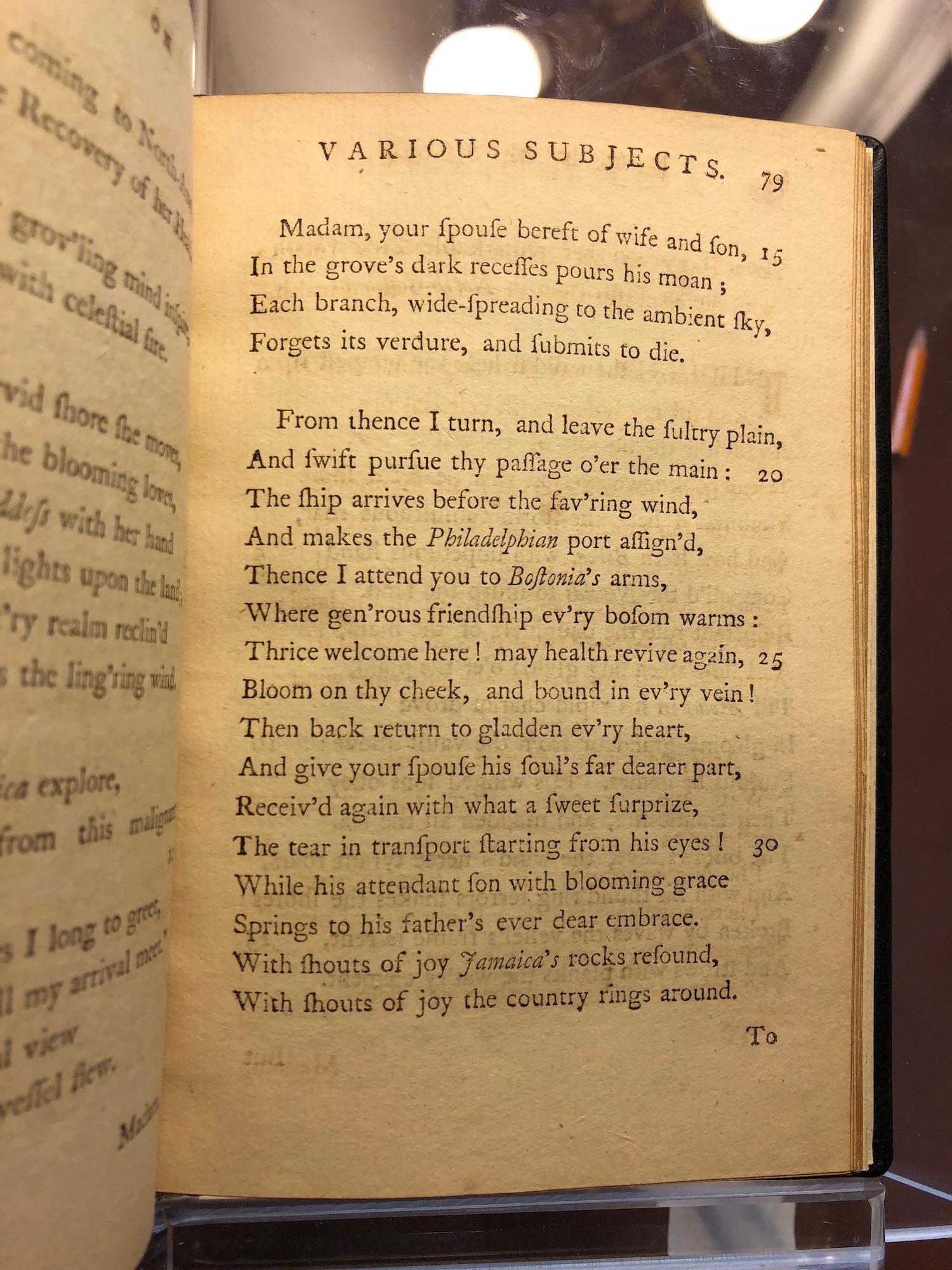
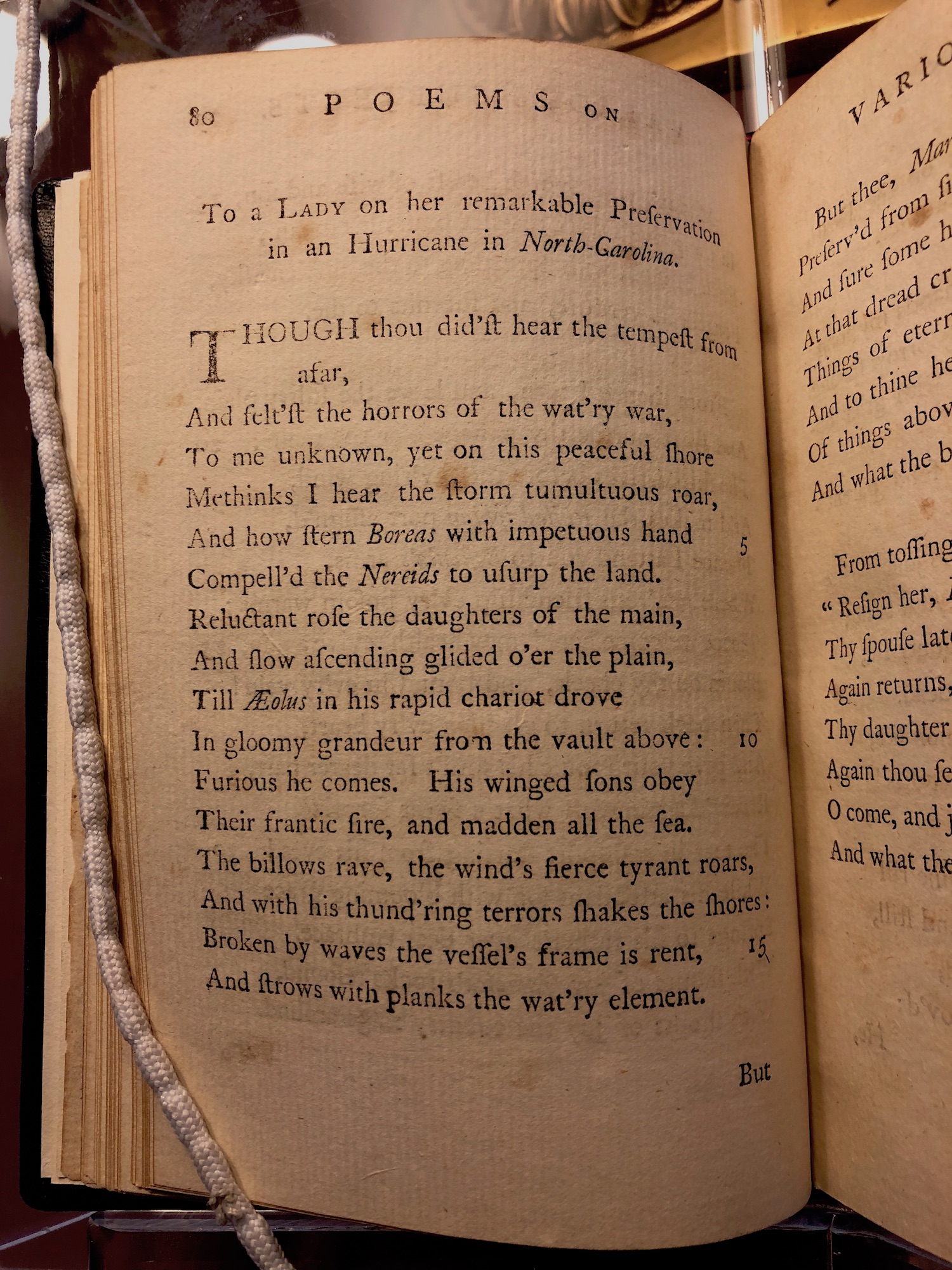
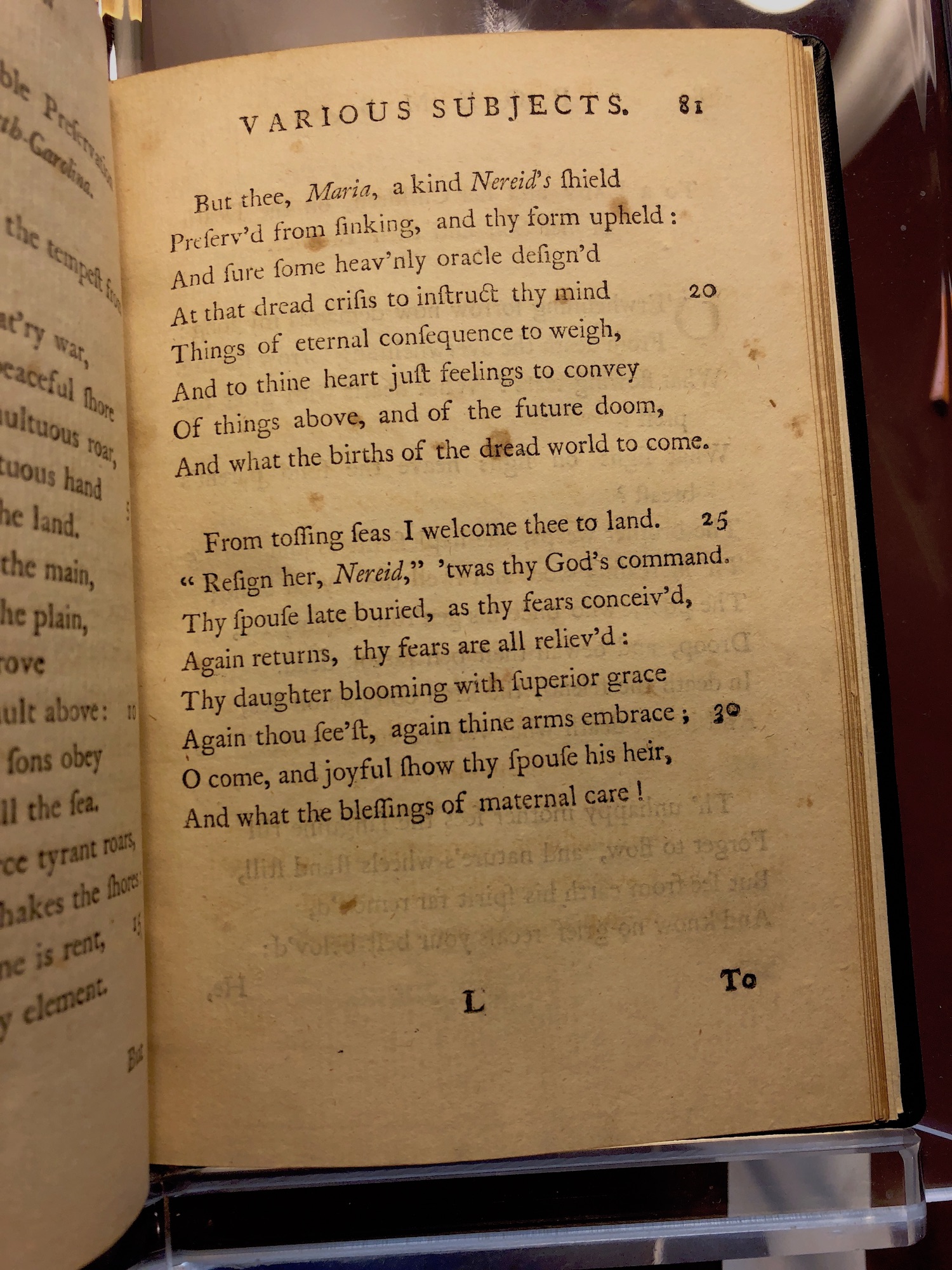
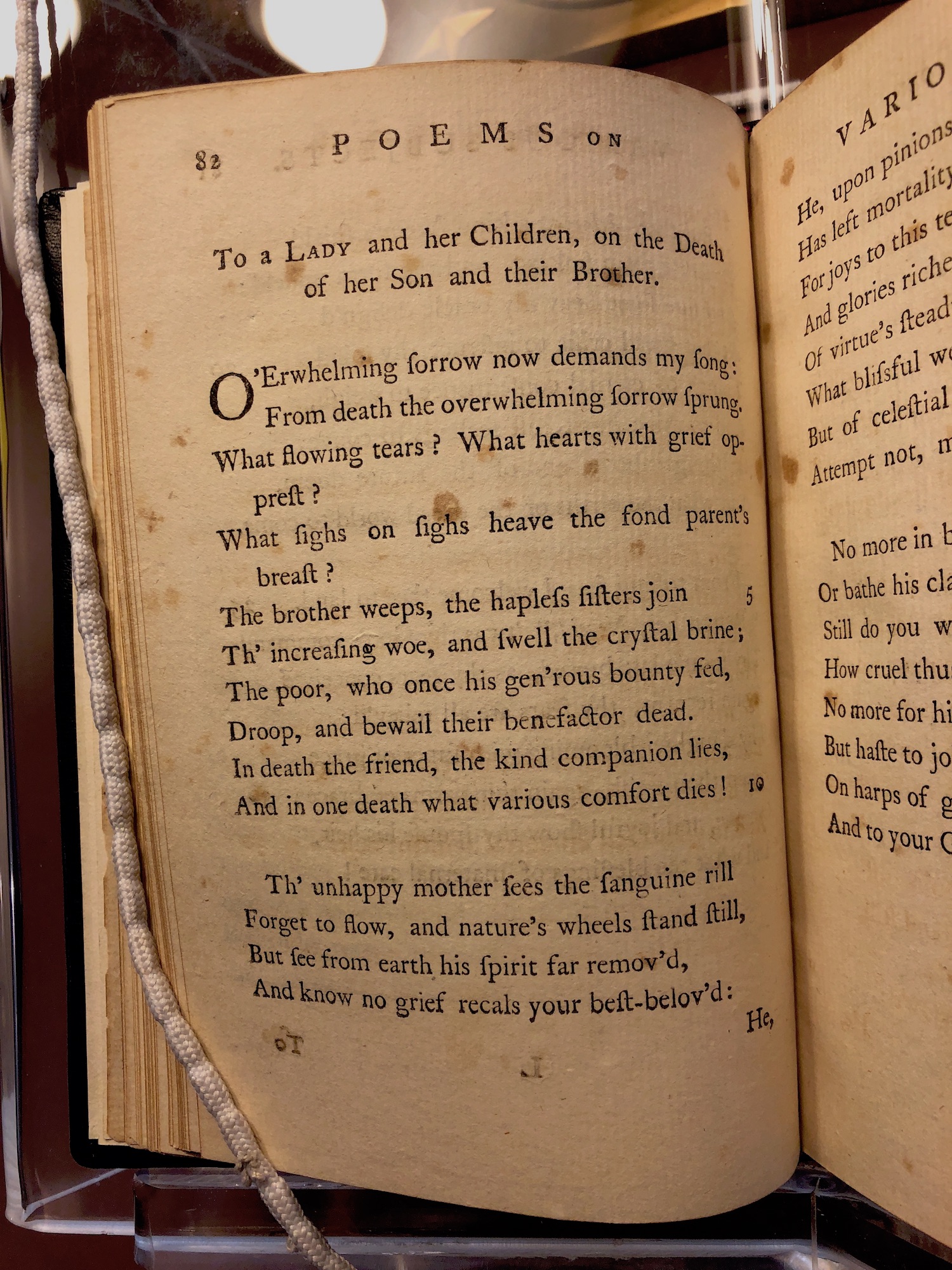
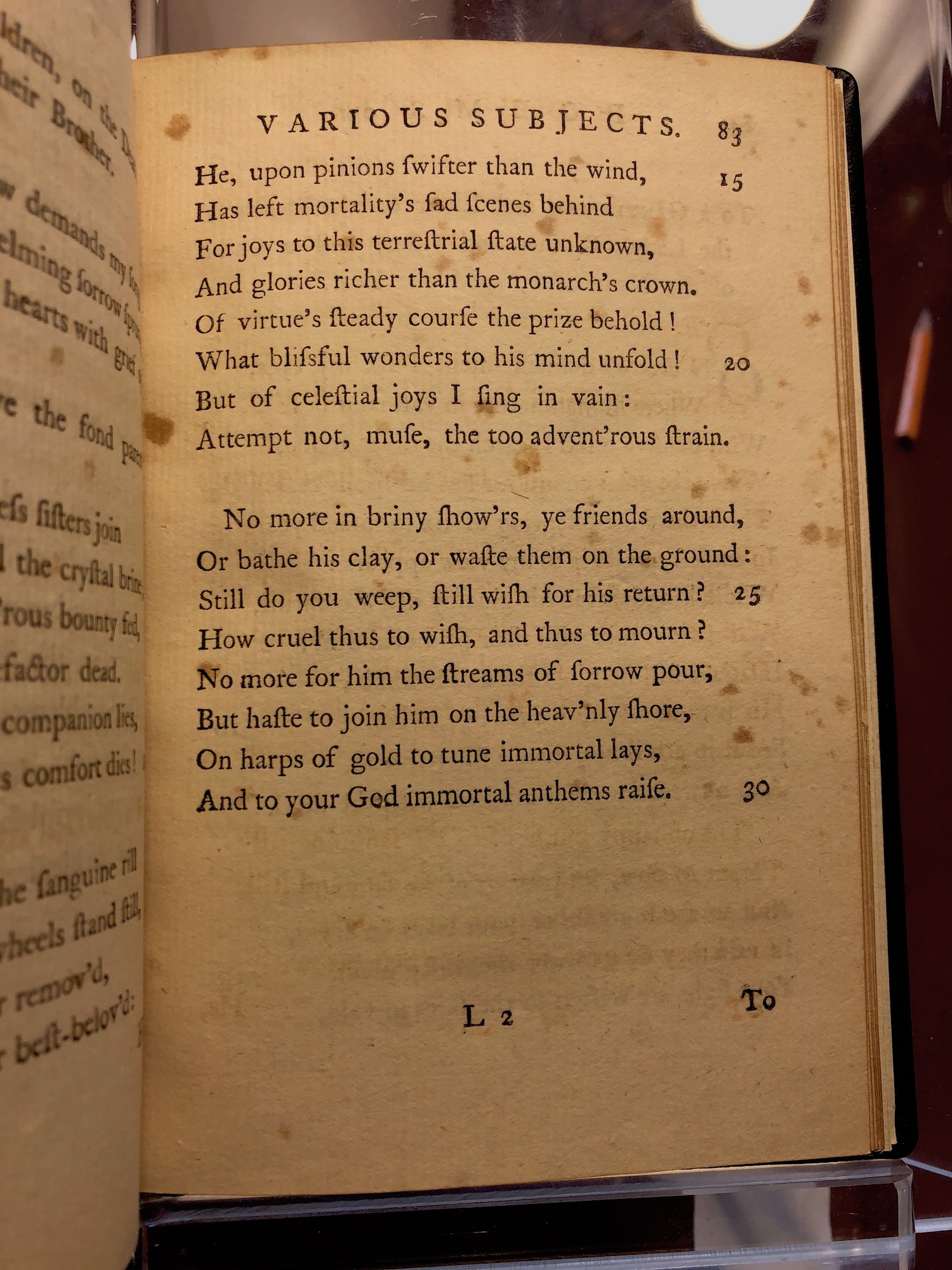
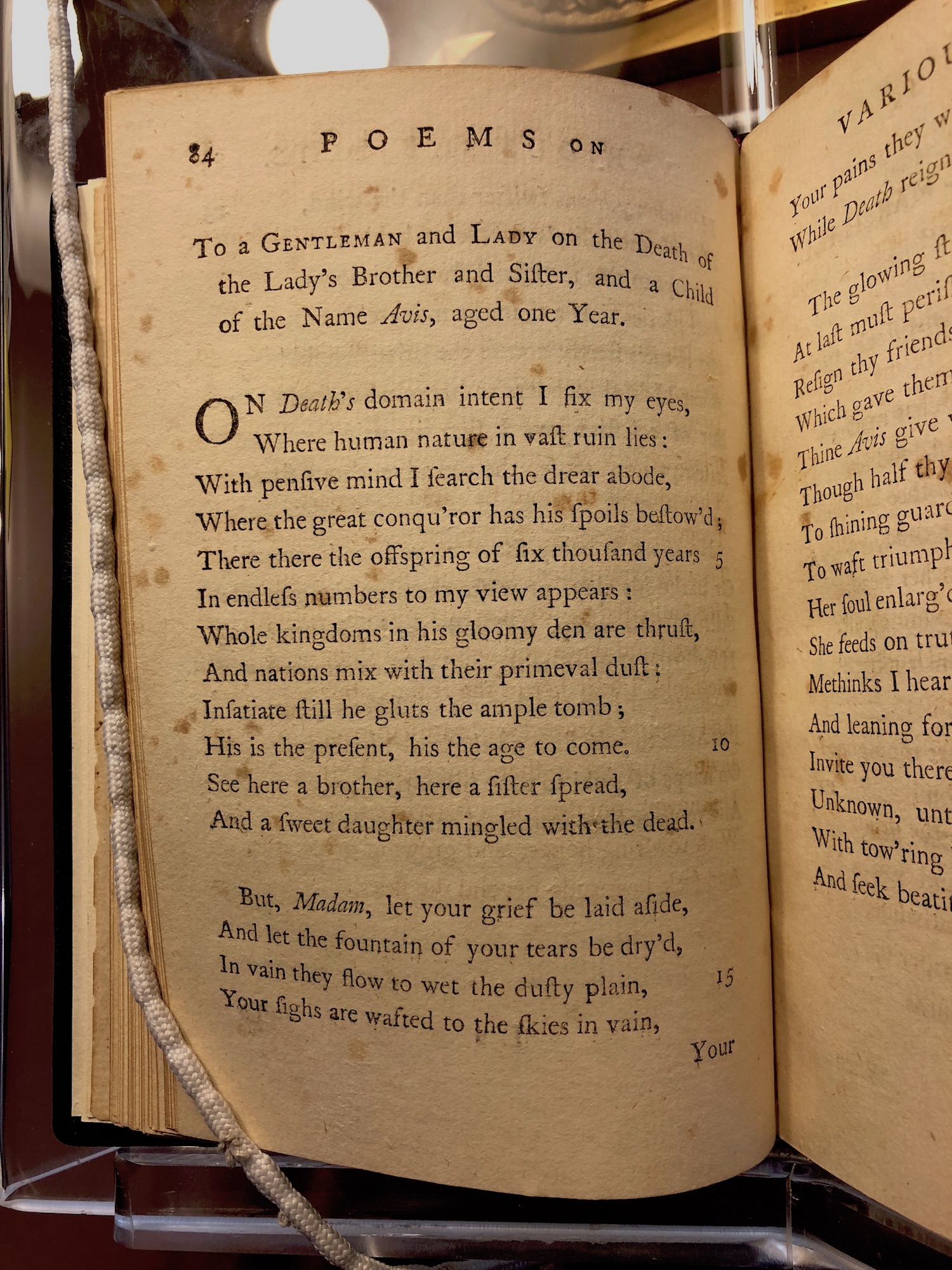
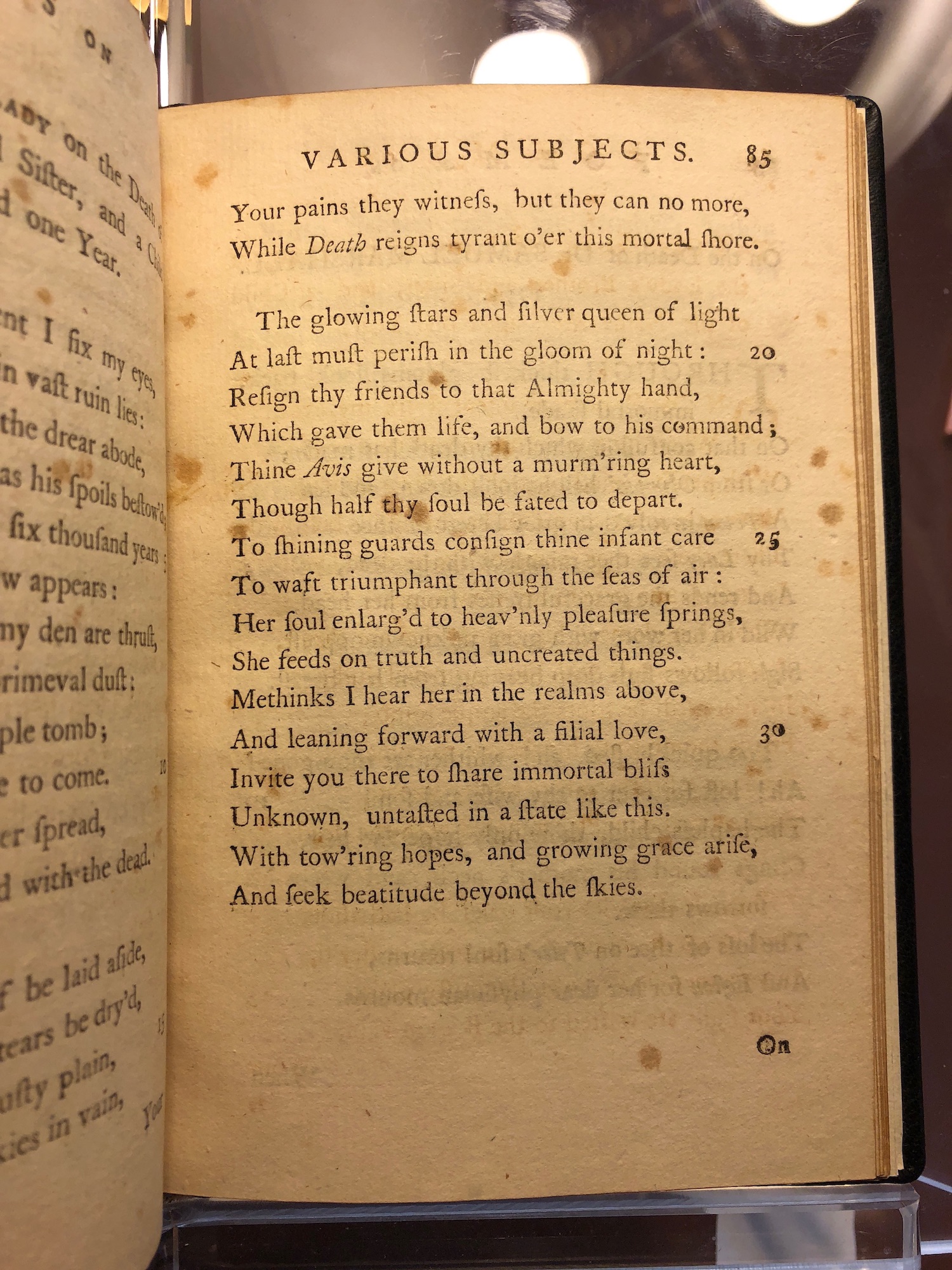
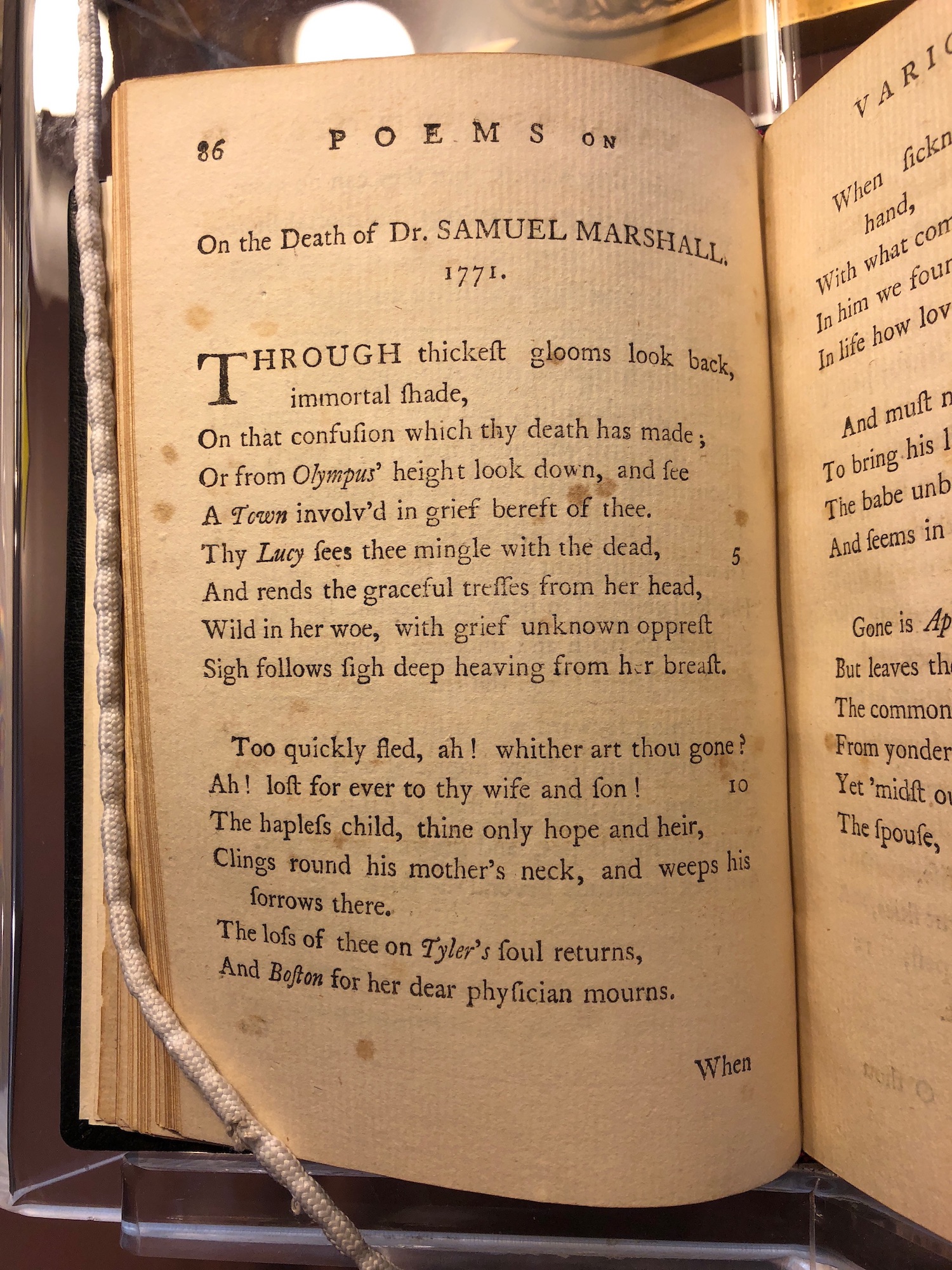
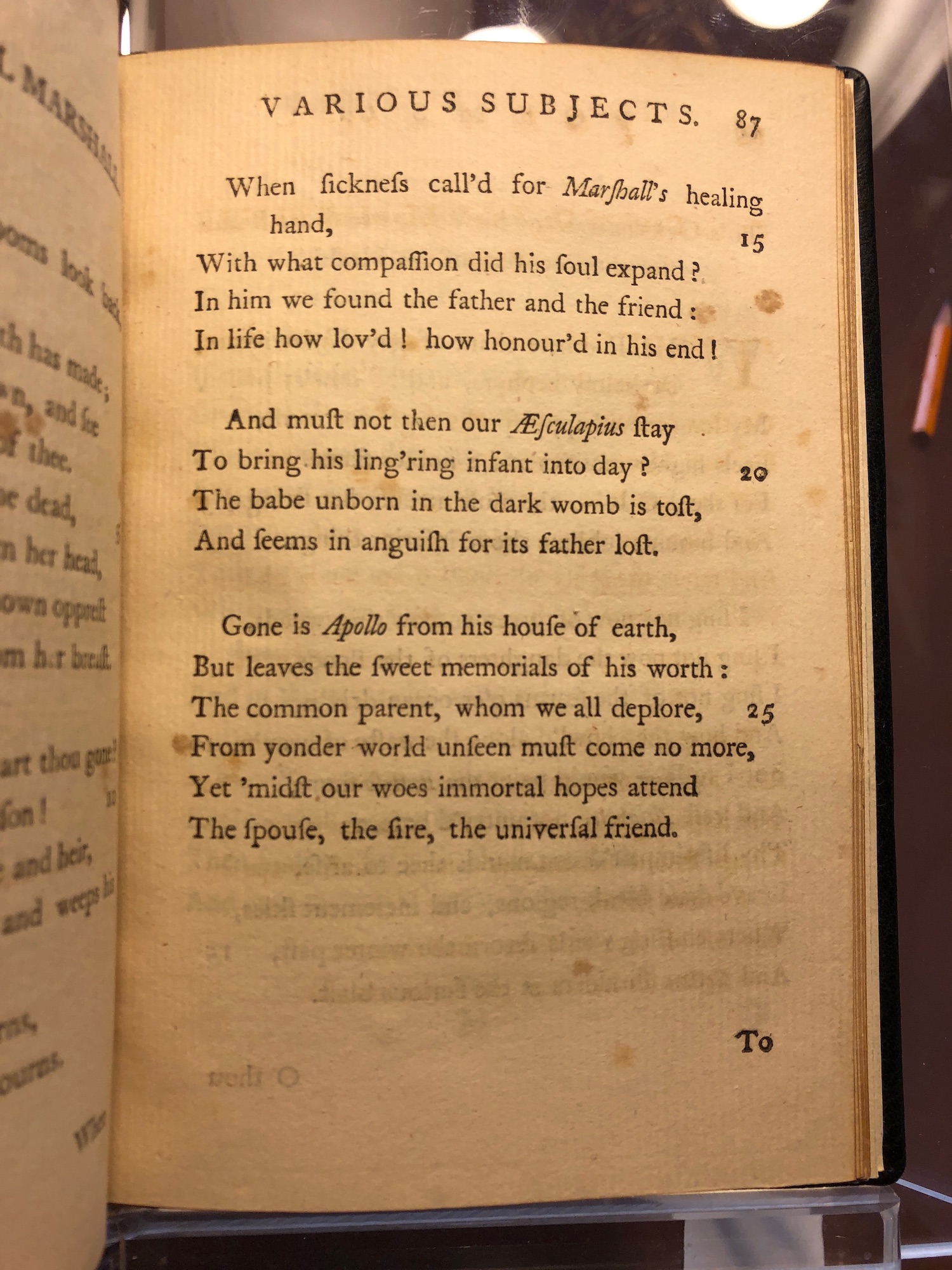

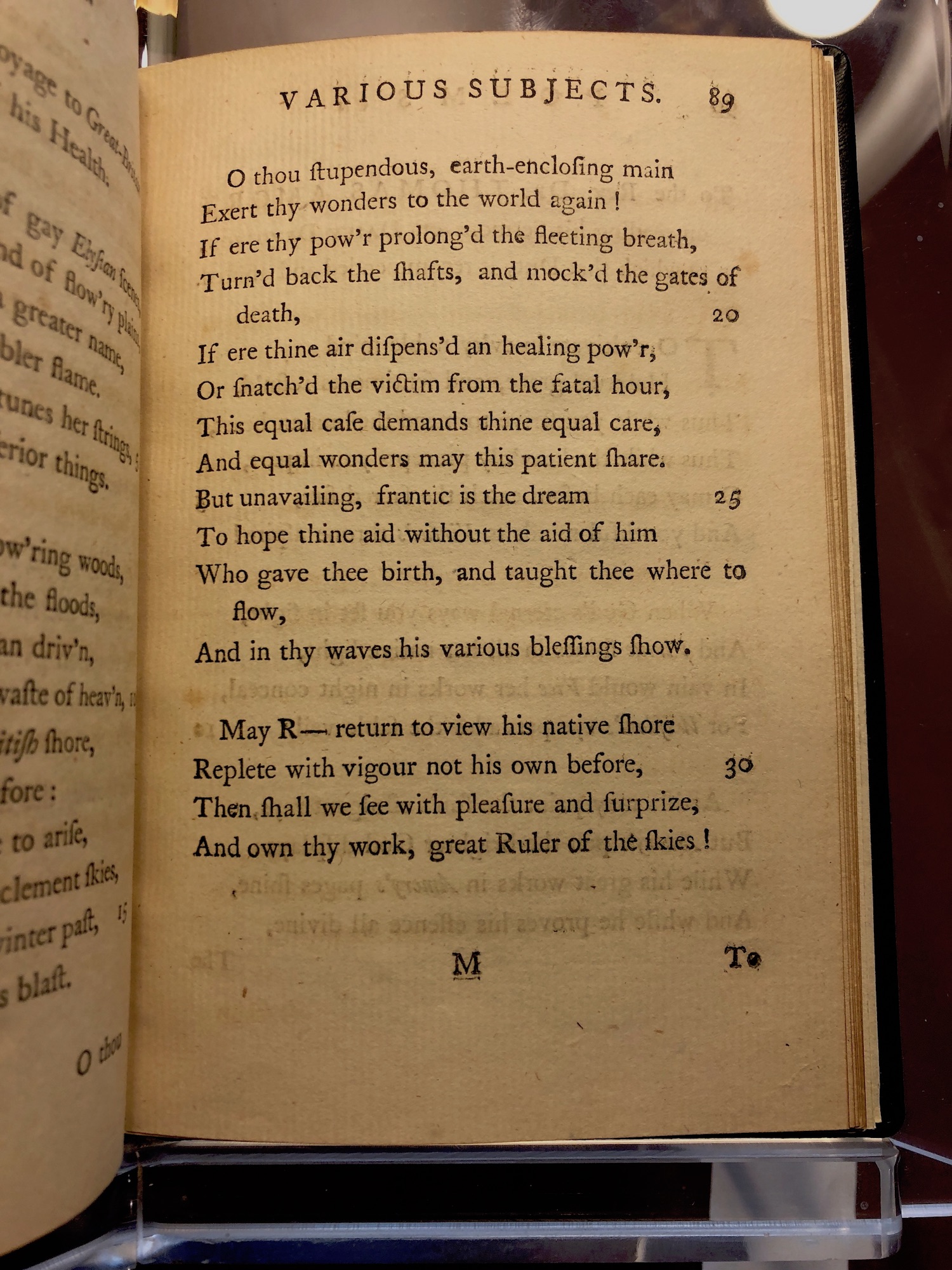
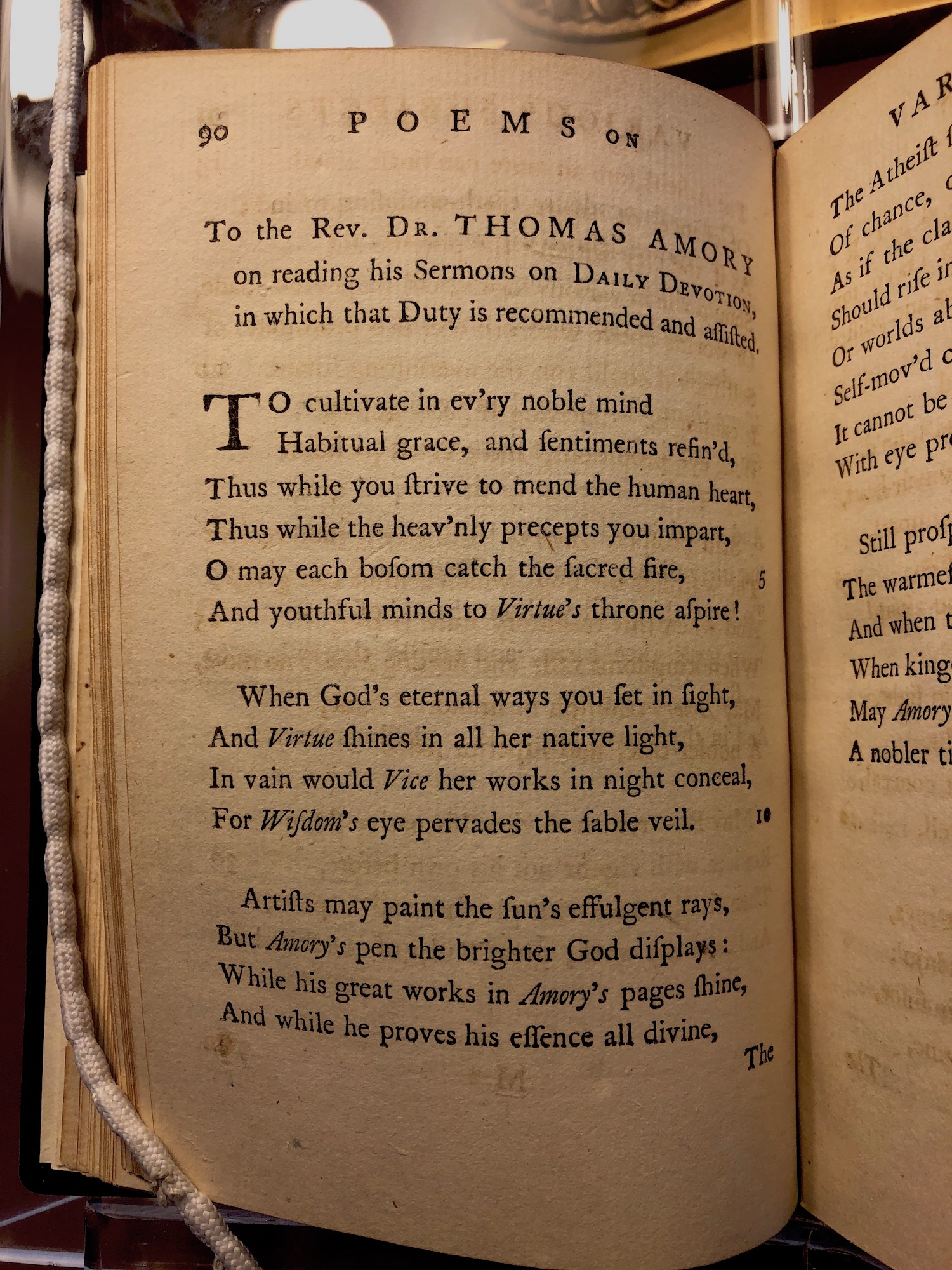
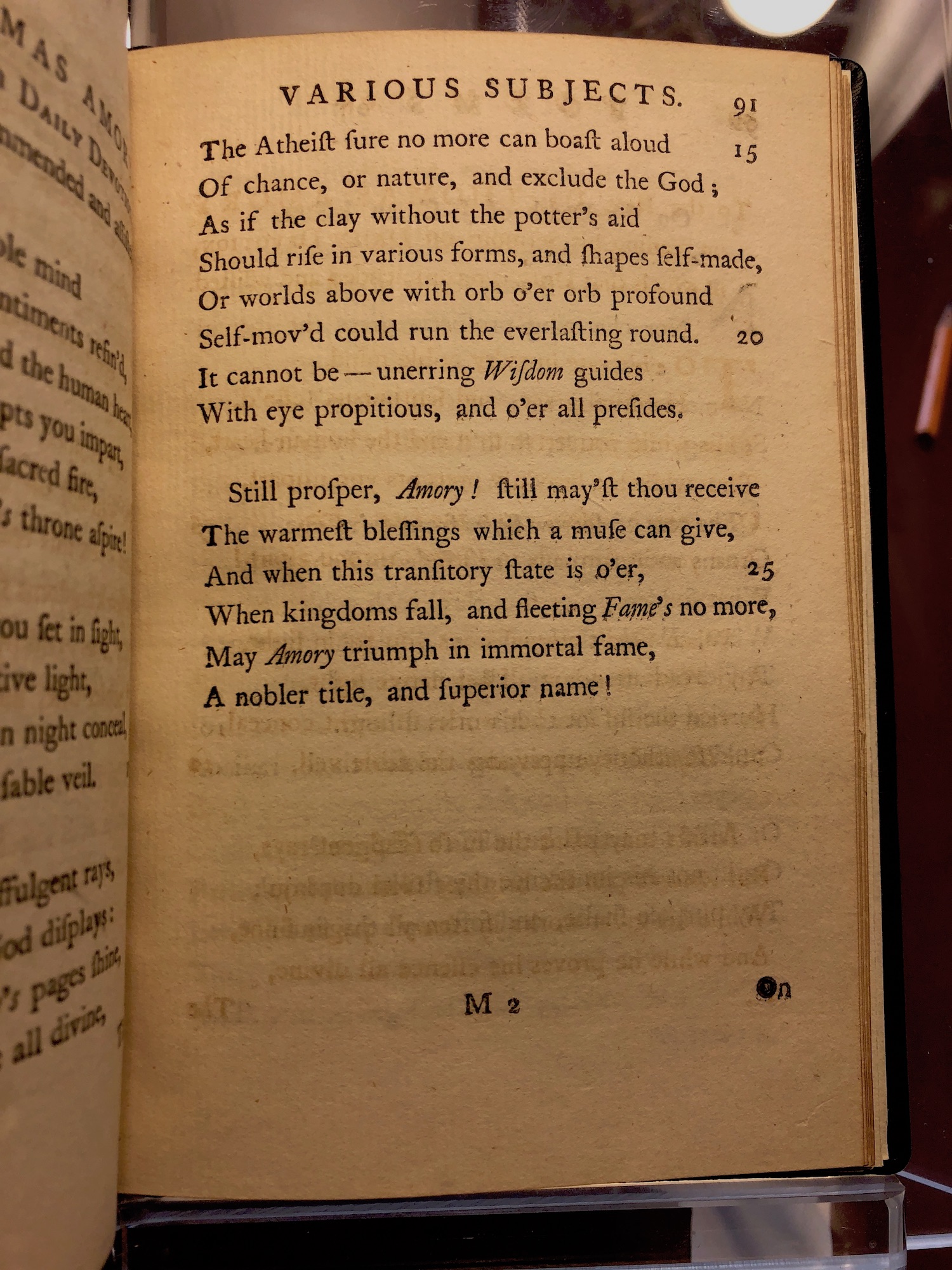
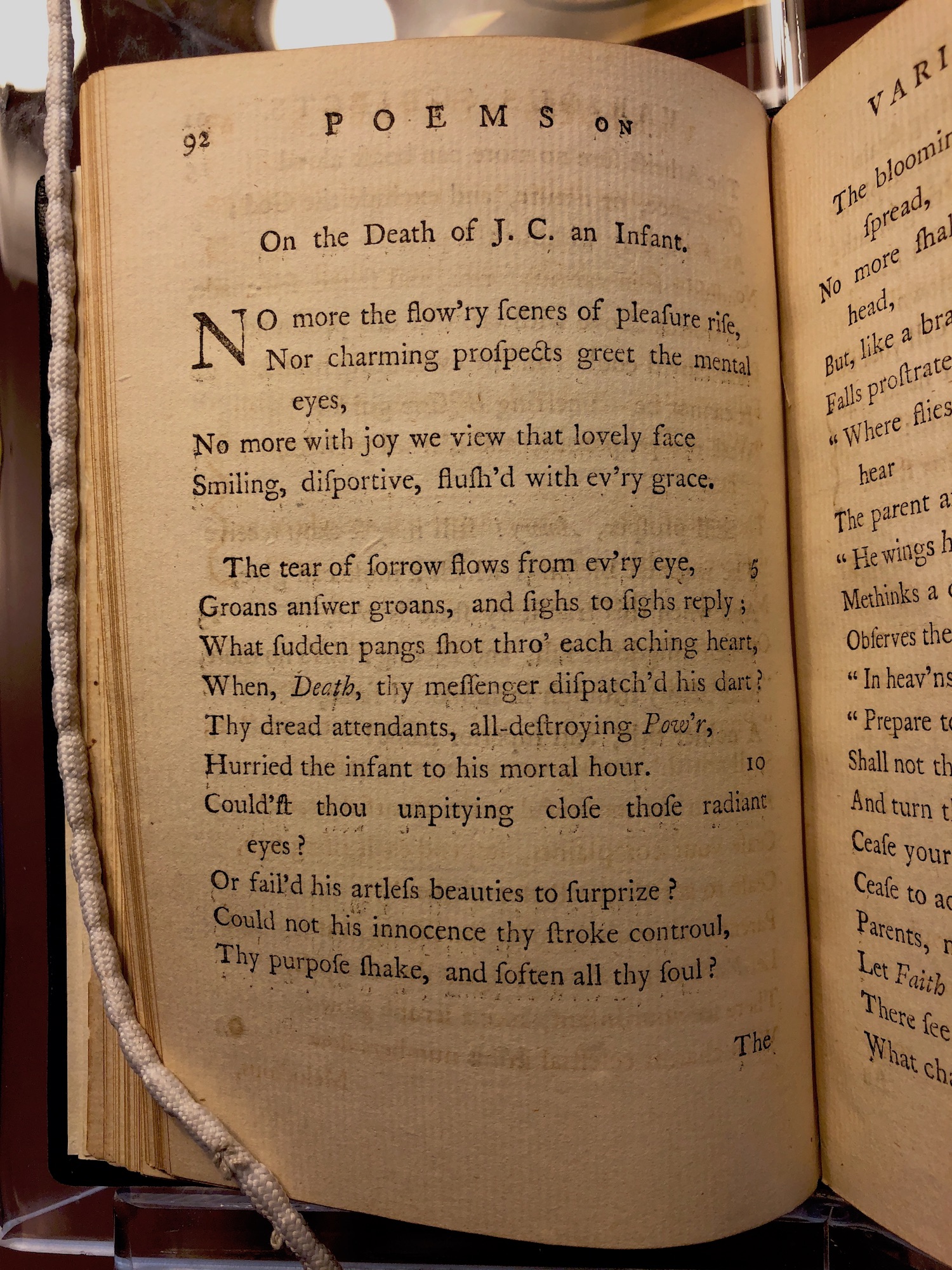
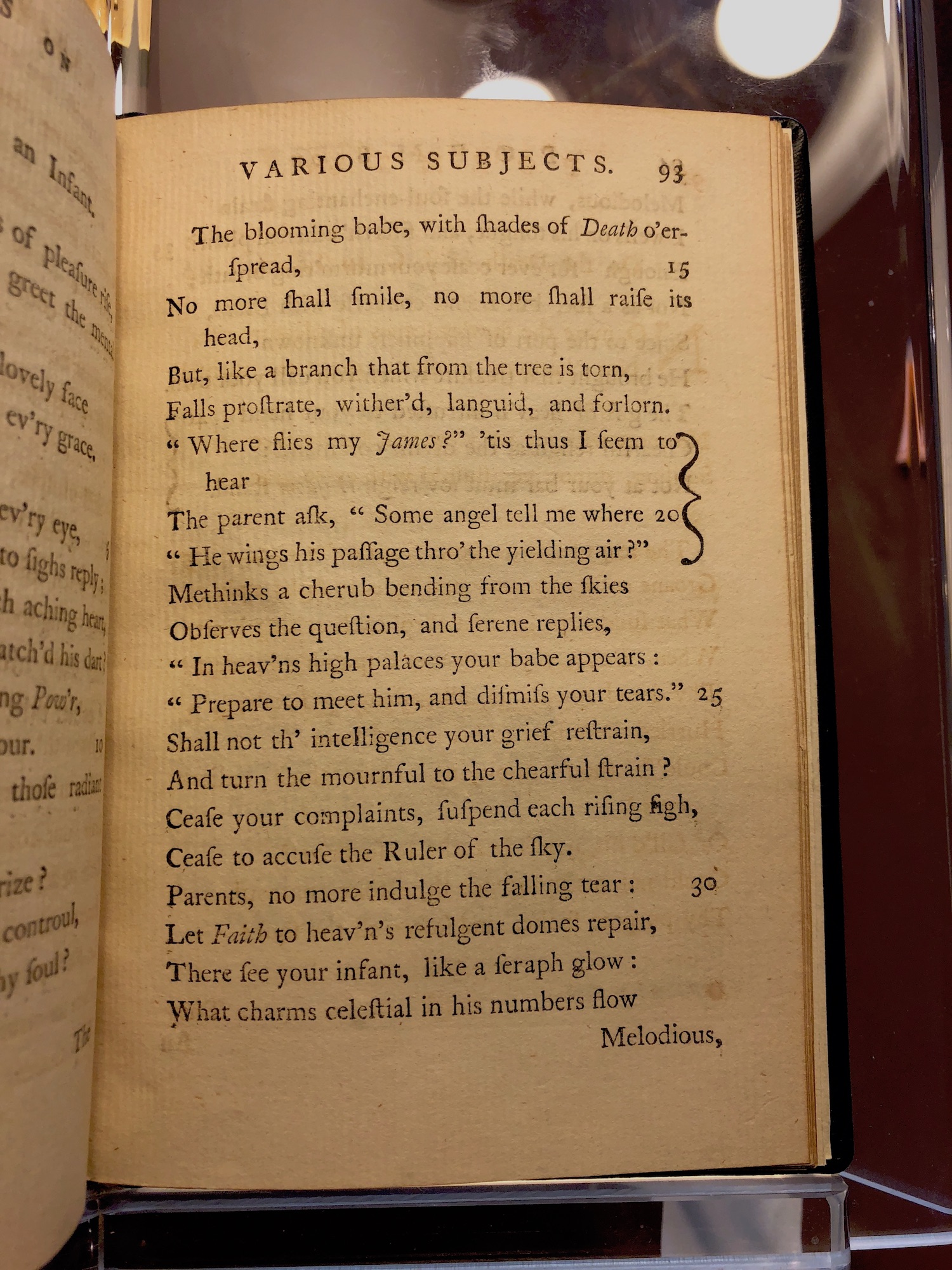
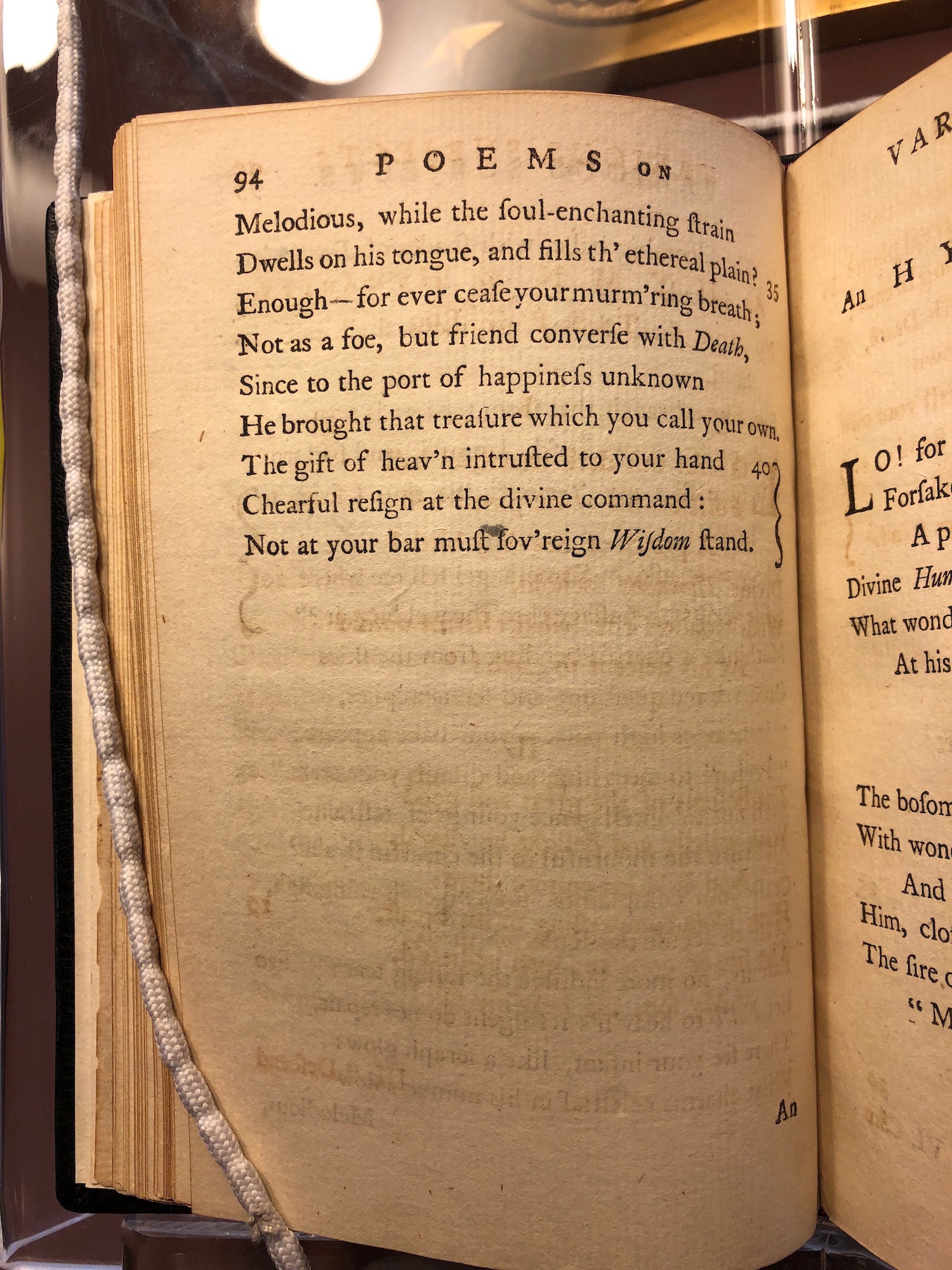
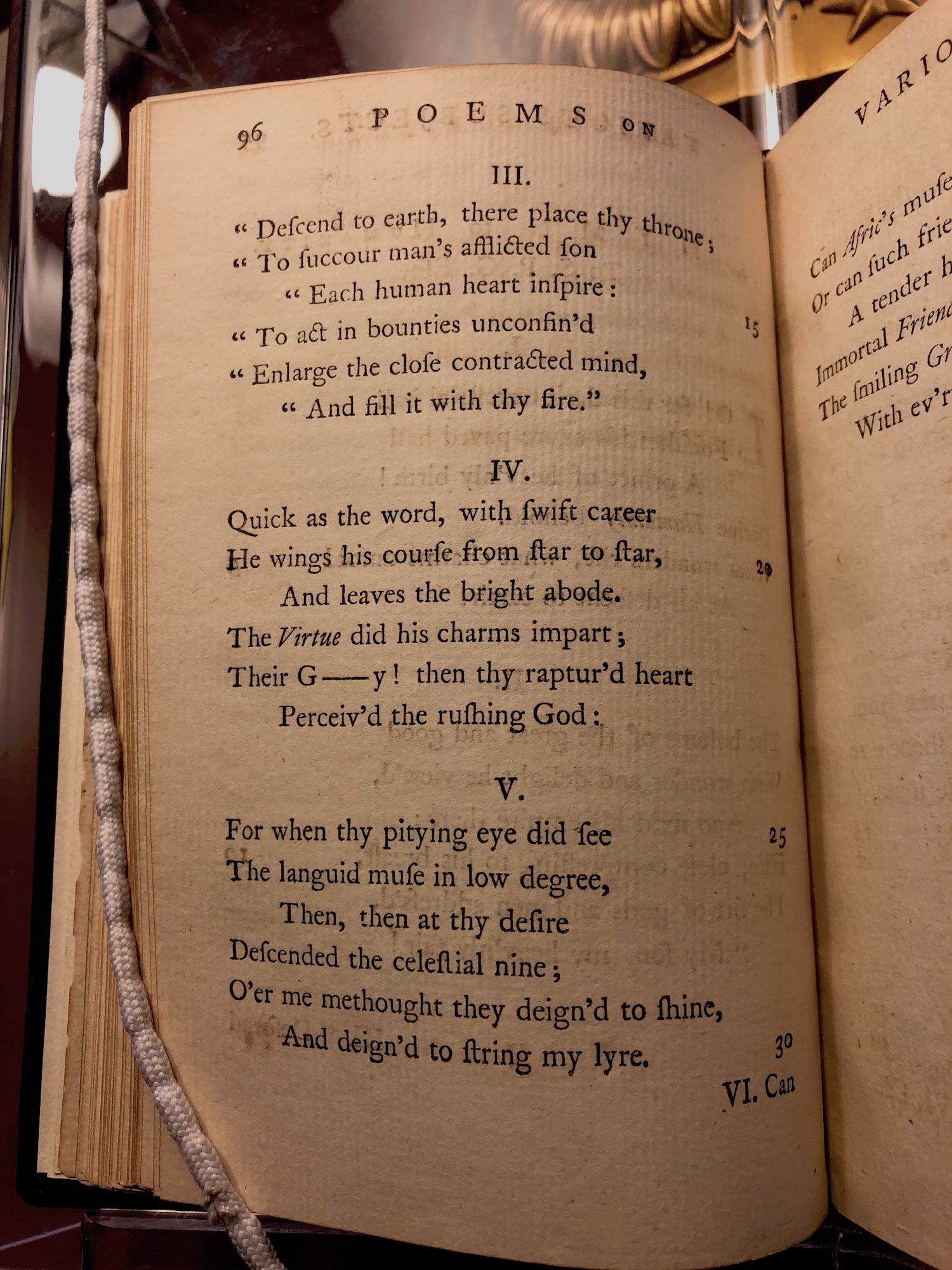
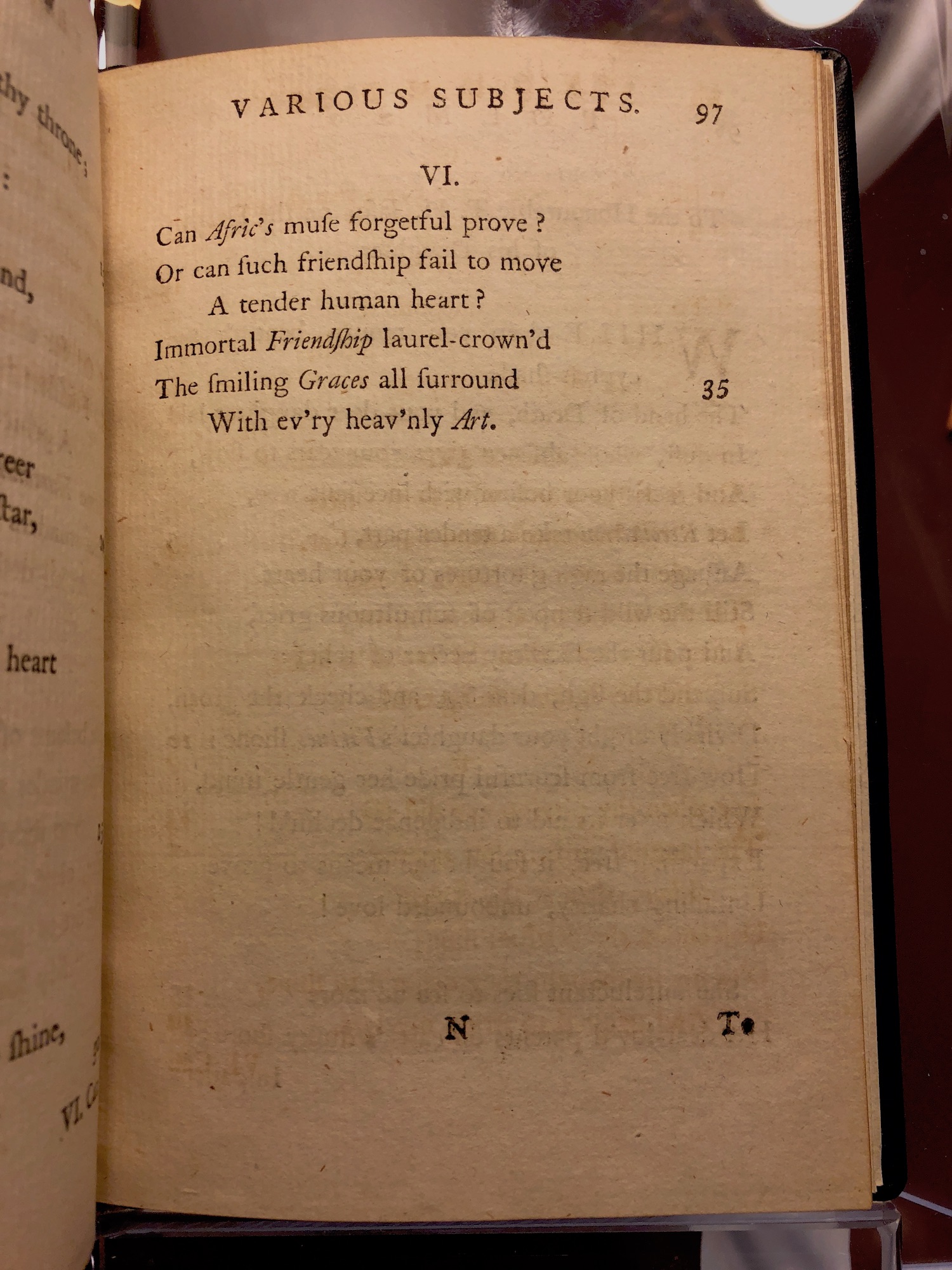
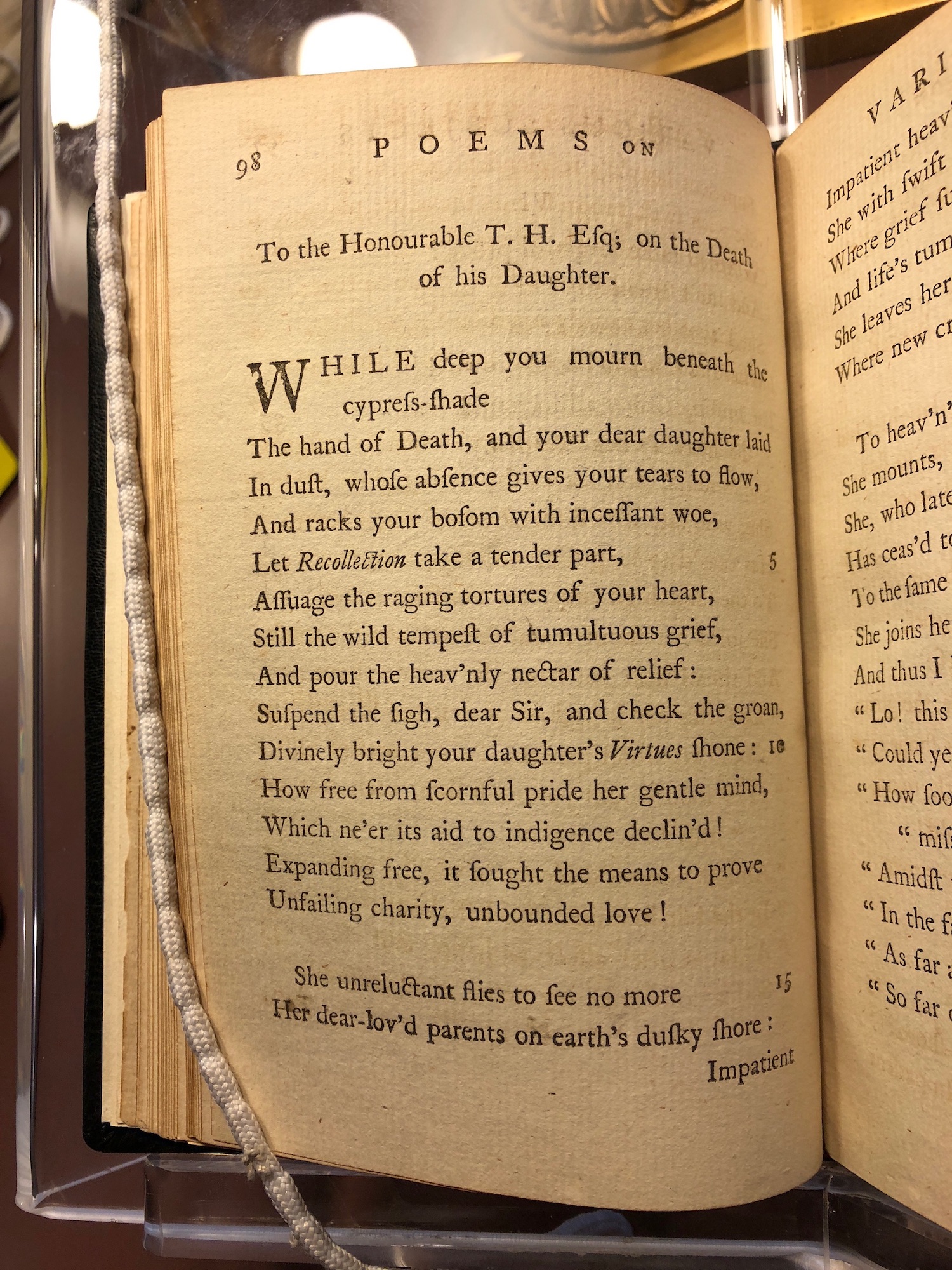
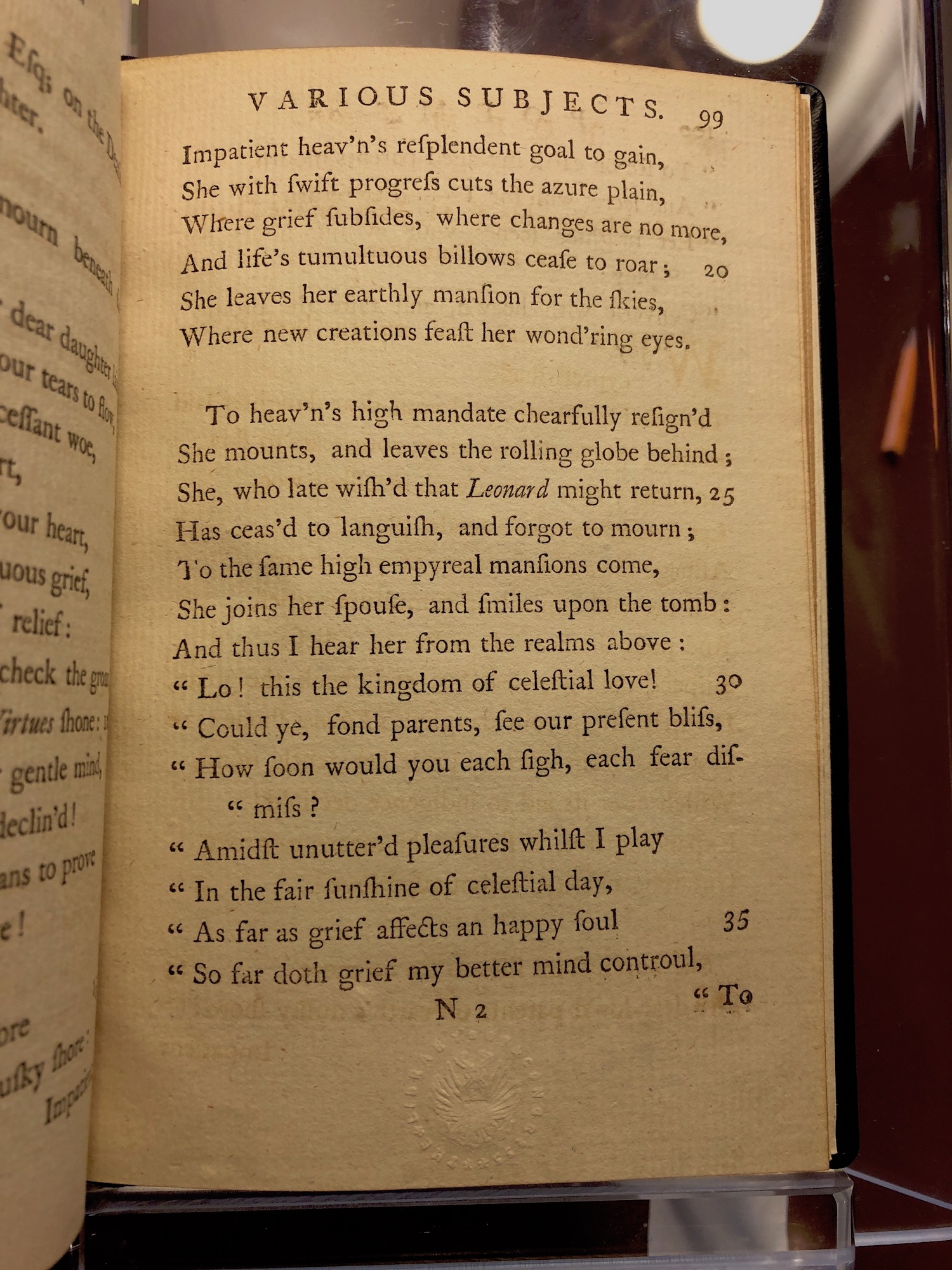
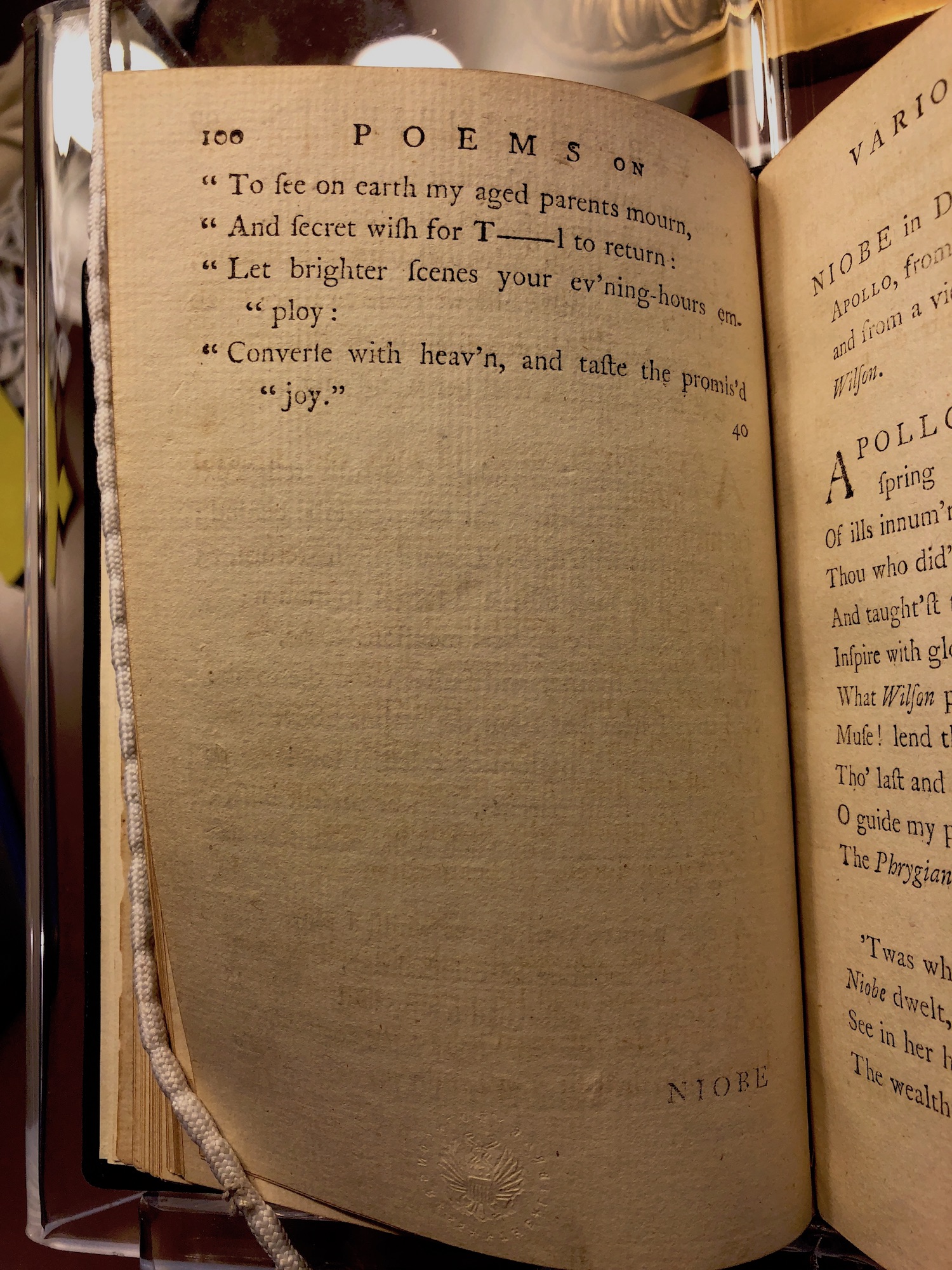
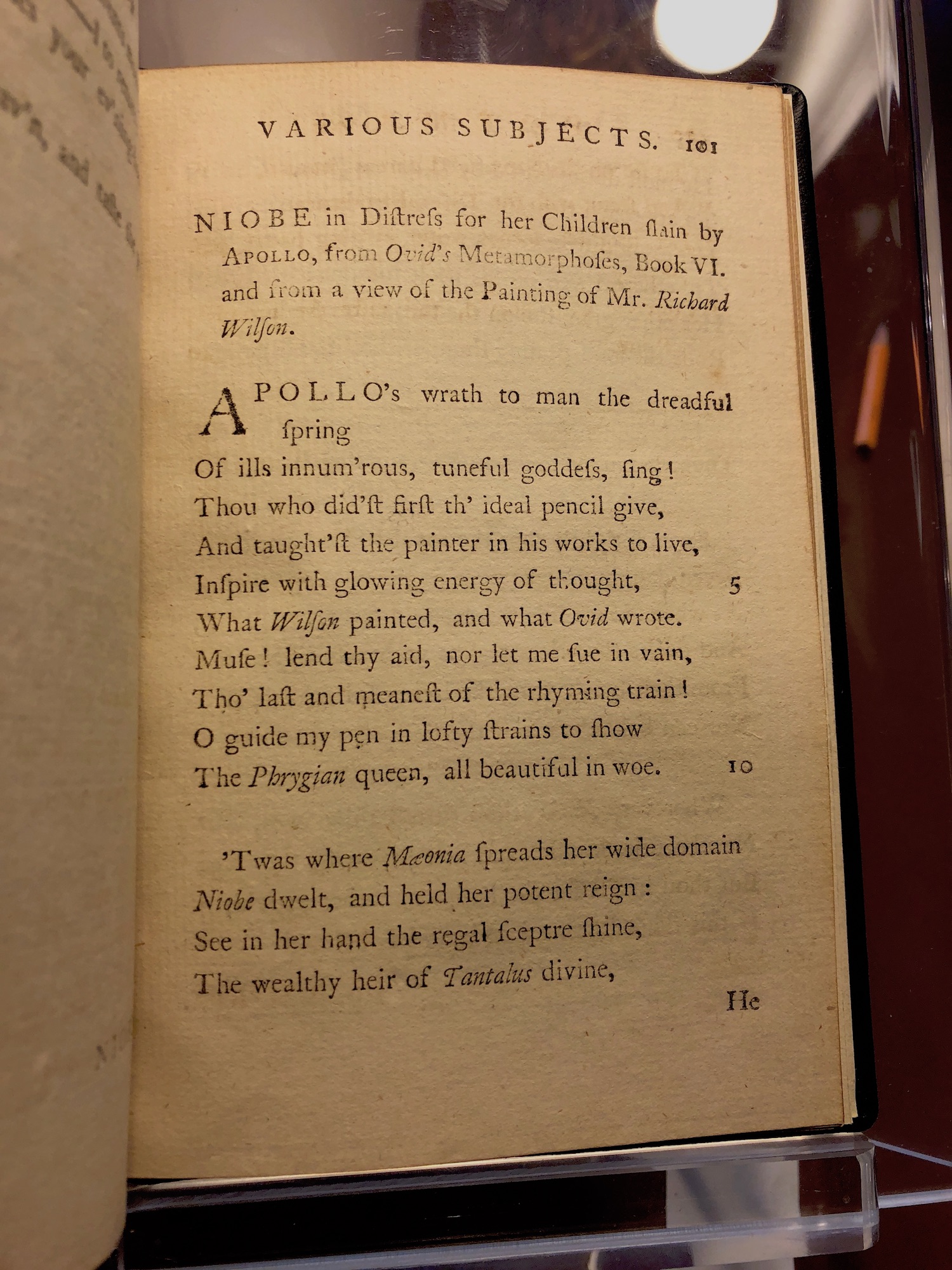

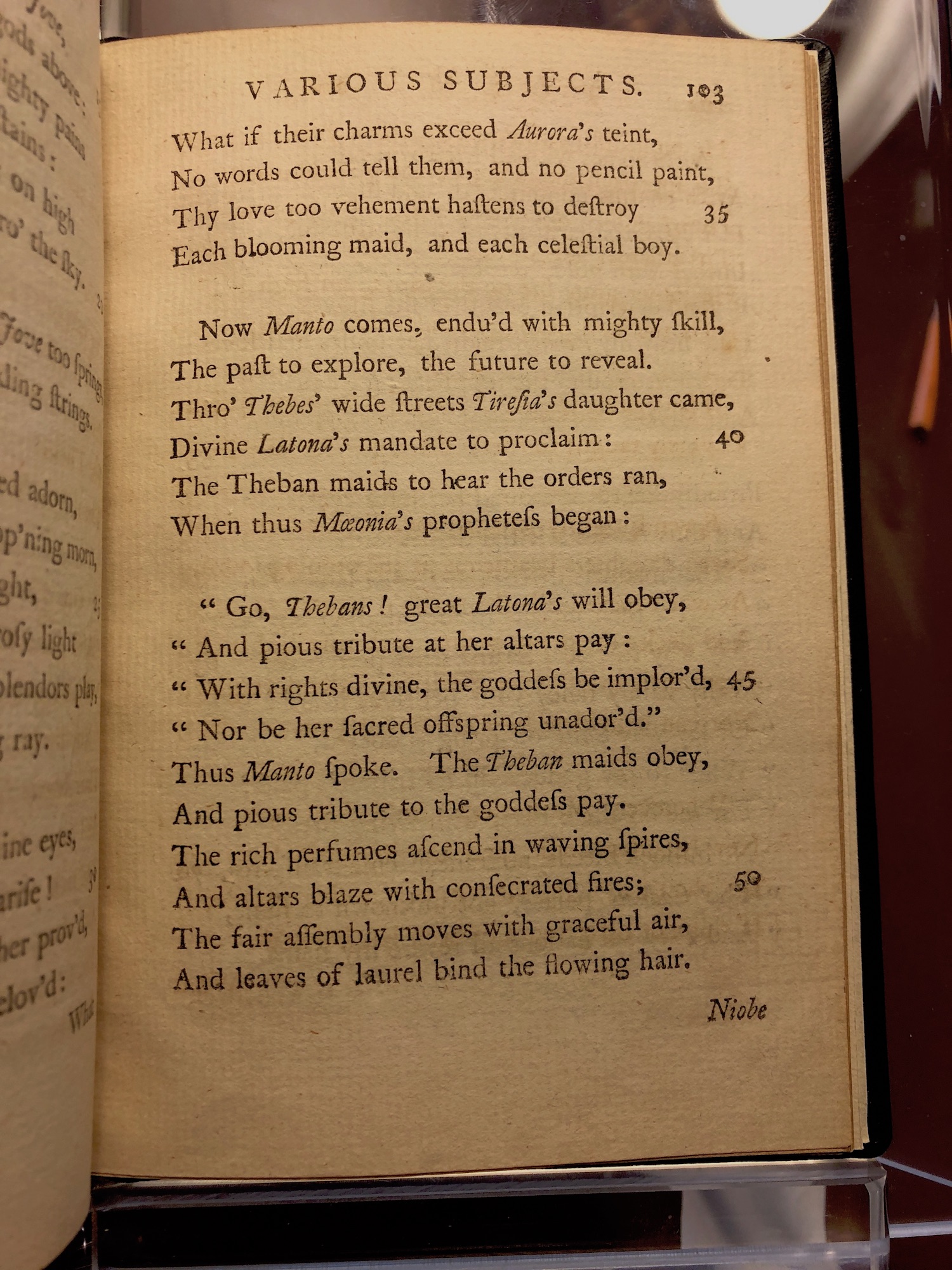

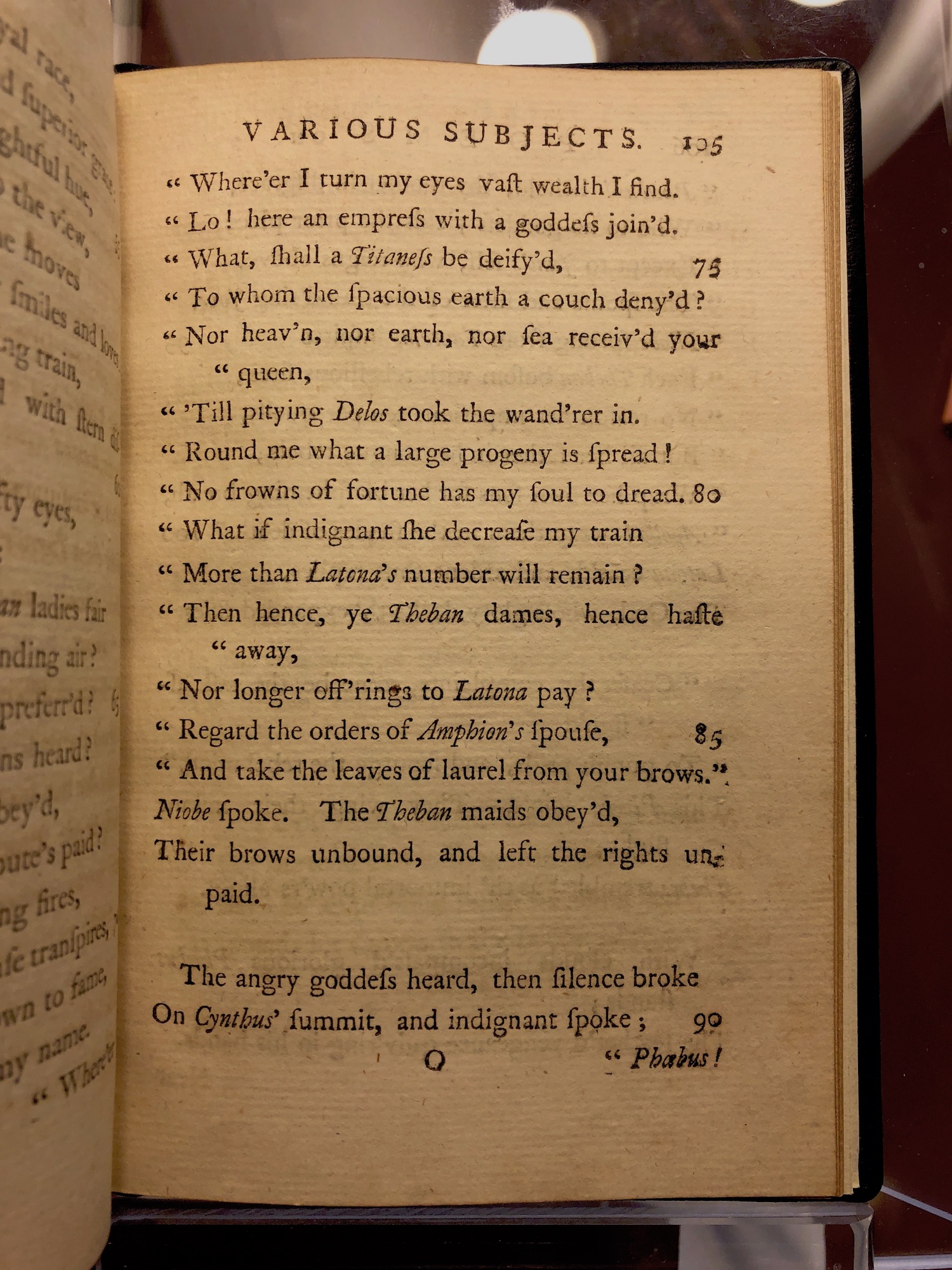
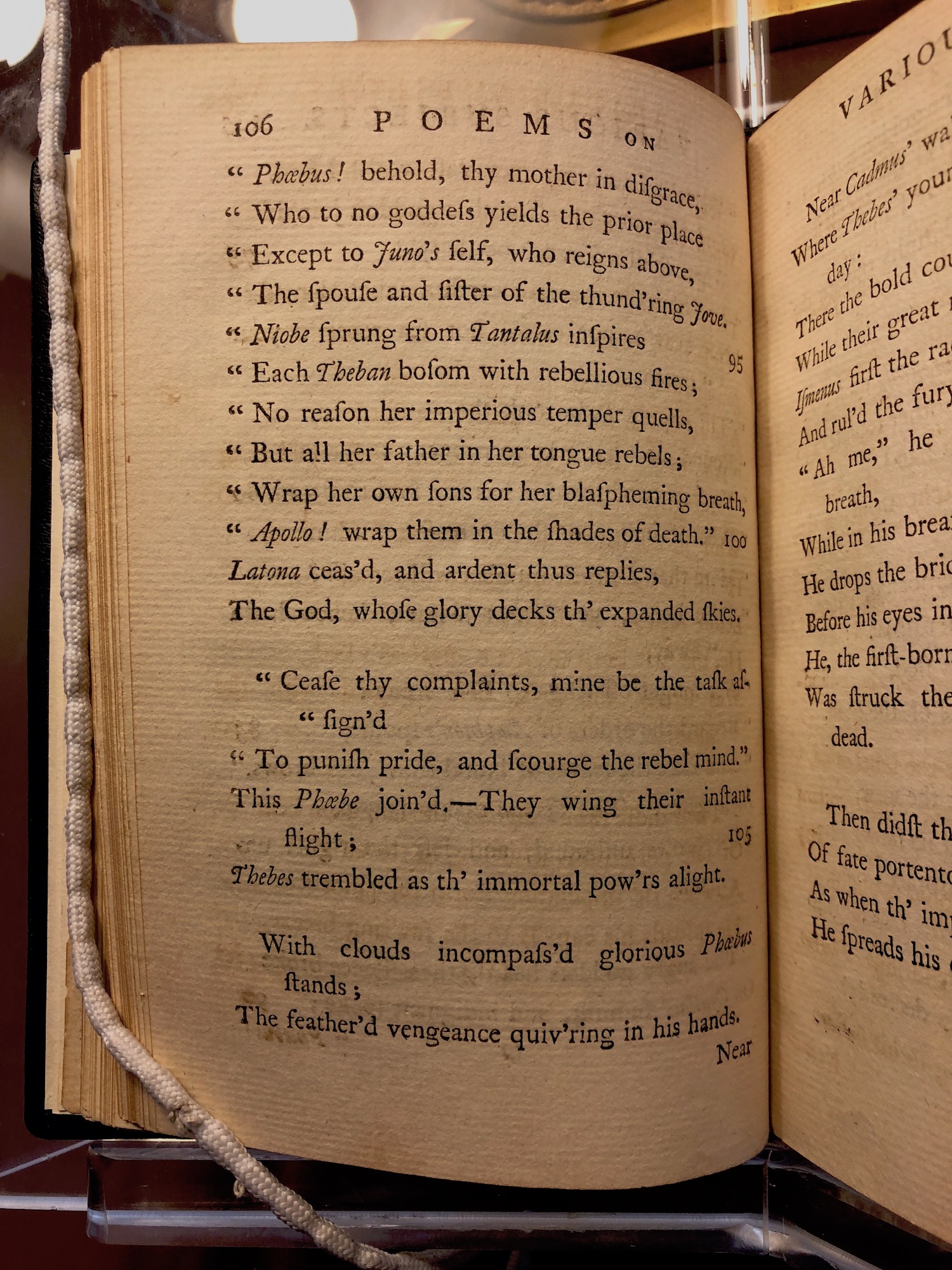
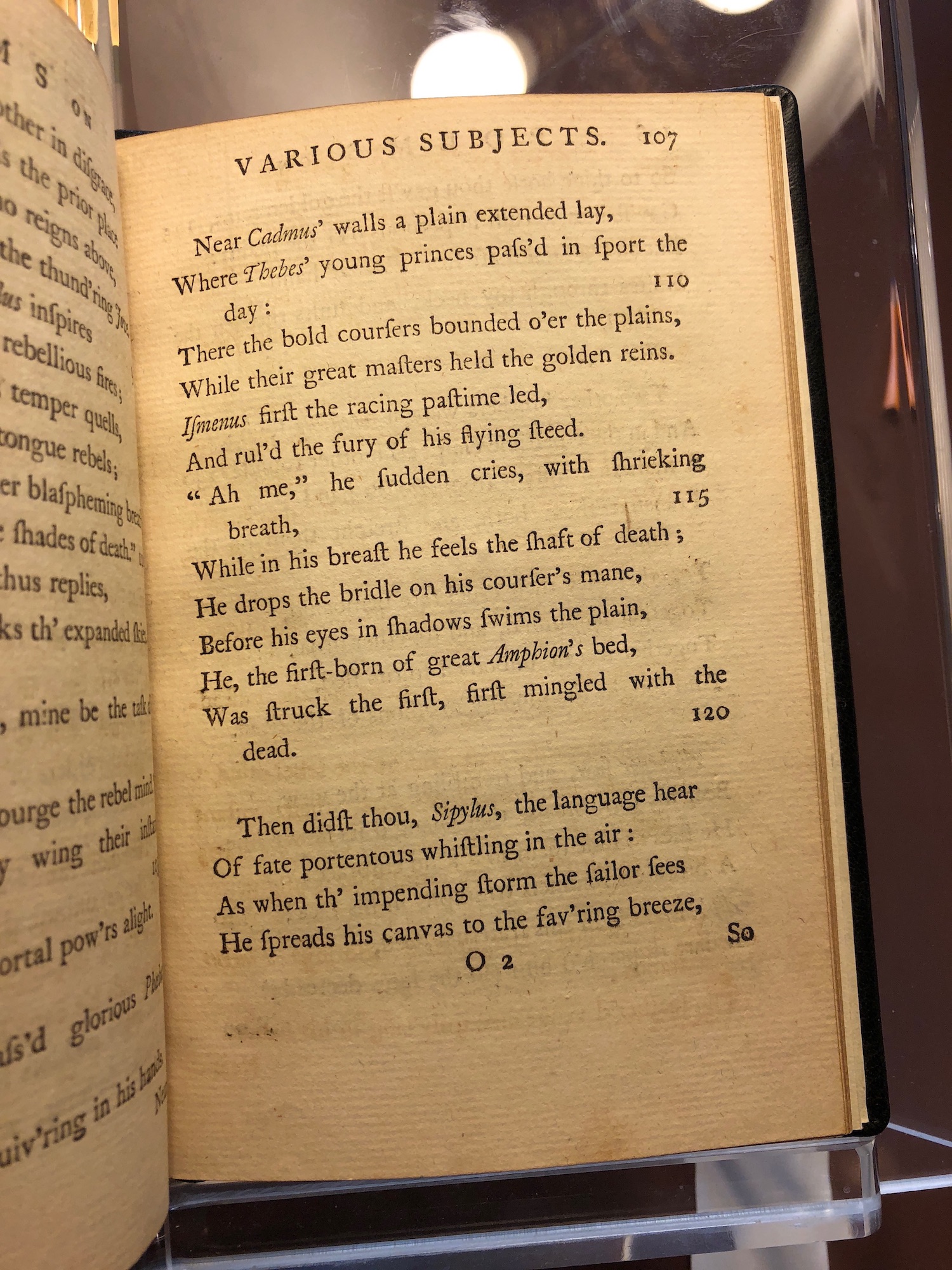
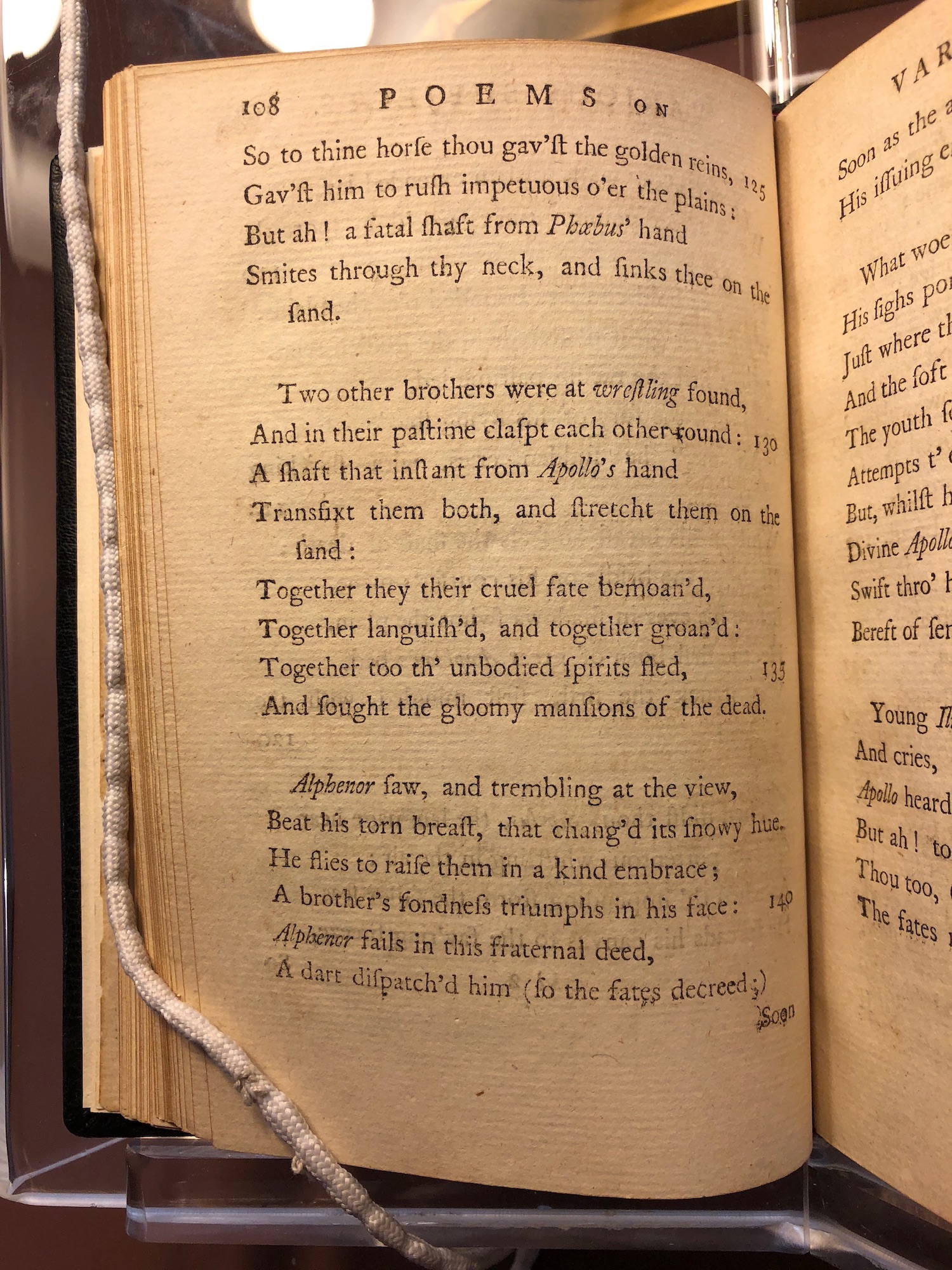
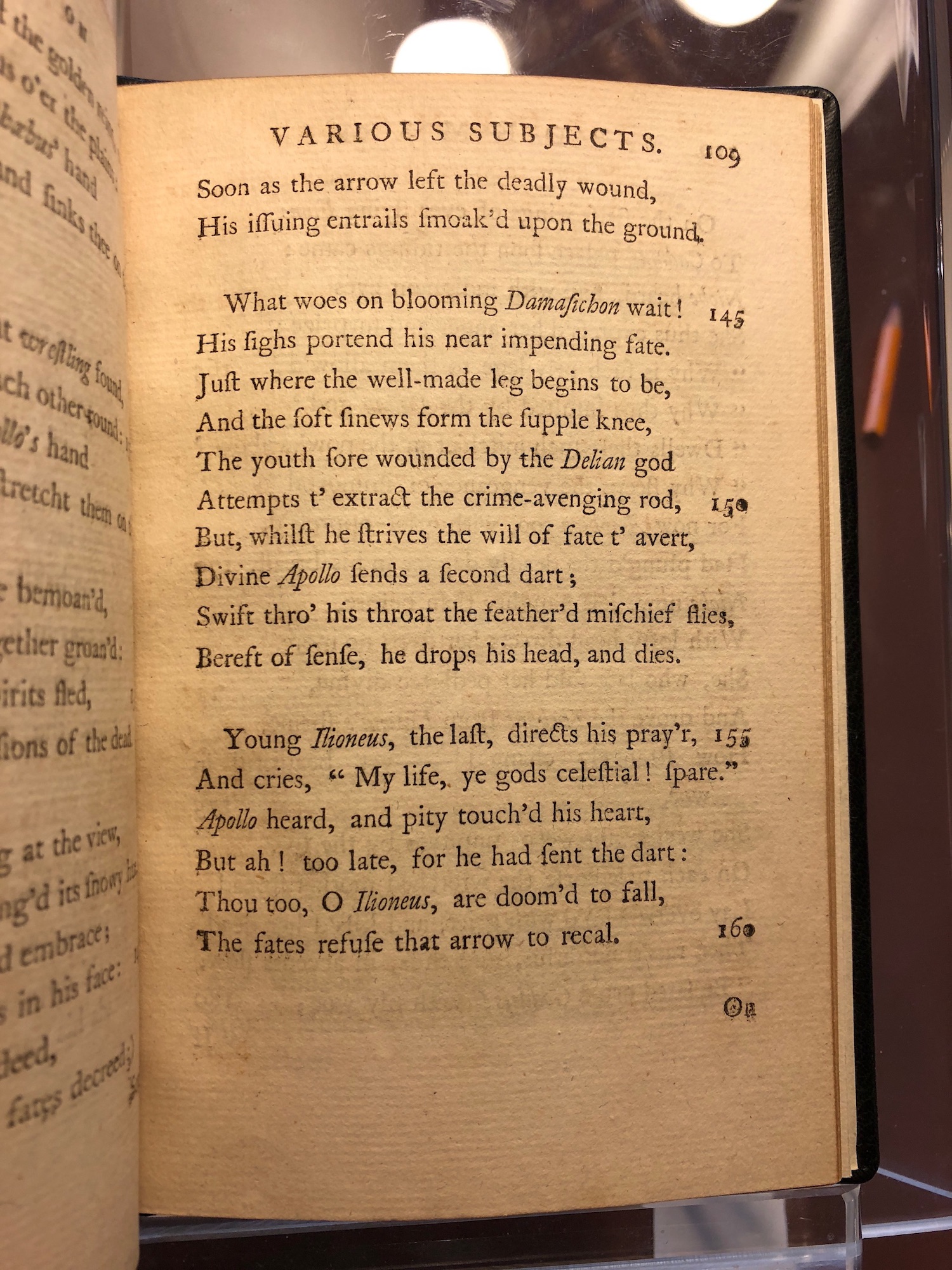
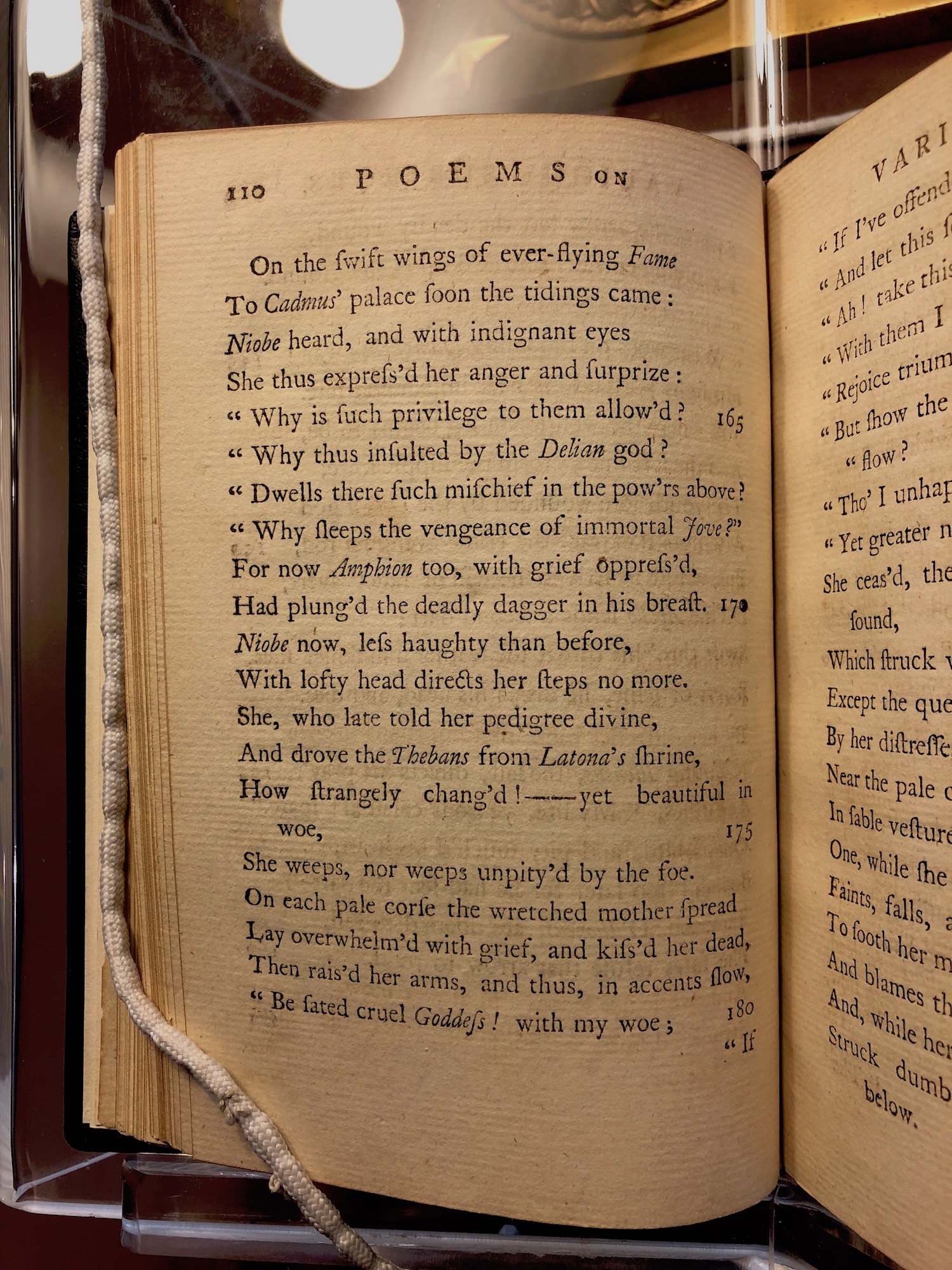
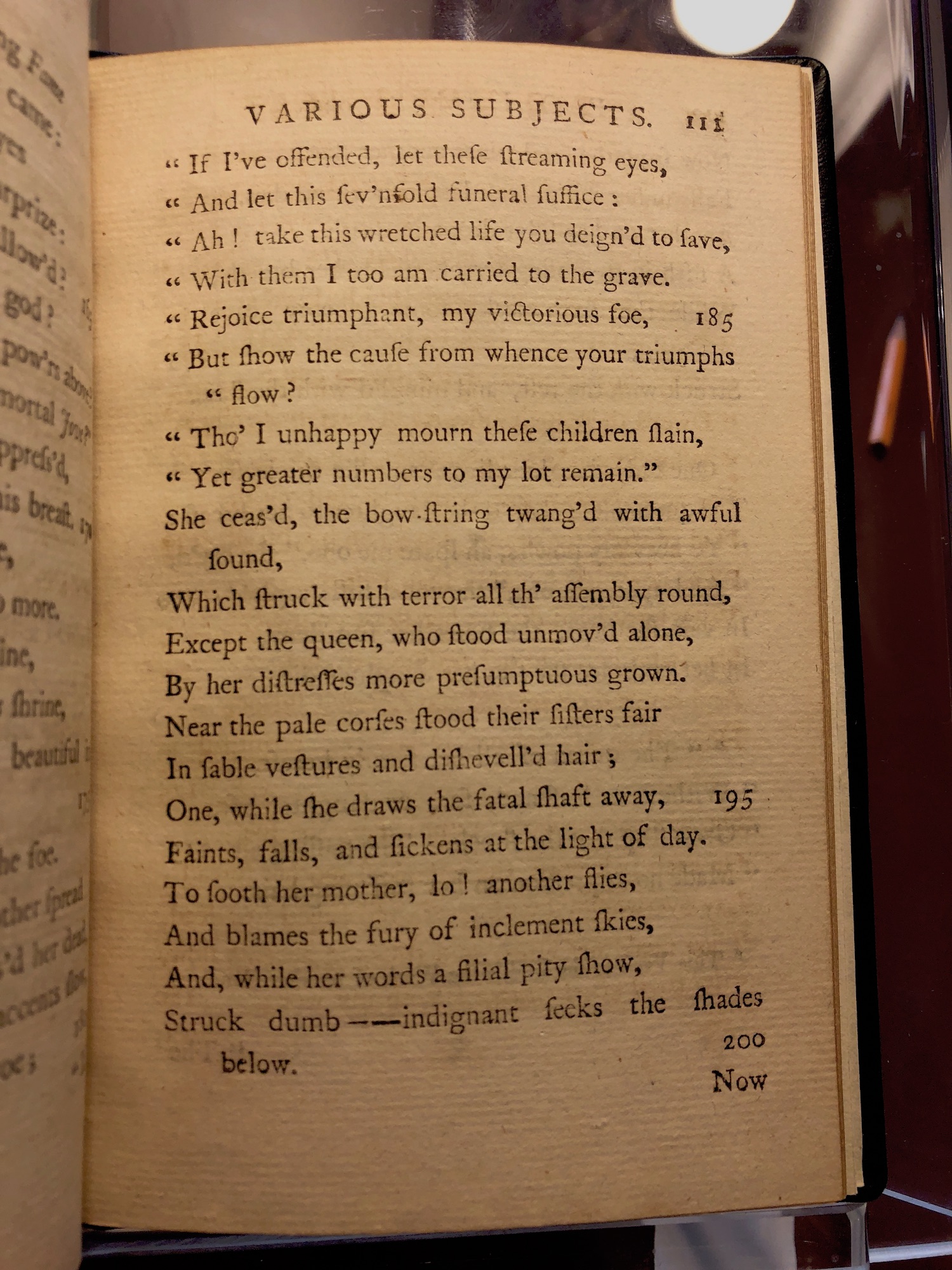
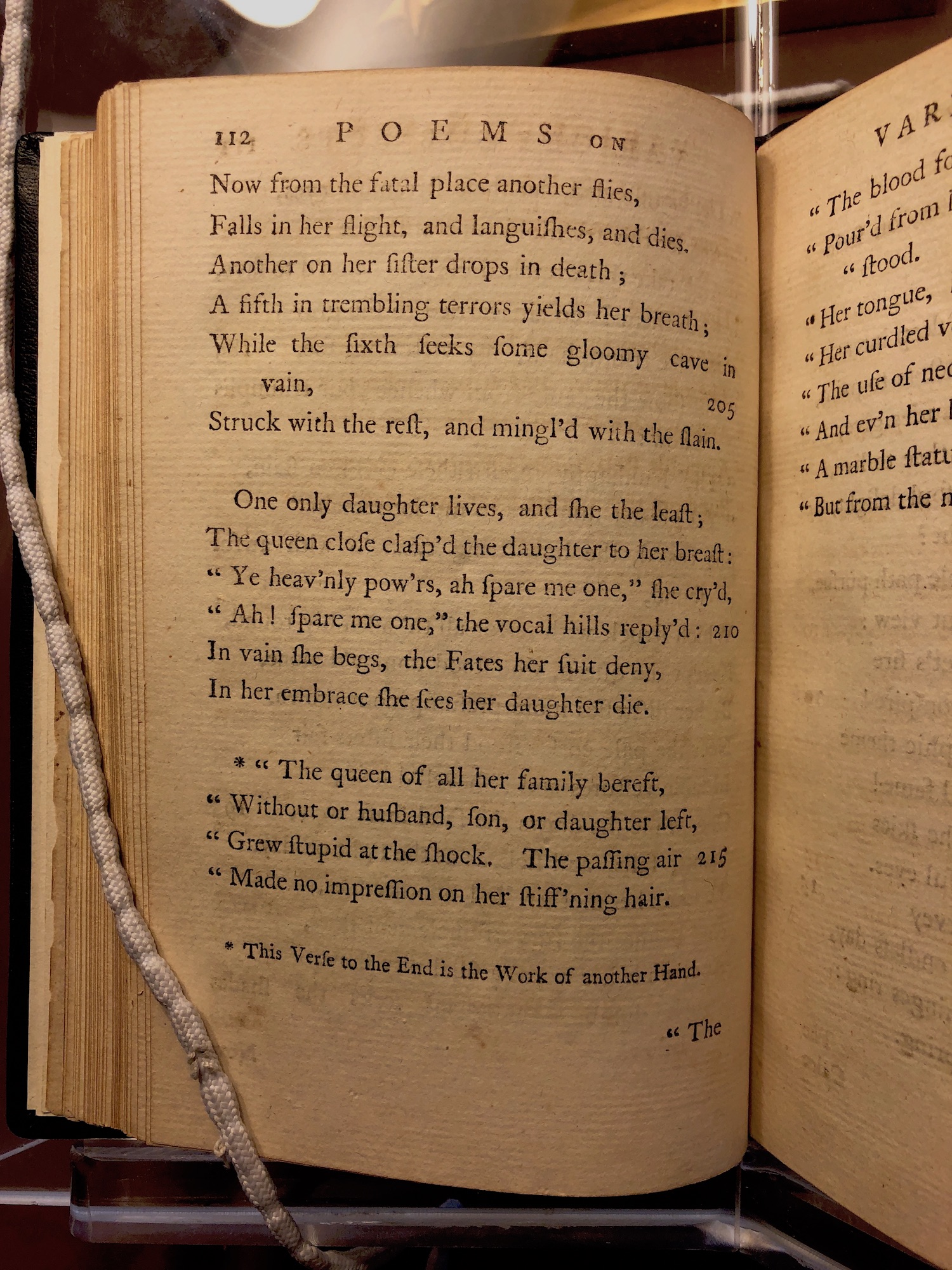
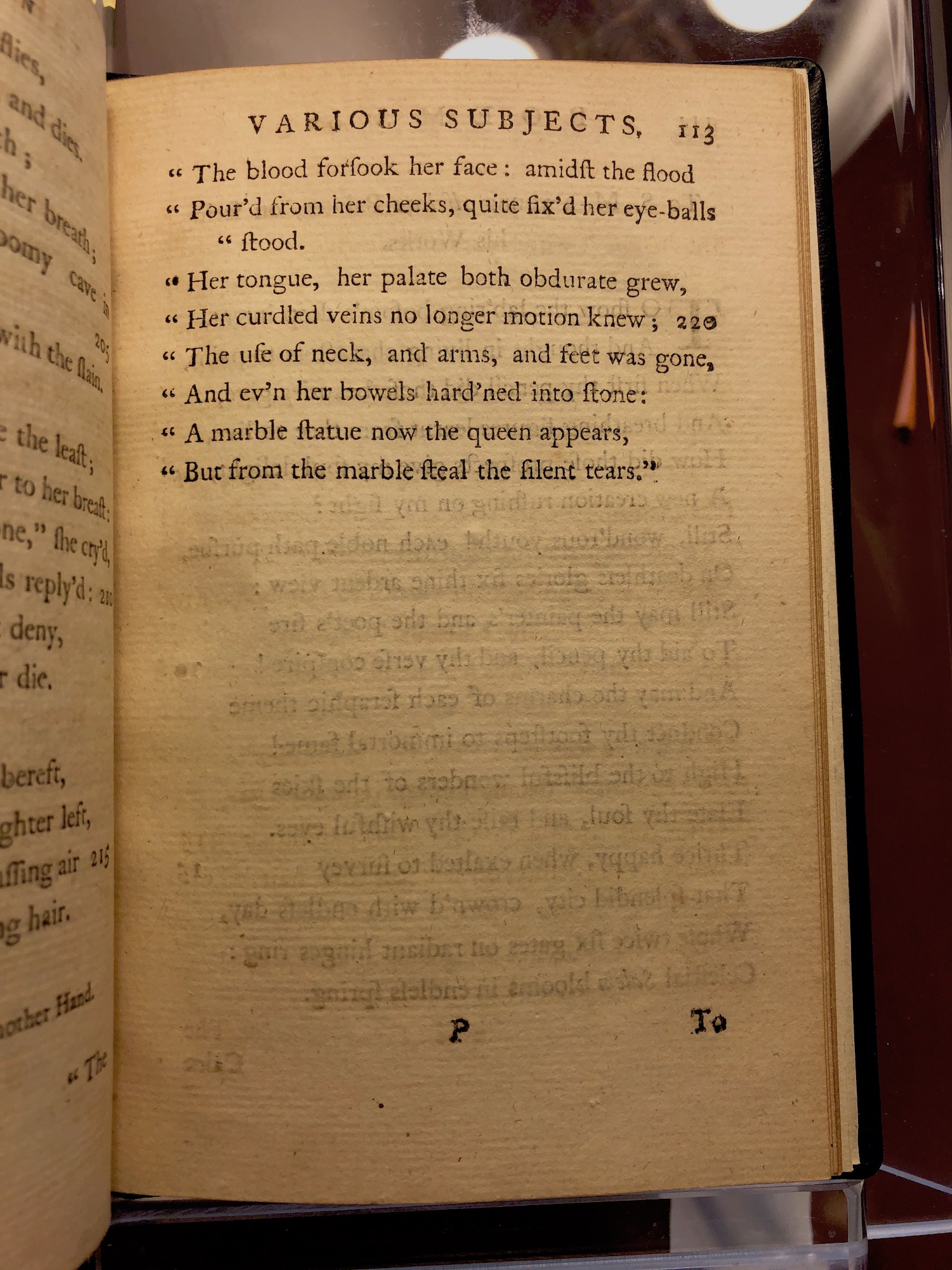
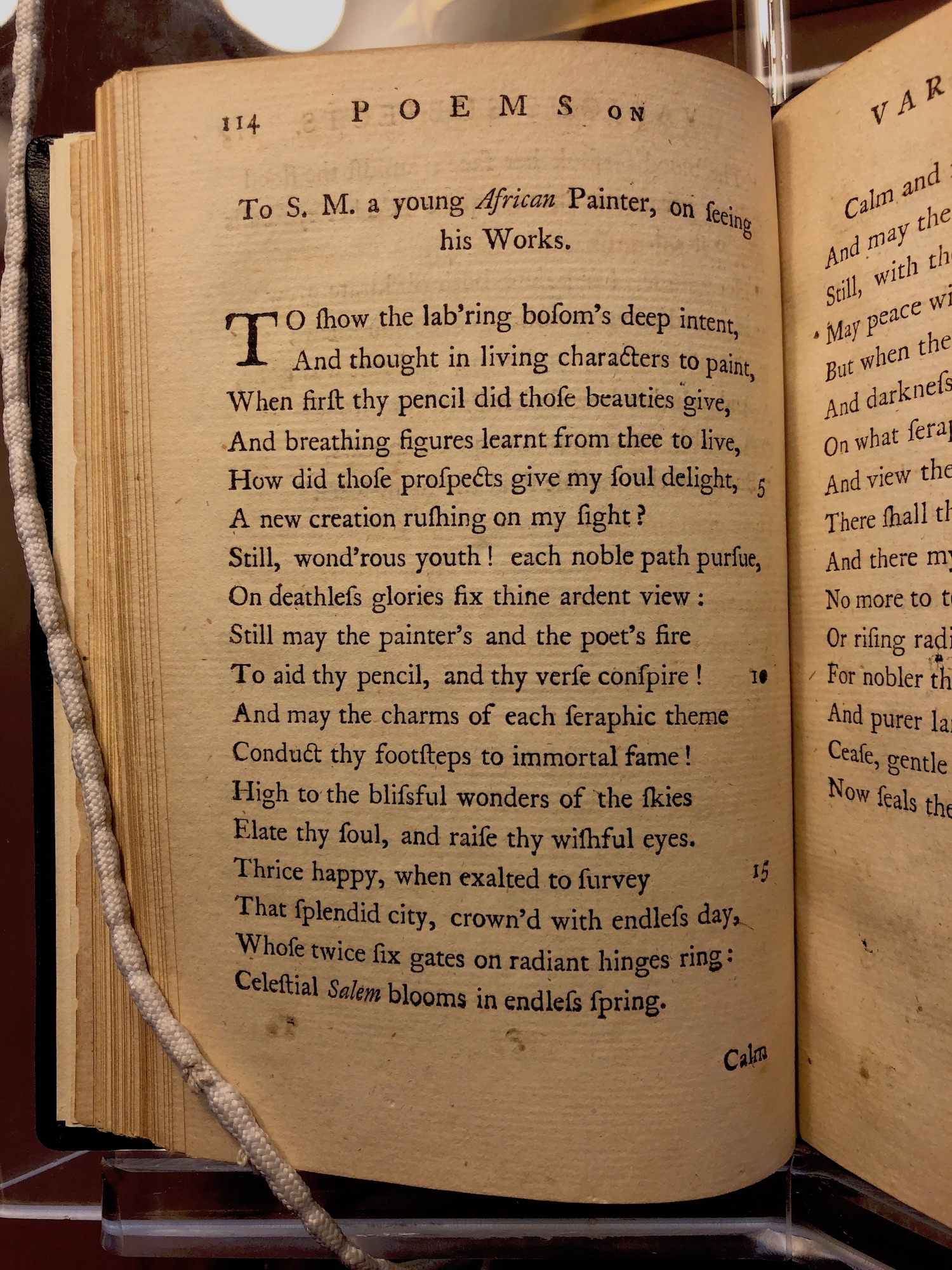
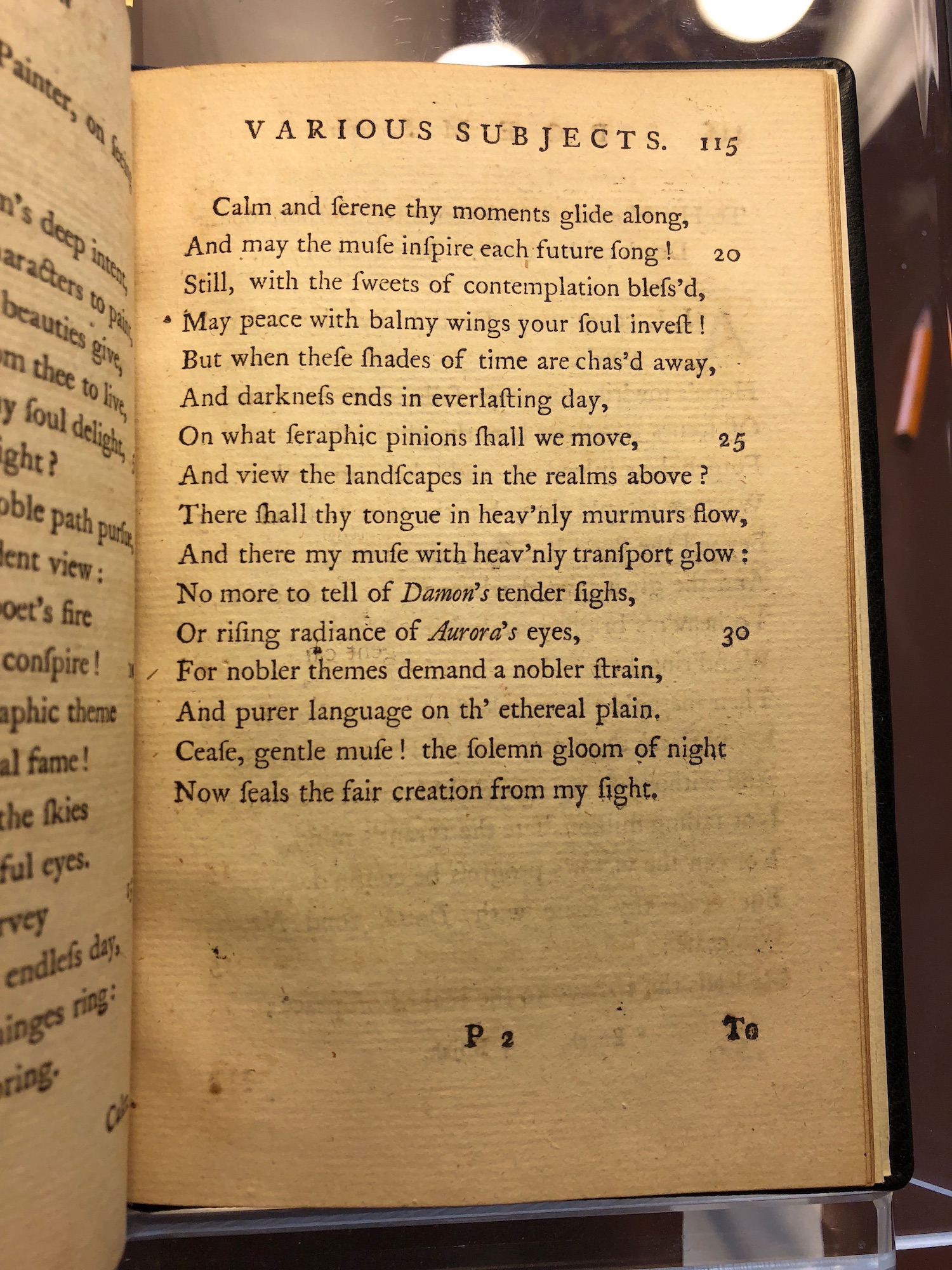
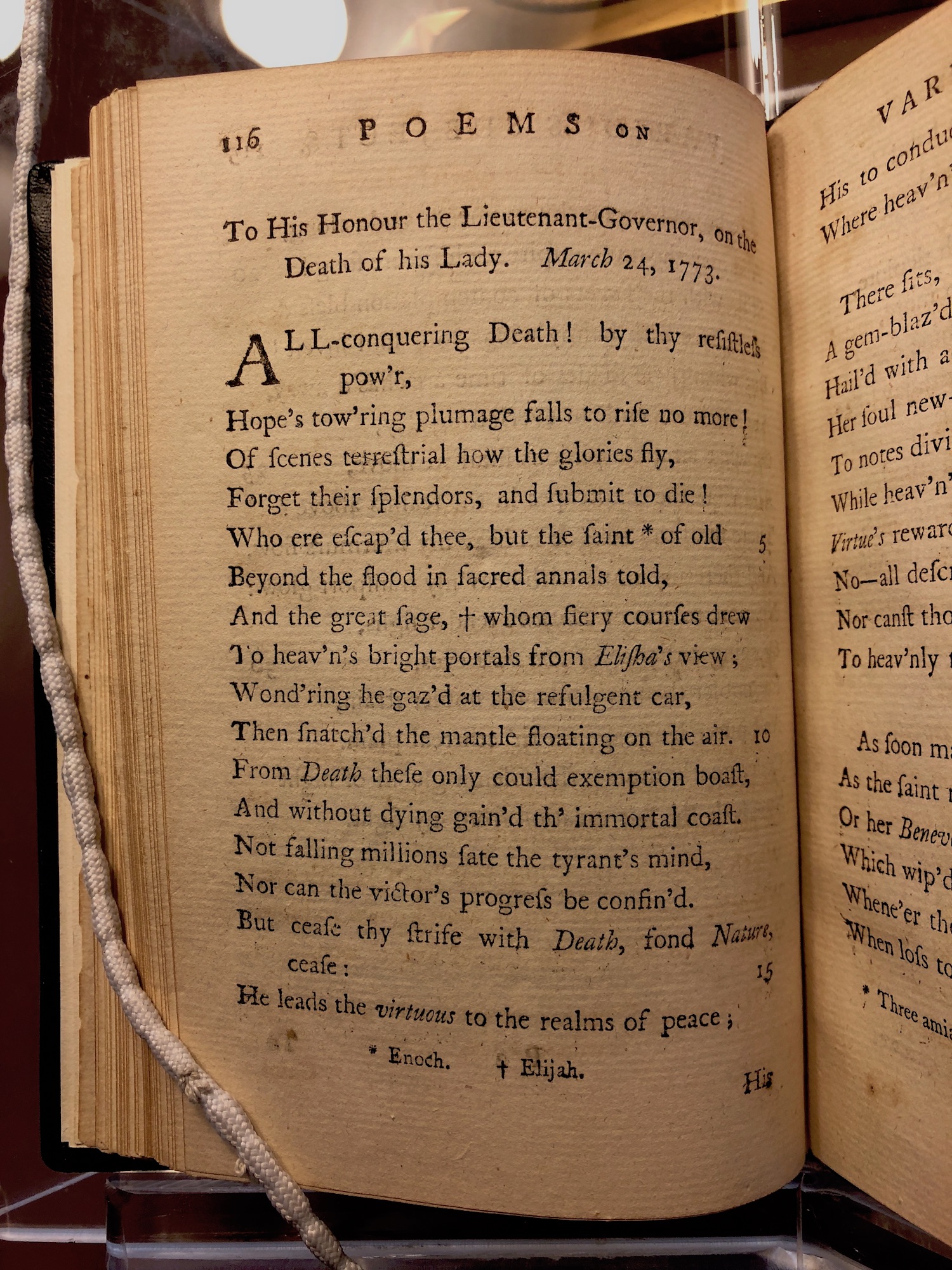

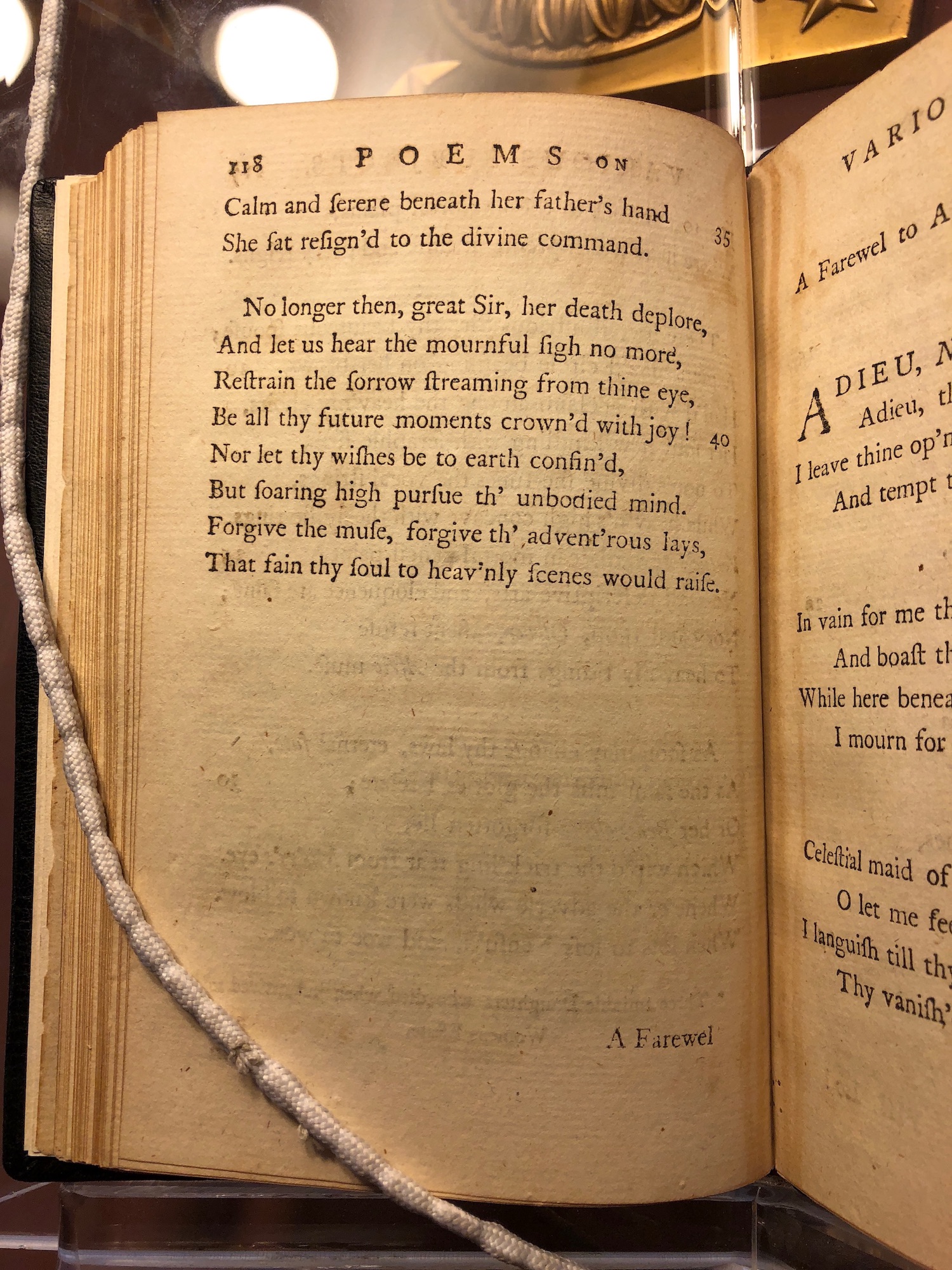

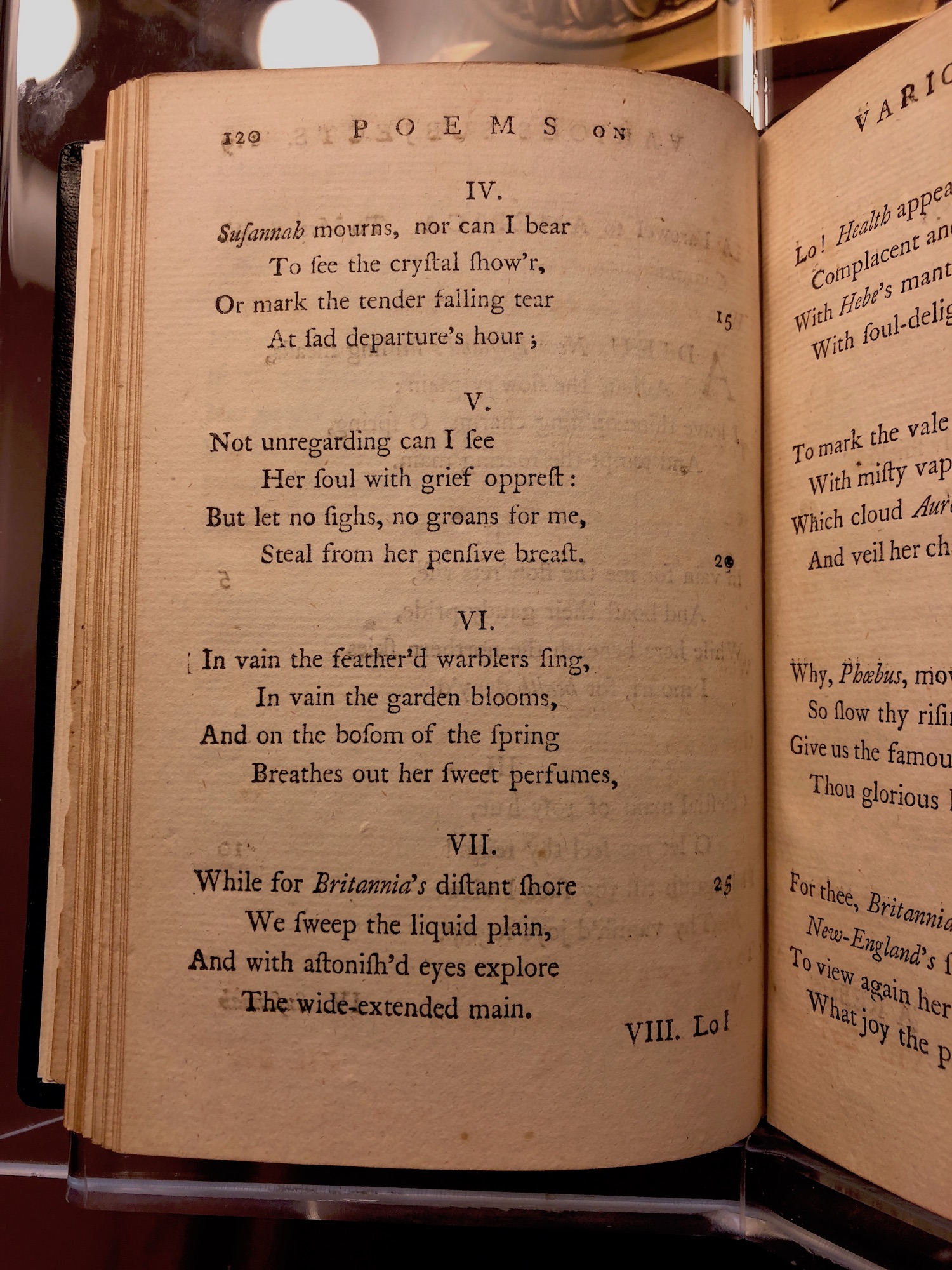
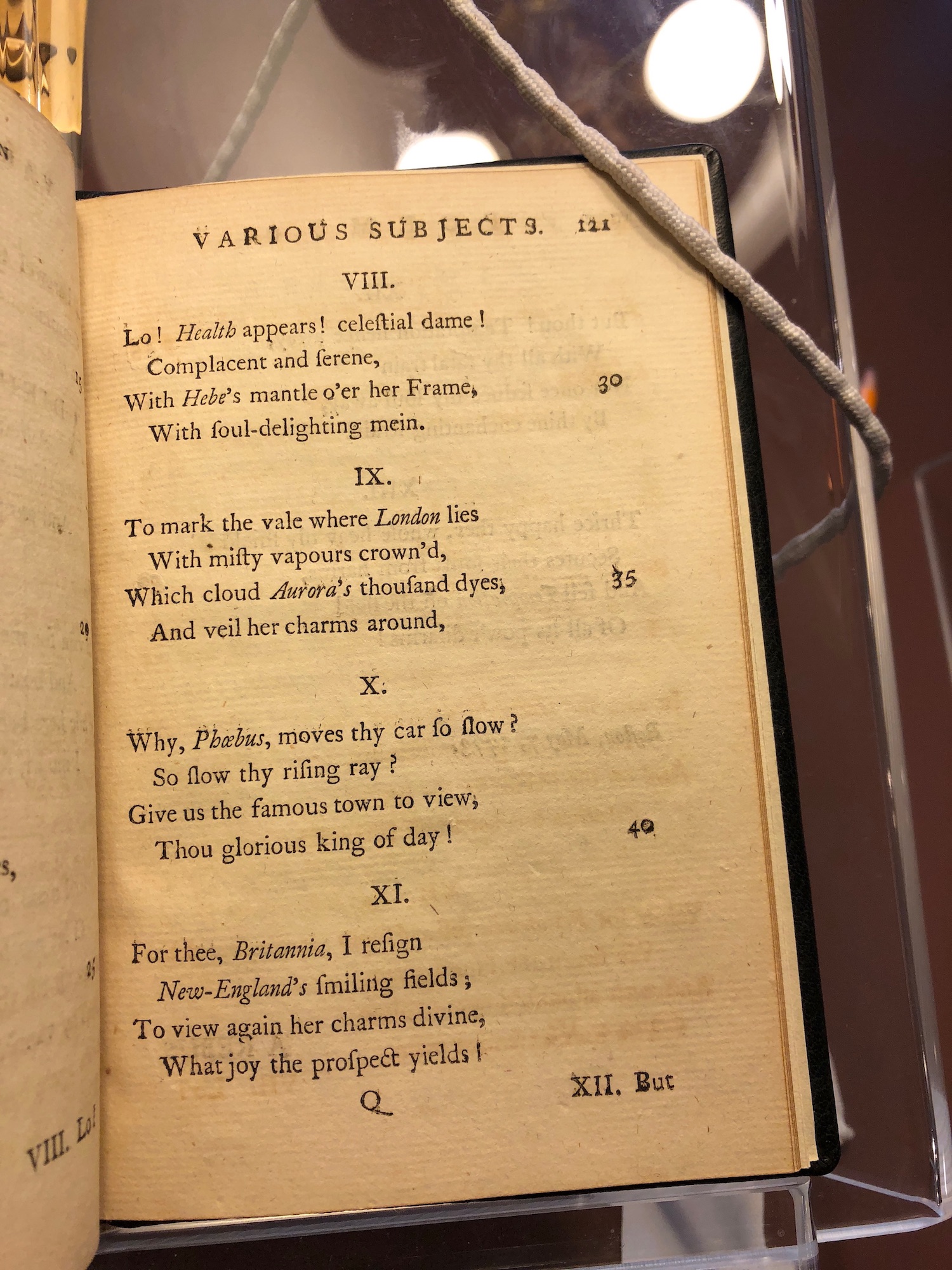
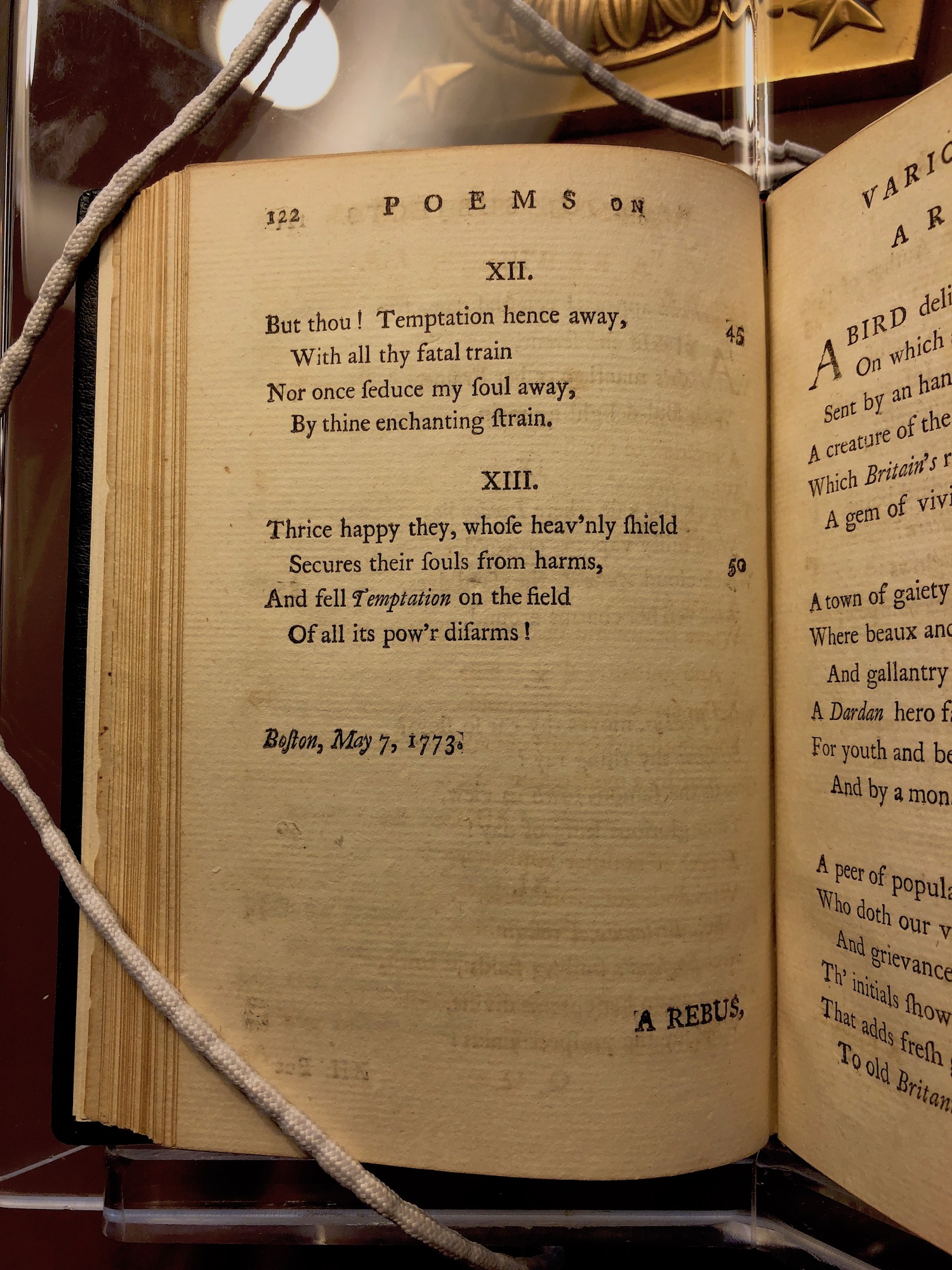
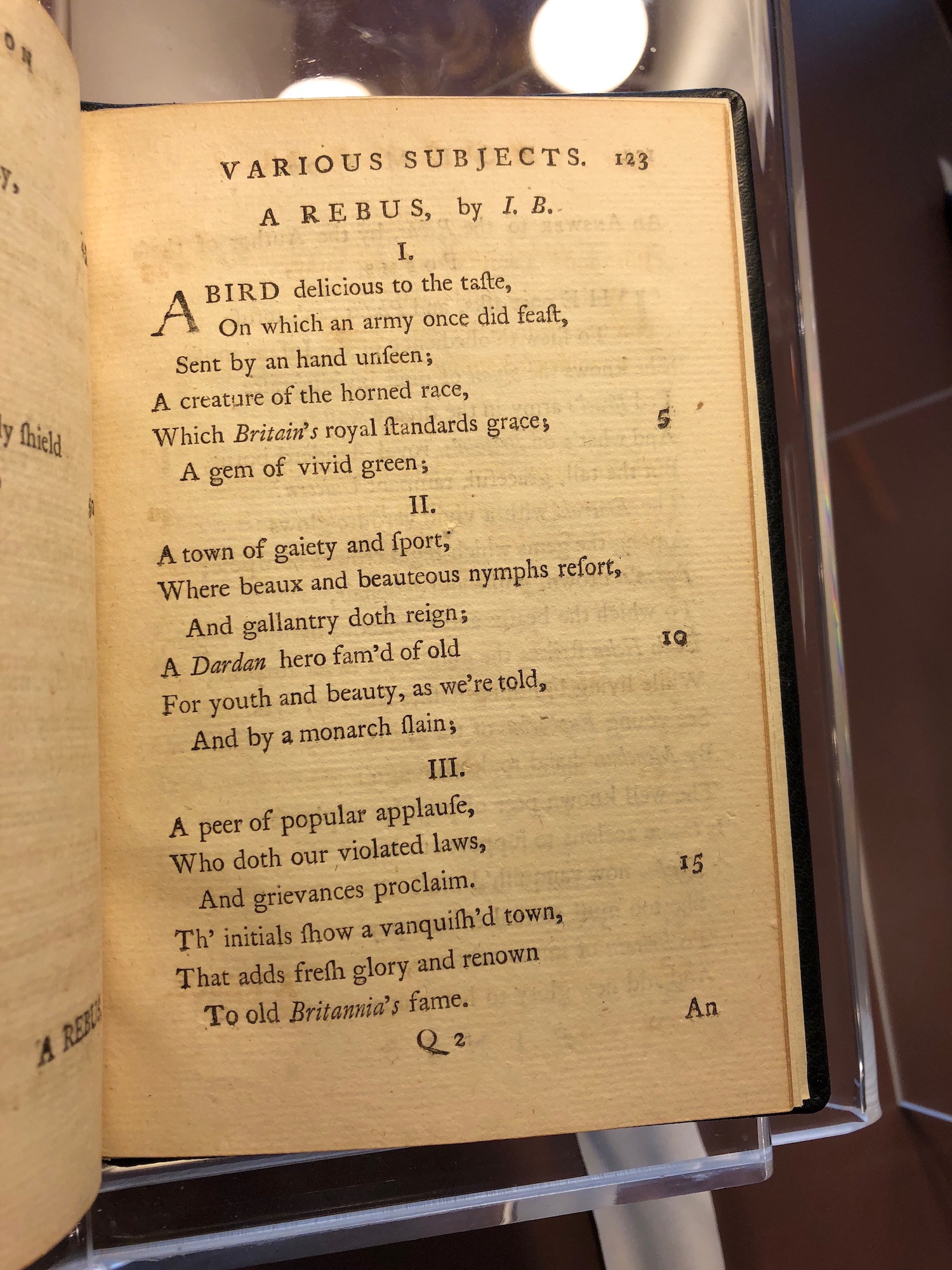
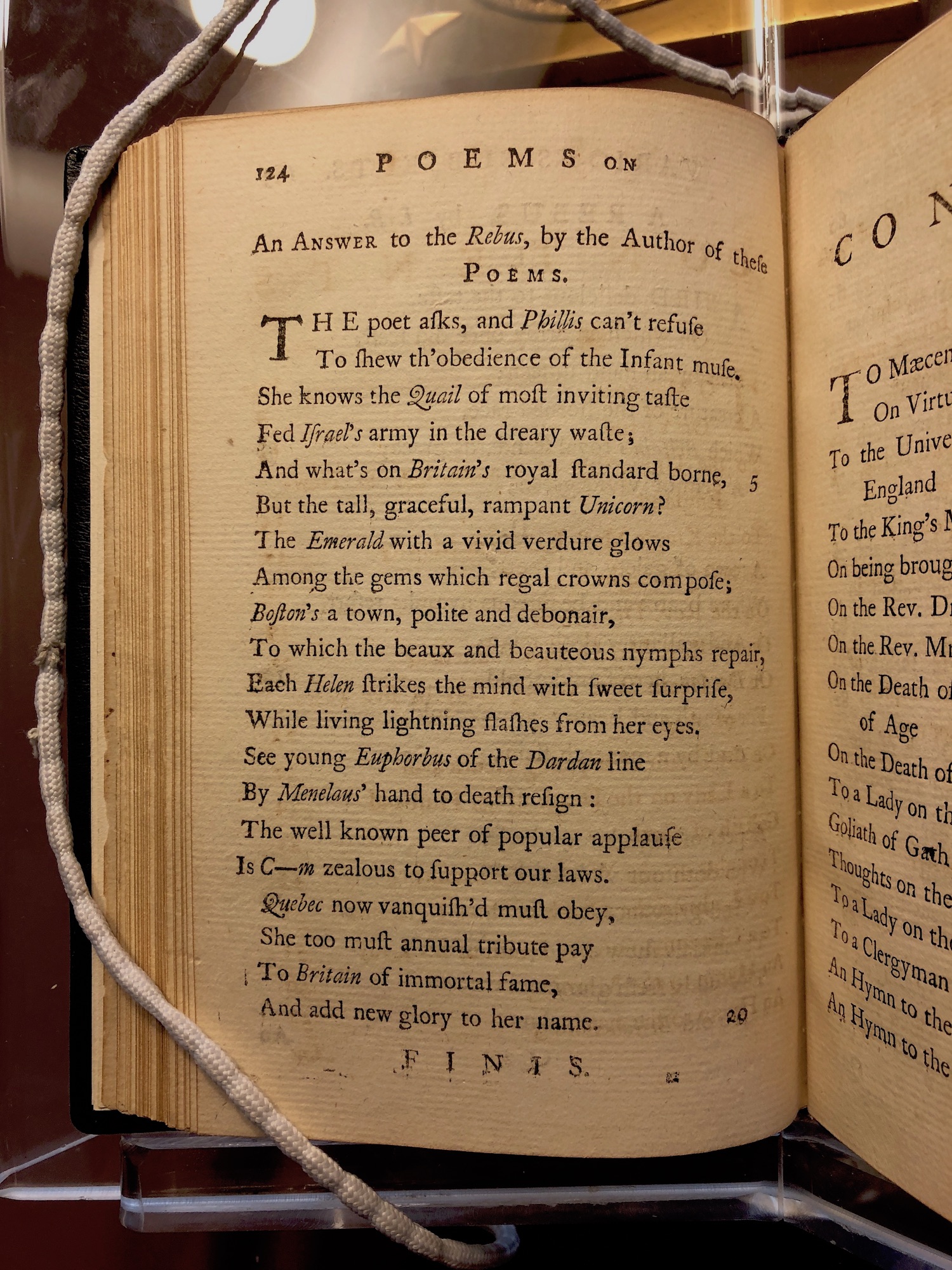
![Page [125]](https://anthologyassetsdev.lib.virginia.edu/wheatley-poems/images/WP-0125.jpg)
![Page [126]](https://anthologyassetsdev.lib.virginia.edu/wheatley-poems/images/WP-0126.jpg)
![Page [127]](https://anthologyassetsdev.lib.virginia.edu/wheatley-poems/images/WP-0127.jpg)